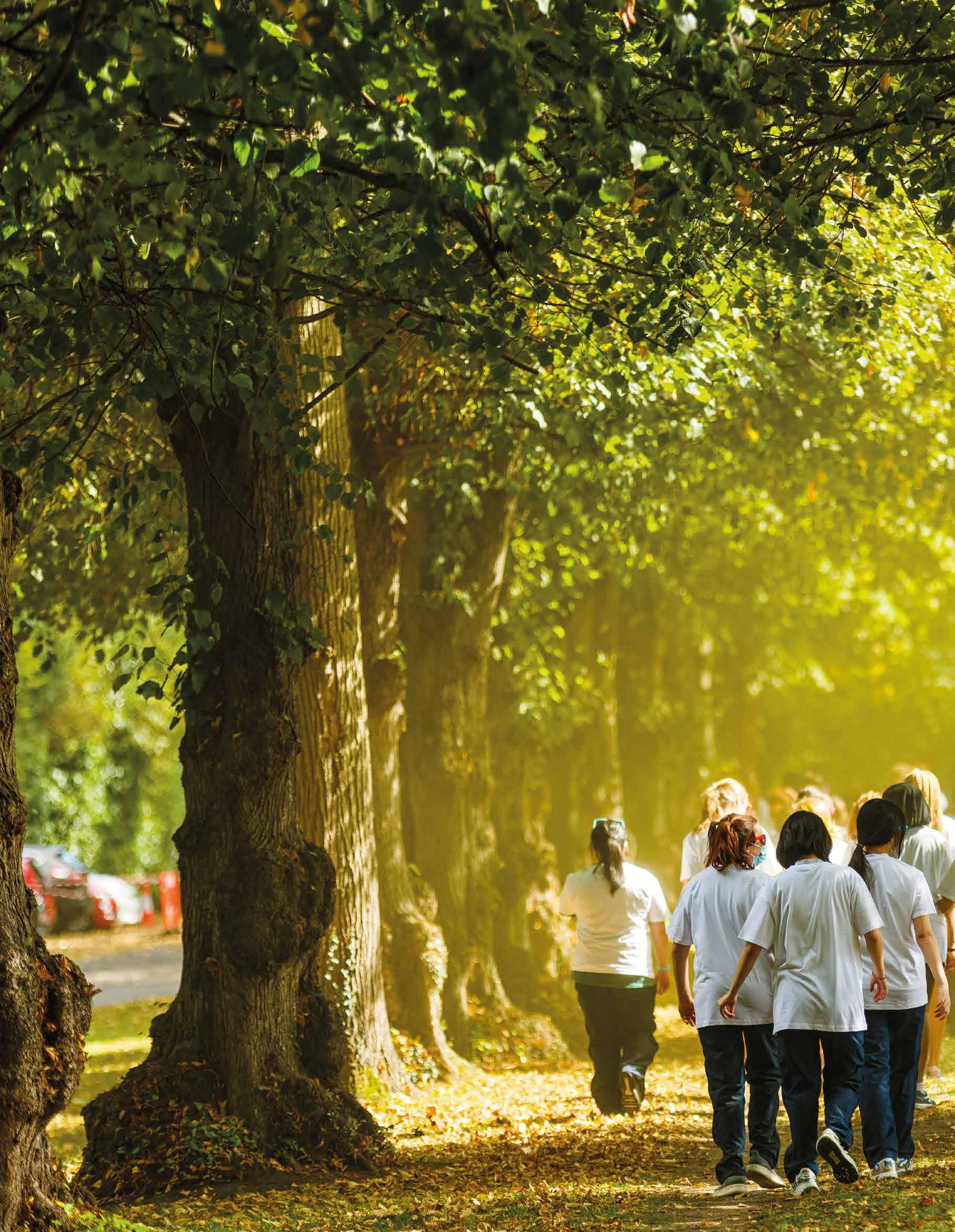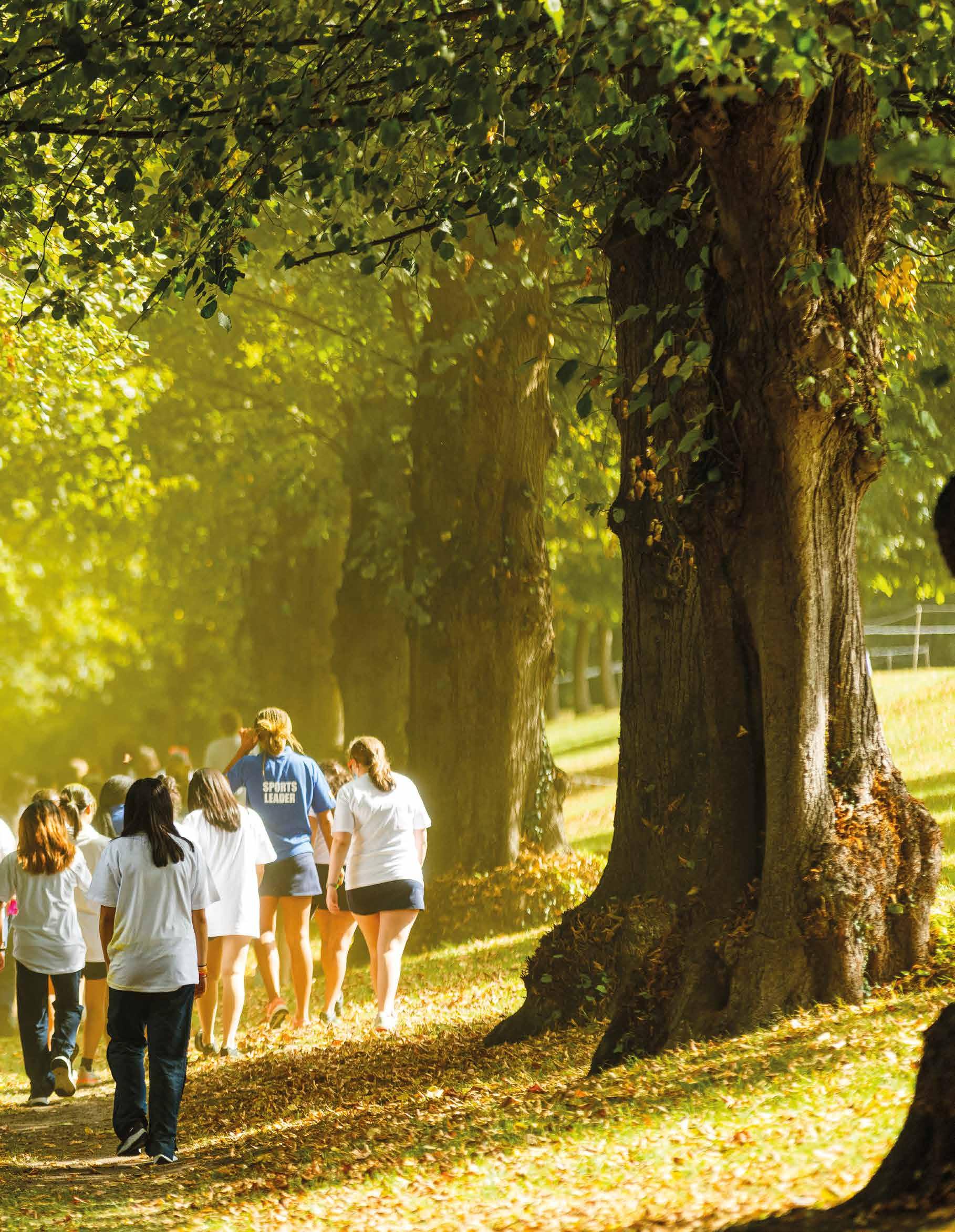








The 2021/2022 academic year has been a significant one; each term has been filled with a range of events for the whole School community to enjoy and the girls have been fortunate to be at school as we have marked this milestone. We have focused on the vision and aims of Wycombe Abbey’s founder, Dame Frances Dove, and celebrated our rich and illustrious history over 125 years of educating girls.

We started off the Autumn Term with a Colour Run; the whole School took part and participants ran, walked and danced their way around the School’s beautiful grounds while being blasted with powder in every colour of the rainbow. Founder’s Day followed on 23 September, commemorating the School’s founding in 1896. We enjoyed a birthday party in the afternoon with fairground rides, live music and a magnificent cake baked in the shape of the Abbey building. We welcomed guests from the local community and greatly enjoyed Bishop Alan’s sermon (see page 50 – 51).

The Spring and Summer Terms brought with them a wonderful celebration of our pupils’ creative talents with a special Anniversary Concert in the Archer Recital Hall and 125 Live! ; a journey through our 125 years of history via the media of music, drama and dance. Our 125
Speaker Series ran throughout the year, and we welcomed guests from a range of fields including sport, business, finance and adventure in Sir Matthew Pinsent, Liz Earle MBE, Baroness Helena Morrissey and Ben Fogle. The Seniors’ Making a Difference panel was also enjoyed by the girls and the Seniors’ Day Reunion was a fantastic afternoon of talks, tours and tea with much reminiscing; I thoroughly enjoyed meeting former pupils and staff and hearing their stories. We rounded up the year with Dove Day, marking the end of our celebrations.
Following the publication of the School’s Strategic Direction 2020-2025, we have been working on an Estates Masterplan to outline the improvements we seek to make to the built environment over the next 15 – 20 years. Phase 1 of the Estates Masterplan includes the construction of a new Junior House and an Innovation and
Design Centre (IDC); information about our ambitious plans can be found on our website: www.wycombeabbey.com. I am also delighted that we are now in the final stages of the Big School refurbishment and this much-loved space is set to reopen in the Autumn Term 2022. This is an exciting time for Wycombe Abbey as we continue to look to the future with a clear vision to be a world class school at the forefront of girls’ boarding education.
I hope you enjoy reading this issue of the Gazette which is a delightful illustration of all that has been achieved over the last year.
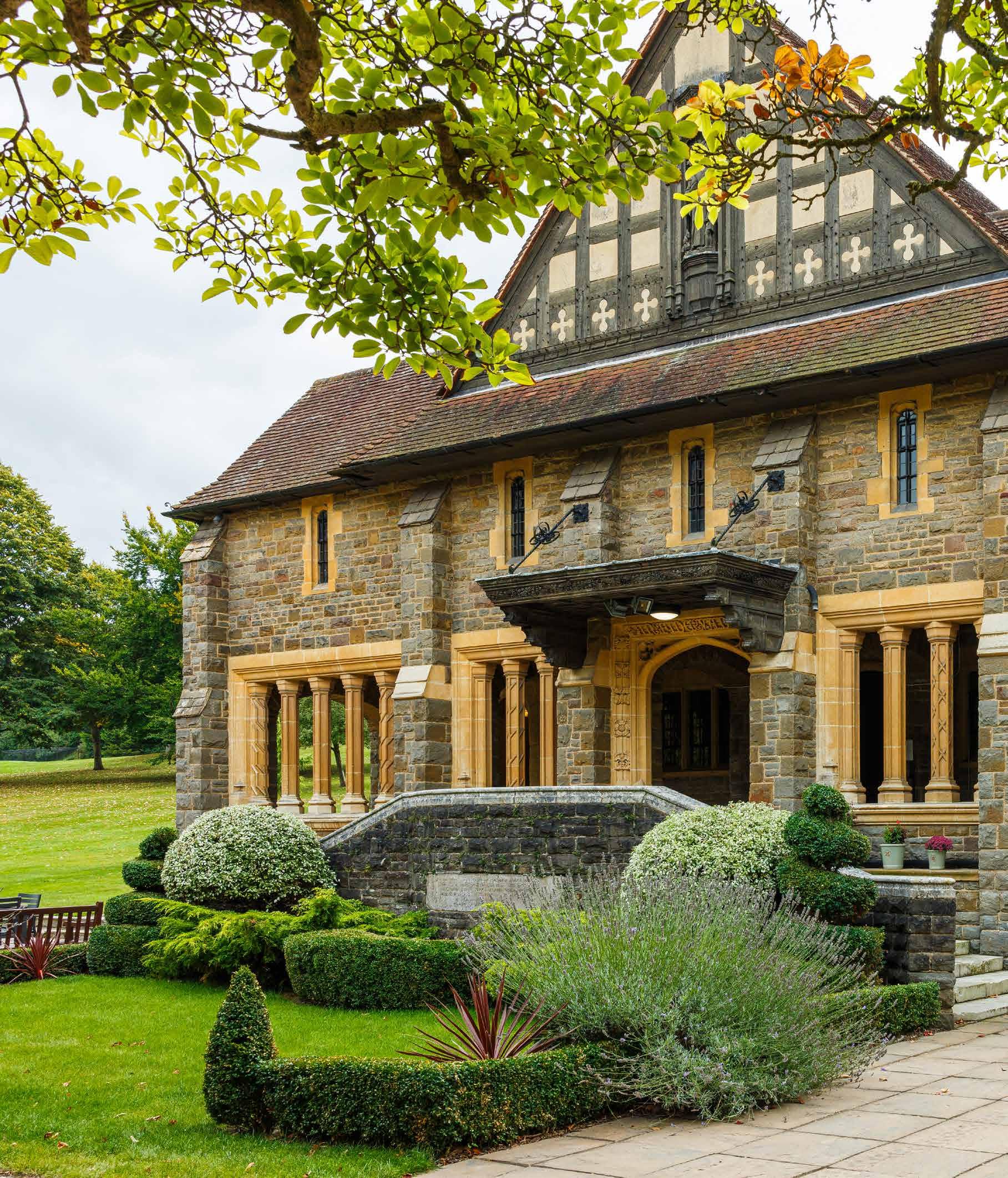
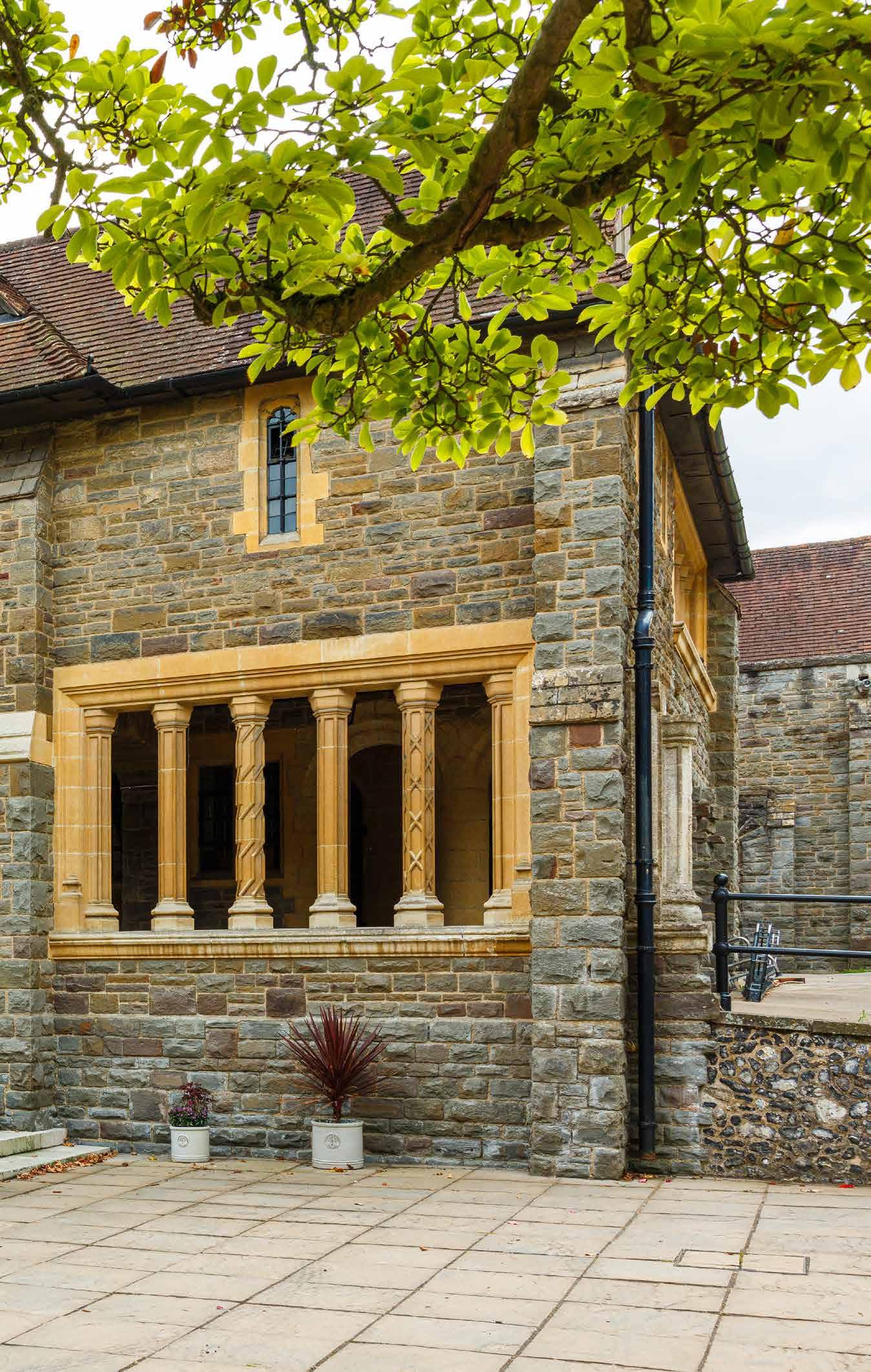

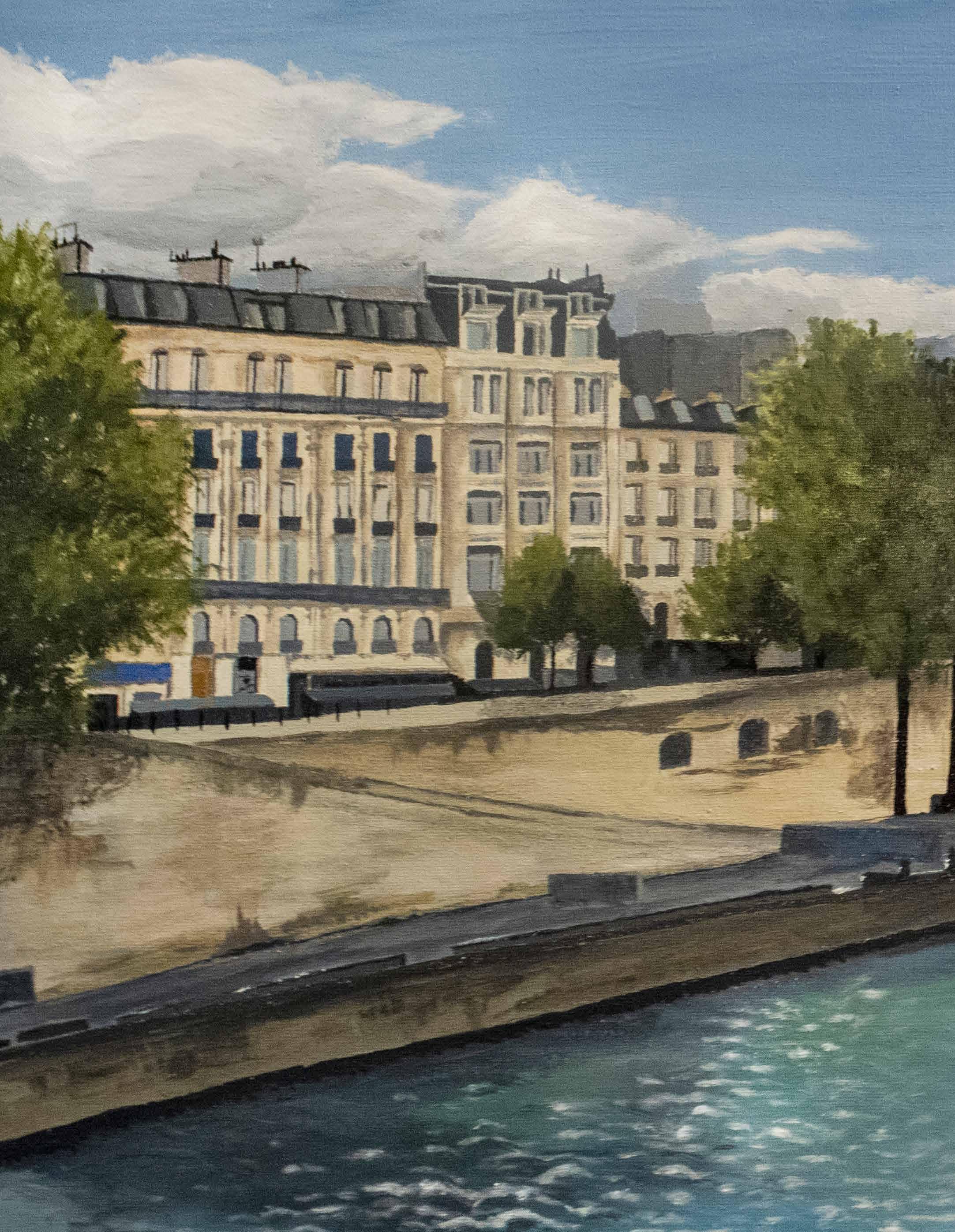

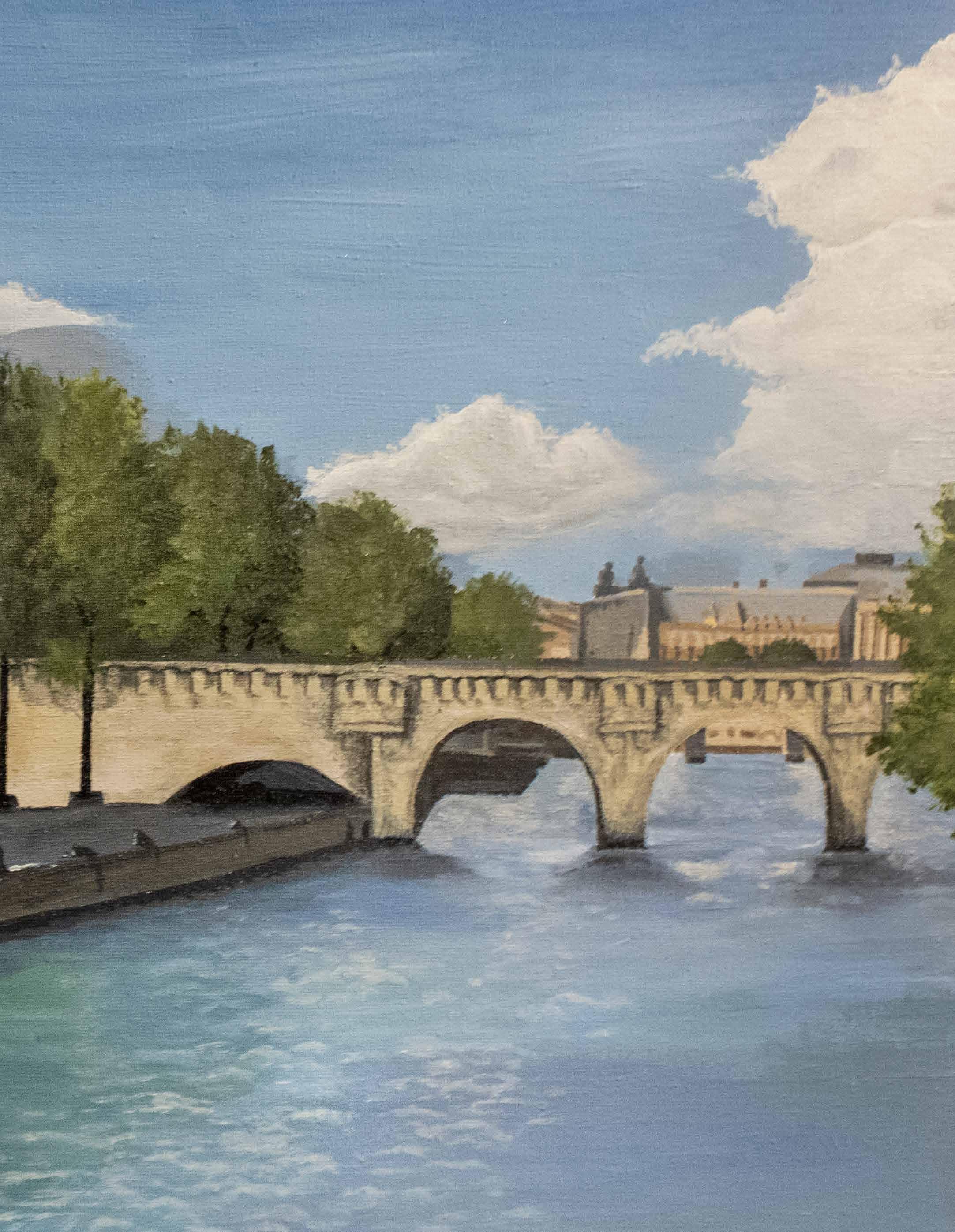
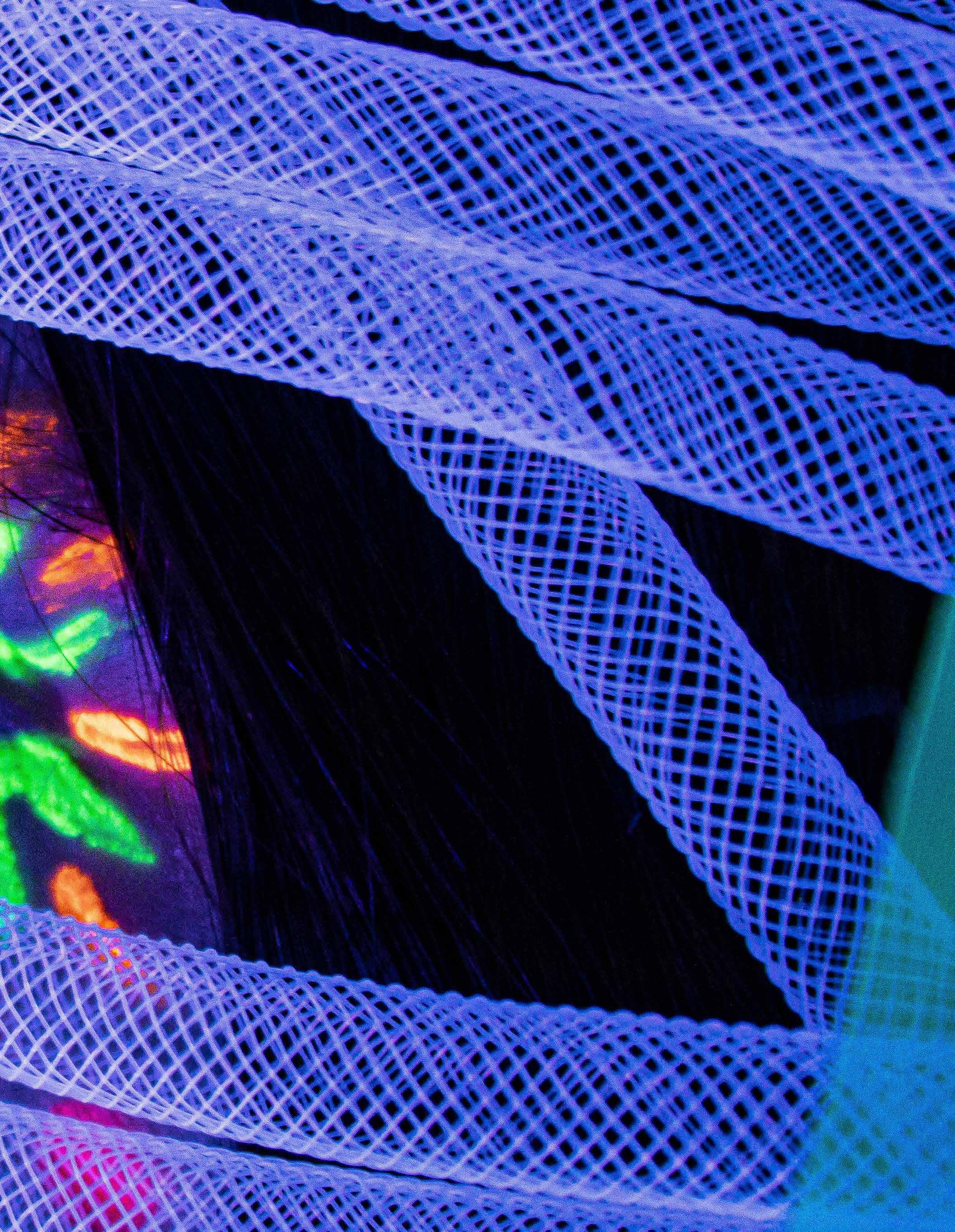
Head of School
Catrina Yang
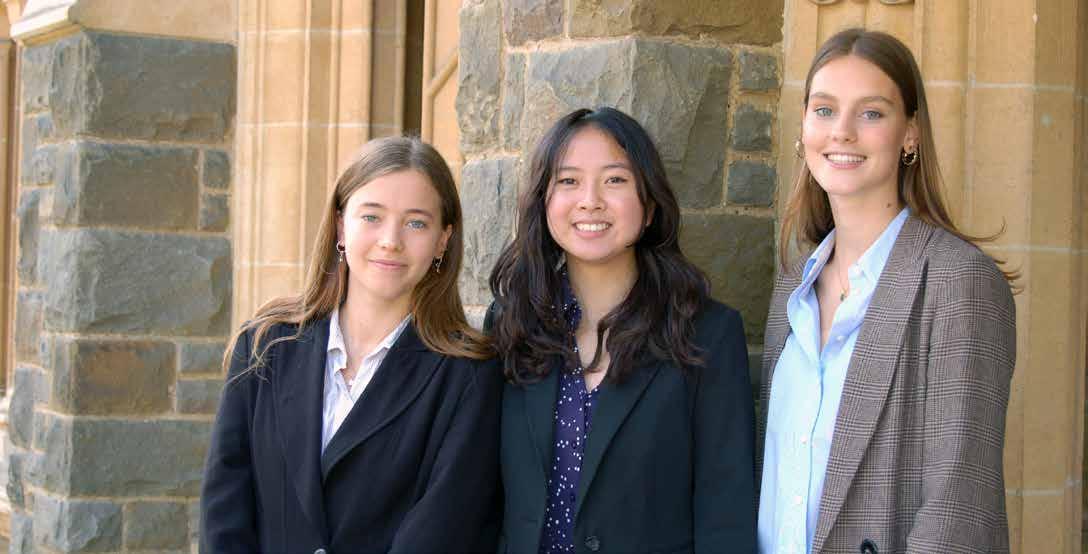

Alyssa Conradie and Carys Ward
Airlie
Harriat Bishop
Barry Victoria Fearnhead
Butler Sophie Mackenzie
Campbell Pia Mathur
Cloister
Aumkaar Bath
Pitt Olivia Idle
Rubens
Shelburne
Wendover
Kizzy McCulloch
Phoebe Richardson
Ella Eastwood
Chairmen of Clarence Amelia Howie, Eleanor Kochman, Eleanor Livingstone and Darcy Munro
School Sports Captain
Alice Newton
Charity Prefects Anna Pattle and Yam Pothikamjorn
Music Prefect Rosalie Ko
Drama Prefect Charlotte Defriez
School Artist Alex Hayden
School Almoners
Lower School Prefects
Biobele Charles and Dara Laoye
Amelie Azim-Khan, Iris Canning-Jones, Lauren Chang, Phoebe Francis, Anna McMullan and Vivian Pak
Upper School Prefects Beatrice Brockman, Rose Evans, Eden Peters, Hana Saada, Zara Saada and Claudia Woo
Lower Sixth Prefects Isabelle Abdulai and Ginny Zealley
Head of Orchestra Chloe Suen
School Pianist
Rosalie Ko
Head of Choir Sophie Young
MUN Secretaries General Chloe Davis and Phoebe Fox
Debating Officers
Alisha Desai-Kinvig and Helen Kurnytska Digital Officers Alison Dauris and Grace Sawatyanon
Diversity and Inclusion Officer
Poet Laureate
Meryl Lim
Angelina Curtis
Sustainability Officers Tabita Bobs and Amelia Howie
School Librarians Charlotte Gowers and Eleanor Kochman
Duke of Edinburgh’s Award Scheme Officers Alex Hayden and Noor Mitchell School Photographer Malvika Kheterpal
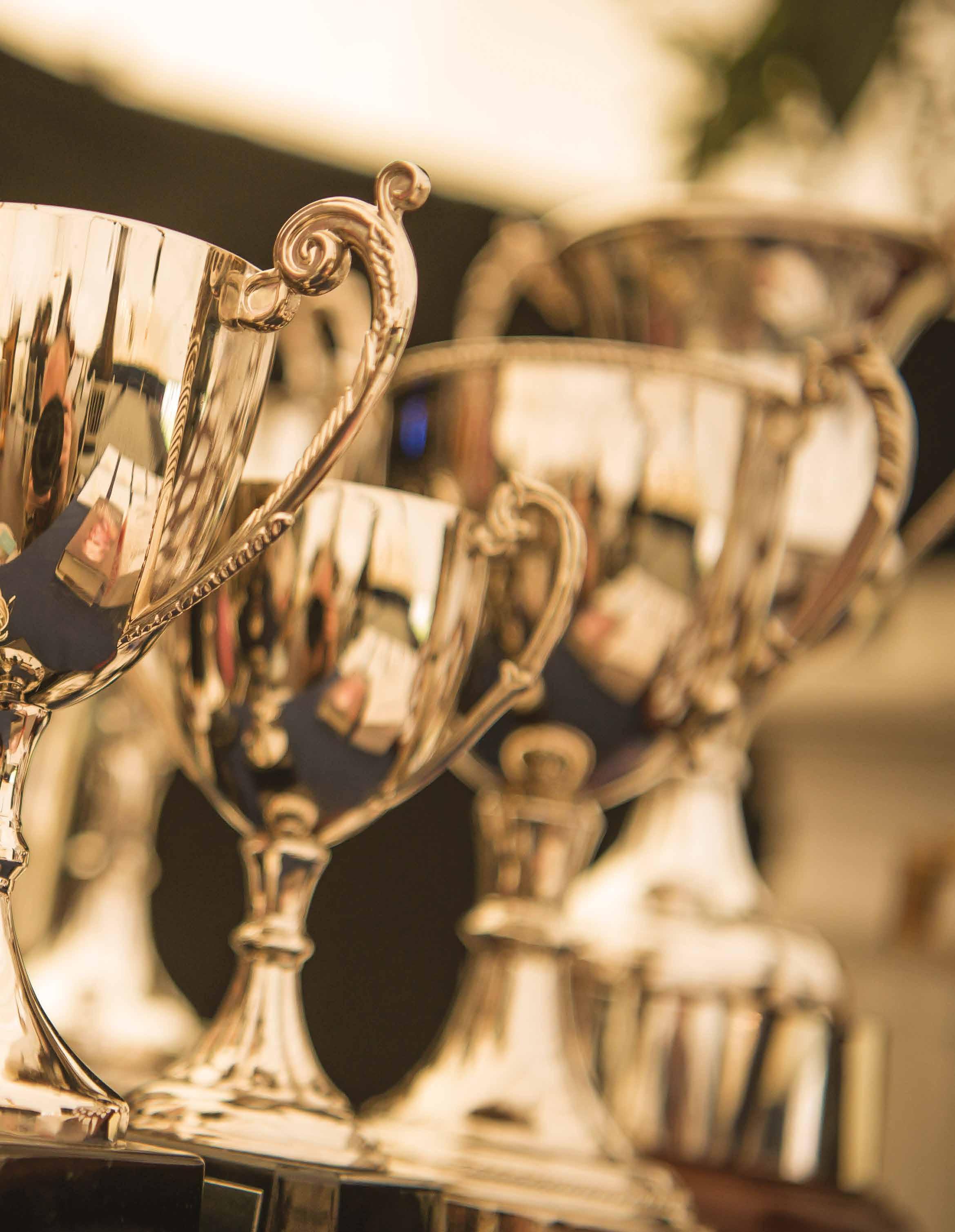
Wellbeing Officers
Larissa de Silva and Victoria Semark-Masters
Wycombe Abbey is pleased to announce the award of the following Scholarships for September 2022.
The Wycombe Abbey Open Scholarship: Sofia Dey Choudhury (Home Educated)
Music Scholarship: Fizz Lee (Newton Preparatory School)
Music Scholarship: Yoyo Wang (Solihull Preparatory School)
Music Exhibition: Vivienne Shi (Eversfield Preparatory School)
The Wycombe Abbey Open Scholarship: Annika Shenoy (Godstowe Preparatory School)
The Dove Scholarship: Katya Pavlichenkova (Dragon School)
The Johnston Yapp Scholarship: Freya Man (Wycombe Abbey)
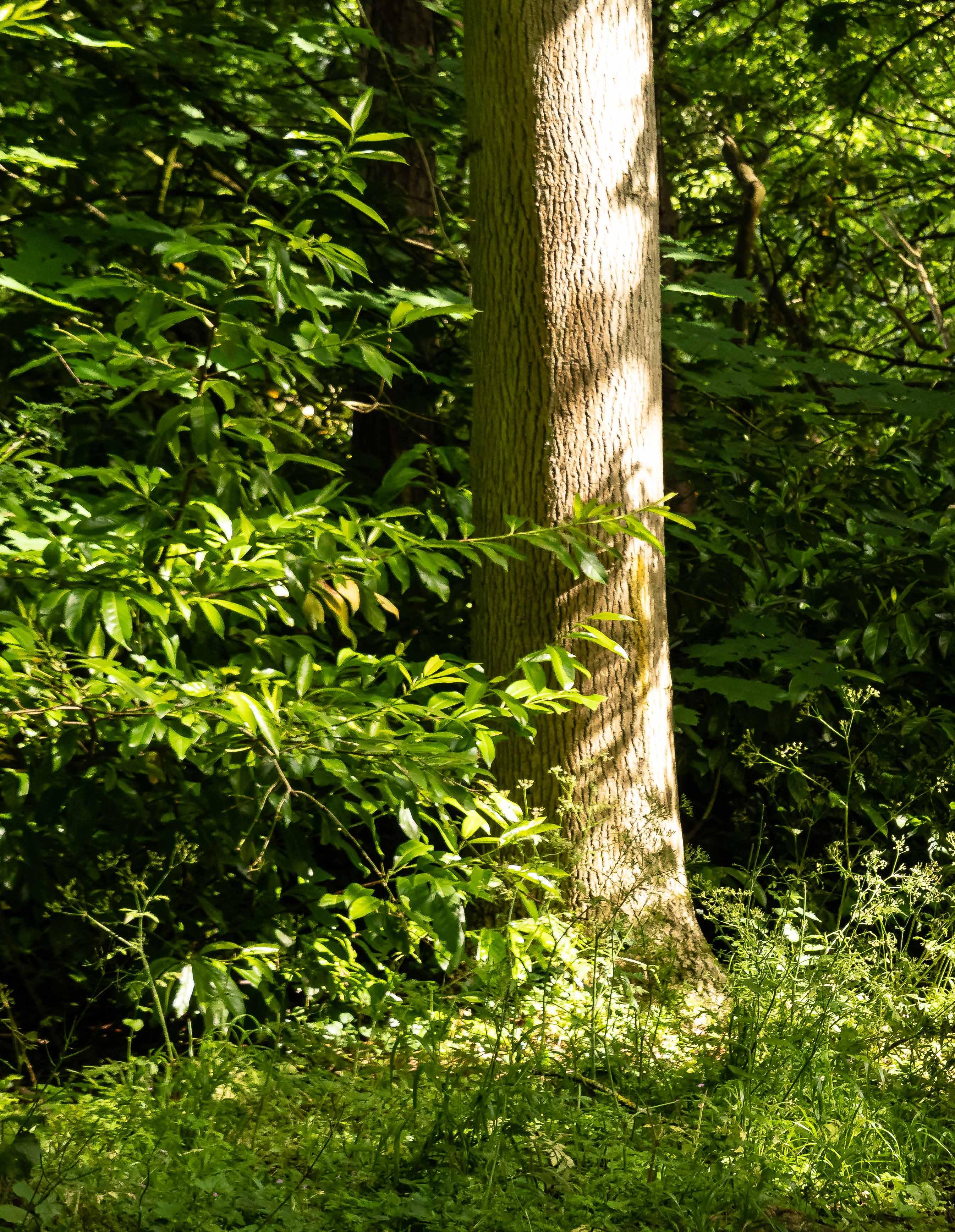
The Walpole Scholarship: Catherine Li (Wycombe Abbey)
Academic Exhibition: Lucy Liu (Dragon School)
Music Scholarship: Georgina Emmanuel (Godstowe Preparatory School)
Music Exhibition: Vivienne Yang (Godstowe Preparatory School)
Music Scholarship: Selina Zhang (Queen’s Gate School)
Music Scholarship: Audrey Xia (Wycombe Abbey)




n November, the History Society was fortunate to hear from Roger Moorhouse; he gave a fascinating talk about Poland in 1939 and The September Campaign.
I
Over the course of his talk, Mr Moorhouse discussed The Polish September Campaign through the lens of six ordinary Polish citizens, ranging from Honiok, a Polish activist whose death was manipulated to justify Germany’s invasion, to ŚmigłyRydz, Commander-in-Chief and Marshal of Poland. It was fascinating to learn about the invasion from the Polish perspective, exploring their defence strategies and the noble, courageous ways in which they battled on both fronts against Nazi and Soviet forces, despite a lack of Allied
support. Britain and France both promised help that never came which perhaps goes some way in explaining why, although the invasion of Poland was the defining event that began the Second World War, it doesn’t seem to feature in the Western narrative. This observation was expanded on by Mr Moorhouse throughout his talk as he emphasised the importance of further exploring the role played by Poland throughout the conflict. As the only country every occupied by both Nazis
and Soviets, it seems clear that in order to better understand the war itself, as well as the complex regimes and ideologies in Germany and Russia, we should start with Poland. Poland never surrendered throughout the entirety of the war and should be remembered for its bravery and resilience in the face of two of the world’s most brutal, totalitarian states.
Phoebe UVI
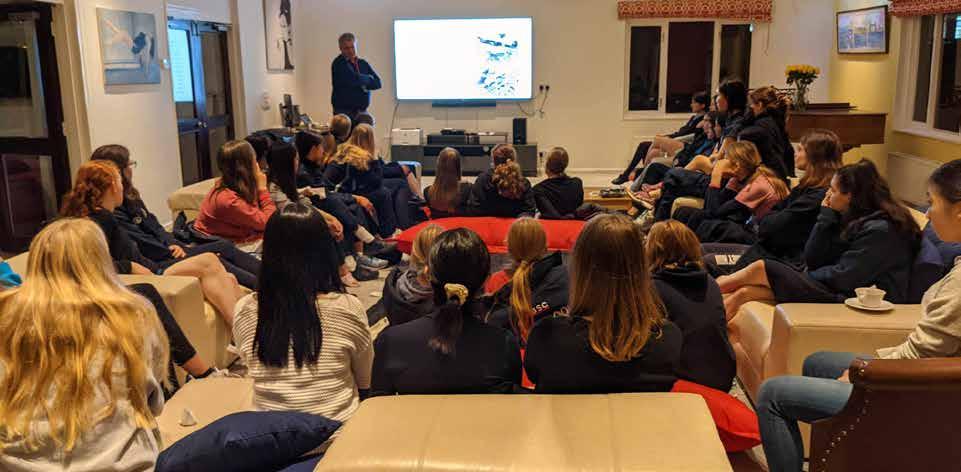
T
he UK may have formally left the EU in January 2020, but as a truly global school, we take every opportunity to celebrate the rich linguistic and cultural diversity of our community. European Day of Languages, traditionally marked on 26 September across all EU countries, became an International Week of Languages that included every member of the Wycombe Abbey community.
During the week, the UIIIs and LIVs completed as many ‘Secret Agent Language Challenges’ as they could, including writing a word in different alphabets, spelling their own name in sign language, identifying words in one language ‘borrowed’ from another, and listening to songs in five different languages. UIVs, LVs and UVs had a series of online quizzes and activities to undertake during Tutor Time, such as ‘Guess the Language’, and articulating some truly tricky tongue twisters. Food was high on the agenda, with cookery sessions including Tortilla Española with Mrs Christian, an Oreo

Mooncake and Beef Chow Mein cookery session (also marking the Chinese MidAutumn Festival), while the catering staff produced a wonderfully varied lunch featuring French, Spanish, Italian, Greek and Austrian dishes.
All members of the community were encouraged to sport stickers displaying the languages they speak, even if just a few words, and it was truly humbling to see just how many linguists and polyglots we have around the School.
Ms Lucy Nott Head of Modern LanguagesReading for both pleasure and academic pursuit is central to the Wycombe Abbey community and it was a delight to dedicate a week to the wonders of literature for our annual Reading Week.

This year’s iteration revolved around the rhythms and rhymes of poetry. Following a workshop with poetry declamation competition winners, the comedy jazz duo of Harry and Chris filled the Lancaster Arts Centre with laughter at their wonderful wordplay and improvisational skill. Continuing the poetry trend, Mr Lenton launched his new collection, The poor player , performing a selection of poems in a celebration of the literature that has inspired him through the years and that continues to elicit such a joyous response in the classroom. UVI pupils treated us to poems by Shakespeare, Plath and Frost. Pupils were also invited to try their hand at a new creative endeavour in the blackout poetry workshop, while activity packs were sent to all boarding houses to encourage book-related jollity! Joseph Elliott, author of the Shadow Skye series, also came in to speak to LIV about reading, writing and the publishing industry. It was a fantastic and stimulating event, which provided an enthralling insight into how books are published.
This annual treat is such a wonderful reminder of why we make reading a high priority at Wycombe Abbey and why we must make space and time to continue this essential habit alongside the many other rich experiences we offer pupils throughout their time at the School.
Mr Sam Lenton Head of EnglishMany congratulations go to Rose, Nicola and Erica (UVI) who participated in the British Physics Olympiad this year. Nicola and Erica achieved Silver Awards and Rose achieved a Gold Award. These are exceptional results in what is an extremely challenging competition.

The British Physics Olympiad (BPhO) was set up to encourage the study of physics and to recognise excellence in young physicists through ten annual physics competitions. Consisting of a gruelling three-hour question paper the Year 13 Olympiad competition is the pinnacle of the series and aimed at stretching the top physics pupils in their final year at school.
Having finished the three-hour long paper, I remember walking out of the classroom with the sides of my head throbbing. It started off with a few relatively standard A level mechanics questions but the paper then became progressively harder with some requiring an interdisciplinary approach. The questions also incorporated some very interesting physical scenarios which never crossed my mind before. By analysing them mathematically using the different laws of physics, which I learnt in class, I was surprised by the innovative aspect of physics where one could devise various solutions to the same question. By challenging both my mathematical ability and physical intuition, the Olympiad served as great preparation for my University of Cambridge interview, which required a similar set of skills. I thoroughly enjoyed the challenge; it was a great opportunity to break free from A levels (where the correct answers are often the focus) and to celebrate the more creative and flexible side of science!
Rose UVIThe English Department’s poetry competition was once again a huge success capturing the imagination of the girls. As always, the judges had an extremely challenging job in selecting the winners for each of the categories: Senior, Intermediate and Junior. After intense deliberation, the following were chosen winners:
• Senior: Rose (LVI) • Intermediate: Coco (UIV) • Junior: Sissie (UIII)
Change.
The sun reaching the horizon as we greet day. Change.
Leaves falling to the floor as summer fades away. Change.
The subtle sound of laughter as we grow and play.
They say ‘Do not let your yesterday guide your today’ They say ‘Do not let your winter rule your summer ray’ They say ‘Do not let your past hinder your current way’
Change.
Embrace it, not a complex contraption. Change. Believe it. Do not sadden. Change.
Endure it, it must happen.
What did you dream last night? He says, staring. I dreamt I went to Manderley again.
The beast, a Cerberus, glaring, baring His teeth. “Jasper!”, I call, “Jasper!”, and then Cold tendrils of fear ascend from my feet

Just like that sickened, sinful hedera Or strands of the seaweed of deceit Cloaking your murder of her, Rebecca.
Echoes in empty halls whisper my name. Unknown, unimportant, replaced by you. M. Not for Maxim. Murderer. No shame. Anagnorisis. A victim anew. It was not she haunting my dreams last night. Trapped, with Janus guarding the door to flight.
They say ‘history, don’t let it betray’ They say ‘mature, make sure to stay that way’ They say ‘ready, for you must change the world’
Change.
Inevitable. Unavoidable. Change. Inexorable. Uncontrollable. Change.

If not now, when.
Coco UIV
Her flushed cheeks, like delicate blossoms suffused with a thousand cream pinksdarling cherub Her fragile beauty.
“Mummy, I want to grow up!” buried in a forest of sweet whispers.
Sparkly neon Jordans, mid-floss Moment to shine Friendship bracelets with hot-pink glitter: it was a glitter worlda world where never and always reigned a world of defiant cartwheels Ice cream dripping down her chin.
“Mom, I want to have a unicorn for my birthday!”
Glistening eyes Greyin a world of black
white, she cries “Mum, I need you!”
A battered craft on a tempestuous ocean.
Facing rejected job applications, crippling mortgages not yet sunken Floating.
Pampered with plump cushions, she nestles in her rocking-chair.
Face lined with wrinkles, her hair streaked with grey where time had marked its territory. Hands blurred – rheumatism was most probable; Back humped like a question mark.

“Mother, I miss you,”
Photographs splatted with Grey.
Sissie UIII
Science Week was a fantastic opportunity for all to celebrate science, and to continue to develop their sense of scientific curiosity.
Whether a girl is an aspiring aerospace engineer, biologist or anthropologist, there are many activities and resources available to help her pursue her passions beyond the core curriculum. Our Science, Technology, Engineering and Maths (STEM) provision is carefully designed to instil a love of science in girls with the annual British Science Week as one opportunity to embrace it fully.
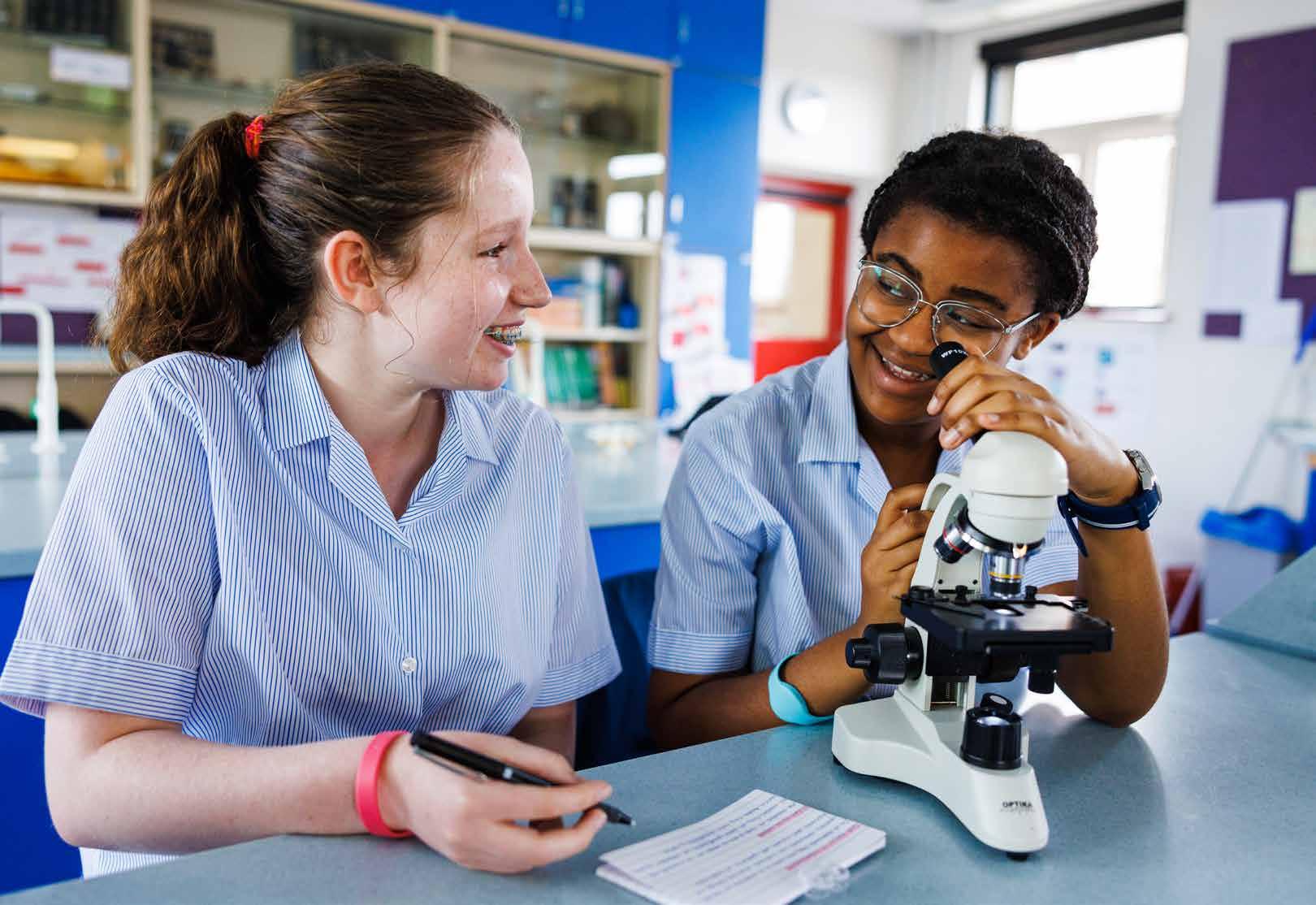
During Science Week in June, UIII-LIV girls were tasked with designing lab coats around the theme of food and food waste as part of the Baylab Lab Coat Competition. Creative sparks flew as pupils produced high-quality designs featuring their favourite foods, anti-food waste slogans, kitchen utensils and a range of amusing food-based puns. A selection of their designs was submitted to Bayer, with the winning pupil winning a grow-yourown vegetable pack for themselves and a set of new lab coats for their school.
A highlight of the week however, was the hatching of five ducklings. Girls from across the School delighted in watching the first cracks appear and in visiting their new charges, whilst gaining valuable hands-on knowledge of the life cycle. After many fond farewells, the ducklings were taken into the care of Mrs Werren, with whom they will spend the next stage of their young lives.
In between cuddle sessions with the ducklings, girls in the LIV and UIV tried their hand at gardening. Each pupil was tasked with determining the optimal growth conditions for their own plant, whose growth was observed and measured throughout the week. The girls welcomed the chance to use knowledge from their Biology lessons in a hands-on challenge, and each new green shoot was joyously welcomed into the world.
The week was a fantastic opportunity for all to celebrate science, and to continue to develop their sense of scientific curiosity. The memories of the experiences we shared (particularly of our new duckling friends) will stay in our hearts.
Director of Science and STEM
One of the great things about Wycombe Abbey is that the pupils have the capacity and motivation to grapple with concepts and ideas beyond the scope of the curriculum.
This year, the UIVs attended a new series of enrichment lectures in which they were introduced to topics that are not part of their everyday curriculum. The talks were delivered by members of the academic staff and were very well received. Topics ranged from the history of the US presidency to the philosophical problem of free will, and the nature and origins of accents and dialects.
Running alongside this programme was the Kathleen Wilkes Essay Prize, a prize named after a notable Wycombe Abbey Senior, philosopher and educationalist. Kathleen Wilkes was an endlessly impressive woman who juggled her time between lecturing at the University of Oxford, smuggling banned books into the Soviet Union and conducting philosophical lectures in secret. She set up several underground universities in the Czech Republic and was awarded the country’s highest honour, the Commemorative Medal of the President of the Czech Republic, for her services to education. She is a most fascinating and inspirational senior. Girls who entered the competition were required to write a 1500 word essay, choosing from questions such as ‘What makes a book a classic?’, ‘Should we judge people from the past by the standards of today?’ and ‘What is the point of education?’. Congratulations to Fiona for winning the competition.
To judge our essay competition, we were fortunate enough to secure the services of Sophie Cousens, bestselling author and also a Wycombe Abbey Senior. Sophie commented, “I was really honoured to be asked to help judge the Kathleen Wilkes Essay Prize, and totally blown away by the standard. I thought the quality of writing and the intellectual vigour with which each question was approached was astounding for this year group.”
Mr Luke Wildgoose Head of Upper SchoolThe Modern Languages Department has embraced many different competitions and events for the girls to improve their language skills. Girls have taken part in some seasonal German and Spanish cookery sessions, spirited debates against various schools in the Joûtes Oratoires, days out to the British Film Institute and the Cervantes Theatre. We are looking forward to the return of European trips next year, starting with a Sixth Form trip to Paris in October.
Pupils of all ages have been keen to participate in a wide range of national and international language competitions, and we have been delighted with their achievements. A translation workshop led by Dr Jenny Higgins in the Autumn Term inspired girls to try their hand at creative translation, and we were delighted to learn that Clelia (LIV), Claudia and Jocelyn (LVI) all received commendations for their translations in the Anthea Bell Translation Prize.
Ashley (UV) took part in the creative poetry prize ‘Prismatic Jane Eyre’, and it was with enormous joy that we learnt that her poem had been selected for publication in an online and print anthology.
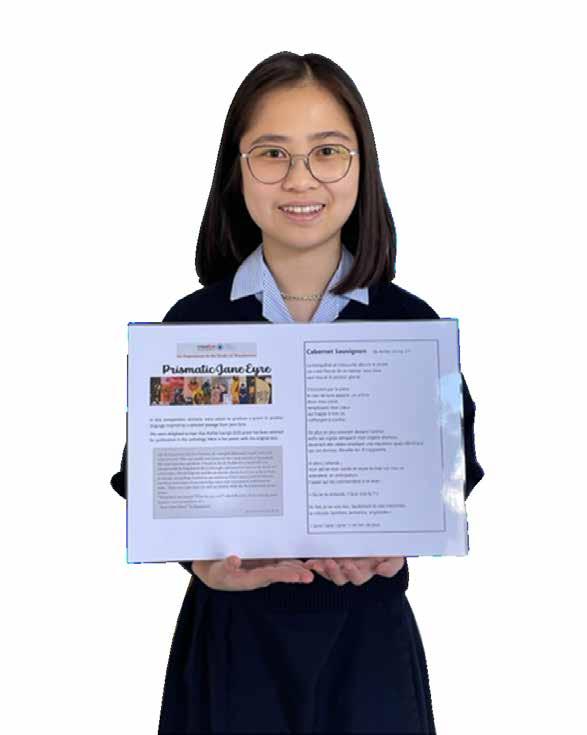
Hattie (LVI) was a runner up in the 10 th Oxford German Olympiad, and in the Linguistics Olympiad, Phoebe (LVI) won a Silver Award at the Advanced Level, while at Intermediate Level, Chloe (LVI) won a Silver Award, and Ashley (UV) and Isabella (LV) won
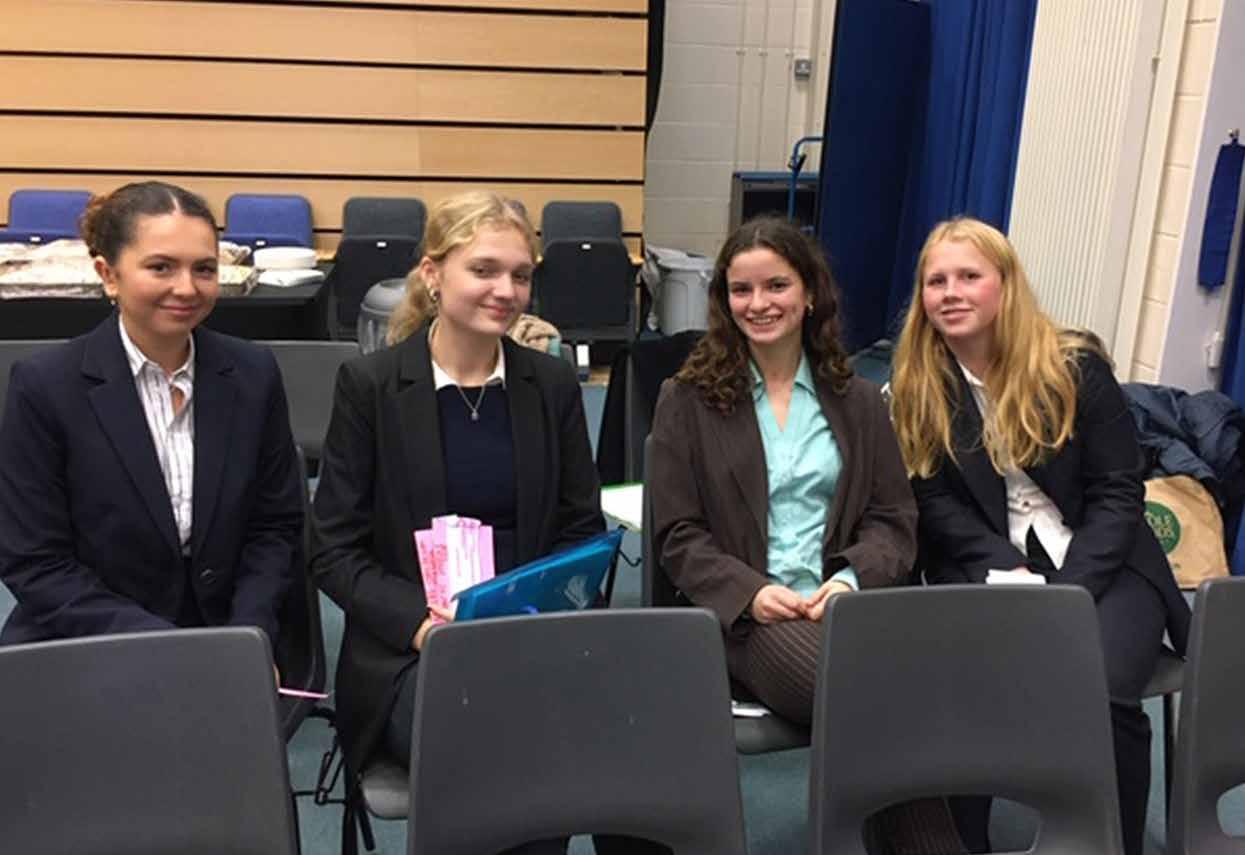
Bronze Awards. At Foundation Level, Clélia, Mable and Abi (LIV) each achieved a Silver Award.
Ms Lucy Nott Head of Modern Languages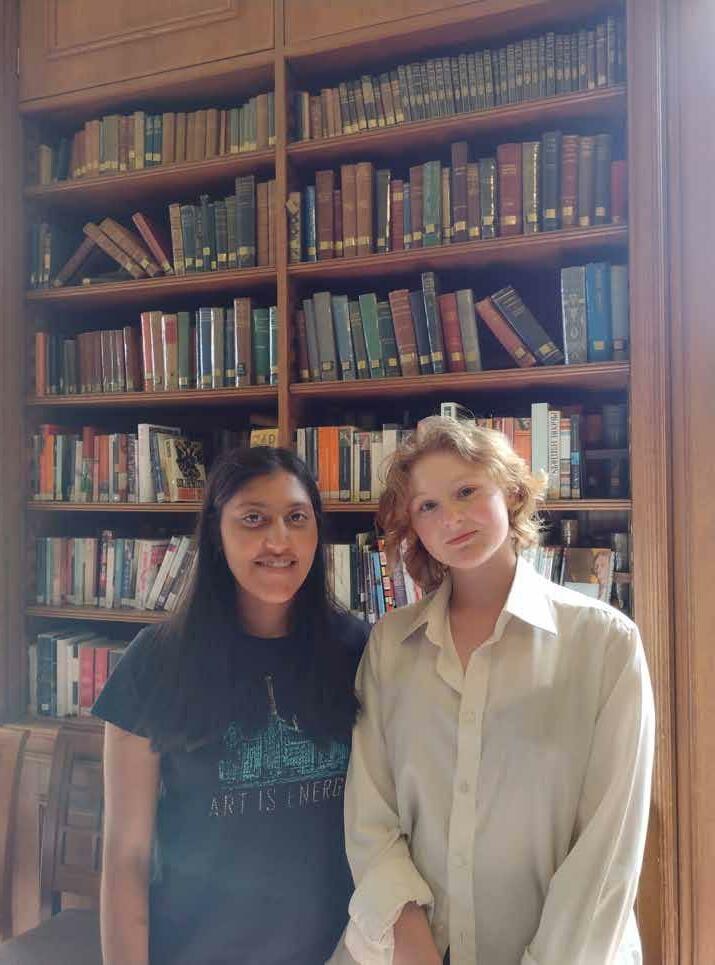
I
t has been great to see the increased use of all our libraries over the course of this year. The newly renovated Junior Library and the UIII Hub provide great study and reading spaces for the younger girls, where there are books of different genres appropriate for their age group. Of course, for those pupils who like a bit more of a challenge, they are always welcome to go to the other libraries!
In addition, our non-fiction libraries Dove and Whitelaw, as well as our fiction library, Fisher, have a range of books for everyone to enjoy. Dove and Whitelaw are mainly used by the older years as they provide a quiet study space, where one can easily research topics for their essays by looking through the range of books in the library. We have loved seeing younger girls come into these libraries more recently to ask for help and find reading suggestions from our lovely Librarian, Ms Myers. Many pupils have enjoyed our Flourishing section, which you are greeted by when you enter Dove Library. There have been three themes during the year: optimism, nutrition and community. We have loved seeing pupils picking up books that they otherwise would not have come across and giving something new a try. If you can’t find exactly what you are looking for, it is also possible to request books for the library to purchase, which has proved very helpful if one is interested in a niche topic.
The Library has also run many events and competitions over the year. Some of the highlights included the 125 archive events, author visits, poetry workshops, Reading Week and celebrating Black History Month. There are so many library related events that one can get involved with, whether that be joining a book club, entering a competition or attending a workshop; there truly is something for everyone.
During the last term of this year, both GCSE and A level pupils took advantage of the quiet spaces of Dove and Fisher Library, and our librarian has been making sure to look after those using this peaceful space. As many pupils forget to prioritise their wellbeing during exam season, Ms Myers set up the relaxation station: a collection of calming activities, life-affirming books, and quick puzzles for mental health breaks. Not only concerned about mental wellbeing, we also get to enjoy afternoon tea in Dove Library to sustain all the hard workers. With concerns over nourishment for both the mind and the body, the Library has proved an invaluable asset to every pupil facing exams and a space for us to be reminded to balance our study with our health.
We have loved seeing pupils picking up books that they otherwise would not have come across and giving something new a try.
World Book Day was an opportunity on which the Library pulled out all the stops. The theme this year was Alice in Wonderland , but every pupil was encouraged to dress up however they pleased. We had some amazing group dress-ups from teachers and pupils alike. Favourites were Harry Potter and his golden trio, and the Wizard of Oz from the Maths Department. The whole week was filled with fun with a display of Lewis Carroll’s world of Wonderland, book-themed games in and outside the Library, and a week-long Book Fair. With every book fair sale, money was raised to be donated in the form of book tokens to a local primary school. It was an incredible week to bring reading to the forefront of pupils’ minds and broaden this to include children beyond Wycombe Abbey.
Hana and Nico School Librarians, LVI
A group of pupils ranging from UIII to UV took part in the Carnegie Medal Award this year. Eight books are shortlisted in March and pupils all around the world read and discuss them until the winner is crowned in June.
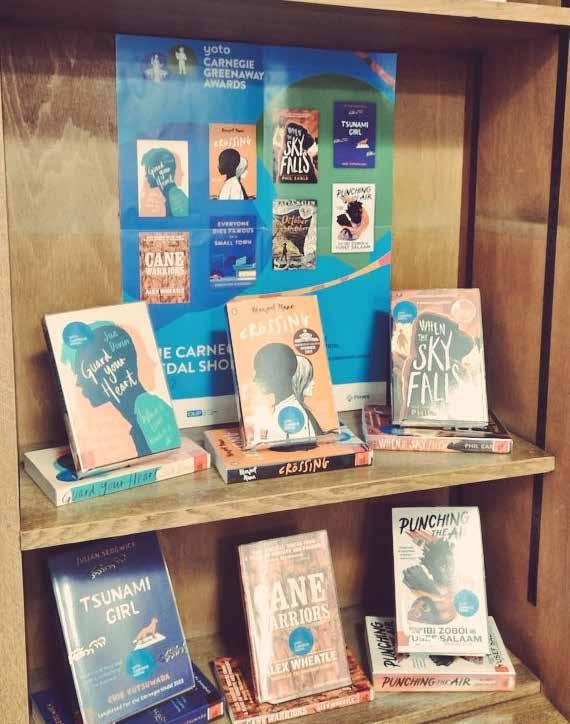
I have taken part in the Carnegie Club for two years in a row now and cannot express how much I love it. It is a fantastic opportunity to meet with both older and younger girls at Wycombe Abbey and be exposed to new literature. Our School Librarian ran weekly meetings to discuss one of the different shortlisted books each time. She never fails to bring excitement and enthusiasm to every catch up and we all thoroughly look forward to meeting each week. It is a great opportunity to take a break and discuss your thoughts about books!
The meetings have helped enhance confidence for expressing your thoughts and opinions about the specific focus of the book that week and it was a great chance to get to know younger and older pupils in the school. As well as being a social event, there is also an academic aspect. The Carnegie shortlist selection always has a wide variety of types of writing. For example, we have had verse novels, prose and even a bit of manga this year! It lets the reader really see and experience all the different types of writing in the world.
I have thoroughly enjoyed every aspect of the club, from the books to the food and the people in it. Each meeting is never anything short of very fun and interesting! We have the option to vote for our favourite and it is put forward to see
Our annual Future Ready Week takes the Lower Sixth on a journey from university application to interviews, to university experiences then to the workplace and beyond.
Pupils started the nuts and bolts of the applications process with UCAS Apply, Common App and College Essay based sessions, admissions test practices and personal statement workshops, run by the Sixth Form tutor team and the American and International Universities team. We welcomed representatives from Exeter, Nottingham and Warwick universities to speak at School, visited King’s College London and Imperial College London, and caught a glimpse of LSE and UCL while we were there. In addition, a number of pupils arranged to attend open days at other universities during the week, from Bristol to St Andrews, ensuring that the most was made of the opportunity to focus on their next steps.
A number of Wycombe Seniors also very kindly gave up their time to share their first, second and third year experiences of university in both the UK and the US. It was great to hear that they are enjoying their courses and they were flying the flag for their respective institutions. It was very encouraging to hear that they felt being in Clarence had given them a head start on their peers at university and had made that transition easier.
who will win the Carnegie Medal award each year. It feels amazing to be part of a bigger picture and to feel like the opinions you express are being listened to. I am excited to see what next year brings and I encourage anyone who enjoys reading and discussing literature to become a member of this amazing experience!
Isla LIVThe Subject Day, led by individual departments, proved to be a real highlight. It gave pupils a taste of what they could look forward to in studying their chosen subjects at university. The staff also enjoyed listening to the LVI EPQ and UPP presentations; independently chosen and researched topics showing the huge variety of academic passions that they have, from analysing representations of birdsong and behaviour in Carnival of the Animals, to evaluations of how far the Mughal Empire’s economy is recognisable in modern-day Pakistan’s economy.
An event we most enjoyed was an inspirational workshop by Mike Carter about confidence and control in interview-based situations. One pupil said “Loved the session and thought it was very helpful, not just for interviews but for day to day life too.” Other careers-based workshops included freelancing, switching careers, diversity, transferable skills and gender, and we welcomed Chloe McLaughlin from KPMG to talk about Degree Apprenticeships.
It was an action-packed week, offering food for thought, inspiration and time to take some important first steps in higher education plans for the future.
Ms Hollie-Ann Jeans Deputy Head of Sixth Formn the last week of term, the UIII and LIV assembled in Chapel for the opening ceremony of the STEAM Olympics. The podium was set and each team of four pupils carried the relevant flag for their assigned country throughout the day. The torch-bearer, Dr Dawber, opened the games by lighting the cauldron and the competition commenced.
There were five events to count, plus a Psychology quiz, involving finding QR codes scattered around the Outhouses in order to access the questions. Each event took place in a different science lab and involved a practical challenge with a measurable outcome, which led to points on the leader board. In the Chemistry event, ‘Go Crackers!’, the challenge was to find the energy content of crackers, using an experimental technique. ‘Highlights’ involved building the highest possible tower from paper to hold an egg, with bonus points to be had if teams managed to light a bulb on their tower too, using
only rudimentary equipment. The ‘Marble Run’ produced some highly imaginative solutions to minimise the descent time for a marble. In ‘Super Speedy Sums’, pupils ran a relay race of maths problems, relying on running speed as well as brain speed for success. In the Biology event, ‘It’s a Gas!’, pupils had to measure the rate of respiration of yeast and choose the reaction conditions to maximise the volume of carbon dioxide gas given off, which they collected in a balloon. There were some fantastic team efforts, with paper towers reaching the ceiling of the Physics Lab and impressive balloons
of carbon dioxide indicating strong competition.
Mr Woods kindly awarded gold, silver and bronze medals to the top three teams, who celebrated success on the podium, drawing to a close the day of fun and challenge, in which pupils developed their teamwork and collaboration whilst applying creativity and imagination to optimise their solutions.
 Mrs Sue Buxton Director of Science and STEM
Mrs Sue Buxton Director of Science and STEM
I
n November, Upper Sixth medics travelled to Harrow to take part in our annual Medical Conference with Harrow School and Radley College. At this event, two pupils from each school give a ten-minute presentation on a subject of their choice, and then fielded questions from the floor. This year Vanessa discussed the impact that human bipedalism has had on medicine and Bea discussed gender inequality in pain management as demon strated by the treatment of endometriosis.
All of the talks were highly informative, and the speakers were all congratulated on the quality of their presentations.
As the panel of judges met to deliberate, we moved on to supper where the prospective medics discussed the different talks and the application process that they had just started.
The judges had a difficult job separating the top two talks, reporting that they were separated by the thickness of a cigarette paper. Bea just lost out, a decision that was well discussed on the journey back to School!
I would like to thank all those who attended for helping the event run smoothly but particularly Bea and Vanessa for volunteering to deliver their talks.
At the beginning of term, we were finally able to make the journey across London for our A level field trip. We were unable to do this last year due to the Covid-19 restrictions, but despite the delay, the trip still retained its insightful and cultural meaning. We were able to increase our learning around regional inequality, as well as the significance of the different players involved in the place-making process.
Starting the day in Stratford town centre, we conducted our own primary data collection through interviewing members of this tight-knit community. This provided us with a first-hand account of life in Stratford, and we were especially surprised at the large migrant population that gives Newham its ethnically diverse characteristics. We then walked to the Carpenter’s estate and began an environmental survey of the housing that we had studied in class. Even though we had previously learnt about the government investment of £1 billion into this estate, after talking to a member of the local council, we were able to gain a new perspective of how the residents feel about their homes and livelihood being permanently changed.
The Olympic Park provided us with an example of the benefits connected to brownfield site regeneration. After learning about the affordability of the services that the Olympic Park provided, as well as the sustainability of the infrastructure built, it was evident that the London 2012 Olympic Games has had lasting positive effects within the community of Newham. After lunch, we headed to Hackney Wick, an area of urban regeneration with many informal representations of place, mainly artistic graffiti. We learnt about the advantages of organic placemaking, and how Hackney Wick has become a prevalent location for aspiring artists to open galleries and workspaces in recent years. In order to understand the full impact of the Olympic Games, we
then visited the East Village, a region whereby different players transformed Athlete accommodation into resident housing after the Games. It was incredible to witness how private players can generate inwards investment into a previously deprived area, turning it into a profitable real estate hotspot. Finally, we ended our day at Westfield in Stratford where we were taught about the influential nature of retail regeneration, and also managed to do some shopping ourselves!
Overall, the day was a complete success. We were all extremely grateful to have been given the opportunity to visit the regions that we have been studying in our lessons, and to further understand the multifaceted approach surrounding place-making.
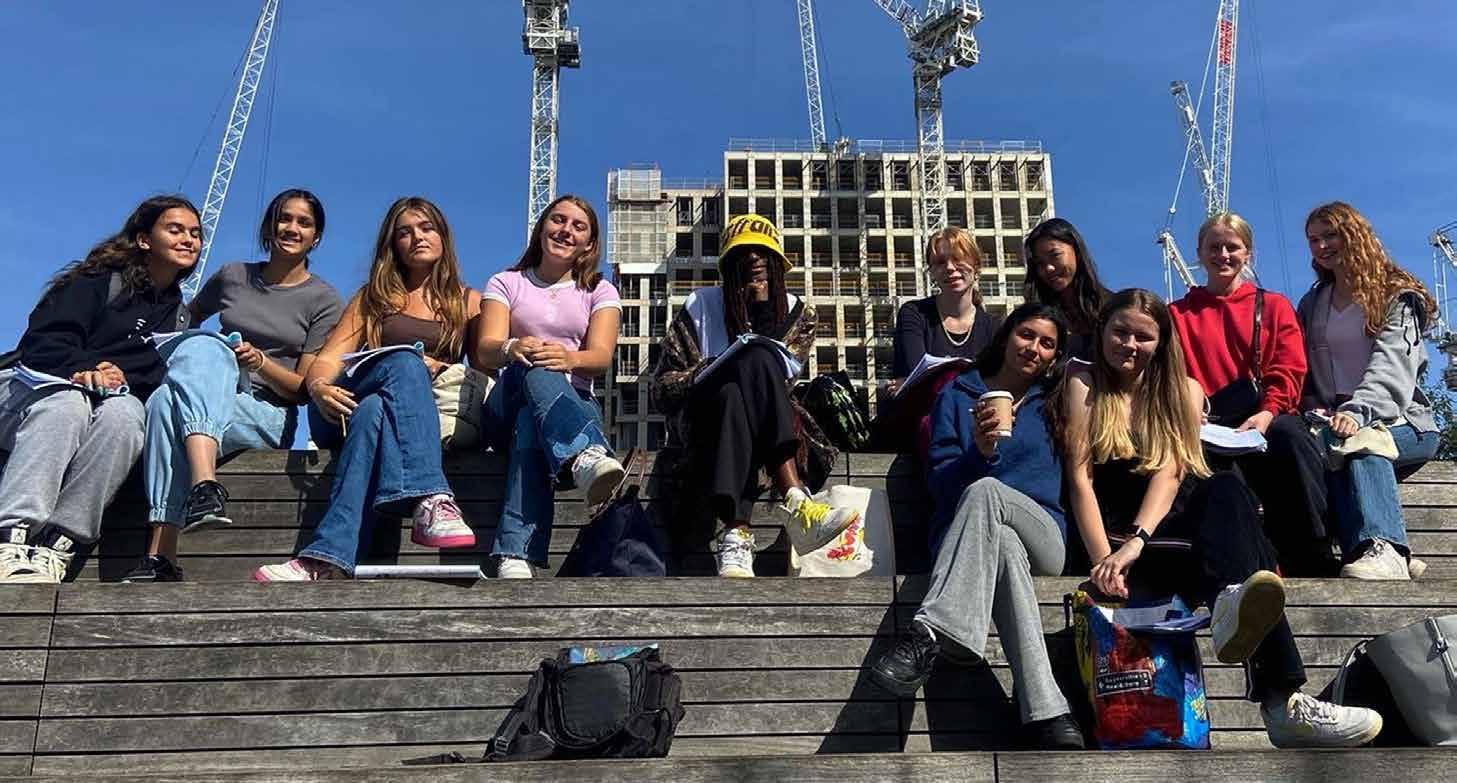 Alice UVI
Alice UVI
It was incredible to witness how private players can generate inwards investment into a previously deprived area, turning it into a profitable real estate hotspot.
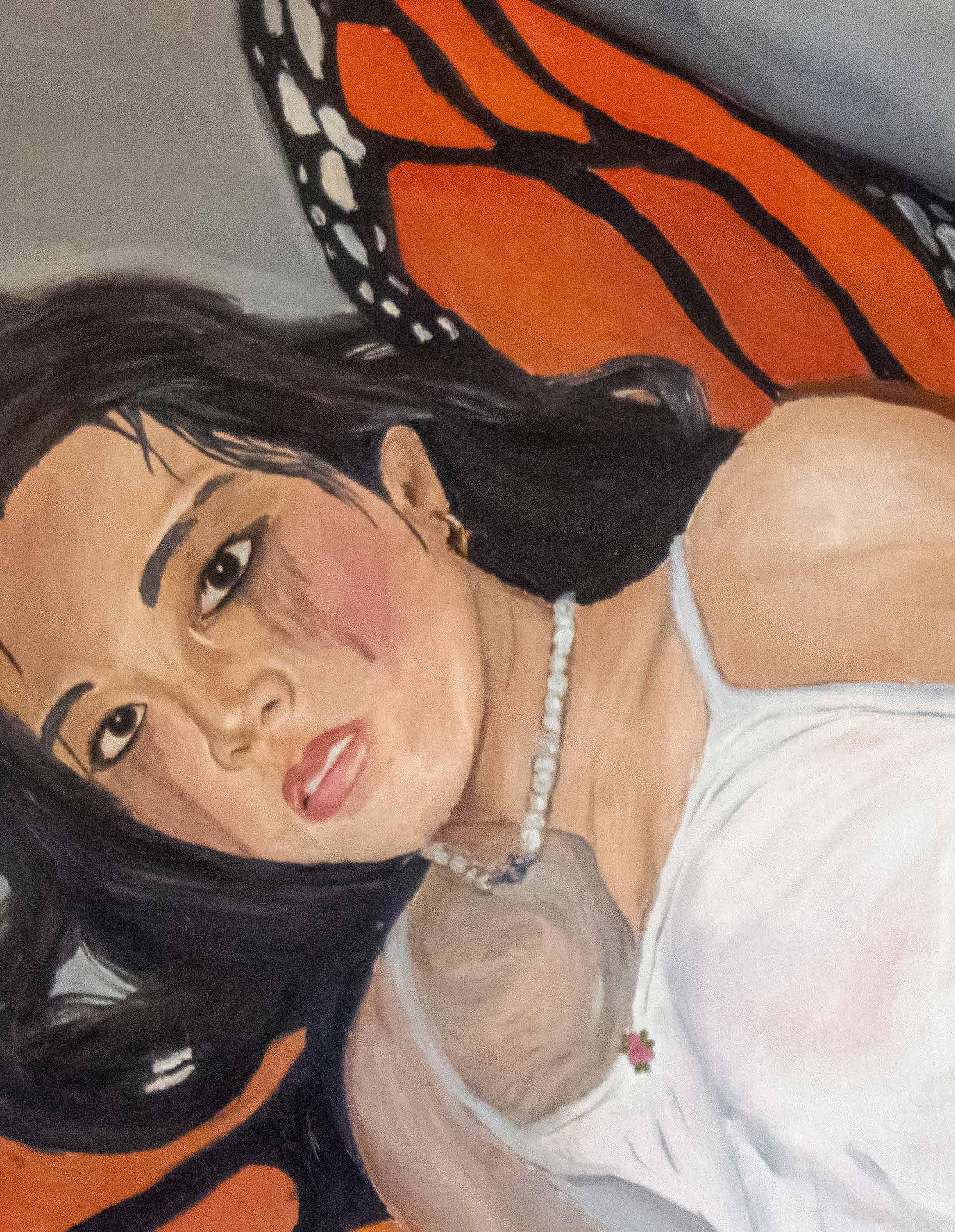


The Sweet Science
Jeneba Kanneh-Mason
By the time of the performance, the boxing scenes were seamless.
In January, 11 Sixth Formers, including myself, took to the stage to perform Joy Wilkinson’s The Sweet Science of Bruising. Set in 1869, it told the story of four women who had been lured into the mysterious world of boxing by Professor Charlie Sharp. In the ring, they escaped the struggles of the outside, competing for the ultimate prize – enough money to pay their way to freedom. I chose the play knowing it would excite the audience, taking them from boxing rings to backstreet alleys and moving them to both laugh and cry. My main aim, however, was to draw attention to the treatment of women in the Victorian era.
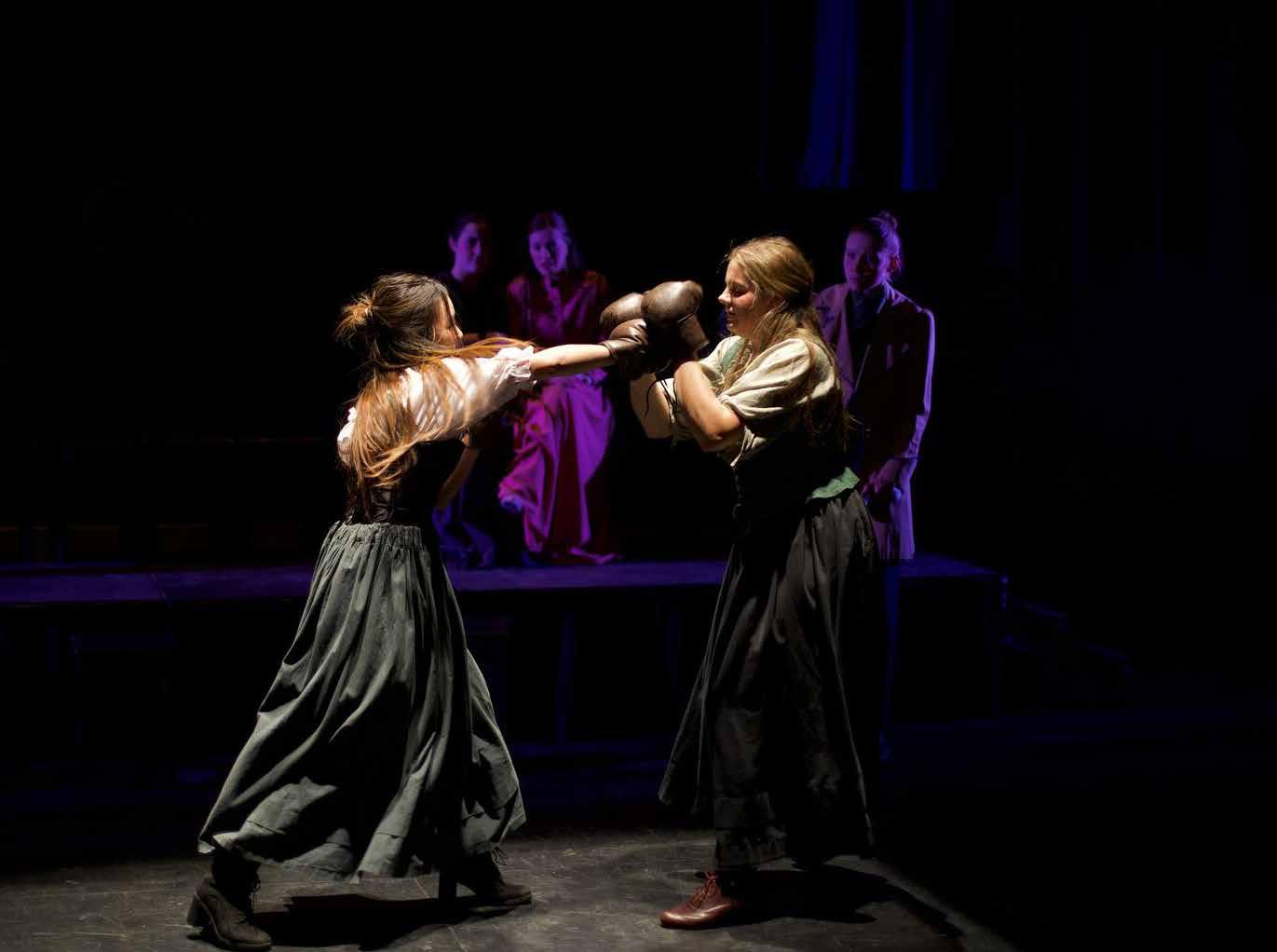
Everyone taking part was able to balance schoolwork, university applications, and rehearsals very well. However, there was one slight setback: I didn’t have any boxing knowledge. Luckily, Lauren, who has a brown belt in kickboxing, volunteered to choreograph the fight scenes, and it was not long before I had started chanting the movement sequences alongside her. By the time of the performance, the boxing scenes were seamless. I also enjoyed exploring aspects of the production beyond acting, including lighting, costume, and sound.
Making decisions about these elements of the production was new to me. Thanks to Ms Lansley-Davies, we were able to find five pairs of Victorian boxing gloves, a prop
which I hadn’t been sure we would be able to locate. Mr Myles was also incredible in helping to bring the characters to life with lighting. I was particularly in awe of the boxing ring he created out of light alone.
Special mention must also go to Semal, who dedicated the week of the production to designing and chalking a sign for The Angel, the setting of the play, on the back wall of the stage.
Unsurprisingly, my most exhilarating moments were those spent backstage.
It was my first time performing to a live audience since 2020 and it felt surreal.
As the director, I was nervous about whether my artistic choices would entice
the audience, so it came as a relief when they started to laugh and gasp. To know that the hours we had put into rehearsing despite disruption and uncertainty had been worth it made me proud. It was incredible to see everybody bringing a new spark of spontaneity to their characters in the final performance. A smile flickered across my face as we spoke the final line – “the lady boxing champions of the world” – and the lights dimmed. We had persevered through all the challenges and disruption to bring the play to life.

The Lancaster Arts Centre was alight with song and dance in March as the production of Sister Act got underway. Girls ranging from Lower Fourth to Lower Sixth were dressed head to toe in nun’s habits and disco themed outfits ready to showcase their talent on the stage. The show was a fantastic fusion from the School’s Drama and Music departments to create a dazzling production filled with a range of characters from elderly nuns to some incredibly suave gangsters who blessed - no pun intended - our stage.
This was the first Wycombe Abbey musical for quite some time, and it was so refreshing to see the production come to life after two years of no mixed year group plays. Sister Act had been in production since late 2020 and after several Covid-19 mishaps, a recasting and some strong perseverance from the staff - the show without a doubt proved worth the wait. Rehearsals began in September 2021, it is amazing to think that what began with all of us gathered around Mr Reid’s piano trying to conquer harmonies could turn into such a triumph. I know that the rest of the cast would agree that we all became a
family during the six months of rehearsing, I’ve come to find that there is something so special about singing together in a group, it forms a bond like no other.
On performance nights, butterflies filled everyone’s stomachs as hair spray was spritzed, wrinkles drawn, and fake moustaches applied. Nerves were certainly particularly high during all the costume changes with several speedy swaps and frantic checks to see if trousers had fallen, however, all the crossing of fingers and anxious watching worked a charm as the turnarounds were smooth and seamless
thanks to the brilliant team behind the scenes; it was just as successful as all the choreography and melodies that shone on stage each night. All of this was to the credit of the amazing staff that worked tirelessly to put all their spirit and flair into the shows, I can’t thank them all enough for building one of the most memorable experiences of my whole School career and we all shared such joy in its performance!
On performance nights, butterflies filled everyone’s stomachs as hair spray was spritzed, wrinkles drawn, and fake moustaches applied.
The Wardrobe never ceased to amaze us with its surprising encounters.
The Lower School Arts Soirée offered an opportunity to showcase some of our youngest talented performers.
An evening’s entertainment combining the two performing arts of music and drama created a wonderful show for all.
The evening started with our musicians in the Archer Recital Hall where the Chancel Choir performed first with a polished performance of Will Todd’s The Call of Wisdom , featuring a lovely solo from Nell (UIV). The central part of the concert was giving over to chamber ensembles which included three of our Flute Groups: Popp, Quantz and Tromlitz, with a somewhat theatrical series of arrangements such as Verdi’s La Donna è Mobile , the ‘Pizzicato’ from Delibes Sylvia and the Overture to Mozart’s The Marriage of Figaro . String chamber ensembles were represented by a promising UIII String Duo and the awarding-winning Piano Trio who performed Three Miniatures by Frank Bridge. There was an upbeat end to the concert with the Junior Concert Band’s lively renditions of Adele’s Rolling in the Deep and Rick Astley’s, ever popular, Never Gonna Give You Up
Mr Stefan Reid Director of MusicThe Soirée then moved to our Lower Four actors as they performed The Wardrobe.
The play is based around an old wardrobe as it is passed from place to place. It progresses through important times in British history and takes the audience on a dramatic, humorous and gripping adventure. Throughout the centuries, people come to the wardrobe looking for something that they are missing. Whether it was sanctuary, friendship or dreams, they always leave with something new. Ranging from Elizabeth of York (the mother of King Henry VIII) to the times where slavery was legal in Britain, and all the way to modern day, The Wardrobe never ceased to amaze us with its surprising encounters. We have all loved the experience and are sad to not be able to perform it again.
Clelia and Tina LIV
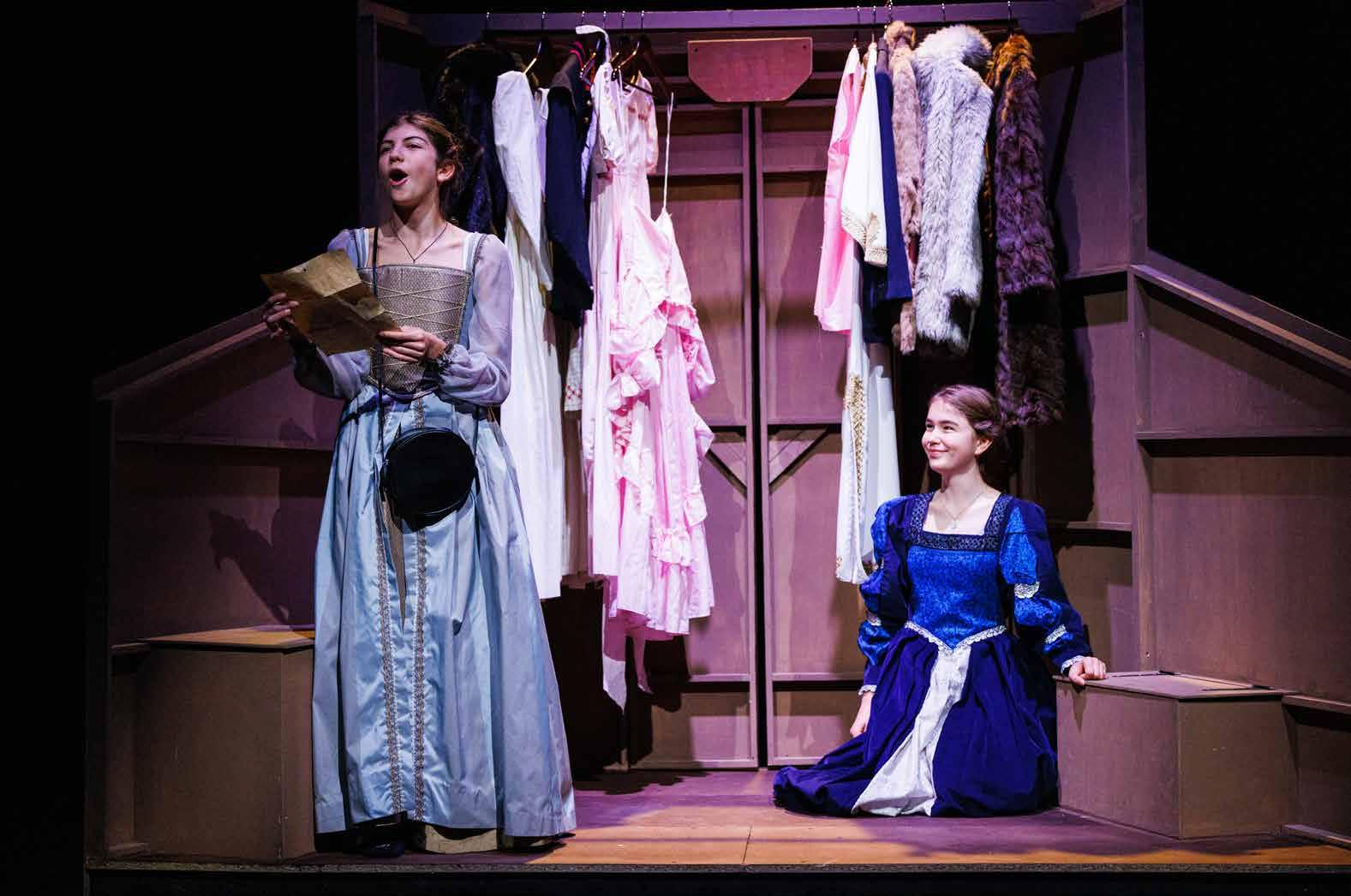


Arabian Nights , a play about a heartless king and a courageous women called Shahrazad with the power to tell stories.
The audience listened to Sharazad’s tales that she tells to King Sharaya, hoping that she won’t get executed the next day and be the saviour of the city of Persia. In the play, we learn the important qualities of second chances, not losing your way, forgiveness, greed, envy and even embarrassment.
With 30 UIIIs in total, we got to explore our interests with all our friends whilst laughing and singing over rehearsals and pizza.
Behind the scenes will be a memory I keep forever, the funny moments along the way made it the breath-taking end result that it was. My favourite moments had to be the first time we performed in front of an audience. All the hair and makeup,
nerves and excitement were really exhilarating. As soon as we had finished that performance, it was so nice to hear what people thought. We were thrilled with our efforts over the course of the production.
Through watching the play, we learnt the important qualities of second chances, not losing your way, forgiveness, greed, envy and even embarrassment.
To keep up to date with Drama at Wycombe Abbey, please follow us on Instagram @WycombeDrama
The Art department and its pupils have had another successful year producing vibrant work and experimenting with a wide range of materials.
Our Lower School Scheme of Work is devised to introduce a range of processes and materials from which we can develop short purposeful assignments with skilful outcomes using Digital Photography, Creative Textiles, 3D clay modelling, Acrylic painting and Printwork. Drawing
is at the heart of every project and we encourage the use of sketchbooks to research critical appreciation of a wide range of artists and periods. Upper School work flows naturally from strong drawing and we encourage personal journeys and exploration of materials. Our ever popular Artist workshops have enabled the extension of knowledge and activity in addition to pupils’ lessons. Our Artist in Residence, Mrs Phipps, also supports experimentation with the medium of glass.
A mainstay of the Art programme is the ever-popular whole-school photography competition. The theme this year was Spaces and Places, which was interpreted in lively and atmospheric compositions. Congratulations to Natalie (LV1) who was this year’s winner. See page 34 for the results.
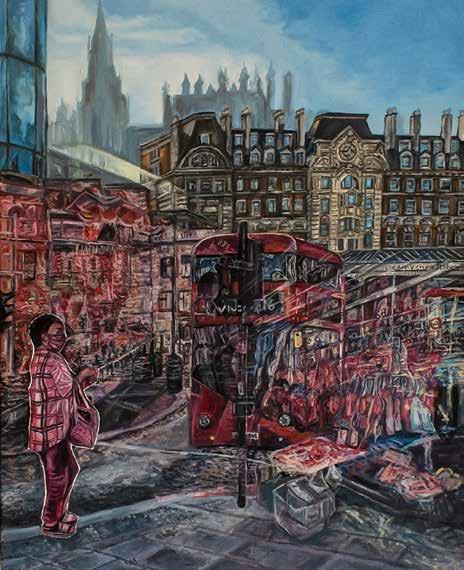
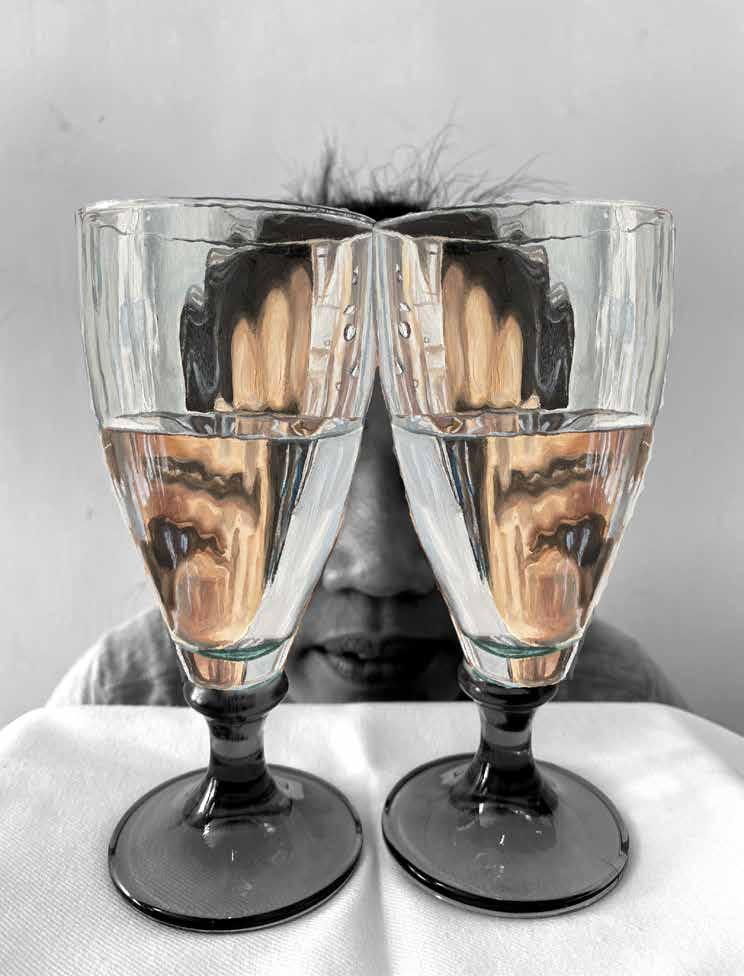
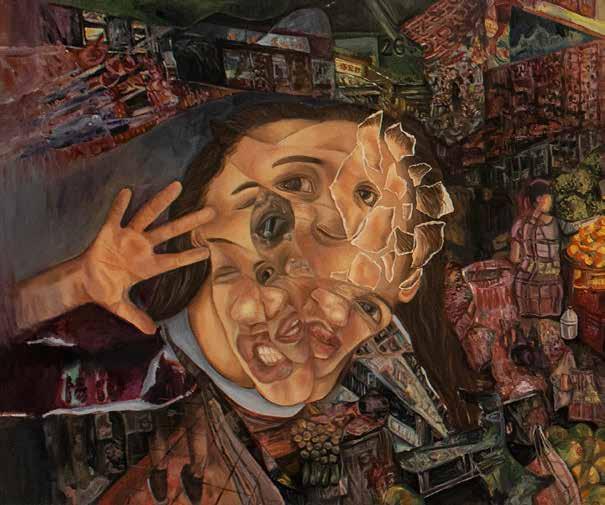 Alex, UV1
Alex, UV1
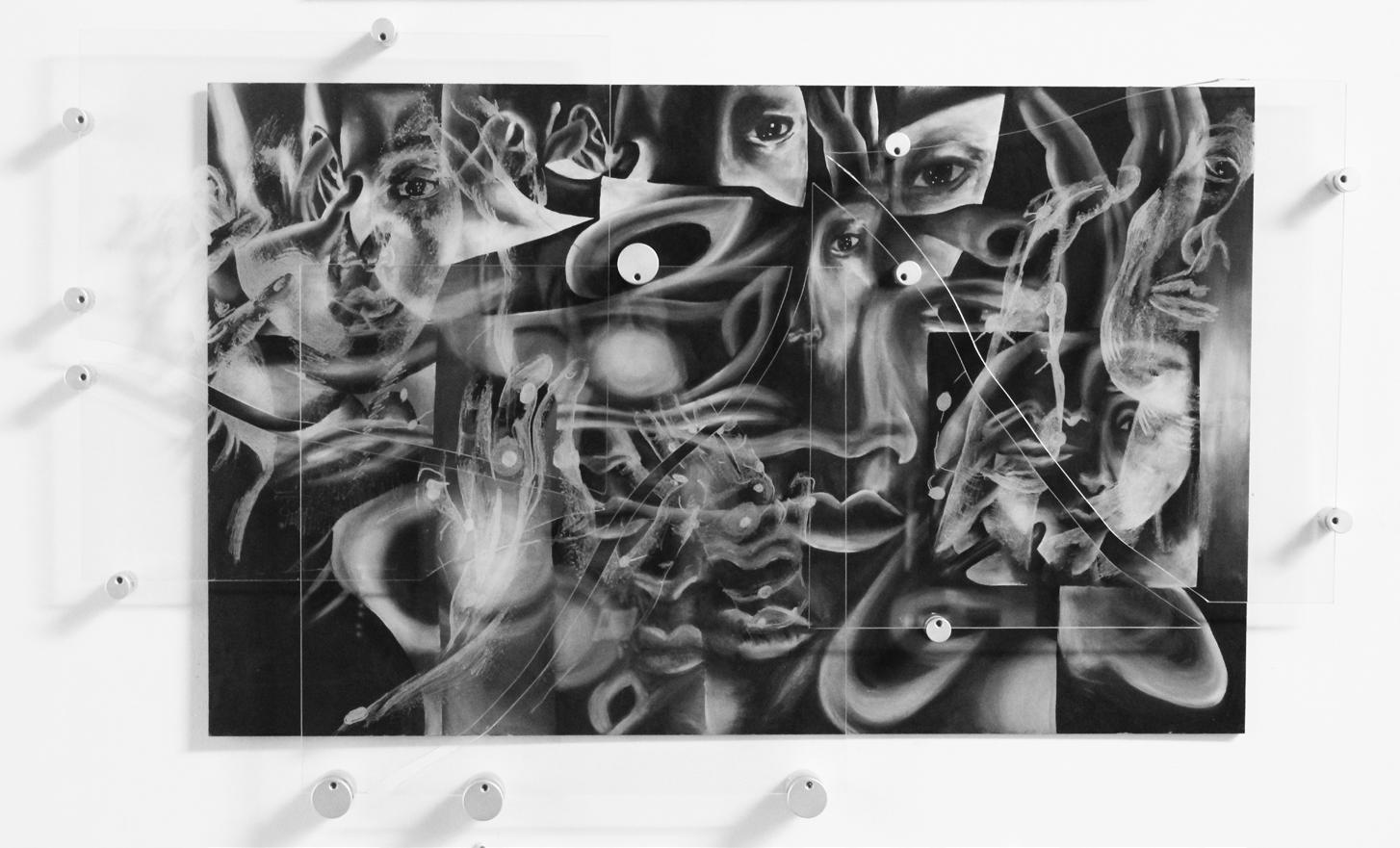
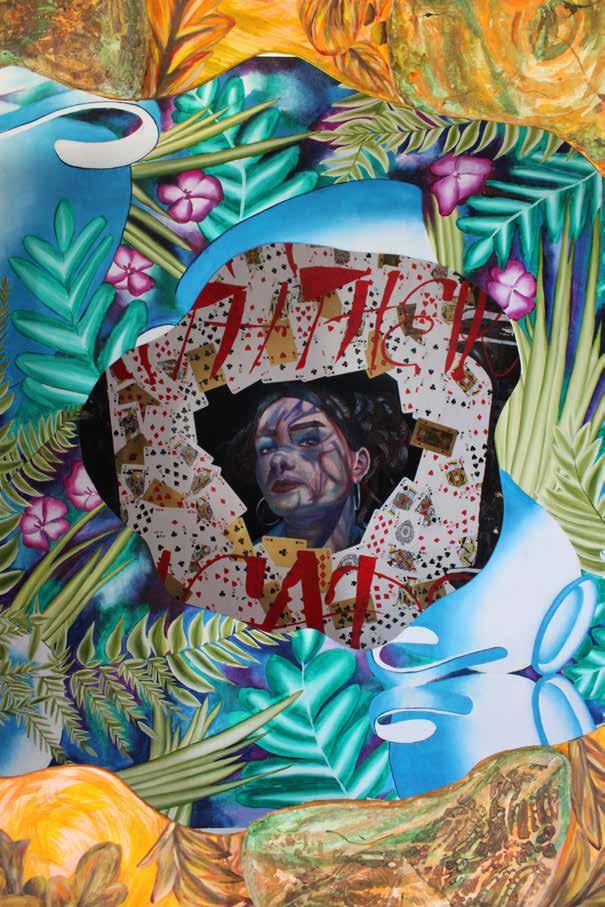
 Bea, UV1
Bea, UV1
Bea, UV1
Bea, UV1
Bea, UV1
Bea, UV1

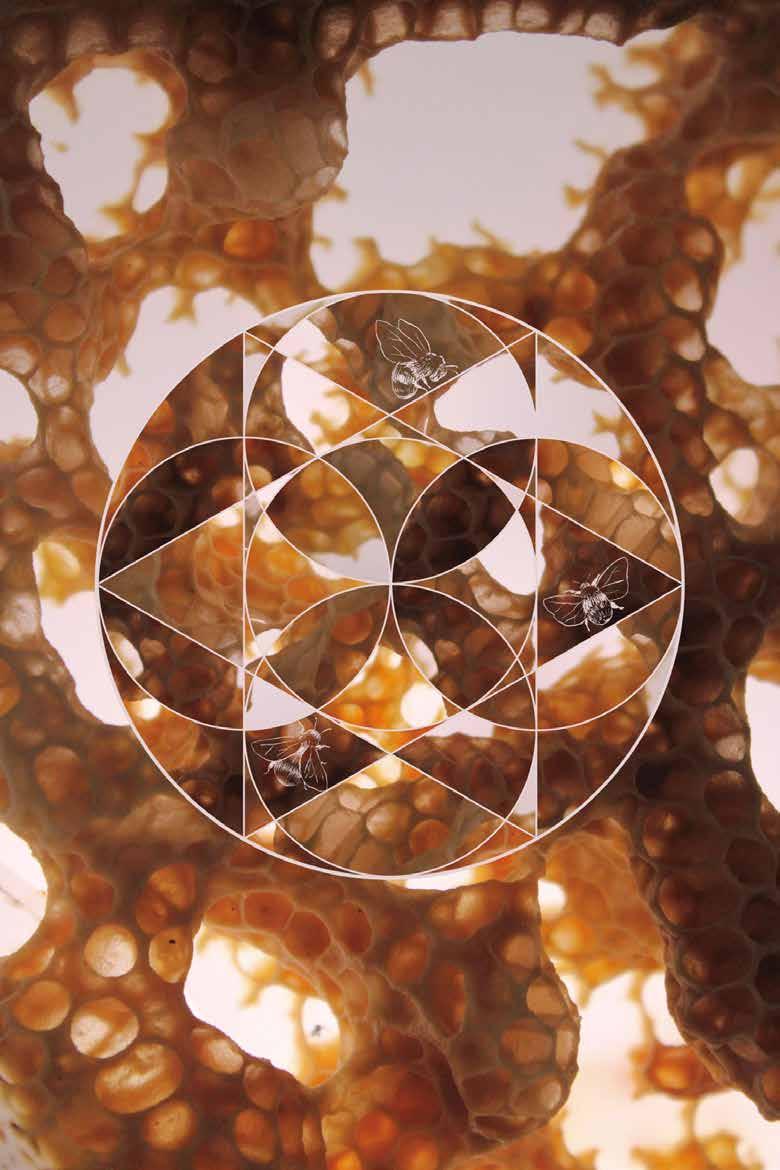
 Delphi, UV1
Delphi, UV1
Delphi, UV1
Delphi, UV1
Delphi, UV1
Delphi, UV1


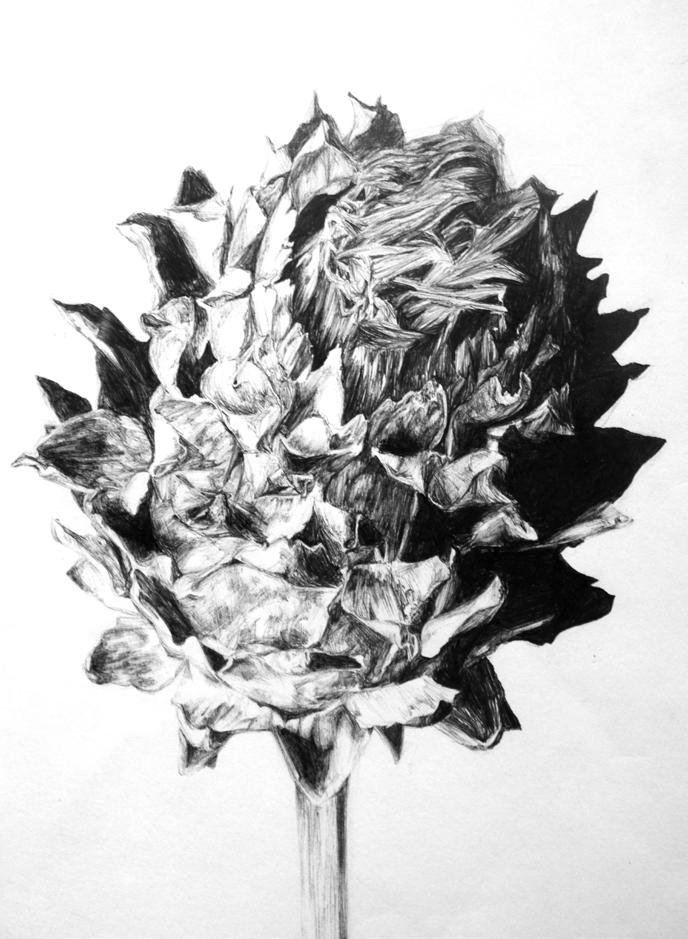
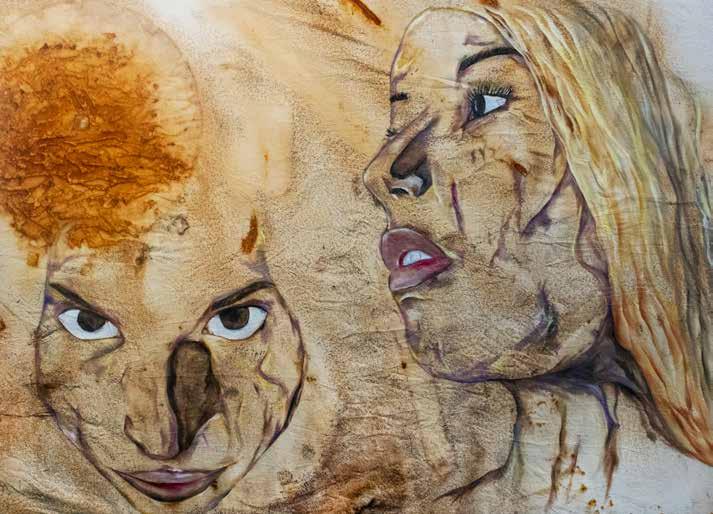
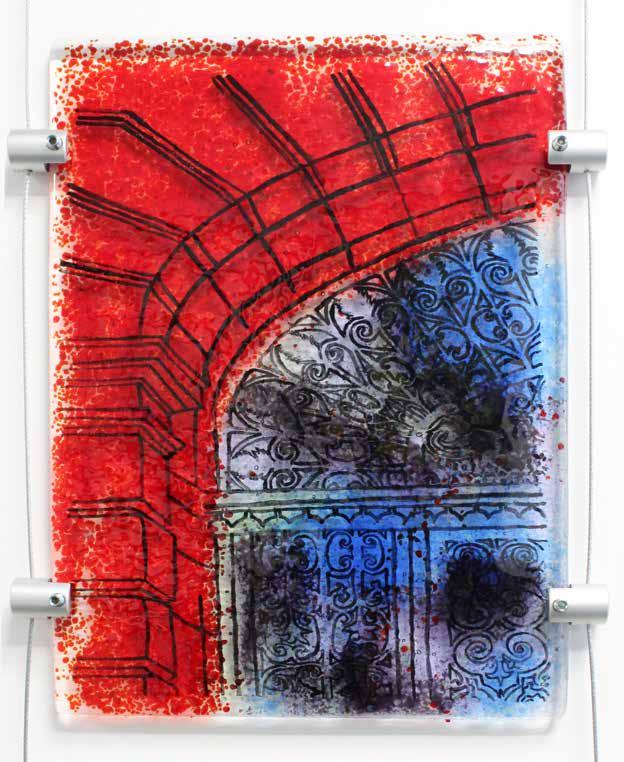
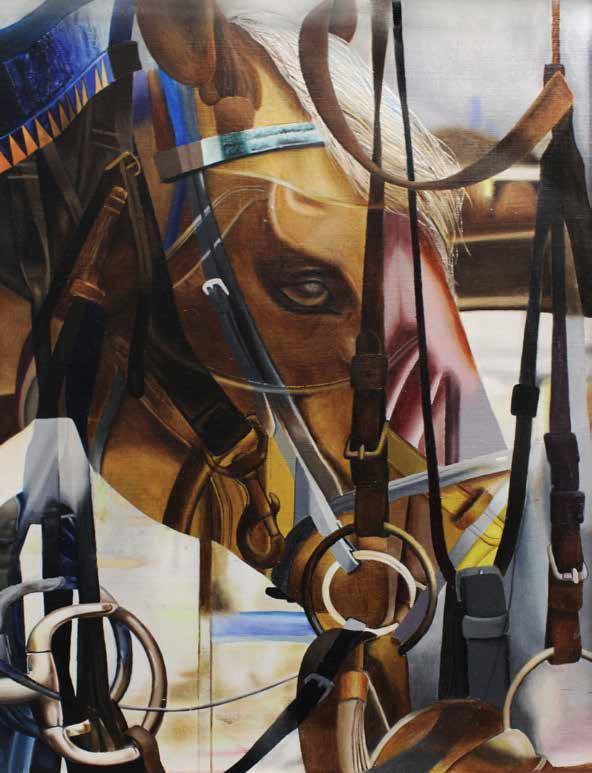
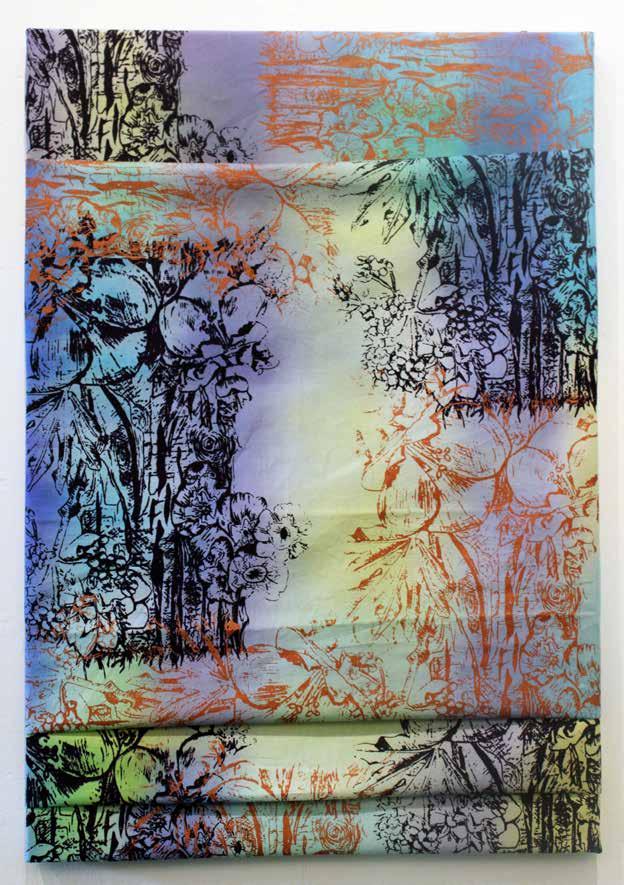
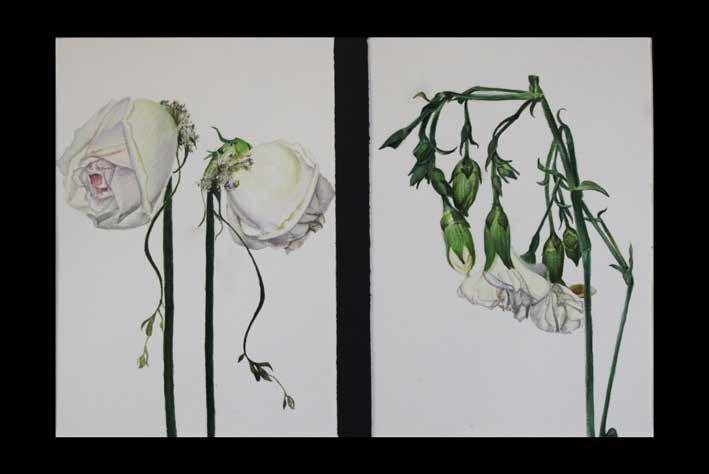





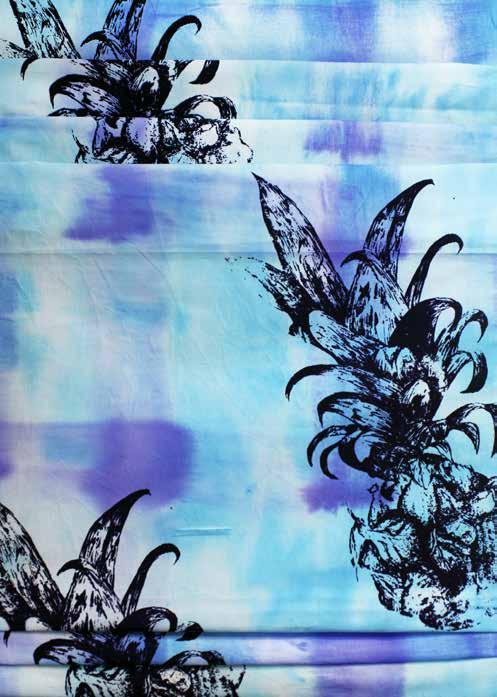 Sylvia UV
Sophie LV
Zahirah UV Wania UV
Sophia LV
To keep up to date with Art at Wycombe Abbey, please follow us on Instagram @WycombeArt
Sylvia UV
Sophie LV
Zahirah UV Wania UV
Sophia LV
To keep up to date with Art at Wycombe Abbey, please follow us on Instagram @WycombeArt

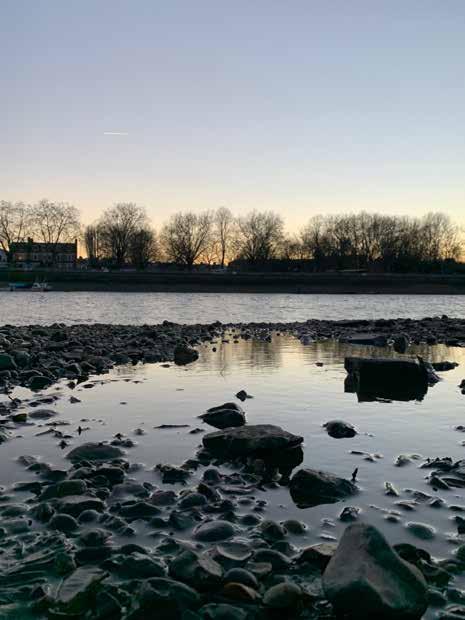
 Natalie (LVI) - winner
Freya (LV)
Lola (LV)
Natalie (LVI) - winner
Freya (LV)
Lola (LV)
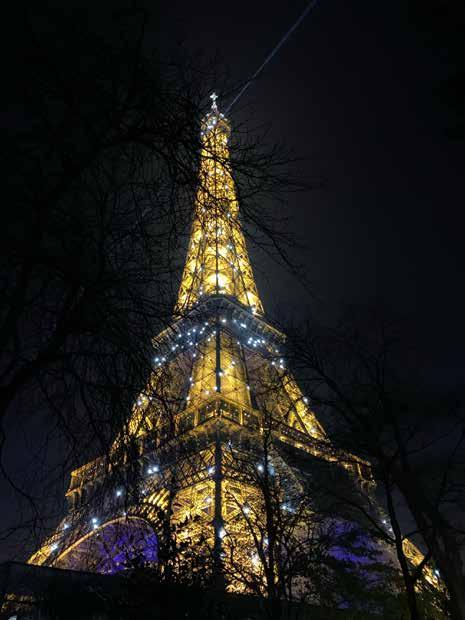
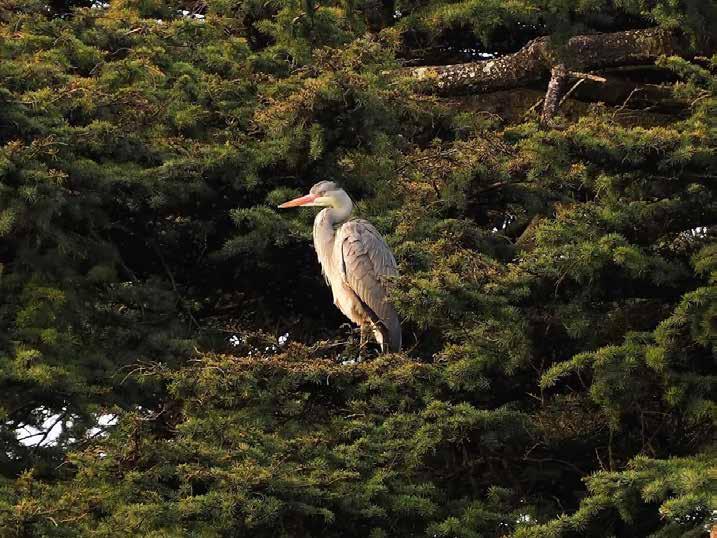
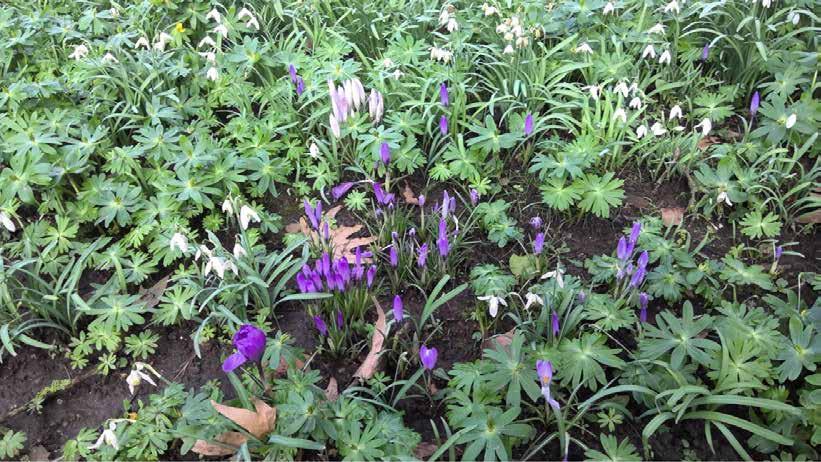
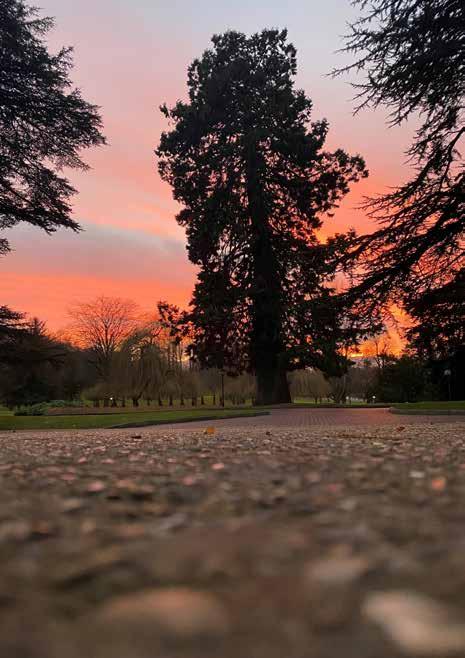
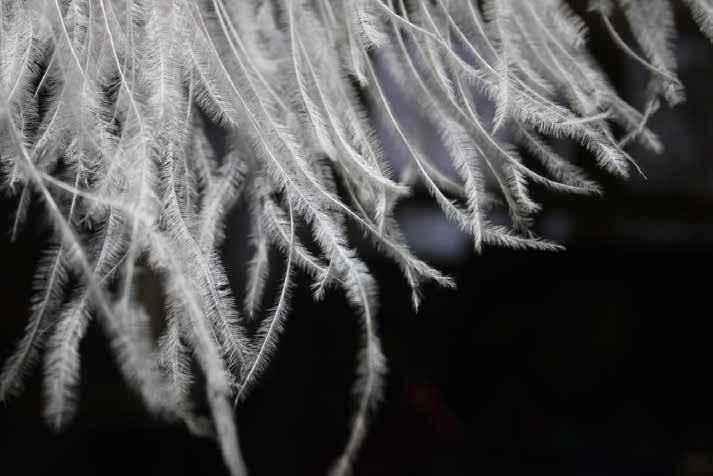 Ava (UIII)
Annabelle (UIV)
Elsa (UIII)
Alex (UVI)
Alisha (UV)
Ava (UIII)
Annabelle (UIV)
Elsa (UIII)
Alex (UVI)
Alisha (UV)
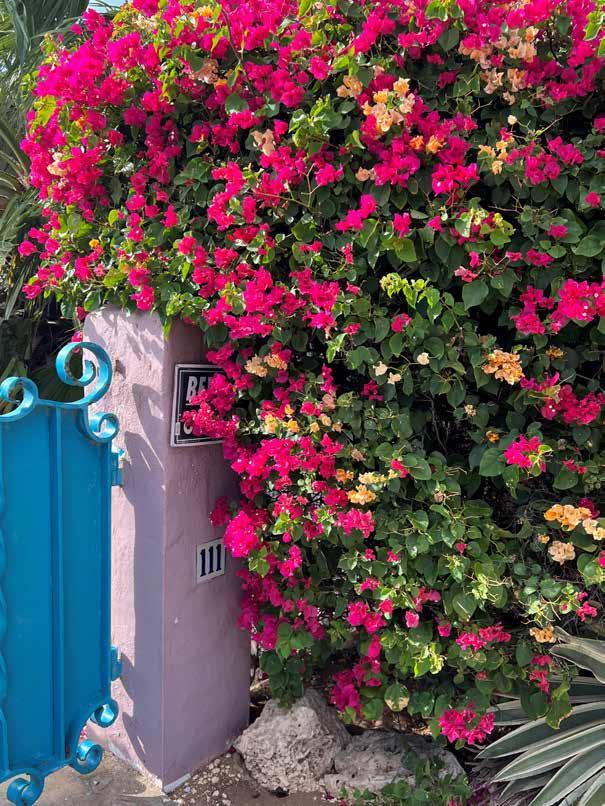

 Grace (UVI)
Hana (LVI) Sylvia (UV)
Grace (UVI)
Hana (LVI) Sylvia (UV)
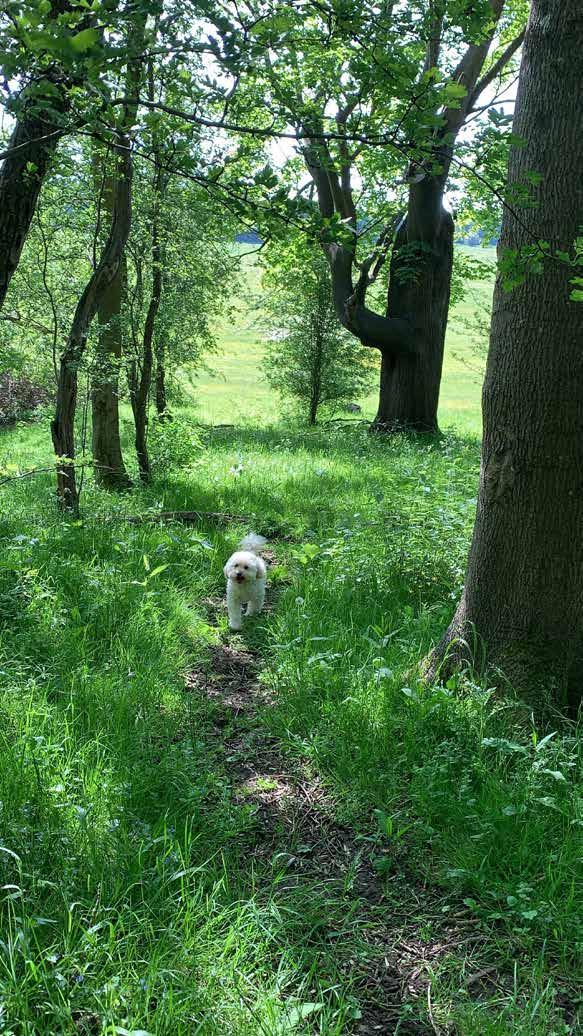
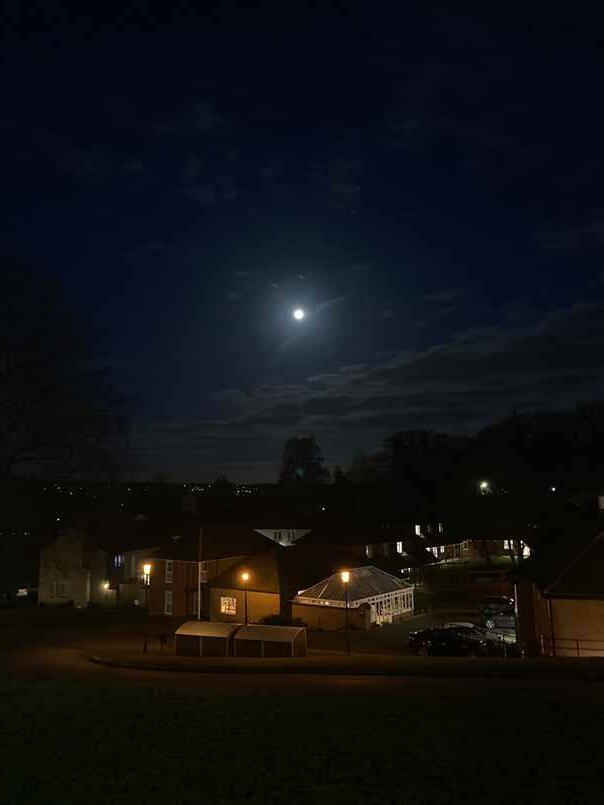 Tallulah (LIV)
Helen (LIV)
Madeline (UVI)
Tallulah (LIV)
Helen (LIV)
Madeline (UVI)
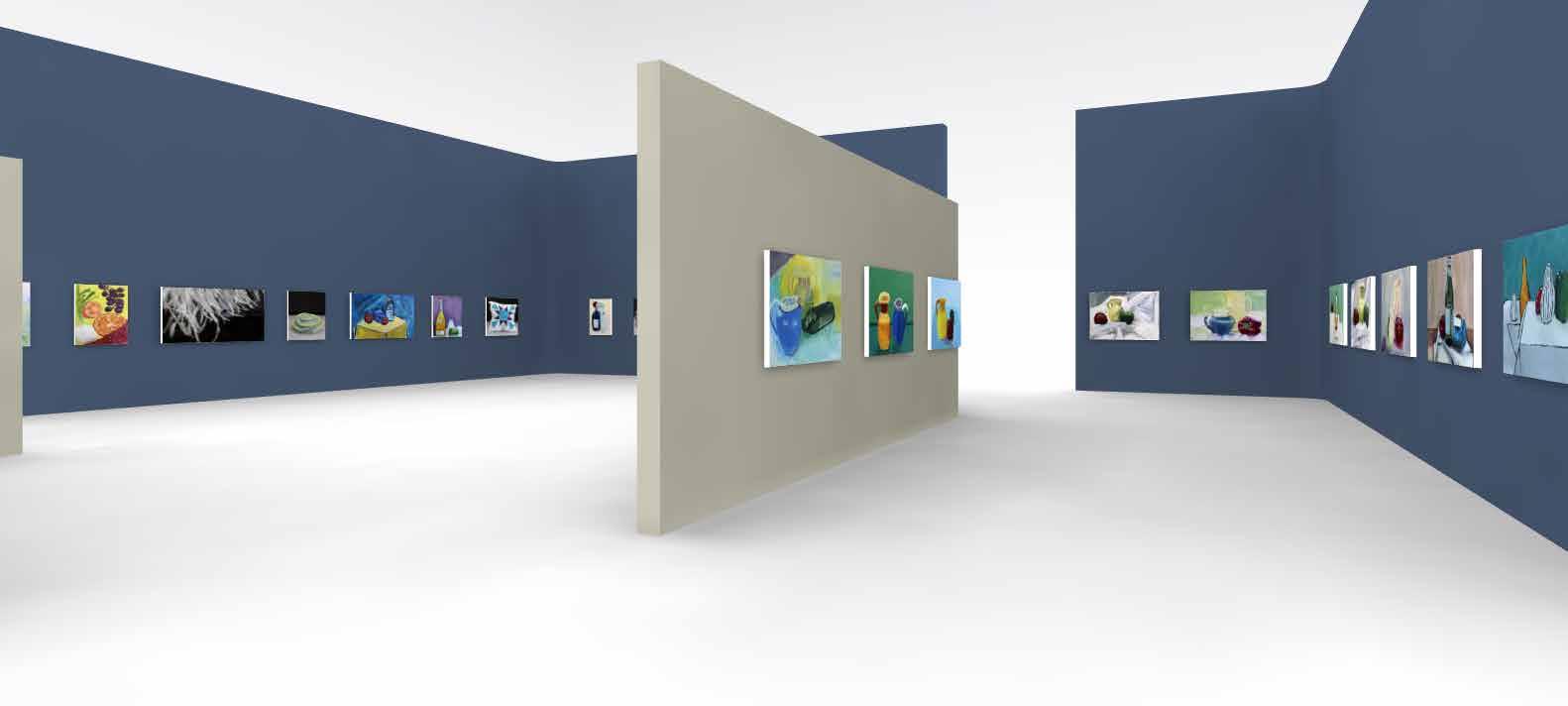
In June, we were excited to share the 2021-2022 Wycombe Abbey Virtual Art Exhibition. This exhibition spanned four schools, the School here in the UK, two schools in mainland China and one school in Hong Kong. Despite the ongoing Covid-19 restrictions in mainland China and Hong Kong, these amazing pupils have been able to come together to show their incredible artwork through these virtual exhibitions.
Wycombe Abbey in the UK shared almost 200 pieces from pupils of all year groups as they explored, developed, and created their work with a variety of media and skills including printmaking, creative textiles, ceramics, photography and acrylic painting. Encouraged to develop their own styles, pupils embraced the artistic, process and journey to discover their talent and push their own thinking, creativity and innovation. A level pupils explored and developed their own ideas by refining and sustaining their individual creative journeys in sketchbooks and in large scale final pieces. Our resident glass artist encouraged the examination pupils to explore the properties of glass fusion to extend their ideas.
Wycombe Abbey School Hong Kong’s exhibition showcased almost 100 pieces from younger pupils aged five to 14. The pupils experimented with different ideas, materials, and tools through team and individual projects. They were inspired by different artists from different eras around
the world such as Alberto Giacometti, Julian Opie and Romero Britto. They also celebrated Women’s History month by researching Mary Blaire, Louise Bourgeois, Yayoi Kusama and other famous female artists who made huge impacts in the art world. The theme was ‘Together, We Are Better.’

Wycombe Abbey School Hangzhou, in its inaugural year, exhibited over 80 pieces of art from the School’s first pupils in Years 7 to 11.
At Wycombe Abbey School Changzhou, young artists created almost 200 pieces of artwork in various formats.


This collaboration across the schools is an example of the Wycombe spirit of creativity and imagination.
Yael Marwah Wycombe Abbey International Executive CoordinatorYou can view the exhibitions from our news section on the website.
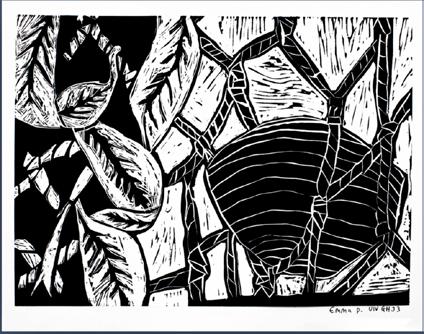
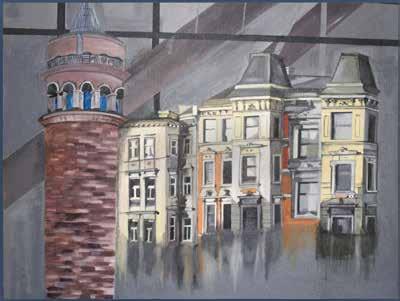
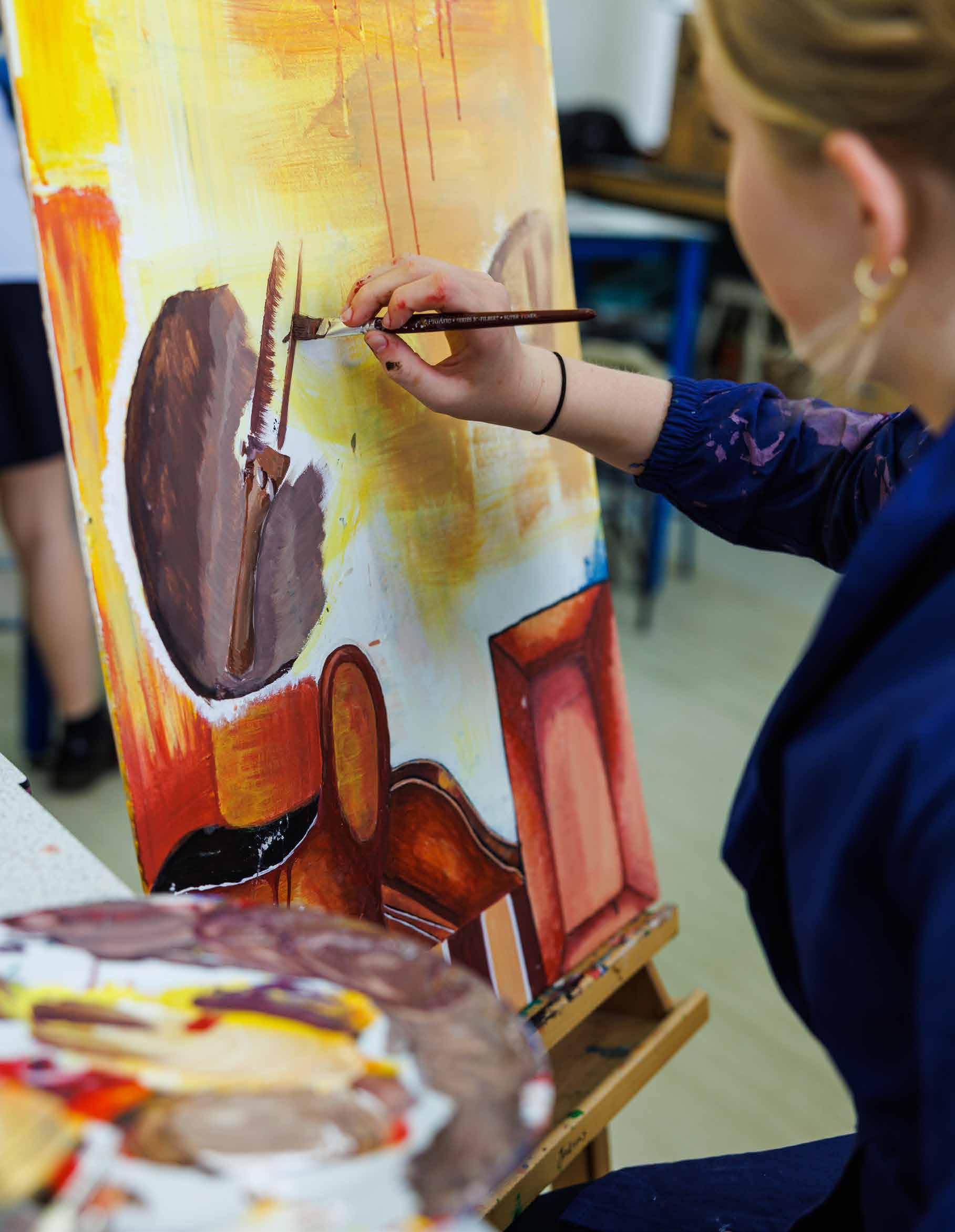
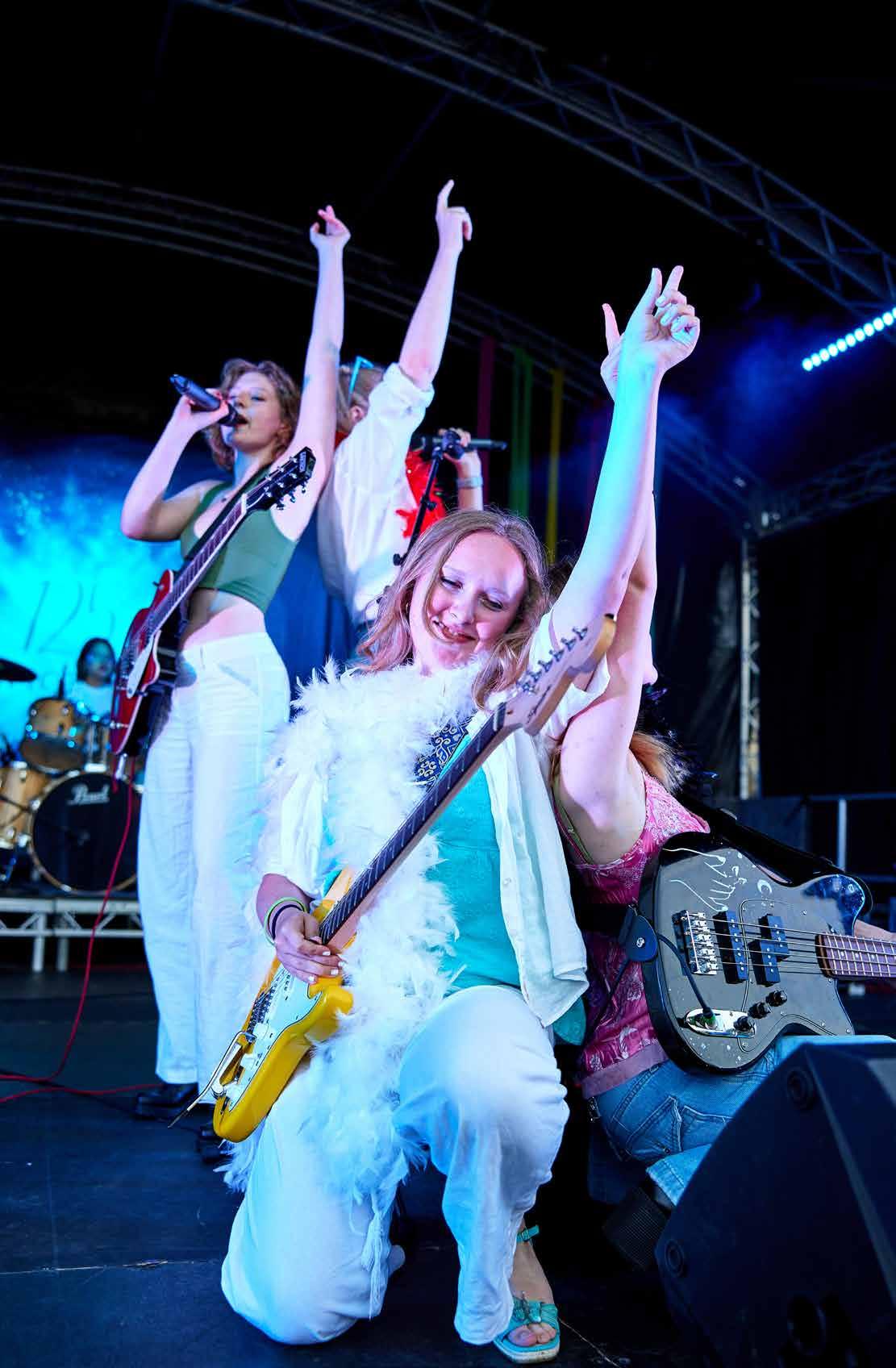
This year saw a long-awaited return to School music-making. It has been wonderful to see our choirs and orchestras back to strength with girls across year groups rehearsing and playing together. We had a welcome return to our programme of events in the Autumn Term ranging from the weekly lunchtime concerts through to the large-scale events such as RockSoc, School Communion and the Archer Concert. This only got better in the Spring and Summer Terms with the 125 Concert, school plays, professional workshops and of course GlastonAbbey!
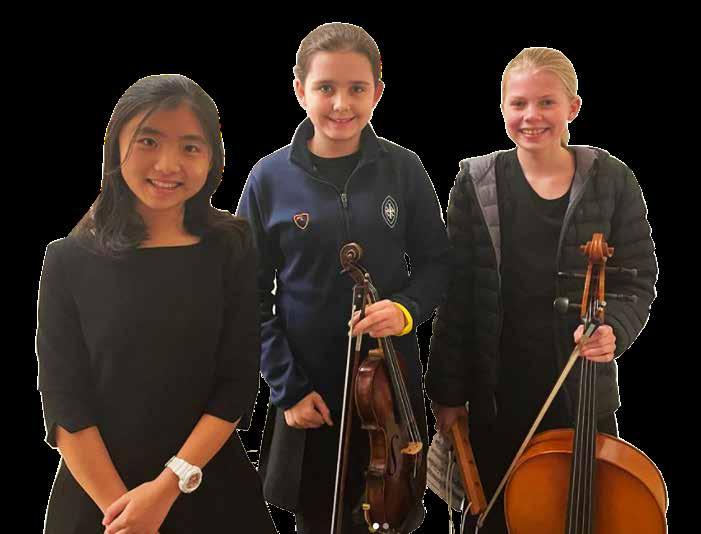
fter five days of qualifying rounds held at various schools and comprising of 50 chamber music ensembles, 14 were selected to appear at the Finals held at St George’s, Hanover Square - a beautiful venue where Handel worshipped. We were pleased that three Wycombe Abbey groups were selected to play: Junior Piano Trio, Senior Violin Trio and Senior Piano Quintet. We were the only school with this many ensembles in the Finals.
There was great anticipation in the church as the previous competition was more than two years ago. All groups presented well and it was an exceptionally high level of music-making from everyone; it was a wonderful concert. There was great buzz as well as Wycombe Abbey girls supporting each other with the usual cheering. What a delight when our very own Junior Piano Trio (Judy, Allegra and Chloe) were awarded first prize in their category. They are a new group but already have refinement and will continue to grow for many years to come.
The evening proved that chamber music is loved by all the young musicians and although it had been placed on ‘pause’ it is now forging ahead with a new vigour. We are all very excited about the future.
Mr Gonzalo Acosta Head of Strings
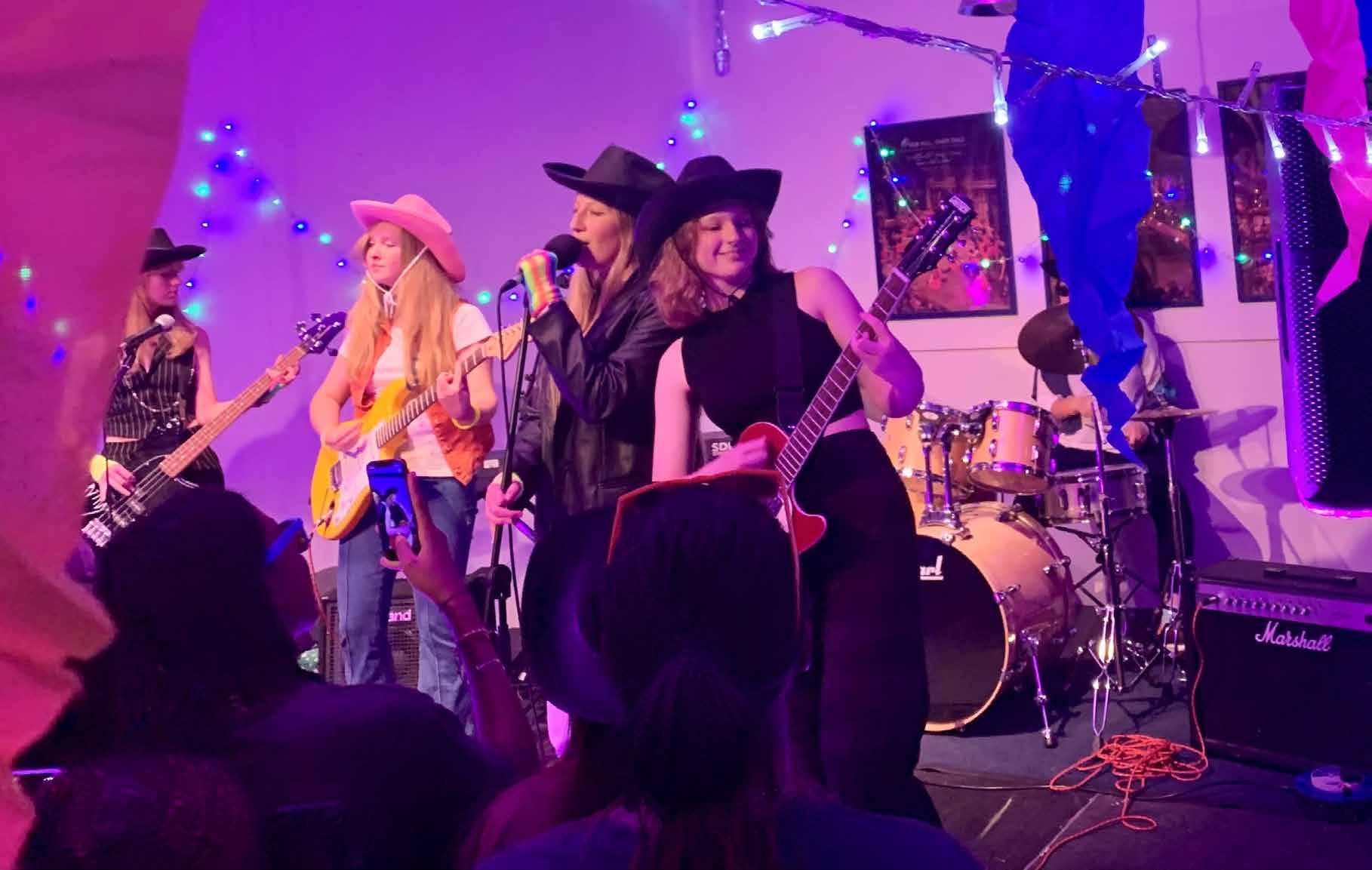
The concert consisted of over 25 songs with a diverse collection of music ranging from The Arctic Monkeys, Nirvana, Radiohead, McFly, Arianna Grande and original songs written by the girls. All bands performed with technical accomplishment, bringing their own style and interpretation to the music, and with confident stage presence. A large and lively audience packed Seniors Hall which had been decorated to re-create a mini-festival feel with large stage and vibrant lighting.
I
n May we were delighted to welcome a visit from the outstanding young pianist Jeneba Kanneh-Mason, organised in collaboration with Chiltern Arts. Jeneba was a Keyboard Category Finalist in the BBC Young Musician Competition, 2018 and winner of the Murs du Son Prize at the 2014 Lagny-Sur-Marne International Piano Competition.
Jeneba spent the morning with some of our accomplished young pianists giving a masterclass and offering insights into both technique and interpretation. She then spent lunch with the Music Officers and Masterclass participants, giving valuable advice and sharing her musical experiences. In the afternoon, a number of our pupils had the opportunity to hear Jeneba perform in the Archer Recital Hall at her concert for the Chiltern Arts Festival. It was a wonderful experience with the performance concluding in a glittering rendition of Liszt’s Hungarian Rhapsody No 2. The event was dedicated, appropriately, to the memory of long-time supporter of Wycombe Abbey music, the late Mrs Catherine Archer.
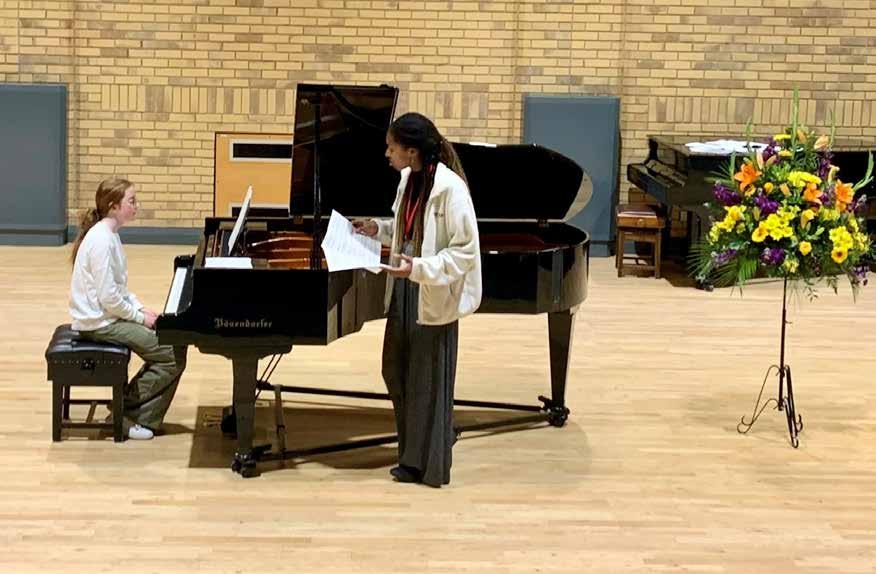
Mr Stefan Reid Director of Musiche first RockSoc concert of the year took place in November featuring five Wycombe Abbey bands: Ionic (Tabita, Angelina, Kathleen, Kelly), Ultimatum (Georgia, Katie, Yuna, Lynn), Bad Guy and the Blondes (Sophie, Nicola, Ettie, Phoebe, Ellie), a debut performance from new band Watchers from the Blind (Funto, Claudia, Lucinda, Claudia, Gwendolyn) and singer/songwriter Semal.
We were delighted to welcome a live audience to School to hear our annual Archer Concert. The evening provided a showcase for large ensembles through to soloists with the programme ranging from Beethoven to Morricone. We opened with Chamber Orchestra, conducted by our Head of Strings, Mr Acosta, performing Wagner’s Ein Albumblatt, Nielsen’s Intermezzo and finished with the Love Theme from Cinema Paradiso featuring Carys (UVI) on solo saxophone.
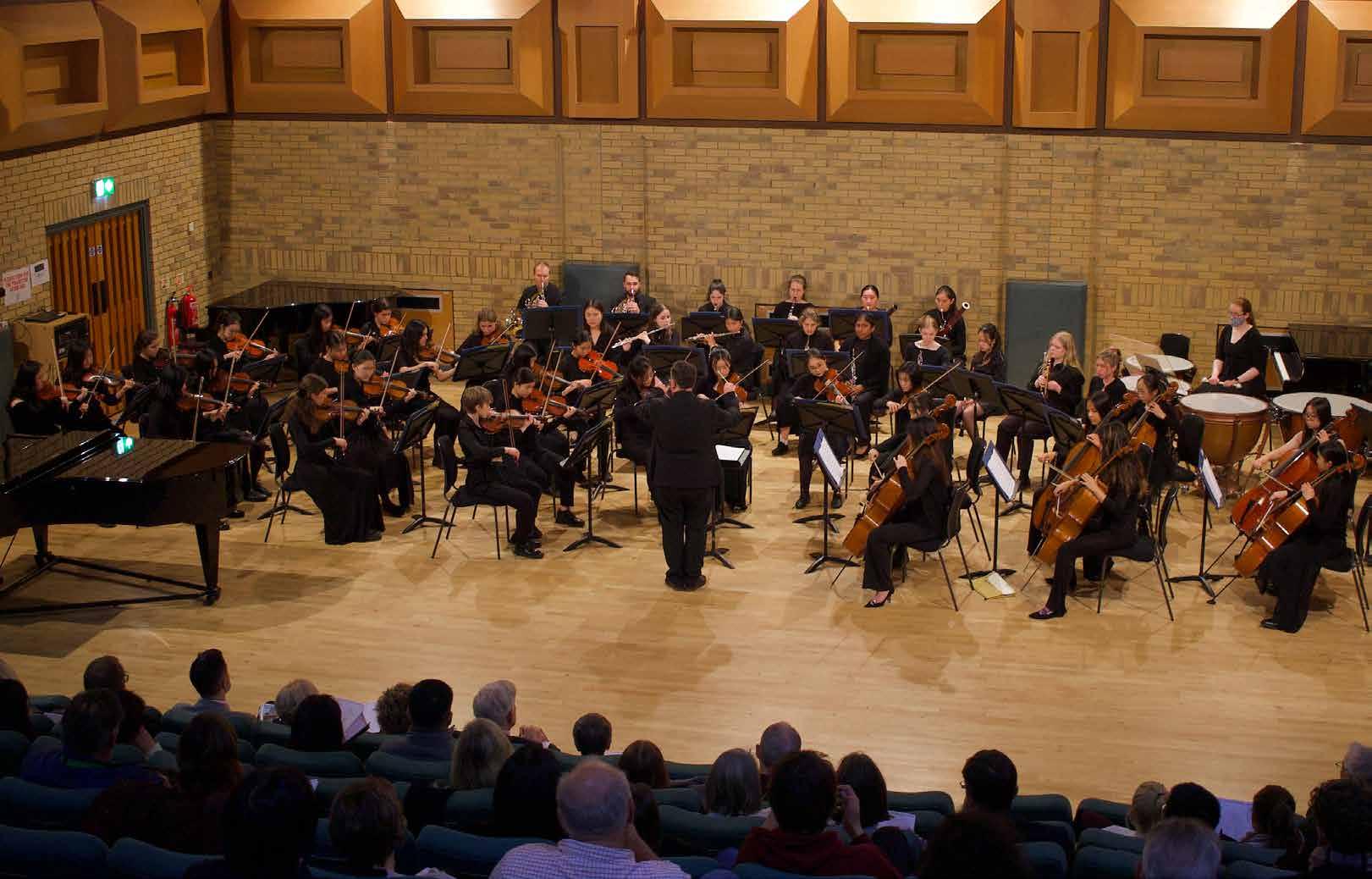
Chapel Choir performed two anthems by English composers, The True Glory by Peter Aston and Gaelic Blessing by John Rutter. Hojung (UV) delivered a wonderfully colourful performance of Vieuxtemp’s Reverie and was followed by our UV String Quartet playing the equally melodic Chanson de Matin by Elgar. Our Chamber Choir and Holst Singers, performed two challenging contemporary pieces, Tundra by Ola Gjeilo and The Seal Lullaby by Eric Whitacre. Our last soloist was Gwyneth (LV) who
delivered a bravura performance of Chopin’s Ballade No 4. The evening closed with Symphony Orchestra performing a dramatic rendition of Beethoven’s Egmont Overture before closing the concert with Howard Shore’s evocative score for the film The Lord of the Rings
Mr Stefan Reid Director of MusicTo keep up to date with Music at Wycombe Abbey, please follow us on Instagram @wycombemusic


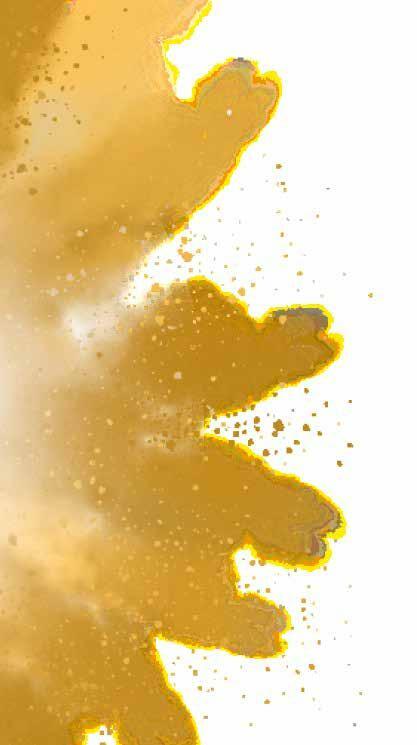

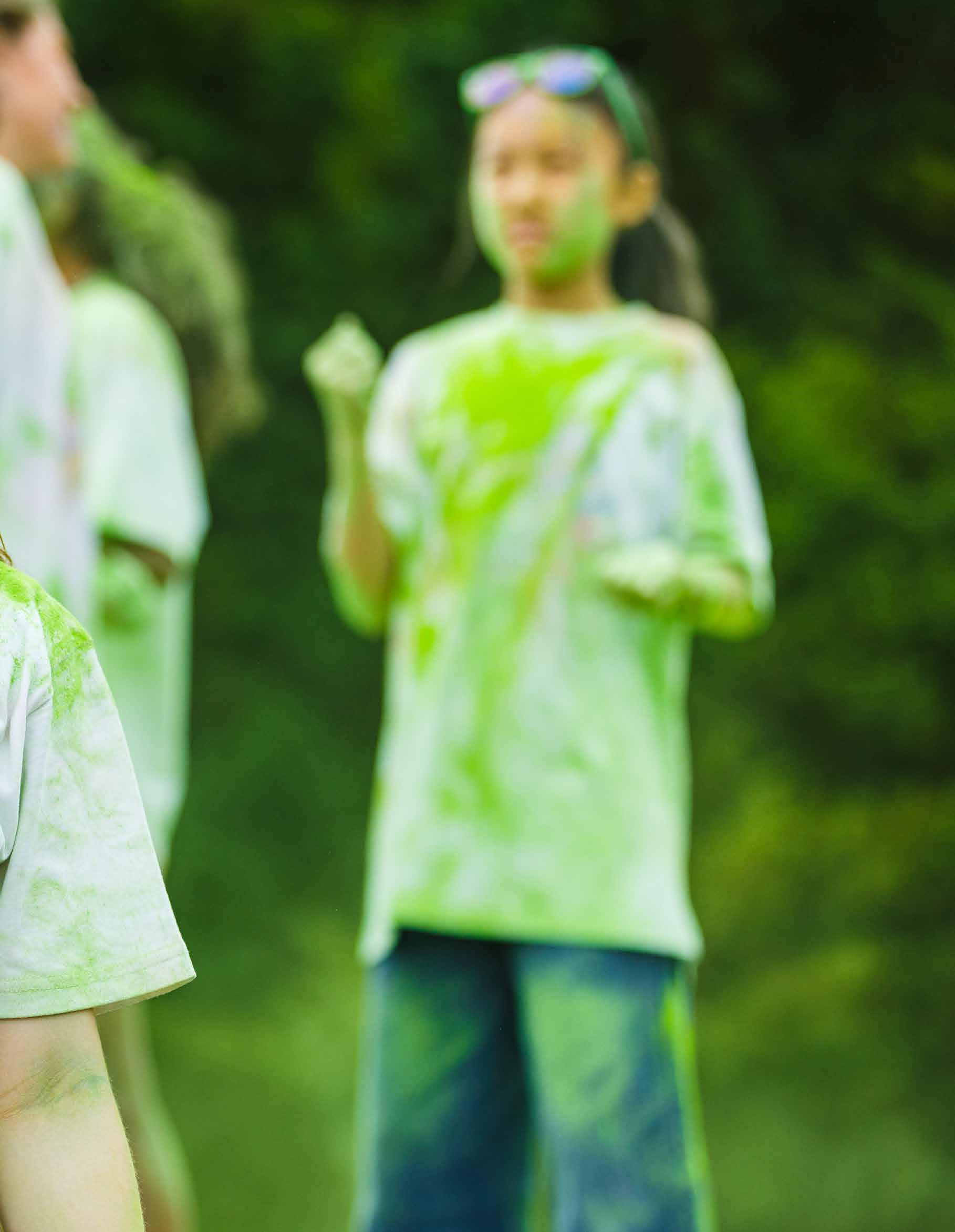

The 2021-2022 academic year was one of celebration for Wycombe Abbey as the School marked the 125 th anniversary of its founding by Dame Frances Dove in 1896. It started with Founder’s Day - a Wycombe Abbey ‘birthday party,’ on 23 September 2021. It was a joyful, fun filled day and one I am sure the girls will remember for many years to come.
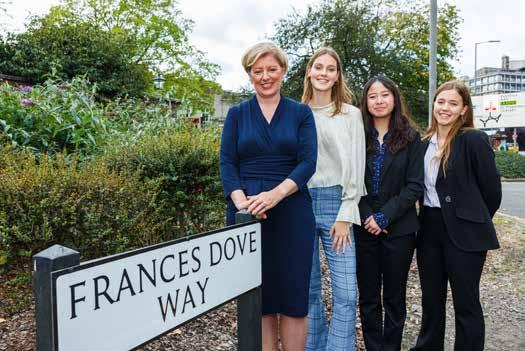
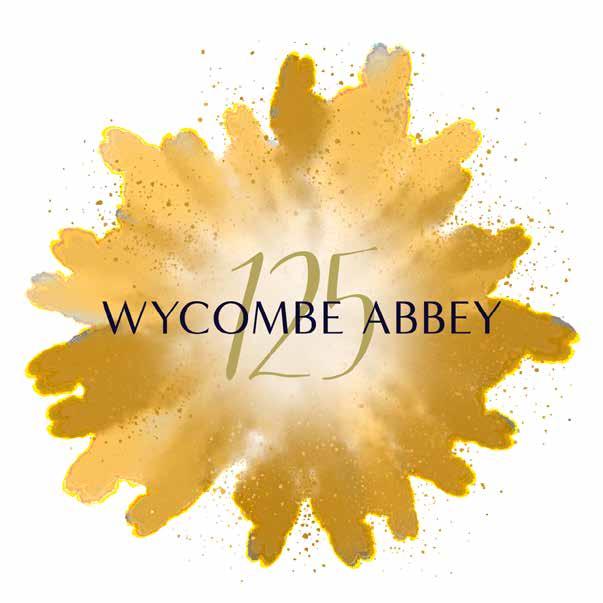
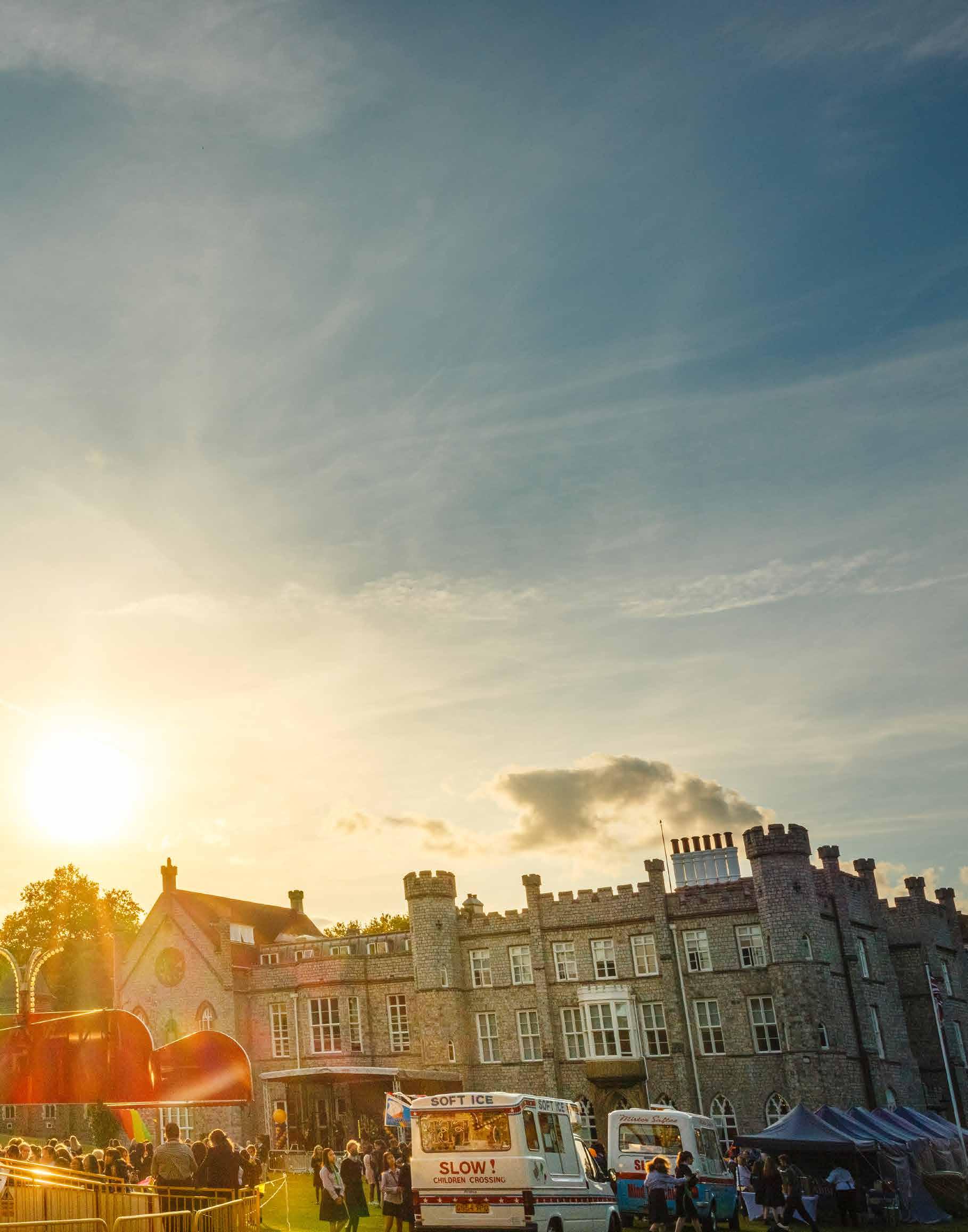
The day began with the unveiling of a plaque commemorating Dame Frances Dove, the School’s founding Headmistress. We were joined by a number of special guests including Councillor Sarfaraz Raja, Mr William Reid of the High Wycombe Society and members of staff from Cressex Community School and Godstowe Preparatory School, both of whom have strong links with Wycombe Abbey. I hope that those who glance at the plaque as they pass through the main gates of the School will be reminded of the work of Dame Frances and will acknowledge her visionary approach to girls’ education. I was thrilled that the road name officially changed just in time for Founder’s Day from Abbey Way to Frances Dove Way, yet another wonderful way to recognise Dame Frances.
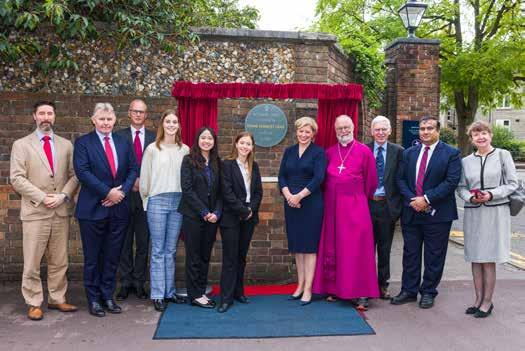
The Bishop of Buckingham, Rt Revd Dr Alan Wilson, was able to join us on Founder’s Day and he led two beautifully poignant services in the Chapel for Wycombe Abbey pupils and staff. After a tumultuous 18 months, it was wonderful to see the girls gather in person to celebrate this particularly special day. You can find Bishop Alan’s full Sermon on page 50 - 51.
The sun shone as the School community gathered in front of the Abbey for the birthday party organised by Ms Bowen and the 125 team. A fantastic cake baked in the shape of the main Abbey building took centre stage and pupils and staff gathered together to sing Happy Birthday. The girls enjoyed the live band and fairground rides and there were 125 cupcakes, candyfloss and ice cream.
On a reflective note, 125 years ago, Wycombe Abbey opened its gates with only 40 girls starting in the Autumn Term of 1896. While the main building of Wycombe Abbey has changed remarkably little, the School has developed significantly over the years and we now have nearly 660 pupils; 592 boarders and 65 day boarders.
Founder’s Day was a special day to reflect with gratitude on the School’s past, and to look ahead with determination to continue our founder’s mission. Our vision remains clear: to be at the forefront of girls’ boarding education and to be recognised globally as a world class school.
Mrs Jo Duncan Headmistress
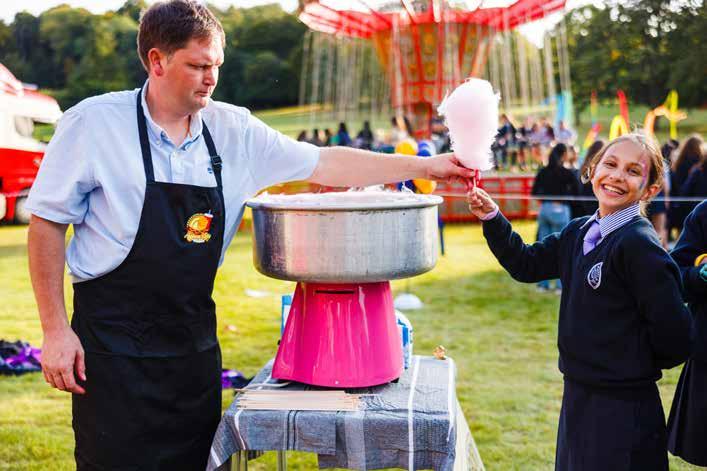
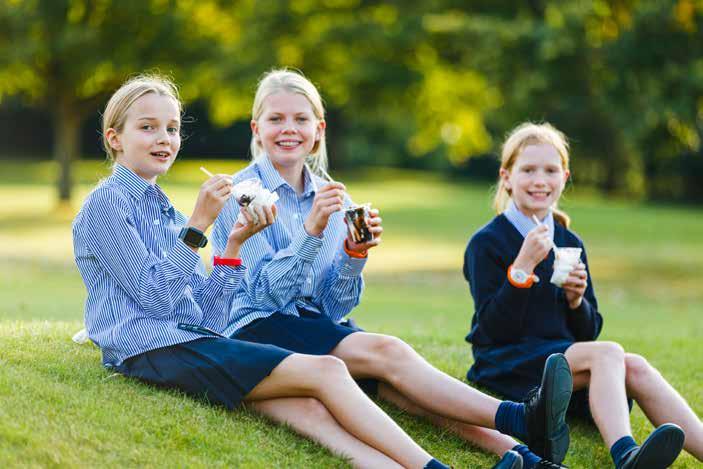
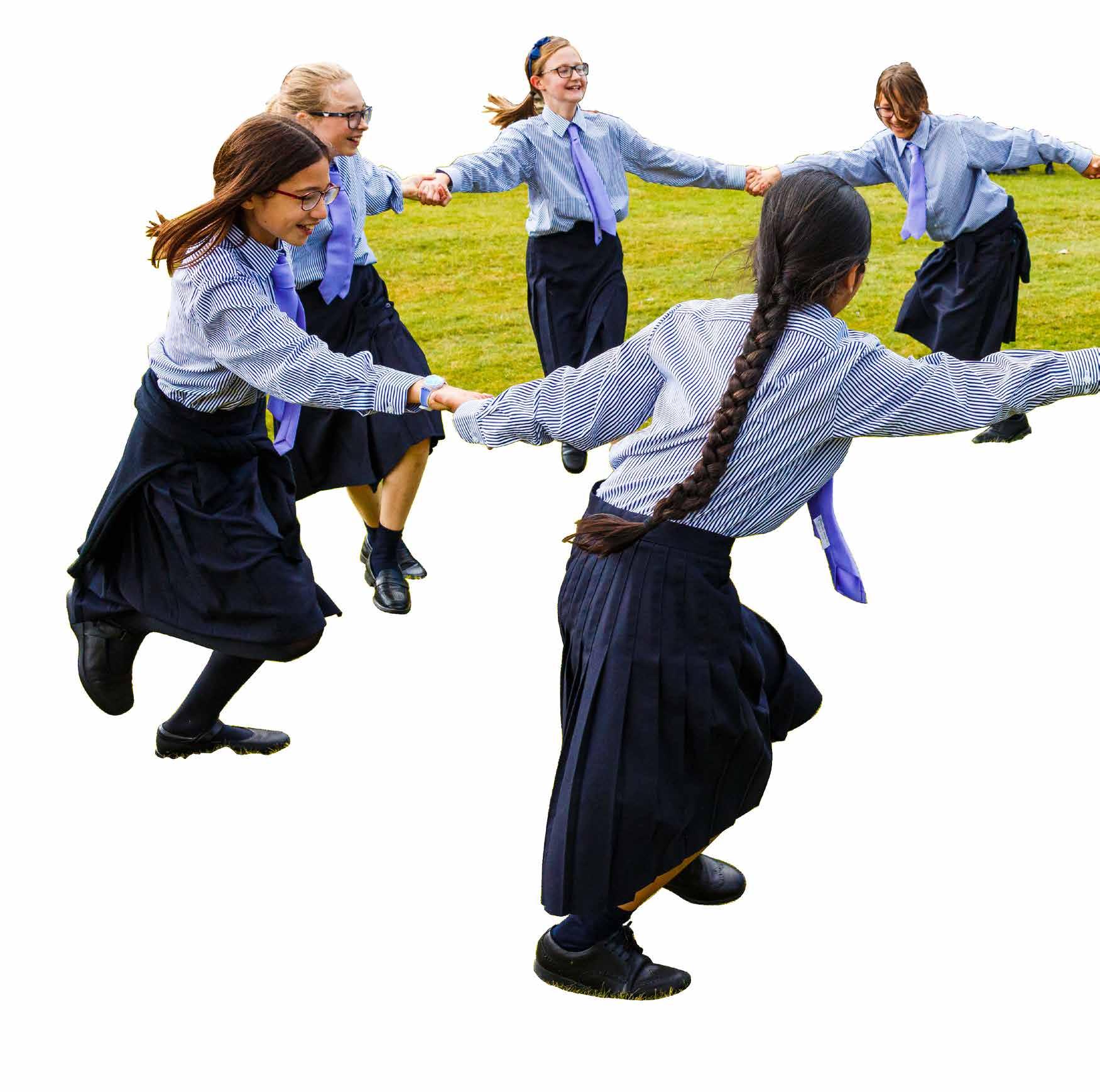

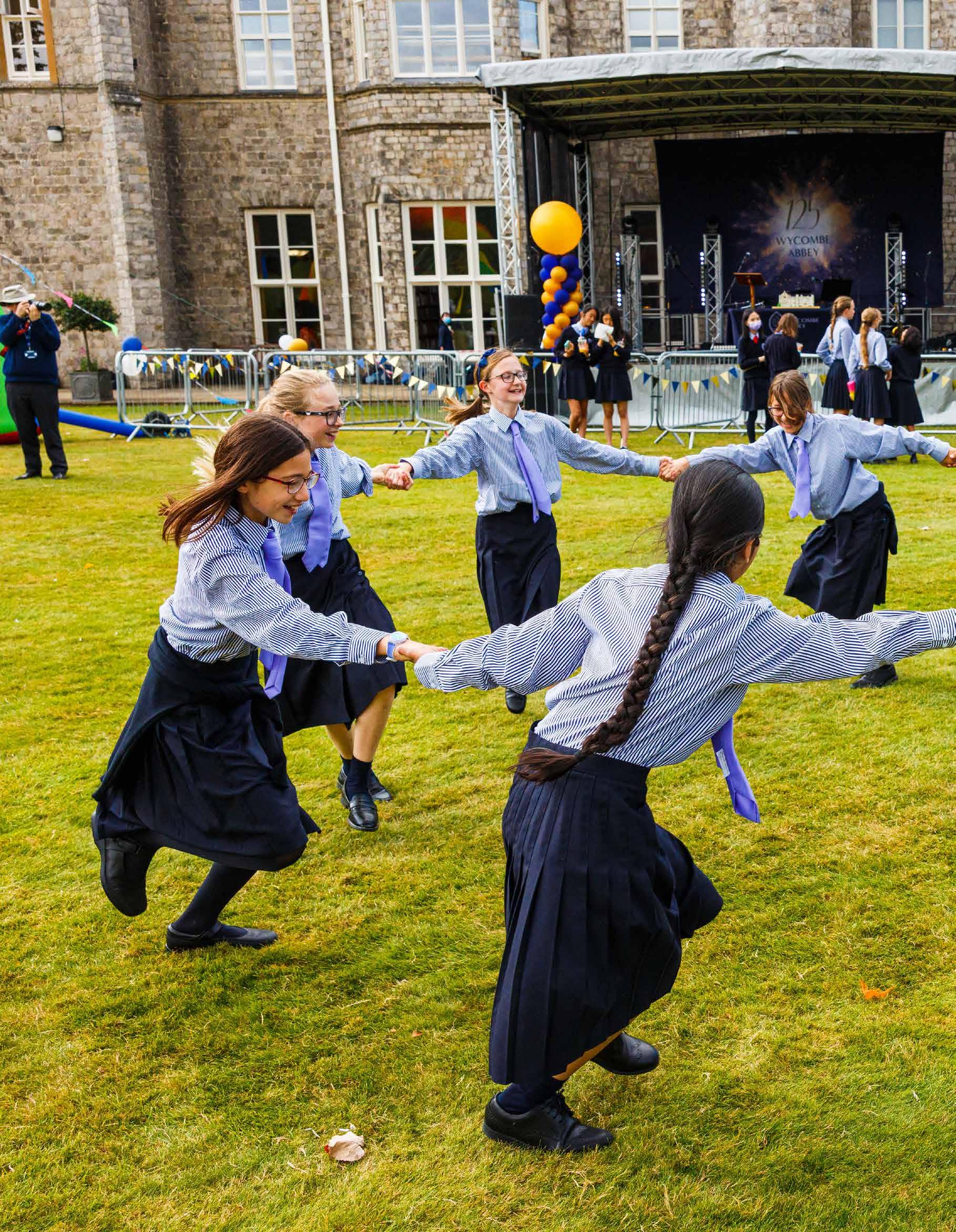
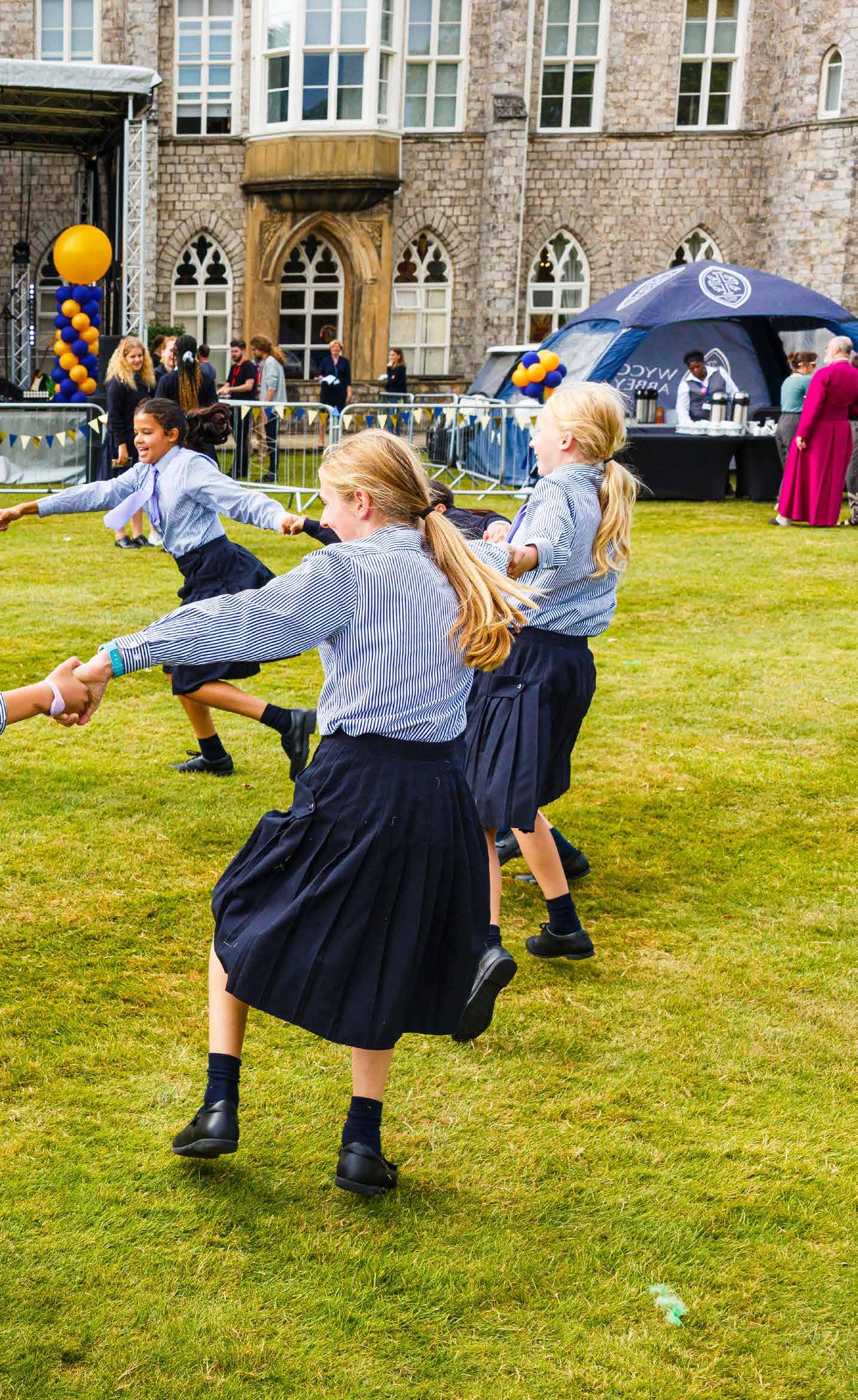
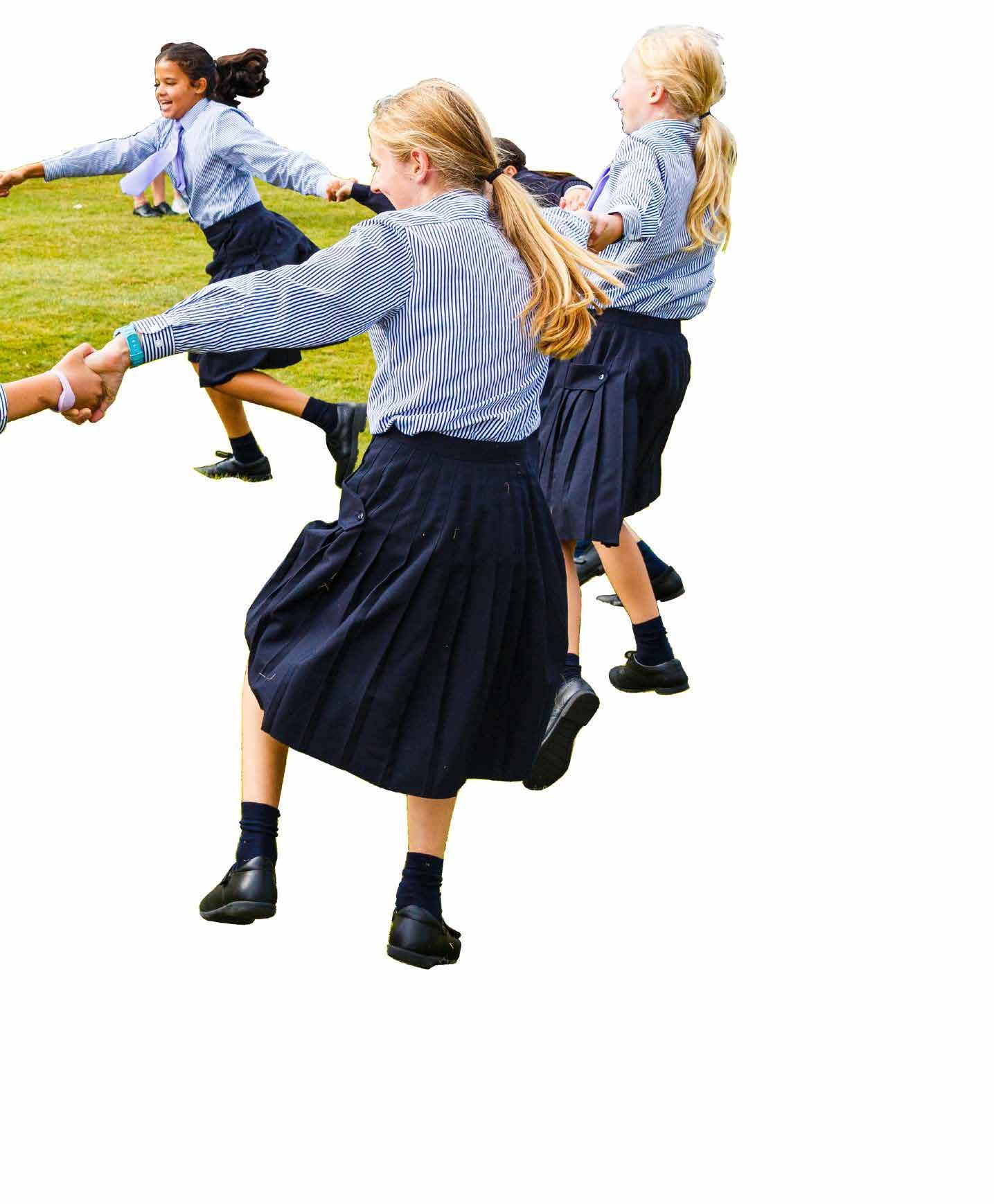



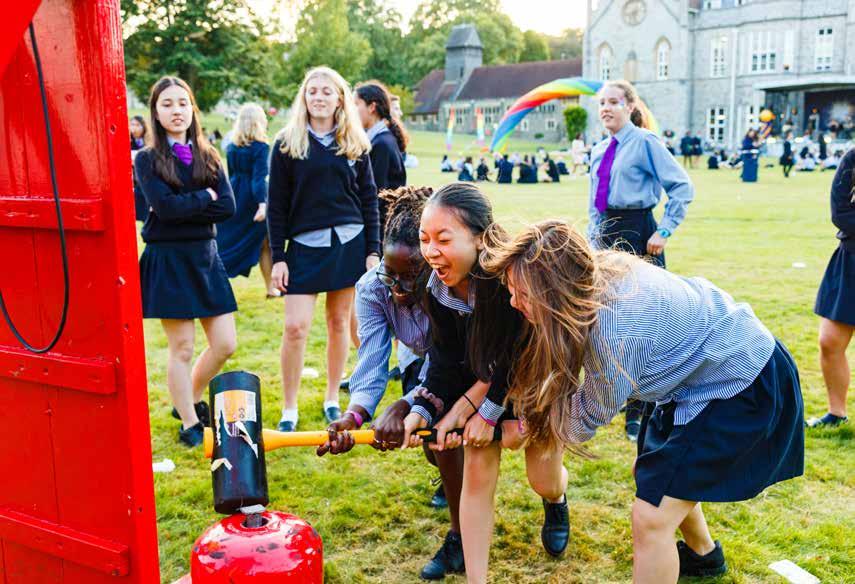
Congratulations on 125 years of Wycombe Abbey. It was Frances Dove’s final foundation, incorporating what she had learnt from various earlier efforts. If you’ve read the standard histories and you’re still curious, there’s an interesting chapter about Frances Dove and her school in Colin Cartwright’s book about women’s suffrage in Bucks, Burning to Get the Vote, the women’s suffrage movement in central Buckinghamshire, 1904-1914. His chapter on Wycombe Abbey shows how radical and rigorous an educator Miss Dove was. She seems to have become an advanced suffragist in 1899. She was inspired by the successful campaign for women’s suffrage in Western Australia. Spurred by the sense of a new era with the new century and Queen Victoria’s passing, Miss Dove joined the radical wing of the movement.
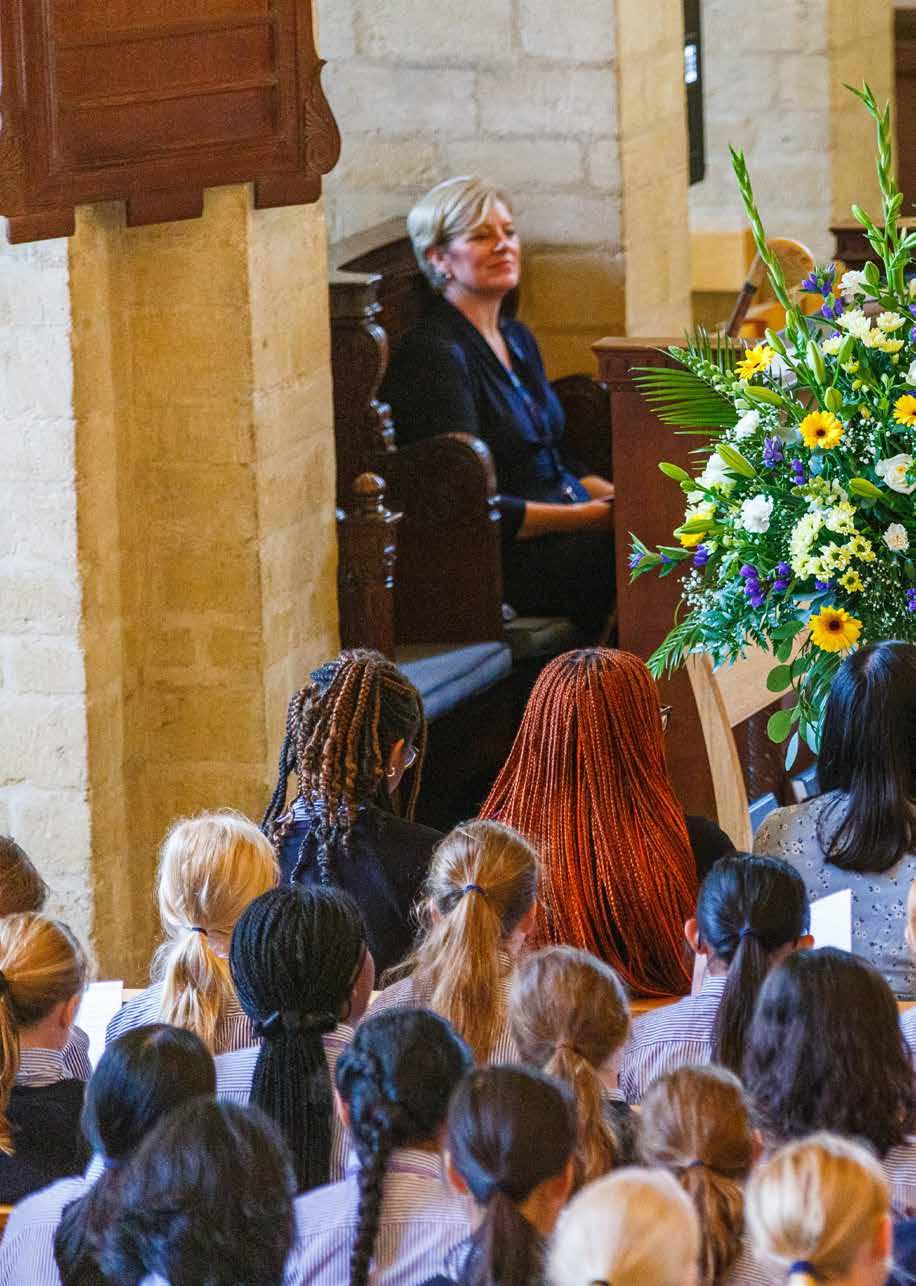
She spoke at a great public meeting at Wycombe Abbey in 1904 at which a County Suffrage committee was formed, over a year before the Women’s Social and Political Union set up in London. Members of the school were encouraged to stay up late on local election nights, as they followed her battle to get on the council as soon as the Women’s Act had been passed. Her labours did not go down well with the local male establishment, she was snubbed on a technicality for mayor in 1908, to her great annoyance. In 1913 she was chased back into the school by an angry mob. I imagine they would have been brandishing chair legs rather than the more traditional pitchforks, but the incident caused much excitement on both sides. Frances Dove was adamant that her latest and most developed foundation was Anglican. Parents who didn’t like that, she said on one occasion, should send their daughters to Roedean!
Well, let’s not get lost too far down any historical rabbit holes. Just don’t forget the radical and transformational roots of this place. Her work here moved the social goalposts in this country. It was intended to. There was still, of course, much further to go. Miss Dove was what was known as a Steamer Woman. The steamer in question went to Dublin. Over 700 Victorian women studied for and passed Tripos examinations at Cambridge, like her, or schools at Oxford. She was the second woman in Britain to take the Cambridge Natural Sciences Tripos in 1875. She and others like her took the steamer because Trinity College Dublin was willing to award them what were called proxime accessit Trinity College Dublin degrees when their own universities would not grant membership or degrees, Oxford till 1920 and Cambridge, incredibly, 1947.
Educated Victorian Women were strident with sharpened duckhandled umbrellas and bricks or padlocks in their handbags, but that was how the things you and the rest of us take for granted now became established – the notion that women were equal to men, had the same capacities for learning and research, and could transform society, as well as, sometimes even instead of, fulfilling domestic roles. Our Bible passage, which any of you baptised according to the Book of Common Prayer will have had read at the font, shows Jesus entirely rethinking the status of children. In the first century they were almost universally seen as half formed little people, who counted for nothing until they were old enough to. In Ancient Rome there were bins in the streets in which you could dispose of unwanted babies if you were too poor just to expose them on the hillsides. Jesus inverts a whole pyramid of
assumptions here. The child, he says, is actually the greatest in the kingdom. Far from being some kind of stunted mini-me, the child with her instinct for imaginative play, her ability to ask awkward questions, her wide-open potential, her refusal to shut up, was actually the greatest in the kingdom of heaven. And a big poke in the eye for the religious establishment, unless its members could get over themselves and learn how to see the world through their
Text of the Address by Bishop Alanchild’s eye, they were wasting their time dressing up and playing at religion. Miss Dove’s work came from a big vision, but the clever bit wasn’t the idea in itself. It was the execution. She compiled careful records, not only of higher education destinations, but the totality of what girls did with their lives after leaving her schools. She would regard it as failure if they were just crawling back into the doll’s house.
Here is her list from 1907, including the first generation of seniors. It includes headmistresses, authors, several doctors, photographers, charity organisers, actresses, journalists, sculptors, public singers, stained glass artists, technical lecturers, school inspectors, nurses. Bringing up the rear we find a few solos – a solicitor’s Clerk, a portrait painter and, my favourite, a professional teacher of Jiu Jitsu. No MPs, of course, or judges. Not yet, but she regarded that as a challenge not a boundary condition.
So, all the high jinks around this anniversary mark a significant milestone on the journey. But you are, in yourself, the best expression of that vision today. We celebrate a radical vision of social transformation and human improvement. I acknowledge that thanks to places like this and the work of its founder, you probably don’t need a sharpened umbrella, or bricks and padlocks in your handbags, quite as often as you would have in 1904. Whatever politics you do; left, right, whatever you like, please don’t lose your vision, compassion, and radical edge.

If you’re stuck for role models, study the window she installed at All Saints Church in 1932 above the council pew, to annoy male councillors. It portrays famous women who had transformed humanity spiritually and raised their horizons. The tale leads from Saint Hilda of Whitby in the 7th Century, through 15th Century Lady Margaret Beaufort, Countess of Richmond and Derby, Henry VII’s mum, to a clutch of Victorian social improvers, crowned, unusually, by Amy Johnson flying her Gipsy Moth to Australia in 1930. Be whatever you can be, and don’t take anything for granted. There are still plenty of ways the world needs transforming. So please get on with it, and don’t get hung up on people who would rather you shut up and got back in the box. Oh, and whatever you contribute, now and in years to come, the way you do it will change the world as much as what you do. This is the truly radical aspect of Christianity – There is a new way to live: you show wisdom by trusting people; you handle leadership, by serving; you handle offenders, by forgiving; you handle money, by sharing; you handle enemies, by loving; and you handle violence by suffering. Because this is a Jesus society, and you repent, not by feeling bad, but by thinking different. Friends, over to you.
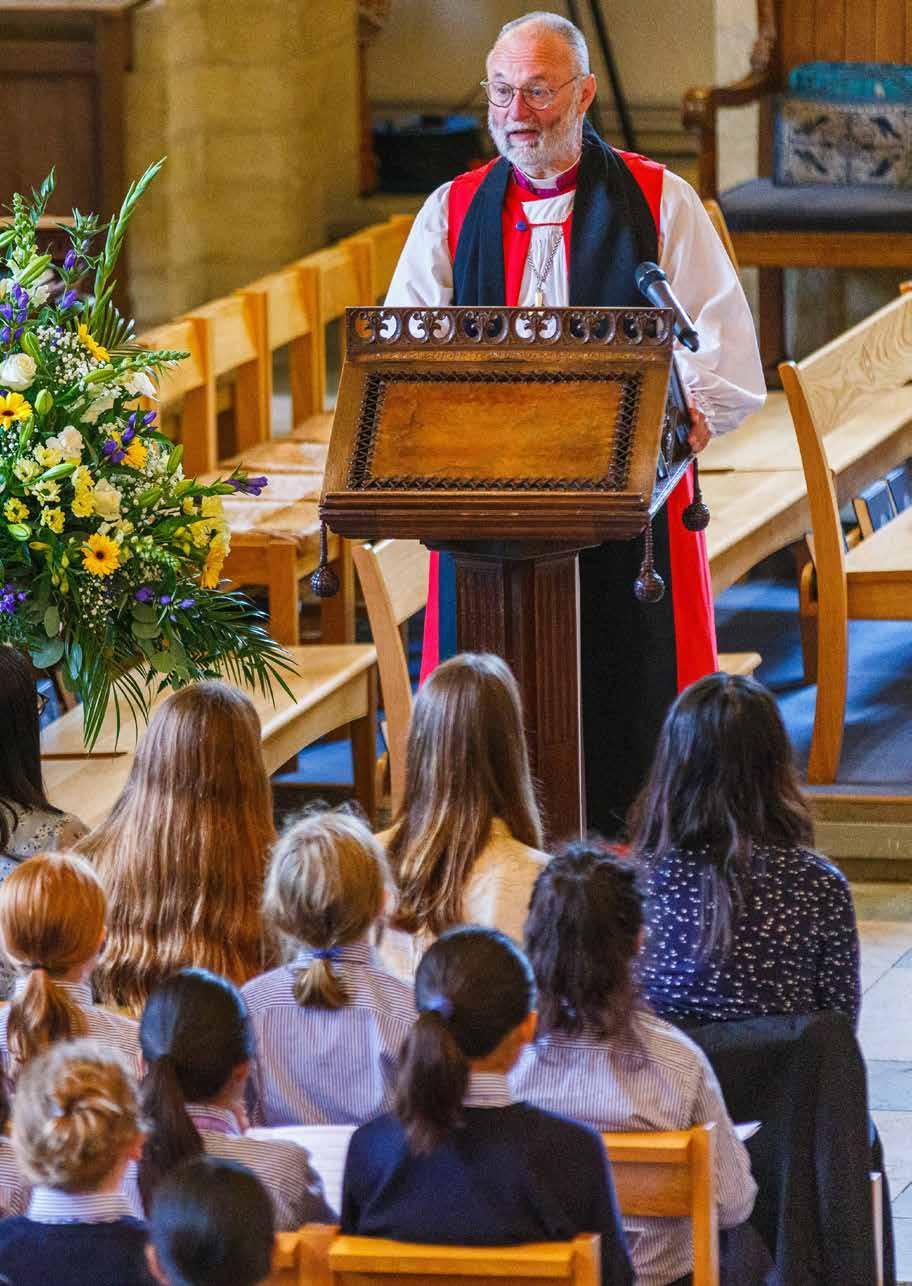 Rt Revd Dr Alan Wilson, Bishop of Buckingham
Miss Dove’s work came from a big vision, but the clever bit wasn’t the idea in itself. It was the execution.
Rt Revd Dr Alan Wilson, Bishop of Buckingham
Miss Dove’s work came from a big vision, but the clever bit wasn’t the idea in itself. It was the execution.
This object is perhaps one of the most understated but entrancing objects in our collection: a list made by Frances Dove of the buildings she was considering as possible sites to house the school she intended to establish in England, after leaving her role as Headmistress at St Leonard’s School, St Andrew’s. This item is a piece of Wycombe Abbey prehistory. Frances Dove had stated criteria for her school site, it needed to be near a town, have grounds for sport, have less than average rainfall (so girls could take advantage of the outdoors), and a lake for swimming. Wycombe Abbey met all these requirements, and perhaps by the time Miss Dove wrote ‘Seen’ next to the Wycombe Abbey’s name, she already knew it would be the perfect setting for her school.

Archives are filled with scraps of paper – photographs, notes, magazines, all of which help the archivist to build a picture of the past. It is rare that an entire unpublished manuscript sits quietly within the boxes, a detailed history already written and waiting to be discovered. This item is one such gift that was among the items donated by Wycombe Abbey Senior Elsie Bowerman; her memoir Reflections on a Square. Elsie was one of the first pupils to attend Wycombe Abbey, joining as the youngest pupil in the School in 1901 and rising the ranks of Cloister House, under Housemistress Anne Whitelaw, until she left for Girton College, Cambridge in 1907. She lived an extraordinary life, as a survivor of the Titanic, a nurse in the First World War, a witness of the February Russian Revolution, the election for Christabel Pankhurst in 1918, and a continual campaigner for women’s rights.
How would you compare a secondary school girl today with one from a hundred years ago? What would it be like if they met? What would they say to each other? Wycombe Abbey pupil, Audrey Pim, asked herself the above questions in 1921 and wrote her response in an exercise book of English essays. ‘Manners’ and ‘dress’ are among the first things she considers, reflecting on how the girl of 1821 was “taught not to give [her] opinion unasked”, quite different to the vocal debates in Houses and classrooms recorded by Seniors since the School’s founding. Audrey also examines how the long sleeves and high necks of the 1820s differed from the ‘flapper’ style of the 1920s, as well as the lack of thorough education for the girl of the past. Audrey is convinced of an improvement to young women’s lives in all areas but clothing – she was clearly no flapper and happy to give the ‘scanty dresses’ a miss!
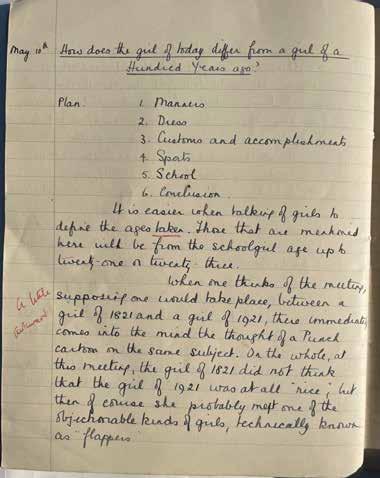
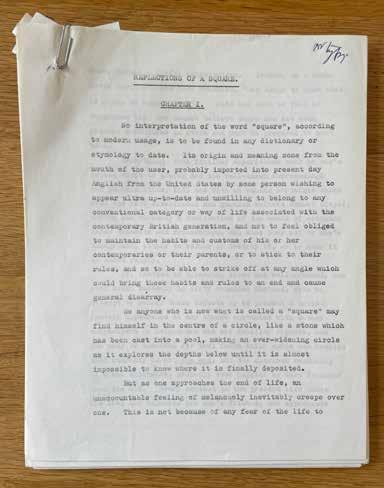
What a scene! Trestle tables out, teacups laid, straw boaters and bright midsummer light dappled through the shade of the trees. In our minds, we are all at the party. This is a photograph taken on Mission Day in 1904, the day each year when members of the parish of St Mark’s in Camberwell would travel by train to Wycombe Abbey for cream teas, boating on the lake, and relaxation in the grounds. The south London community were part of The Peckham Settlement, where pupils from Wycombe Abbey and other girls schools supported the needs of residents and local institutions. Frances Dove was steadfast in her commitment to supporting those in need, establishing many charities and working as a High Wycombe Councillor alongside her role as Headmistress. She also believed that social work was vital to the moral and spiritual development of her pupils. Charity work remains integral to Wycombe Abbey today and some of the charities we support have been with us since the School’s foundation.
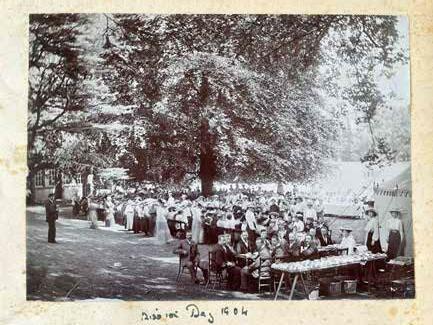
These archive items are literary supplements produced by Wycombe Abbey pupils in the 1920s. Each magazine has a colourful woodcut print on the front, a hint to the reader of the artistic pursuits inside. The pages are filled with poems written by pupils: they often reflect on daily life, sometimes politics, frequently include humour, and are invariably personal. The poems are accompanied by confidently carved and carefully pressed woodblock prints. Whilst some might think that the art produced in schools follows the work produced by professional artists, these woodblock prints show Wycombe Abbey pupils adeptly using a medium at the same time that it was being explored by the avant-garde of British art.
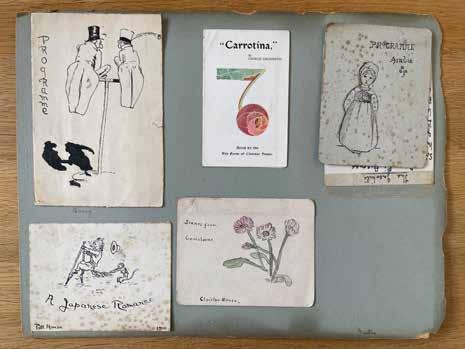
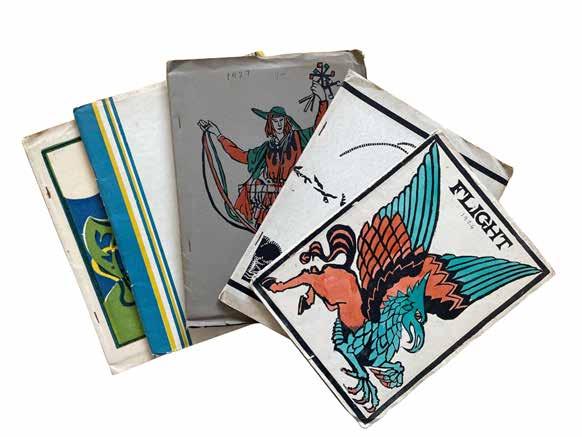
Look at them go! Lacrosse sticks high in the air, arms stretched up, legs and feet balletic as they leap. This photograph records the moment when one pupil has just caught a high-flying ball with her lacrosse stick. It is a moment of sporting achievement and of psychology, as we zoom in on the triumphant players face and see she is still judging whether she will make the catch – will it stay in the net? The other player also reveals her thoughts, she is still poised on her journey to catch the ball, but her face tells us she knows her efforts are in vain. Our team photos chart the faces of lacrosse at Wycombe Abbey since our founding and document the sport’s changing uniform and, more recently, developments in sticks. This photograph, however, conveys something of the spirit of the game that is so dearly loved at School. The image was taken in 1988 and records what is most likely an inter-House match, as both girls don the same kit. The location is Pitch 1, just in front of the main Abbey.
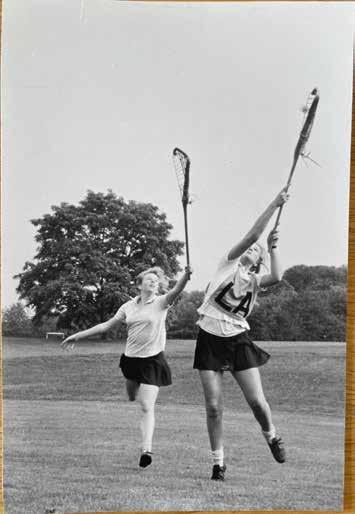
This photograph is an image, but it is also an object – wearing its history in its surface texture, sun-bleached edges, and the archive tape attached to its sides in an attempt to stick down its curling edges. Additions – made intentionally or unintentionally – that reveal the photograph’s age and the longstanding will to preserve it; for it is an important photograph, the only one in our collection that depicts the previous owners of Wycombe Abbey, the Carrington family, at the estate when it was their home.
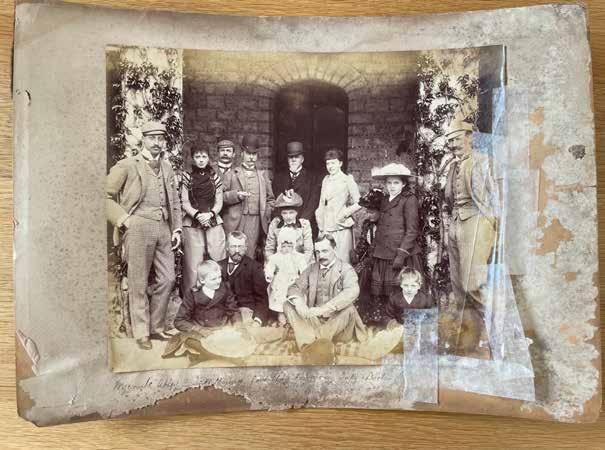
We see the 3rd Lord and Lady Carrington (Lady Carrington in the centre and Lord Carrington seated to her right) and four of their daughters, standing or sitting in the front row. Their friends stand around them, including the Duke of Clarence, who stands on the far left. The figures are assembled in Wycombe Abbey’s cloisters, at what is now the entrance to the Junior Library and was, for many years, access to the staff room. The building, down to its finest details, looks exactly as it does today – the wooden panelled glass inlaid door, the brickwork, the wisteria around the arcade.
The community spirit of the 11 different Houses at Wycombe Abbey is fundamental to life at the School. Each pupil and staff member proud of their House’s own idiosyncrasies and passionate defenders of their achievements. The many activities played out within and between the different Houses go back to the beginning of the School, as these play programmes, collected by Eileen Smith (Pitt) in 1910, illustrate.
There are five programmes included in this post, each for the play performed by a different House to the rest of the School – Cloister House’s ‘Scenes from Corilanus’, Pitt House’s ‘A Japanese Romance’, and Barry’s ‘The Treasure Seekers’. Inside, each contains a list of the Dramatis Personae and, in some cases, a list of the acts performed. The hand drawn covers – all original, redrawn for each programme (apart from the printed ‘Carrotina’) – demonstrate the enormous care given to all elements of the performances, ensuring that every programme was neatly drawn and assured to excite arriving audiences.

This article from the Bucks Free Press in 1979 details the opening of Clarence, by Lord Carrington, as a House dedicated to the Upper Sixth. Clarence had previously been housed in the Abbey, taking girls from each year group like other Houses. This House sought to provide each pupil in their final year with a single study bedroom and somewhere to relax and cook, enabling pupils to organise themselves as they would do at university. The creation of Clarence also encouraged Upper Sixth pupils to focus on their studies and expand their ideas in a year when, as Miss Lancaster put it, “so much work is done for the future”. The concept of Clarence was for the Upper Sixth to be outward-looking, securing their futures, whilst the Lower Sixth would be inward-looking, taking leadership roles within the School. This progression of roles within the Sixth Form is a familiar picture for Wycombe Abbey pupils today.
Fencing Mistress by Eve Arnold in 1961
Her expression is gentle yet stern, eyes fixed to the side and mouth softened at the corners, you can just as easily imagine her face transformed into in a wide smile as a fierce glare. This image of Wycombe Abbey’s fencing teacher from 1961 captured by the celebrated photographer Eve Arnold, who came to the School on commission from the Sunday Times. Arnold describes the experience in a letter also held in our archive, “I was doing a photo series of five girls’ public schools – for the Colour Magazine of the Sunday Times – and Wycombe Abbey was probably the most colourful of them all.” She continues fondly, “the lady was patient and kind with me, and … the school gave me the run of the establishment.”
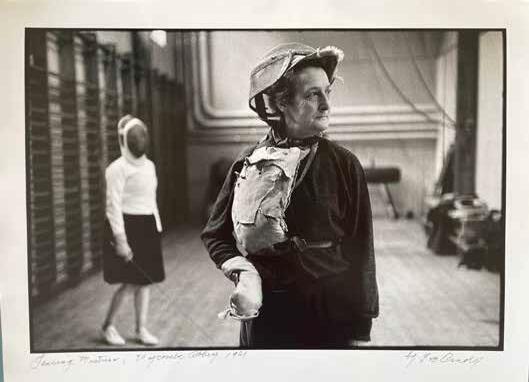
Sport has been a key component of Wycombe Abbey pupils’ education since the School’s founding. Frances Dove advocated the integration of physical exercise with academic learning to produce an education that included balance and variety. A wide range of sports, including fencing, are taken up by Wycombe Abbey pupils each term.
An image of pioneers. This is a photograph that depicts our founder Frances Dove and the first staff body to teach at Wycombe Abbey. The group portrait is set in front of the Abbey building, Frances Dove central as Headmistress amongst the 18 young teachers surrounding her. In many ways the photograph announces its Victorian context to us – sleeves are puffed, skirts long, and the sitters have an invariably unsmiling attitude to the camera. However, this group of female teachers were not doing what Victorian society, still ambivalent about the education of women, expected of them, they were establishing a centre for academic excellence where young women could excel. We are incredibly proud of the legacy of Frances Dove and all the Headmistresses and staff since then. We continue to strive to be at the forefront of girls’ boarding education and recognised globally as a world class school.
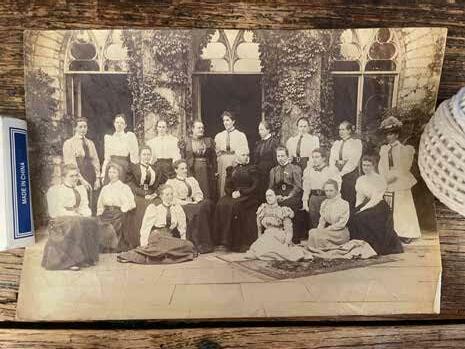
A unique object recording a history that spans generations of Wycombe Abbey pupils, staff, and residents. The dishevelled box is not something you would expect to find in an archive, and immediately raises the question to anyone who finds it, of “why is this here, preserved for posterity?” The box dates back to autumn 1938. During this term, two adventurous girls found an accessible space in the roof of the Abbey; they collected the small cardboard box we see today and inside put a page from an exercise book and wrote the following pencilled, laconic, unpunctuated message: “This monks hole christened Gazama in the year of our Lord 1938 by two members of an abbey house will anyone who finds this sign below” Both signed the paper and hid the box in the roof. In 1940, five more girls found the box, signed the sheet of paper, and hid it again. In 1942, Wycombe Abbey was requisitioned by the UK government to serve as headquarters for the United States Eighth Army Air Force; on 18 March 1944, two junior airmen also found the Gazama box and added their names. Eight years later, Mr Plumridge, a member of grounds staff, added his name, as did four workmen in 1994. In 1995, the box was brought into safe keeping, but remains a vivid connection to the games of boarding school life from over 80 years ago.
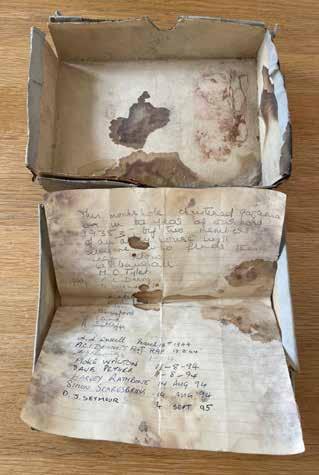
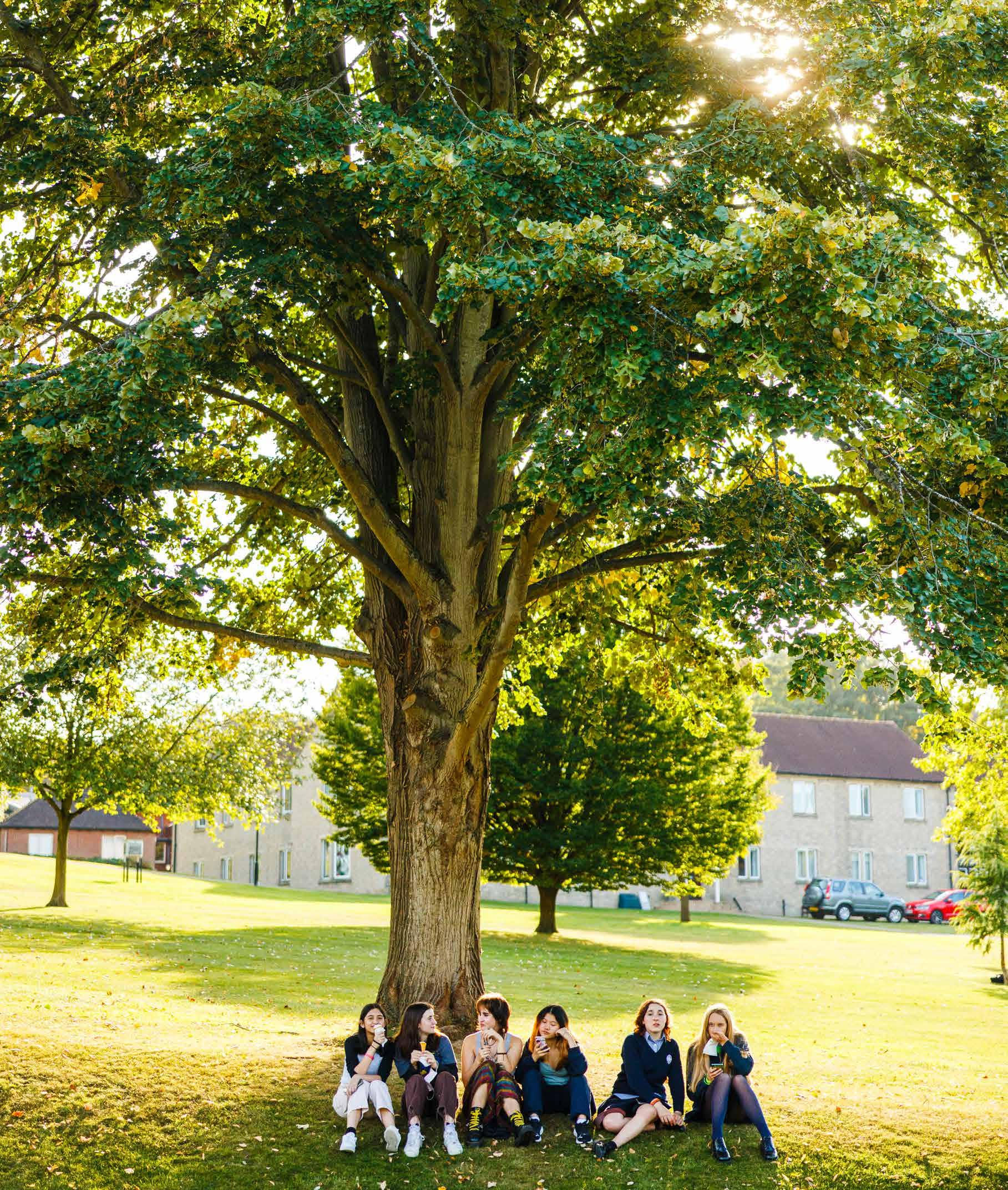

During our 125 th anniversary, we celebrated by hearing from a variety of different speakers who have ‘Made a Difference’ in their lives and the lives of others through a plethora of different achievements. They all encouraged the audience to take risks, do what you love and do it with energy and determination.
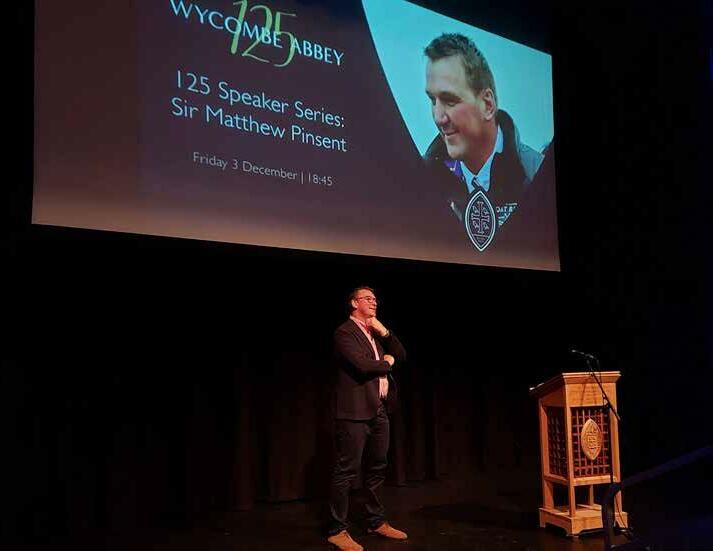
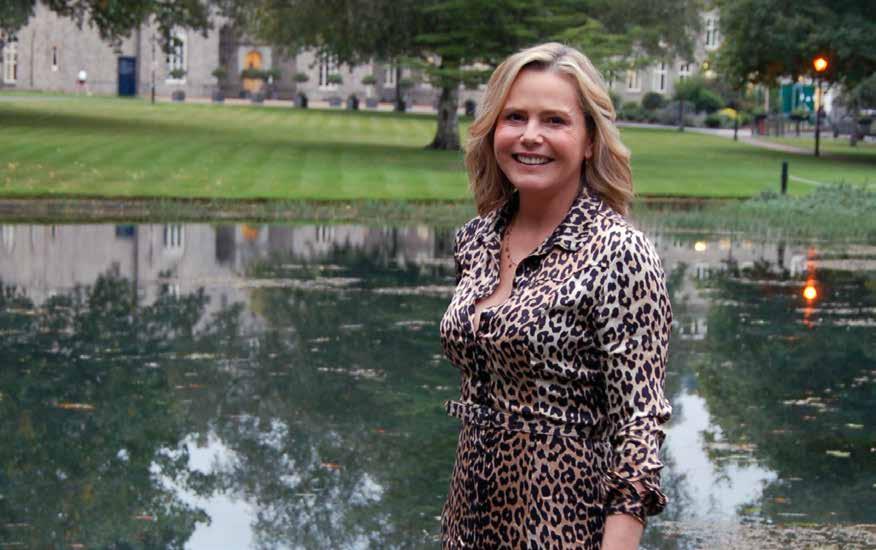
Liz Earle MBE is a successful writer, TV presenter, entrepreneur and podcast host. With a strong passion for sustainability, Liz’s businesses are renowned for using naturally active ingredients to create high quality, cruelty-free products that have been ethically sourced. Working with local communities around the world, Liz has travelled widely in order to personally guarantee her materials are obtained responsibly.
Her fascinating talk explored, not only her wide-ranging career, various business ventures and work with charitable organisations, but also discussed the importance of health and wellbeing. As a founder of the Guild of Health Writers in 1994 and FLAG, the Food Labelling Agenda, which campaigned at government level for clear, comprehensive and meaningful food labelling, Liz has been a long-time advocate for natural health. With her personal motto being ‘health is wealth’ Liz explored the importance of sleep, fitness and a balanced diet, especially in relation to the specific needs of women. Questions from the audience prompted her to reveal what she believes makes a successful entrepreneur, with ‘passion’ being her convincing answer. Liz firmly believes that to make a business work you have to be wholly committed to both its success but also its ethos. We were so fortunate to have heard from such a strong, female role model and Liz’s engaging talk will have no doubt inspired many in the audience. We are hugely grateful to Liz Earle for giving up her time to speak at Wycombe Abbey.
Matthew joined the Olympic team as one half of a pair with Sir Steve Redgrave, winning the World Championships in 1991 and the Olympics in 1992. He gave a highly inspiring talk, taking the audience through the trials for the Olympic team, the intensity of his 2004 race in Athens, and his current role as a sports broadcaster.
The highlight from the talk for me was learning about what they needed to do to be 100% sure of winning. I was fascinated by this, and it brought into perspective the high expectation of athletes in the Olympics and the rigorous training that is needed to succeed. As part of the Olympic team, Sir Matthew took part in four races winning each of them: an incredible feat. The intensity of his last race in Athens 2004 was especially striking. Prior to the race, the team discussed a new call that was to trigger the last 30 strokes before the end of the race, significantly more than the usual 20. Sir Matthew narrated the tense environment of the push and pull race with Canada, and with a pencil width distance between first and second place, Team GB topped the podium winning gold.
He concluded by discussing his new position as a sports broadcaster and the challenges of the role. I was particularly gripped by his anecdote about interviewing an Olympic archer immediately after placing fourth. Matthew asked the athlete for an interview. Recognising both his responsibility as an interviewer but also the athlete’s dissapointment, during the 30 second countdown for them to go live he reasserted, “Are you sure you want to do this?”. Clutching a bar with white knuckles and close to tears, the archer replied, “let’s do this”.
PhoebeHouse of Lords Peer and Author, Baroness Helena Morrissey
Baroness Morrissey is a current member of the House of Lords, author of two books on female empowerment and founded the 30% Club, which campaigns for equality in the boardroom and champions equal opportunities for women in business.
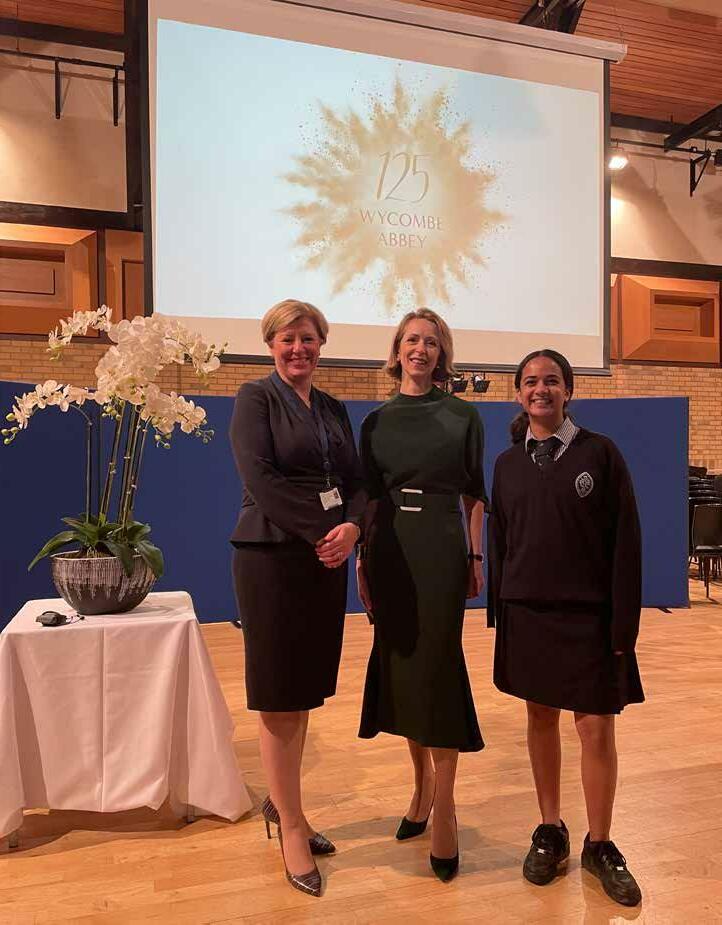
Lady Morrissey shared the story of how she progressed in the workforce, starting from her A levels to becoming one of the first female CEOs in the country. She talked in particular about studying what you enjoy at university, which was one of her reasons for reading Philosophy at Cambridge. After having graduated from university, she encountered many barriers as a woman in a male-dominated workforce. As a school with ambitious girls, it was incredibly inspiring hearing about how she overcame these obstacles and remained committed and determined to achieve her goals. As the head of a leading business, there were often times when she was the only woman in a boardroom and was looked down upon as a result. Her strength and perseverance was clearly evident and it was particularly motivational for all of us listening.
Lady Morrissey spoke about being authentic and not trying to blend in with the crowd – in fact, she argued that standing out is an asset and one of the main reasons for her success. We were really appreciative of Lady Morrissey giving out such excellent advice, and it was particularly generous of her to answer all of the audience’s questions so openly and truthfully. It was a very memorable, constructive talk.
Pia

It was inspiring to hear first-hand accounts of Ben Fogle’s many adventures, from rowing the Atlantic and running extreme marathons to swimming with crocodiles. Ben spoke about what motivated him to take on such daring feats and why he found them so rewarding. He emphasised the importance of thorough preparation and putting together a good team, with each member bringing their unique talents to the enterprise. All of his adventures depended on the team around him. Ben also entertained us by explaining how he discovered just how different his attitude to crossing the Atlantic was to James Cracknell’s: he was there to complete the crossing of the ocean; double Olympic gold medallist James, was there to compete. A particular highlight was when he spoke about the challenges he faced when taking on Mount Everest; crossing the dreaded Khumba Icefall, and surviving in the death zone when his oxygen failed. His dramatic account of these moments held the audience enthralled, as he challenged us to consider the choices we would have made in such circumstances. Above all, he made us appreciate that not only is it a great physical feat to climb Everest but that it takes a huge amount of mental resilience to deal with setbacks and to continue despite the unbelievably harsh conditions.
As well as telling of his adventures, Ben spoke about his humanitarian and environmental work, and how travelling to far-flung places had made him profoundly aware of the impact of climate change. But he also expressed hope that humanity would find solutions to these problems. Ben’s central message was the importance of perseverance and pushing ourselves to try new challenges.

At the end of the Spring Term, we invited pupils, parents, Seniors and staff to attend the 125 Seniors Making a Difference panel talk as part of our 125th anniversary celebrations. For this special talk, we were delighted to hear from Wycombe Abbey alumnae about how they overcame challenges and made a difference throughout their professional and personal lives.
The panel consisted of Clarissa Ward, Chief International Correspondent for CNN; Sophie Daud, CEO of Future Leaders Network; Charlotte Willis, board member at Medic Alert UK; and Alice Loxton, presenter and content creator at History Hit.
The Seniors spoke about their achievements and challenges following their time at Wycombe Abbey and reminisced about their fondest memories, friendships and shared experiences from their time at School. The audience, consisting of pupils, staff, parents and alumnae, also had the chance to ask questions. These centred around how
they entered their field, their experiences in their various workplaces as well as their achievements.

As much as we would have liked to have had all four at School, Alice and Charlotte joined us in person in the Lancaster Arts Centre, whilst Sophie and Clarissa joined us via Zoom –a truly hybrid event.
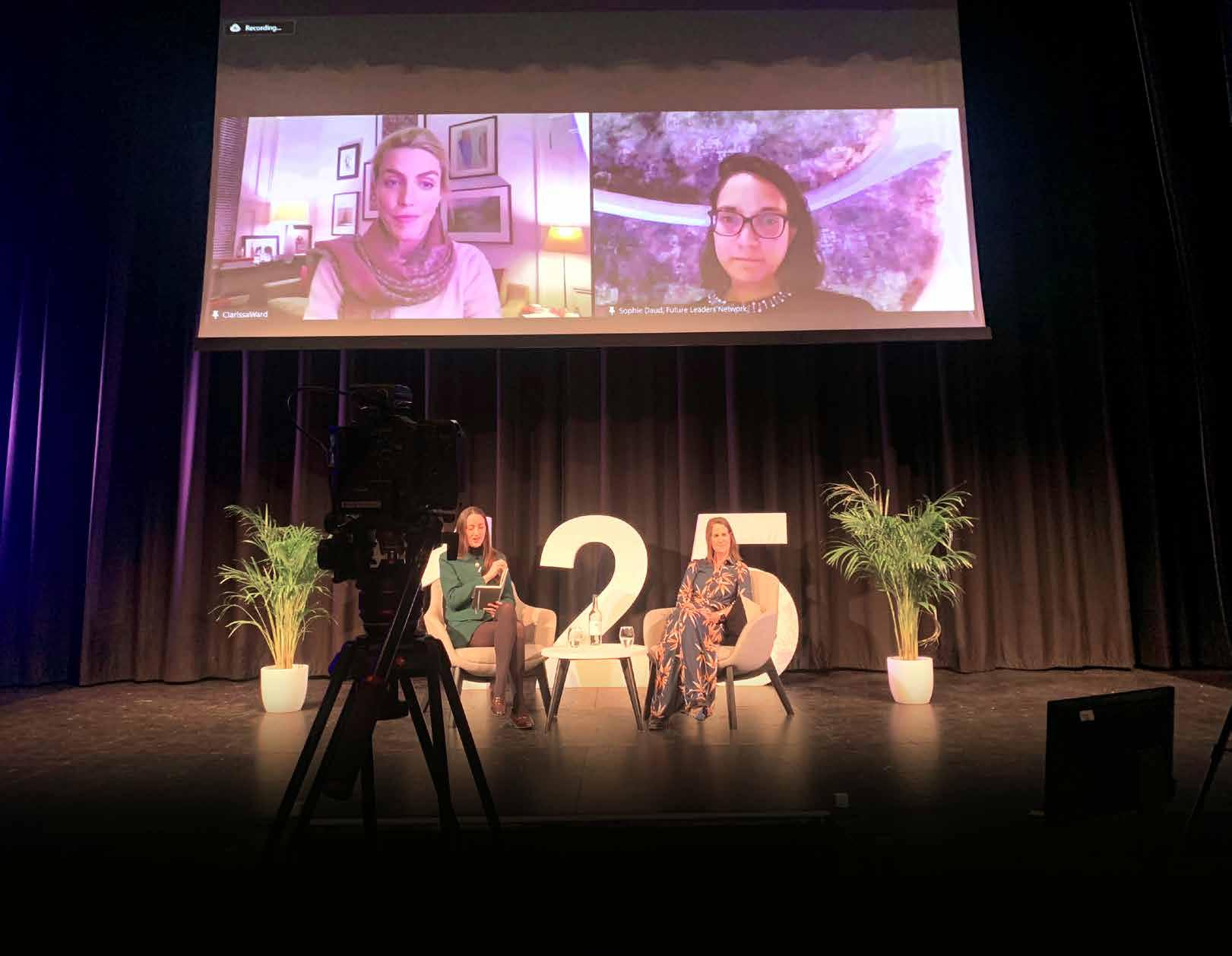
A huge thank you to the Seniors who volunteered their time to be on the panel; pupils were inspired by what they heard.
Miss Katie Tyler Seniors’ OfficerThe audience, consisting of pupils, staff, parents and alumnae, also had the chance to ask questions
Shortly after joining the Grounds team in March 2021, I was asked to collaborate on a project for the 125th anniversary celebrations. This involved the pupils planting trees for a new orchard on the site of an existing one. Initially the idea was to remove the old apple trees and plant new ones in their place, but the more time I spent around the orchard (near Pitt and Rubens), and discussed with colleagues, it seemed better to keep the old trees and find a way to add young trees alongside them. Thankfully, Dan Davy agreed (Head of Grounds and Gardens). We’re not sure, but the old apple trees may have been planted over 40 years ago, they are still fruiting and give the area between the modern Sports Centre and Pitt/Rubens a sense of place and a connection with the history of the site.
I started by finding the supplier that had the widest selection of young apple trees available, and then to find varieties with a link to each House, and one for the Headmistress. This stage, going back and forth between the trees I would like to have and what the supplier could source, was probably the trickiest. It was essential to have all 12 trees available to plant at the same time, would grow to the same size and also pollinate each other. Some of the varieties suggested themselves easily, Rubens House have ‘Rosette’ which unusually has pink flesh and ‘Greensleeves’ was a good match for Cloister due to their House colour and the Tulip ‘Spring Green’. Butler have a great little apple in the form of ‘Blenheim Orange’ and they have a lovely orange lily-flowered Tulip ‘Ballerina’, which is one of my favourites.
When the day of planting dawned, 15th November 2021, I was incredibly nervous. Looking back now, I thoroughly enjoyed it and was really impressed by the level of engagement and enthusiasm shown by the pupils and staff. What struck me most was the strong
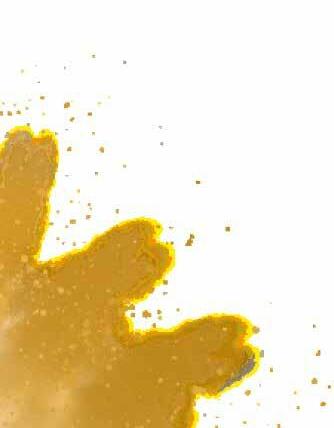
I look forward to more gardening projects ahead, in fact I’m going to start looking through the seed catalogues soon to see if there are some hardy annual plants we can grow with each of the Houses in the Spring of 2022.
sense of camaraderie shown by the girls and their teachers as they approached the task, especially the Junior girls who were still only in their first term at Wycombe Abbey. Some groups even decided to give their trees a name, Junior House named theirs ‘Veronica Dove’ and Shelburne opted for ‘Treevor’ – and I think that’s lovely, after all I frequently sing to the plants and the wildlife so there’s nothing wrong with naming a tree!
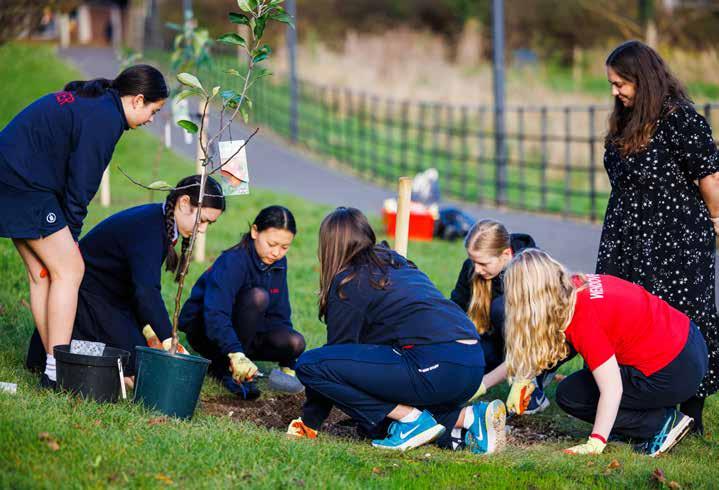
It was a tiny bit ambitious to plant 12 apple trees and over 600 large bulbs in one afternoon, but because so many people lent a hand it was possible.
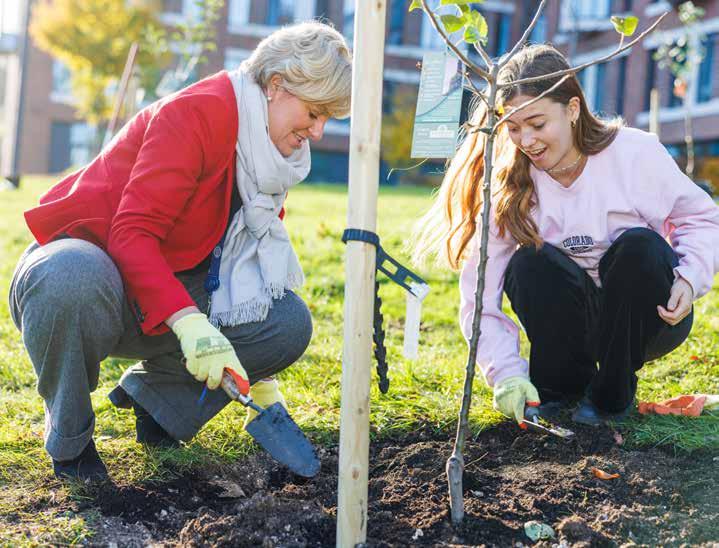
Between the beginning of the project and the time of writing, every member of the Grounds team has contributed, whether it was removing a small number of existing young trees from the area to make room for the new apples, mowing the orchard, levelling and seeding the old tree circles, excavating the planting holes, mulching the tree circles with the Abbey’s own leaf mould, litter-picking or providing advice, ideas, enthusiasm and support. However, I must single out Louis for his help and hard work throughout. Much grattree-tude to you.
I look forward to more gardening projects ahead, in fact I’m going to start looking through the seed catalogues soon to see if there are some hardy annual plants we can grow with each of the Houses in the Spring of 2022.
Ms Melanie Constantino Lead GardenerAs part of our 125th anniversary celebrations, pupils put their writing skills to the test and entered our 125 Essay Competition. Girls were challenged to write 125 words about a woman who inspires them. They could choose women from the past or present, famous or personal to them and could write either a poem or an essay. The competition was also open to pupils from our sister schools in China and Hong Kong.
We had some wonderful entries, and it was an incredibly difficult decision for the judging panel to choose the top ten. Ms Bowen, Chair of the 125 Committee said, “It was fascinating to see how they all used 125 words in the form of prose and poetry and how they expressed their admiration whilst telling us more about their chosen person. Indeed, I think the judges found reading the entries both inspiring and enlightening.”
This is for every inspirational woman. Who does not have. A Wikipedia page. Every brave. Hero. Who was lost to history. The depths of. Time. And those still fighting. Whose voices. Cannot be heard. Each and every individual who has helped build. Our world today. With a little more. Peace. Each soldier. Warrior. You are all. Heroes. Yet you do not wear a cape. Or fight with superpowers. Or a gun. Each rebel. Who dared to take. A stand. Sister. Let’s stand side by side. Dream on. Let us make the dreams. Reality. Sister. For every single. Silent suffering sister. Who chose. To help heal the world. Even in. The most minuscule ways. Who keeps going. You are inspirational. And this. This is for you.
LVIn the barren lands of Kenya, Where the sun perched high and hot, The place where few animals dared to trot, And where once was water, was not.

In the barren lands of Kenya, People would walk until their legs shuddered with pain, Until their eyes would water from strain.
Just to find the water, the falling droplets of rain. But, one woman had an idea.
Congratulations to:
1st: Emily (LV), For our Silent Sisters
2nd: Frances (LV), Jane Goodall
3rd: Zi (WASHK), Dr Wangari Maathai
The writing talent of the pupils who entered shone through their pieces and they were a joy to read.
As the chimpanzee reached out his hand to hold the outstretched arm of Jane’s, she knew her predictions were correct. Apes were capable of emotion and human intellect. She had made observations never made before in this meticulous way, in Tanzania, Africa, alone with nature, pursuing a career in a field where women were not accepted at the time (primatology). She connected with the wild itself, understood it, cared for it, and acted upon its wellbeing, almost becoming its voice. Her powerful words, expressed in The Book of Hope and her speeches, inspire me to have her optimism, diligence and peaceful fortitude. Even when I’m 87 years old, I hope to be unfazed by my age, as she is now, learning and sharing knowledge daily.
Frances LVDr. Wangari Maathai restored the area, She was a scientist, but to the people, a saviour. And she helped their home glisten with moisture. She planted a seedling of hope with many other women together. The action spread, until fifty-one million trees were planted altogether! And with that seedling, she proved a small action could change the world forever.
Zi WASHK
I am inspired by every single girl who does not have an education. In the world, we have 130 million girls who are out of school, and 15 million of them will have never set foot in a classroom. As someone who has spent most of their life in school, core memories of learning and life lessons have been created, and I know that when I am older I have the opportunity to be independent as I can always rely on my education. To have no opportunities, to have nothing except a life of dependency and no choice, even to receive a simple education is what drives me towards the future because change is essential and we, as a privileged new generation need to bring it.
Ahana
LV
A British-French woman, Fearless, competitive, and athletic, Strong and Bold lived a merry, childhood.

The husband died The widow and her daughter alone.
Became a secret agent, then, Hid the fact from everyone. She trained and worked hard, often doing things like fieldcraft. weapons. demolition. night and day navigation. cryptography. uniform recognition. communications. escape tactics. parachute jumping.

Broke her ankle.
Then she was ready.
Danger. First mission a success, but it was too late to celebrate.
Second mission. Death. Bad weather German soldiers.
Interrogated,
She was a mother, an agent, who sacrificed herself for her country. Her fearless determination. She was no other than Violette Szabo.
Ashley UIII
Hiroshima, the first atomic bomb. City of 300,000, half of us gone. Half of us barely clinging on. Little boy, not so little.

Heavens of ash and cinders. White light. Black rain.
A decade later and I’m on my hospital bed, folding a paper crane. They say I need one thousand, but hope is in short supply. Medicine wrappings will do, I expect. My fingers deftly tuck the corners in between periods of long slumber.
It’s a fanciful dream, but somewhere inside me lies a flickering hope. A hope I wish could be contagious.
So in spite of all they’ve done, and the darkness that follows our heels, I want to inspire. I want to heal. And I wish for peace in this ailing world.
For Han Hong, a Chinese singer
Where hides true talent nowadays?
Behind superficial layers, Masks of beauty, wealth, charisma. We have come to disregard what real skill, fine art, innovation is. In a world where patience is thin, where it’s all about flash and style, Where a pretty face will take you further than hard work and effort.
She was different, she didn’t care. Dedicated herself to her lifelong dreams, devoted herself to her music. She perfected, honed her craft then shared her works with the world.
Her voice was angelic, idyllic, perfectly sweet as the melodies of spring yet mature, assertive, passionate and rich with the vibrant hues of autumn.
She had not the slim figure of other stars or the delicate feminine features of any respectable celebrity, but her song encapsulates beauty itself, and compensates for any lack in appearance tenfold.
She deflects the haters and ignores the critics, focused as always on bringing joy to those who want to listen.
Before Carl Linnaeus classified organisms, before John James Audubon drew wild birds, before Charles Darwin proposed his theory of evolution, there lived a girl named Maria Sibylla Merian who loved to draw insects. With a keen eye and a deft hand, she rendered soft green caterpillars, papery-winged moths, and intricate butterflies. But drawing these captivating creatures wasn’t enough for Maria; she burned to understand their mysterious lives. Where did they come from? What did they eat? And perhaps most remarkable of all, were caterpillars and butterflies connected? Maria Merian became an artist, adventurer, and scientist in seventeenth-century Europe – when women were rarely allowed responsibilities outside the home, and odd interests led to witchcraft accusations. Her intrepid fieldwork and careful observations about metamorphosis changed science forever.
Fiona UIV
We have all complained about uncomfortable clothes but it is crucial to remember that the garments we wear today precede those that have inflicted pain and restricted women for centuries. Amelia Bloomer was an American women’s rights activist who created the first Magazine, the Lily, written by and for women in 1849. At this time, women lecturers were considered ‘unseemly’ and so Bloomer expressed her feminist views in these pages, striving to promote practical yet elegant clothes that were befitting to tasks undertaken by the modern woman. Bloomer’s courage to produce a magazine in a patriarchal society and to fight for equality through clothes is commendable. Her notoriety admittedly is small, but the fashion piece, the Bloomer, is associated with her and her inspirational work.
Lara UV
Stark lights, vague shapes
The harsh radiance hounding down the insecure
The unfamiliar, with this baited battle of raw skill and bated breath; Barbed stares, shapes of dread.
The eye-to-eye stare-down; war of perseverance despite the odds the blisters, swollen, hard - a small price to pay for this bittersweet victory, to last. Open wound you’ve got a nasty one there, ought to be cleaned up a scar for days of aching muscles and gruelling practices those years of perseverance that amounted to Serve after serve, each one hurtling through the air bullets proportioned with accuracy and cunning
A reflection of your potential, the potential of the people
The potential product of those 13 years.
Inspirational, at the tender age of 18 Neither fully fledged, nor lacking the odd feather
Precariously balancing on the tightrope Resistance. For pressure gnaws at your conscience
Influence of the Media have not been easy to shoulder when one is so young as you Taking the world by storm.
Urged to brave through the most anguished moments of despair
To triumph for one’s country: the call of patriotism.
Yet it is you who is the storm
The war-song in your heart.
Ardent in your zeal and gracious in manner. Never bow your head in shame of defeat
There is nothing to be ashamed of.
For this your chance, your golden opportunity
To show the world that you are strong.
A true legend.
Sissie
UIII
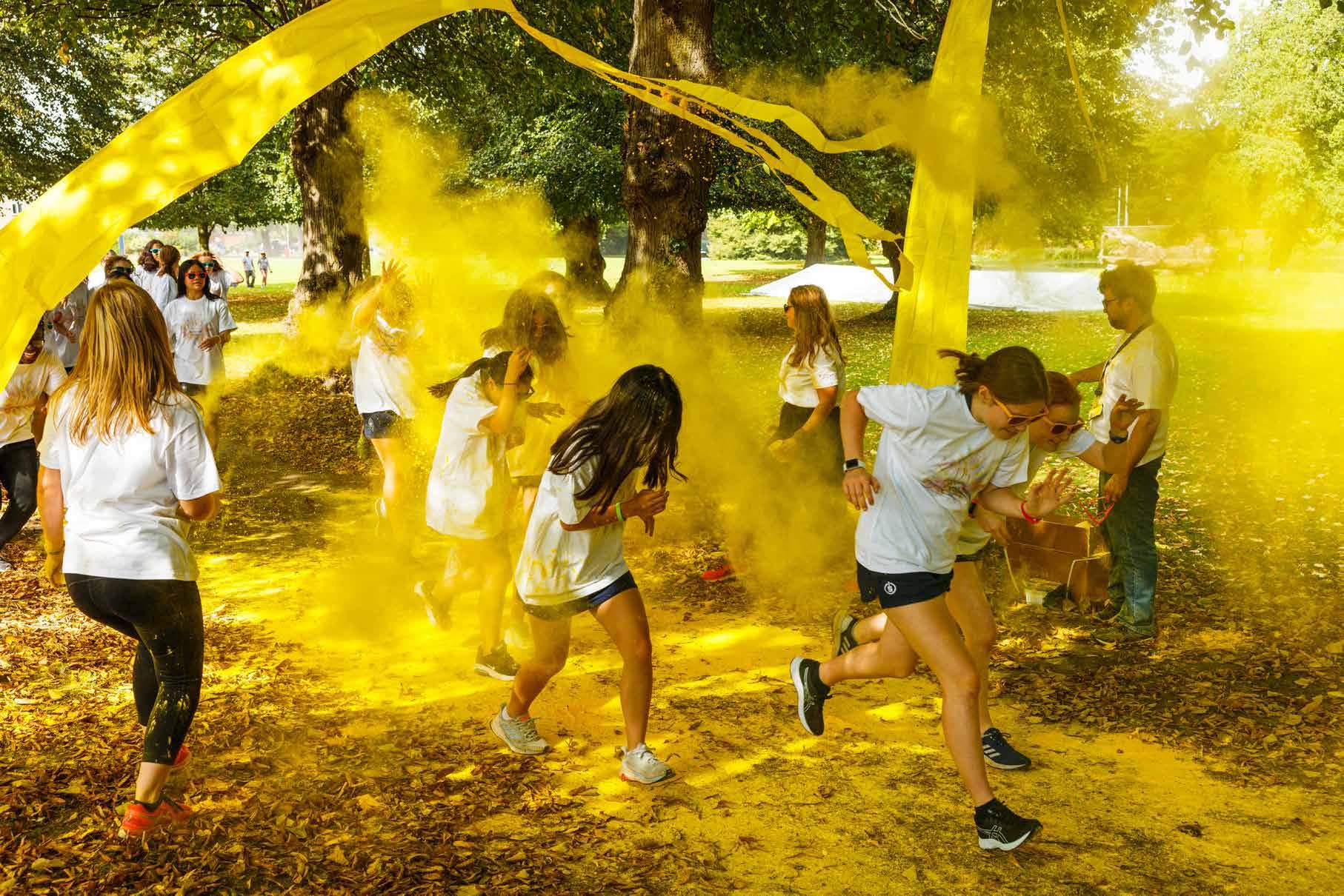
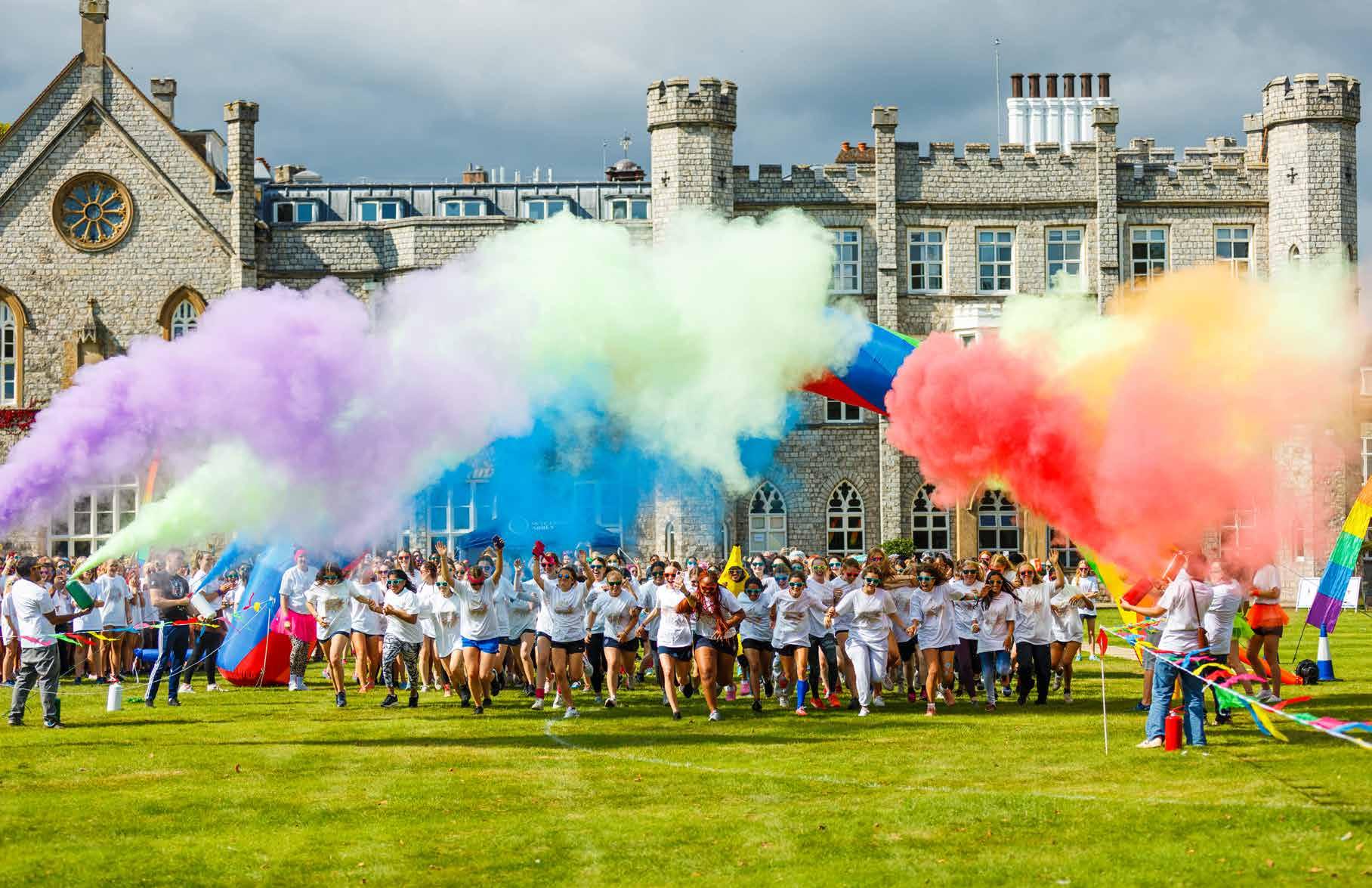

We headed down from Clarence decked out in our finery and looking forward to the first weekend at School since the Summer Term. Collecting our special 125 t-shirts, we anticipated the future of the white tops being no longer recognisable, and the misery of Housemistresses as colour would be trekked through the House. Mrs Gee, ever enthusiastic, led the warm-up, and played lively tunes of ABBA and the Macarena.
The Sixth Form gathered in the balloon archway, sunglasses down with the count-down starting; the fun was just about to begin! We spotted our teachers on the side lines - smiles on their faces, colour cannons in their hands, but soon we lost sight of them in the midst of the first cloud of powder. We ran through Lime Avenue, where we quickly pulled away from the crowd. We marched towards the first checkpoint; the Resident Tutors (RTs), overzealous in their enthusiasm, had not yet mastered the art of colour spraying so we were not doused in pink. Up through the trees, summer holiday unfitness led to a small break, before running towards a line of RTs, who having spotted we had not been drenched in colour, accepted the unspoken challenge. T’was a blitz of blue and we left the checkpoint Smurf-ier than before. On and on we ran (though how much running and how much walking one cannot be sure). Pink.
Red. Yellow. Green.

Looking to our side, we saw a countdown had begun - another year group heading off into the haze of colour fun. We reached Pitches 3 and 4; the finish line was in sight, but not before another drenching in powder - orange then purple. We crossed the finish line - our friends, who chose not to run, were waiting
t the beginning of March, our fantastic musicians put on a wonderful evening of musical performance in our Archer Recital Hall as part of Wycombe Abbey’s 125 celebrations.
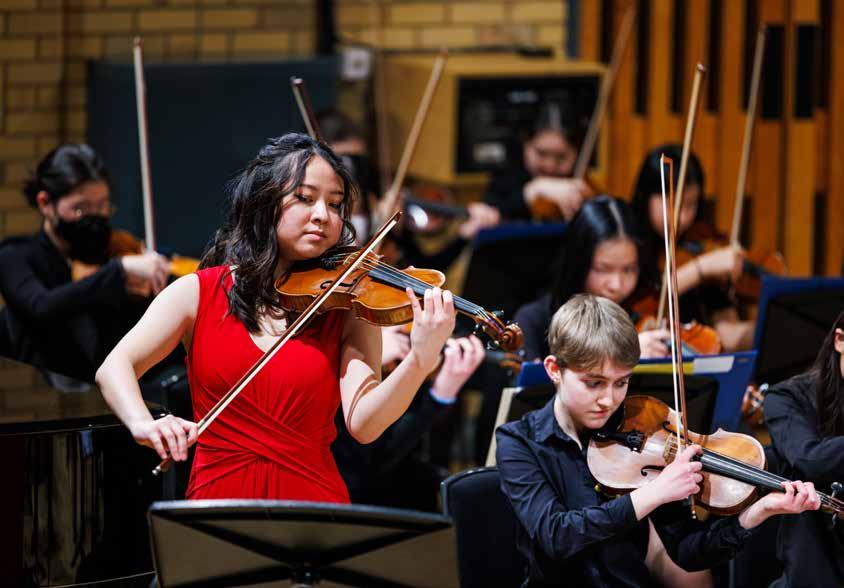
There was a real buzz of excitement as the musicians tuned up for a very special premier by Upper Sixth pupil Rosalie – an Overture based on the School song In Fide Vade . This concert was also special for four Upper Sixth soloists who were given the opportunity to perform with the orchestra. They rose to the occasion, spurred on by the usual Wycombe Abbey vocal support from their peers in the Hall. There was yet another premier, this time for Chapel Choir with O Be Joyful by Becky McGlade, a special commission for our 125 th year. There were also accomplished performances from Chamber Orchestra, Symphony Orchestra and Sinfonia.
The evening displayed the amazing talent and hard-working pupils we have at Wycombe Abbey. The electric atmosphere proved that Music at Wycombe Abbey is alive and well.
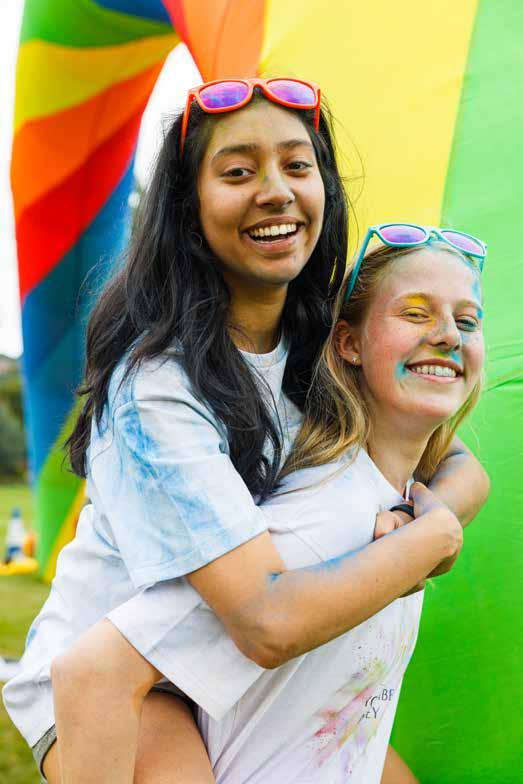







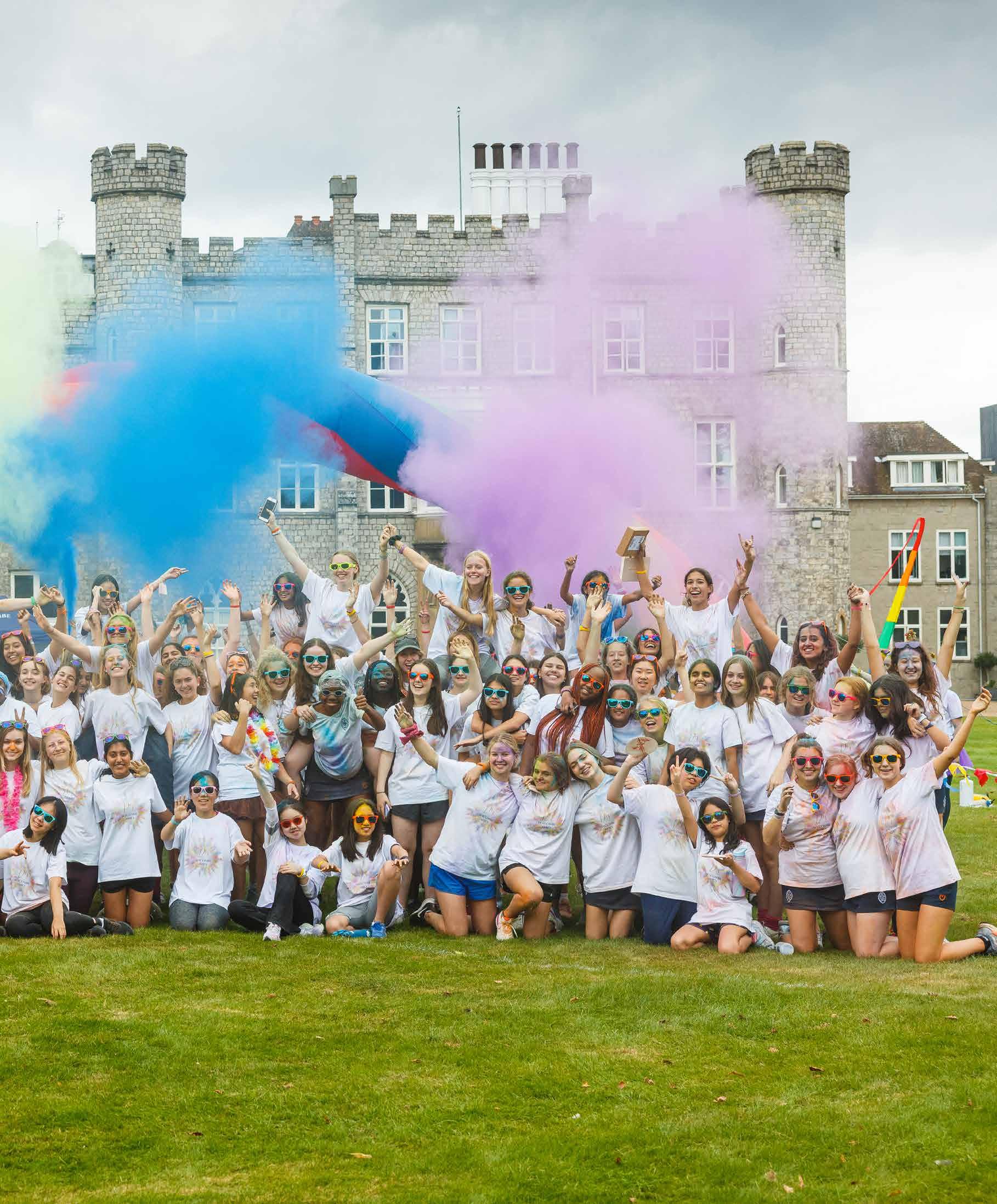


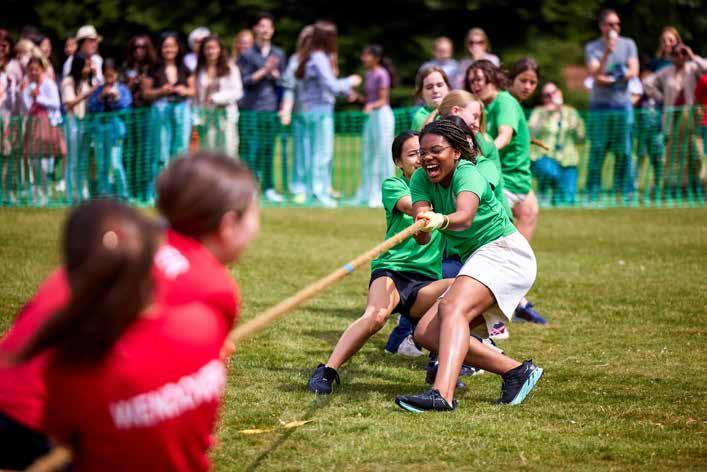
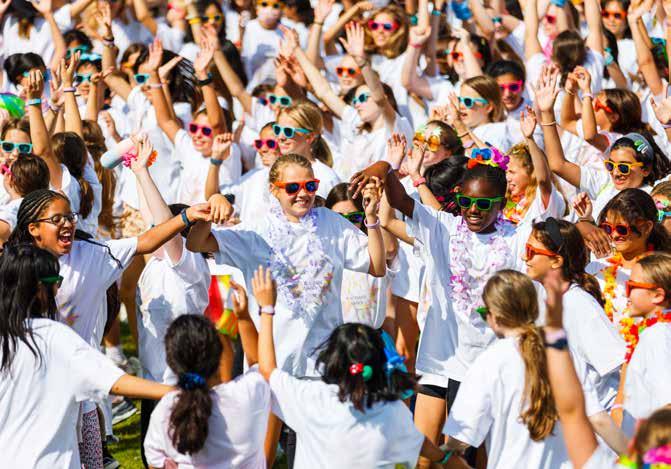
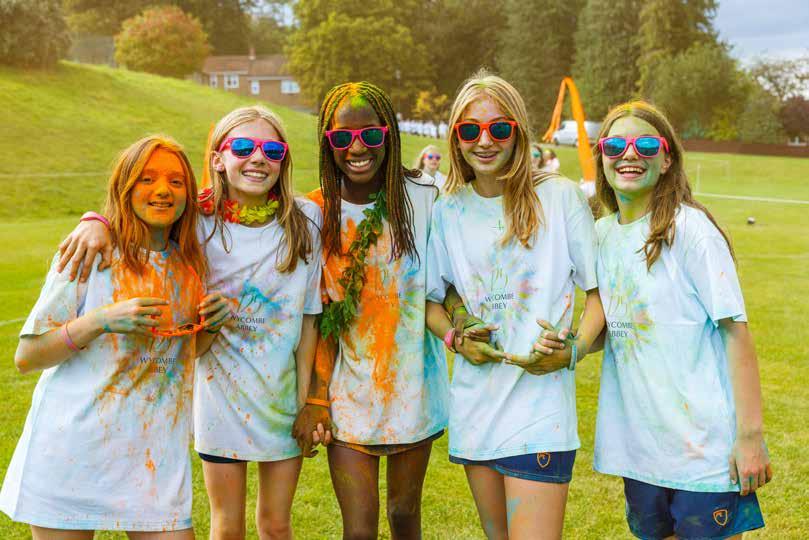
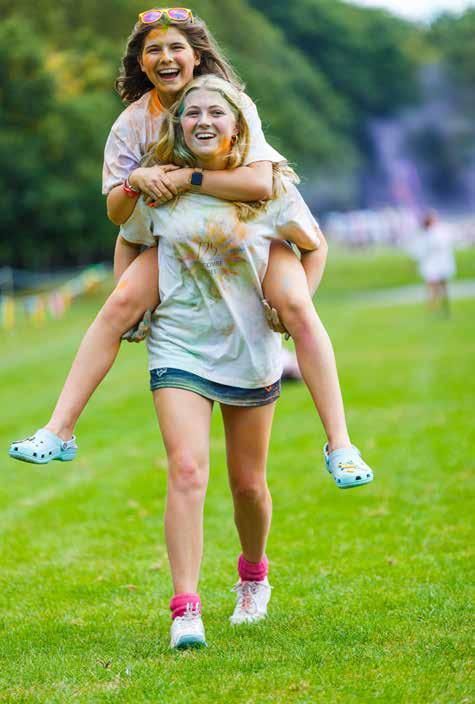
Dame Frances Dove surely would have found this most invigorating and entertaining.
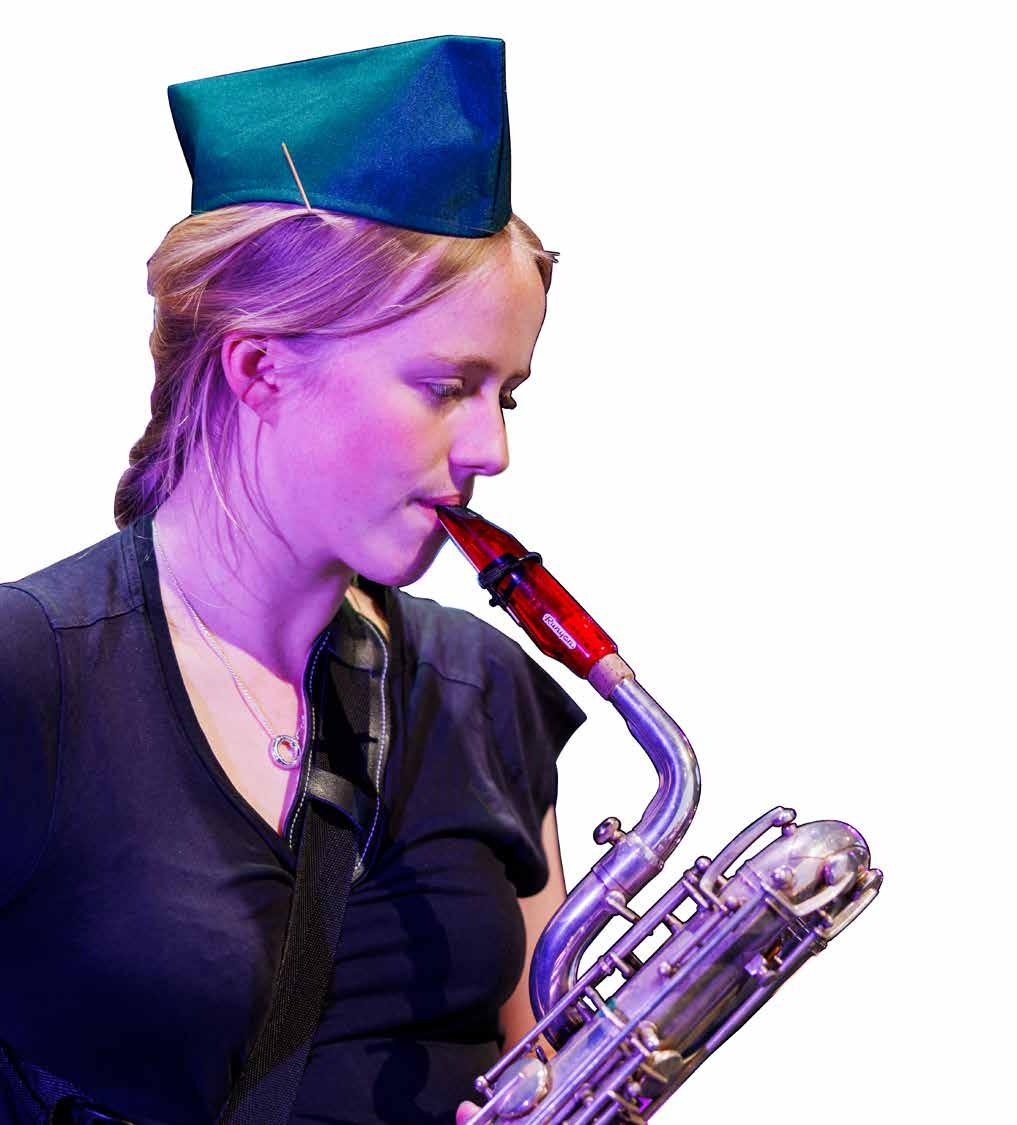
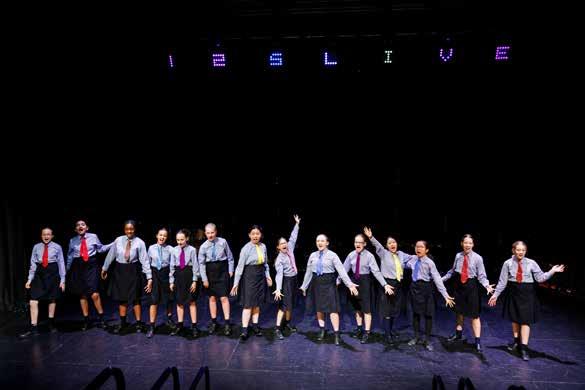
To celebrate 125 years of Wycombe Abbey, we created a show that would take our audience on a journey through the decades from 1890 to the present day.

The show starred over 100 pupils and featured a celebratory mix of music, dance and drama. 125 Live! placed the Wycombe Abbey pupils and their talents at the heart of the production in a way that our founder, Dame Frances Dove, surely would have found most invigorating and entertaining. Fourteen enthusiastic Upper Three pupils held the show together with their storytelling skills, fun facts about the School and energetic dancing.
Miss Cat Hoyle Creative Director of 125 Live! and Rubens Housemistress“Rehearsing and performing 125 Live! was an extraordinary experience and I have enjoyed every second of it. As storytellers, our job was to weave all the exceptional acts together so that the whole show ran smoothly and seamlessly. We narrated the story of Wycombe Abbey’s incredible Headmistresses, the School’s foundations and the gradual change from what the School was like in 1896 to how it is in 2022.
I personally found every act in 125 Live! absolutely spectacular. However, I particularly liked the Moulin Rouge dance, the jazz band and all three rock bands. I have learnt so many fun facts about School too, for instance, I learnt the names of the many previous School Headmistresses, that the Sports Centre was opened by Sir Steve Redgrave in 2004, and one of my favourite facts that Dame Frances Dove acquired some peacocks to parade outside her drawing room. Being a part of 125 Live! has been a once-in-alifetime opportunity and I am glad I had the chance to be a storyteller. I have loved collaborating with my friends, being able to learn numerous fascinating things about my school and to tell the remarkable story of Wycombe Abbey.”
“Act after magnificent act was exhibited as fluorescent lighting illuminated the stage in hues of dark blue, pale gold and bold pink. It was precisely in moments like these where we would all tumble down the stairs (with our senior House ties flapping) as we started the opening act. The moments where we would stare open-mouthed as performer after performer delivered to the best of their ability, admiring the passion of their voice and the power of their movement as they brought the show alive. It was in moments like these that I would suddenly feel a surge of exhilaration; to realise that I was part of this, a part of this new generation of Wycombe Abbey pupils brought me immense pride in my role in the show. At the beginning, I was rather nervous and was tempted to shy away from the challenge I was faced with – having to present to a large audience. But as the rehearsals went by, I grew in confidence and with the help of Miss Hoyle, applied a steadier pace and varied my tone of voice to each different piece of narrative. The highlight of being a storyteller was to be able to stand up proudly, spotlights shining and microphone at the ready – and speak of the past, the present and the future that I am so proud to share. This, for me, is what made me say yes to 125 Live!”
Sissie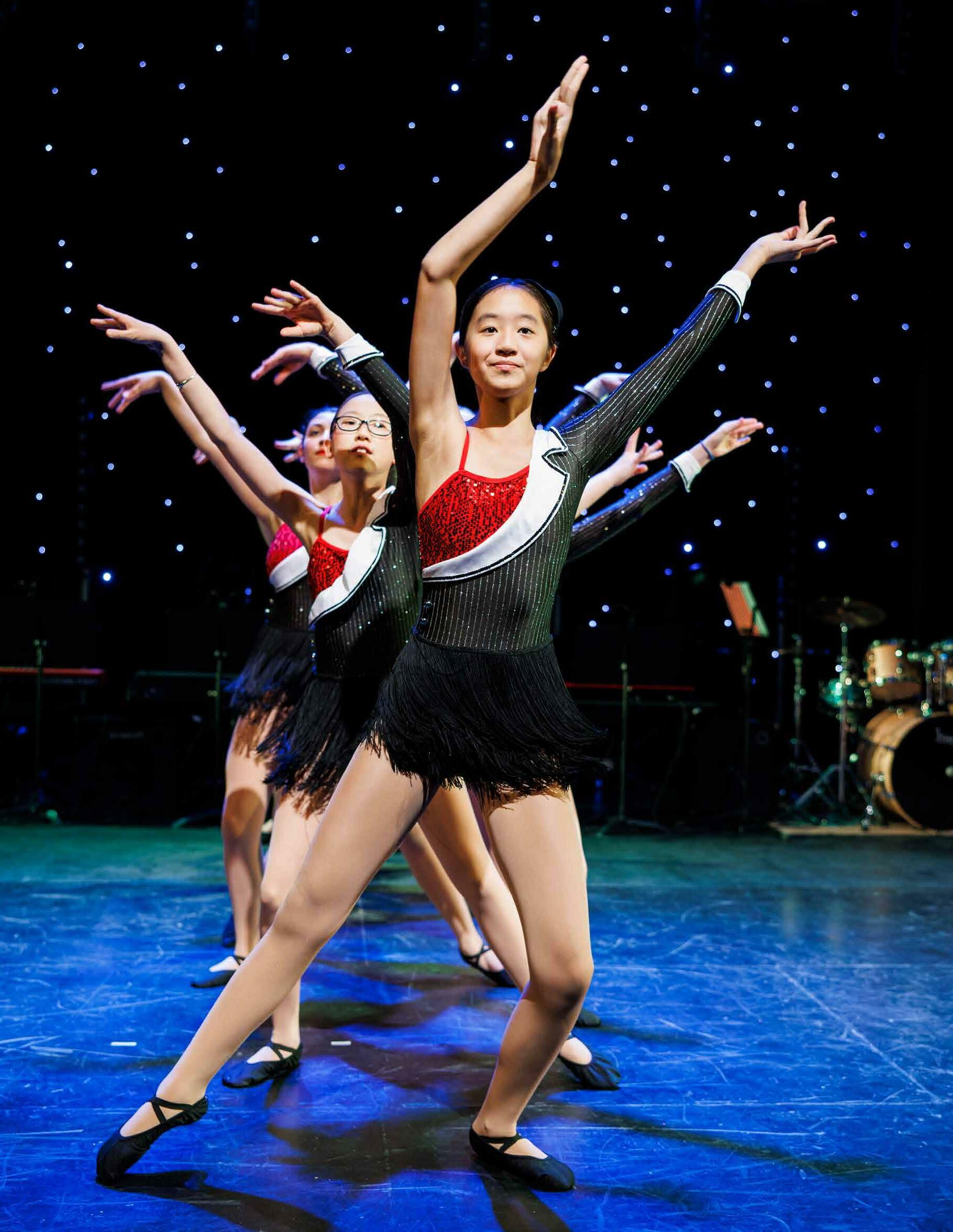
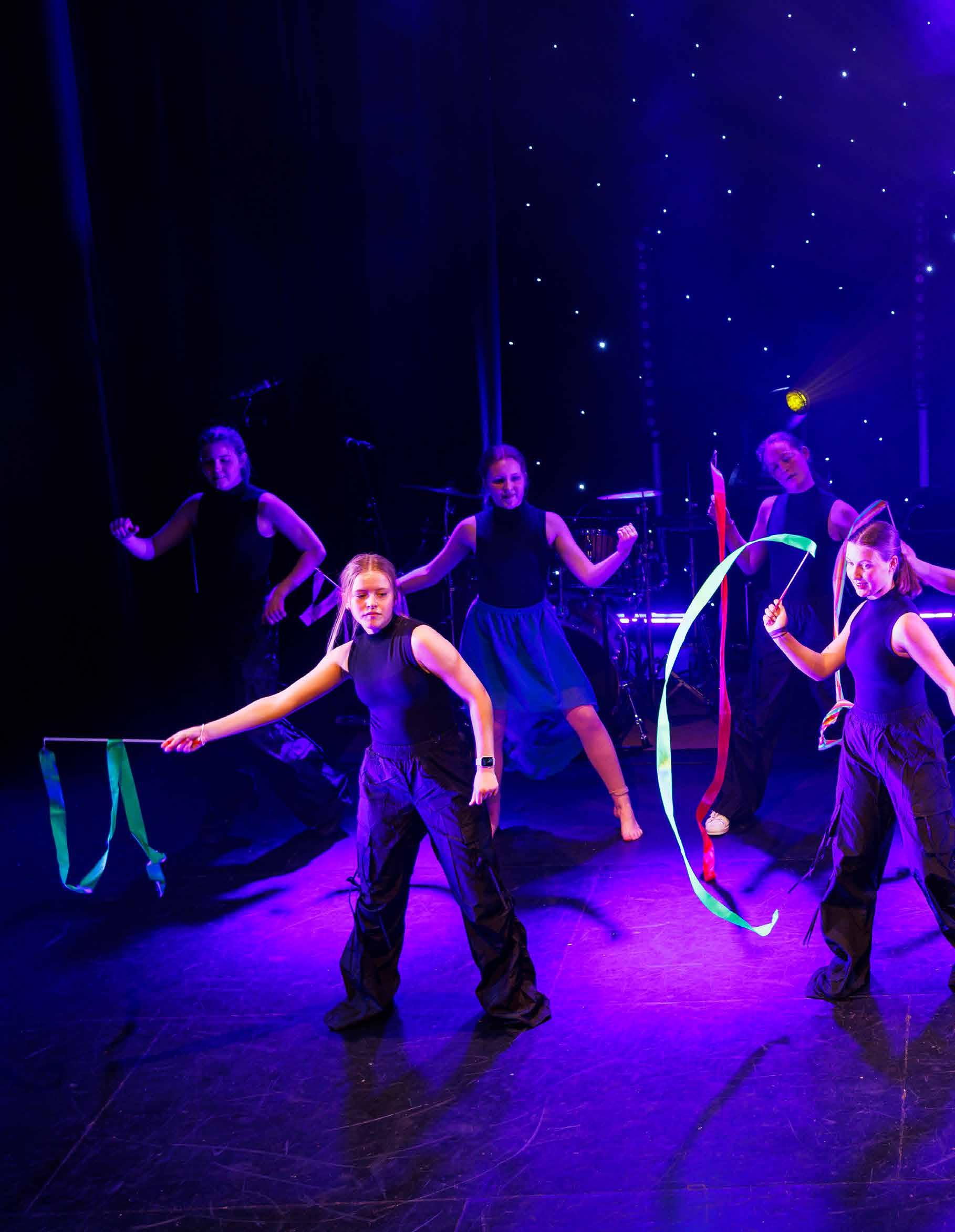

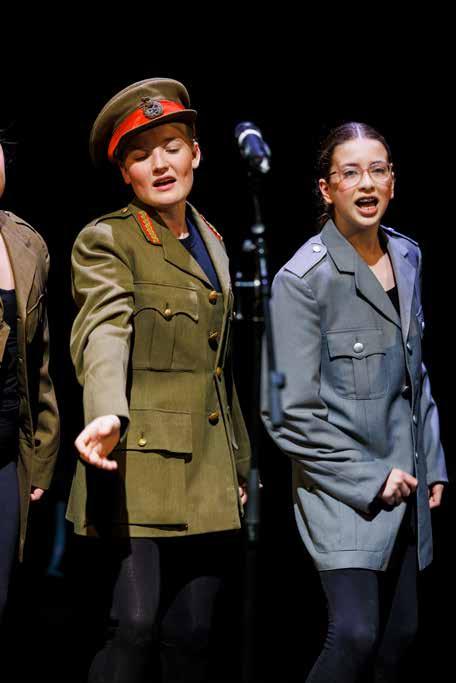




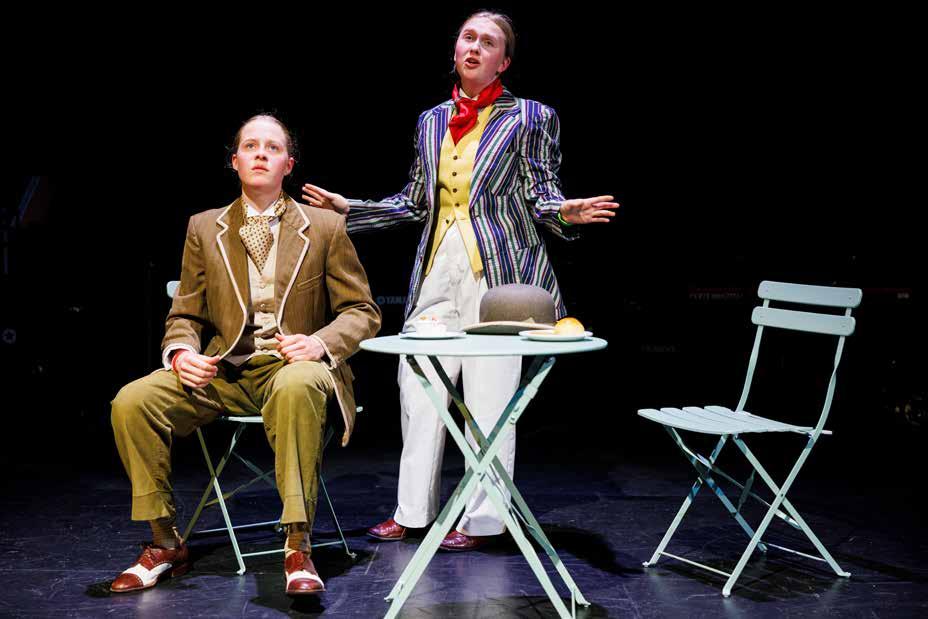
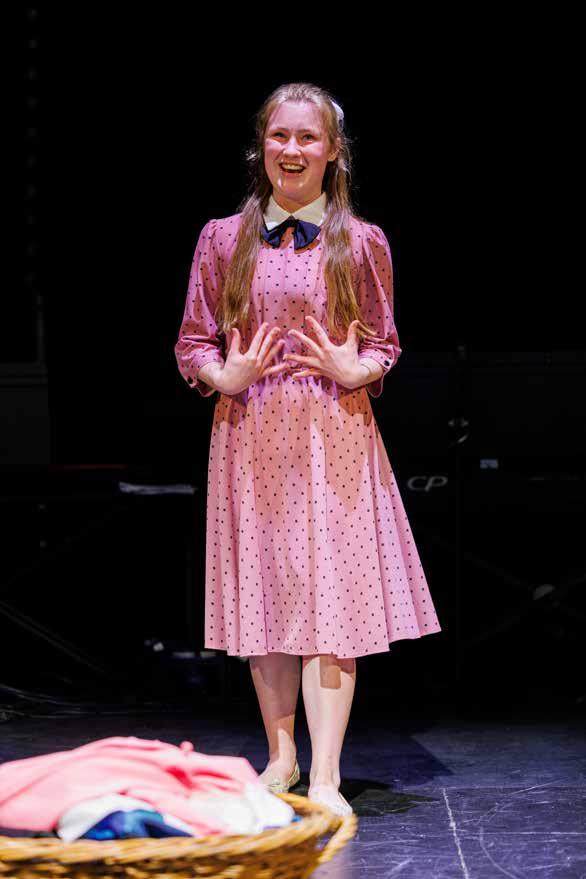
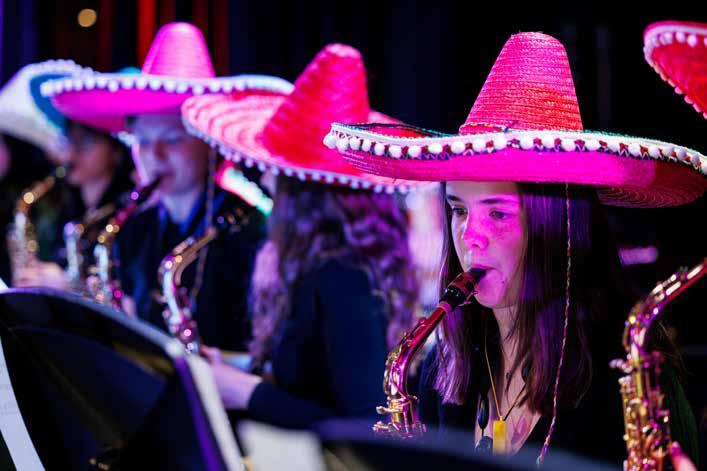
J
ane Frances Dove was born in 1847 to parents who were firm advocates for social welfare and education. At the age of eight, Frances started learning her father’s own versatile curriculum alongside her brothers. She went on to study at the Queen’s College, Harley Street – an institution that prided itself as a pioneer school, providing women with formal qualifications when most others did not. Her time there was cut short after just under three years as the family relocated to the countryside. Far from the railways and urban London lifestyle she had known, Frances spent two years teaching her younger siblings, undertaking parish work, and helping her mother with needlework. After two years of this, she pressured her parents to send her back to school, this time a boarding school in Chiswick. In her own words, this school proved to be “everything a school should not be”, so she was promptly withdrawn after a year.
That year had not gone to waste, however. She later recounted that it was at Chiswick when she began to think about creating a school that could provide “lonely country girls” such as herself with the “the same advantages of intellectual stimulus and the inspiration of noble ideals of life as their brothers did at their schools”. It was with this appetite for progress in higher education that she entered Girton College in 1871 aged 24, then known as the ‘College for Women’. Though unfortunately unable to obtain the scholarship she had aimed for, she scored first in Mathematics amongst 11 candidates – a “rarer” success according to one examiner – and received a letter of encouragement from Girton’s founder. Frances continued to work hard and ultimately secured a Girton College certification for the Cambridge Natural Sciences Tripos in 1875.
That same year, she was recruited as a Science Mistress at Cheltenham Ladies College, teaching Physiology. After seven years, Frances left for St. Andrews where she assisted her close friend and several other Girtonians in establishing what would eventually become St Leonards School, their aim being to create the first girls’ boarding school with standards equivalent to boys’ schools of the time. The boarding houses brought new opportunity for girls and the mistresses themselves, offering freedom from society’s stiff expectations. Unshakeable and passionate about cultivating an environment of academic excellence and intellectual curiosity, Miss Dove succeeded her friend as Headmistress. However, she could not forget her unfaltering vision to establish a school from the ground up, an institution that was wholly her own work. Within two months of leaving St Andrews, Wycombe Abbey School opened its gates for the first time.
Founding Wycombe Abbey took an incredible effort. She established the Girls’ Education Company in 1896, while finishing off her responsibilities at St. Leonards. The company’s council brought together a range of highly renowned individuals, among
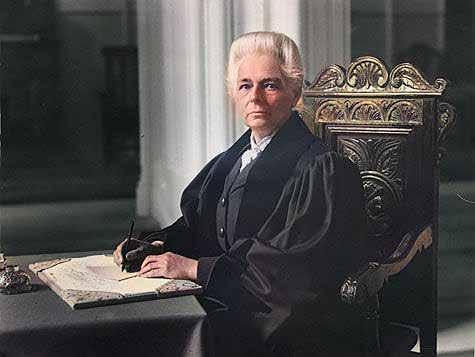
them Lady Airlie, Professor and Mrs Lewis Campbell, Dr John Moir, and Dr Montague Butler. Miss Dove’s frequent correspondence emphasised her “energetic nature”, continuing to ask for the latest updates even while ill. She spent a remarkable amount of time personally shortlisting appropriate grounds to actualise her vision, finally settling on Lord Carrington’s home – Wycombe Abbey. The initial asking price was staggering, but through skilful negotiation, this was reduced to £20,000 (approx. £2.7 million today) for the Abbey and 30 acres surrounding it.
As the first Wycombe girls stepped onto its grounds, they encountered deliberately cold morning baths and chilly dormitories, which were considered necessary for building resilience. Staff supervision in the boarding houses was rare, although this does not mean the girls’ welfare was neglected –quite the opposite. A deep trust developed between staff and student, something valued by Miss Dove. Her desire to create a community can be seen in her justification of limiting the School to just 200 students: “I must be in touch, in absolute touch, with every girl in my school, and I feel that my limits are reached at two hundred. I wish to know everything about each girl who resides here – in short, I want to take the most motherly and complete supervision of each of these young lives.” In her article, Cultivation of the Body, we can see that she strived to ensure Wycombe equipped girls with intellectual excellence as well as ‘moral power’. A diverse curriculum was introduced; besides Mathematics and Natural Science, Miss Dove saw value in vocational additions such as carpentry and gardening. She thought carefully about physical recreation, with her writings extolling the advantages of team games in developing girls’ characters. She articulately she links traditionally feminine virtues to particular sports; “gentleness and courtesy, combined with strength and determination” were developed in cricket, hockey required a “cheerful endurance” and lacrosse promoted “obedience… individual unselfishness… grace and agility”. She was confident that due to her system, “much
greater strides will be made in the future, to the enormous gain, not only physically but mentally and morally, both of women in particular and of the nation as a whole.” She also wanted Wycombe Abbey to be the beginning of a lifetime of service, imbuing social and moral responsibilities. Girls were encouraged to undertake social work in England and missionary work abroad; she introduced them to the United Girls Schools Mission and the Melanesian Mission in the South Seas.
True to her own values, Frances Dove was socially active in her wider community. A devout Christian, she contributed much to local churches, raising funds for the building of a new church and Church of England school. She was also involved in supporting the needs of Wycombe’s less fortunate; the Central Aid Society she inaugurated in 1906 branched off into the Invalid Children’s Society, the Workhouse Girls Aid Committee of Moral Welfare, a tuberculosis dispensary, and various other organisations. Unsurprisingly, she was involved in education more widely, serving as governor of the Royal Grammar School, its girls-only equivalent, and the Technical Institute. In addition, she held monthly informal conversations with teachers from all the schools in town.
Politically, Frances Dove was also an ardent supporter of women’s suffrage. In her article, Why I Want the Vote, she remarked that “the whole status and ideal of womanhood must be lifted into a region that is not hitherto occupied. It must, in fact, occupy the same place as that of the best men, and the same principles and ideals must govern it. Now this will never take place until women have the franchise, i.e., until a woman counts for as much as anyone else among the citizens of her country.” In 1907, in the first elections open to female candidates, Frances became the first woman appointed to the town council. She proved so popular with the local people that in 1908 she was voted mayor-elect by her fellow councillors. Justifying her nomination to the post, she declared that “men’s work and women’s work are to my mind complementary. The one is incomplete without the other. It is a pity that women have not yet realised their responsibilities more keenly.” However, a frenzy of opposition to women’s suffrage in light of the actions
of the suffragettes led to her being de-selected by just two votes. Had she won, she would have been England’s first female mayor. Undoubtedly disappointed, she did not allow it to impact her community work, returning to her duties with fervour. She only allowed herself a moment in public to acknowledge the pain of falling short of the vote in commenting that “I did not seek the honour; it was thrust upon me and some of those who thrust it upon me voted against me.”
In 1910 she retired as headmistress of Wycombe Abbey but continued to work tirelessly in the local community. Appointed as a Justice of the Peace of the County in 1912, she learned to drive in her mid-seventies to better fulfil her duties! Testament to her years of service, she was appointed Dame Commander of the Order of the British Empire in 1928. After visiting the Palace she recalled that “the chief impression left upon my mind was that all in the Palace from the highest to the lowest were imbed with a spirit of quiet dignity and willing service, surely an inspiring example for us all.”
Dame Frances Dove died in 1942 at her home in High Wycombe, but her legacy lives on. A magnificent stained-glass window in High Wycombe’s Parish Church was gifted by Dame Frances Dove, containing portraits of famous women who had made notable contributions to English society at the time, including Emily Davies, Florence Nightingale and Elizabeth Fry. An individual of incredible steel and single-minded determination, Dame Frances Dove left behind a legacy of social awareness and community service within the School, town, and country that she gave so much to. Undoubtedly, she deserves a place amongst the other women in immortalised on stained glass, as a pioneer who shaped British society.
 Meryl UVI
Meryl UVI
Frances Dove’s emphasis to her pupils on serving the wider community and cultivating a sense of individual responsibility was certainly not lost on Elsie.
The art collector and socialite Peggy Guggenheim once described herself as being ‘out of this century’, this century being – of course – the twentieth. Elsie Bowerman was of quite a different upbringing and temperament, and although she would not have had the inclination to claim such a label for herself, she is certainly equally, if not more, entitled to it. Indeed, surviving the Titanic, nursing in World War I, and watching the Russian Revolution unfurl, dovetail as a contents page in a history textbook and as episodes in Elsie’s life. Whilst at first her string of accolades and the places she found herself might draw from us cries of, ‘what are the chances?’, ‘how could this all happen to one person?’, a delve further into Elsie’s upbringing, and her time at Wycombe, reveal a logic in the intertwinement of Elsie’s life with that of the twentieth century.
Born in 1889, Elsie was her parents’ only child. She lost her father at a young age and was, from then, brought up by her mother, who was ambitious for her daughter and decided to send her to the school recently established by Frances Dove – our very own Wycombe Abbey. Elsie left Cloister House in 1907 to study modern languages at Girton College, Cambridge, where other Wycombe and St Leonard’s girls had paved the way before her. It is in these early years after leaving school that Elsie’s life began to connect with events of a global scale: the Titanic, the First World War, and the Russian Revolution. Elsie’s own documentation of the Titanic tragedy in her (unpublished) memoir Reflections on a Square is brief, describing chiefly the ‘kindness and hospitality’ she and her mother received on their arrival in New York. Her account of the Eastern Front, where she worked as a nurse and mess-orderly from 1916-17, is much longer. In a substantial diary, Elsie records her experience with the RussoSerbian Unit of the Scottish Women’s Hospitals, caring for injured soldiers amidst
extensive mud and working long hours only to be met with nights sleeping in a tent.
Whilst Elsie was an observer and participant in some of the twentieth century’s early defining moments, she was also a sculptor of some of its major themes. At Cambridge, Elsie became actively involved in the ‘Votes for Women’ campaign, ultimately leading her to become the election agent for Christabel Pankhurst, who stood in the 1918 general election after the extension of the franchise. Pankhurst lost narrowly – by 775 votes – to the Labour Party candidate and trade unionist John Davison. Elsie’s depth of engagement with women’s suffrage led her to train in law, as she intended to equip herself with an understanding of the legal frameworks that limited women’s freedoms. Elsie joined the Middle Temple in 1921 (aged 32 and just two years after women were given access to legal training), she was called to the Bar in 1924. Her early appearances at court made headlines,

marking inaugural appearances of a female barrister and commenting on her evident flair. Elsie’s skill was such that barristers Graham Grapnell, W. Maitland Walker and Lionel Charles wrote to her following an appearance on the prosecution bench of a libel trial, to note that she had ‘acquired such command of legal principles as will in due time make her respected and feared at the Bar and induce others (including men) to learn from her and treat her word as law.’ Elsie validated their observations in her subsequent twentyyear career as a lawyer. One of Elsie’s notable legal achievements that holds great relevance for all in education is her book The Law of Child Protection (1933), which gave readers in a post-Victorian world an accessible chronicle of adults’ responsibilities over children, the age and conditions in which young people could work, the nuts and bolts of adoption, and the chequered history of child protection to date.
Later in life, Elsie combined her legal experience with her commitment to women’s rights in her role as Secretary to the Commission on the Status of Women at the UN, which she undertook for a year in 1947. Her recommendations to the Commission at the end of her term were for integration with the Human Rights Commission, which was an executive body (that the Commission on the Status of Women was not) that could produce policies rather than solely recommendations. She also called for more women to be represented in all commissions. At a similar time but closer
to home, Elsie established the Women’s Guild of Empire, a body which worked with local communities around the United Kingdom to improve the lives of women working in the home and elsewhere. The Guild produced a monthly journal detailing the progress of its various projects and reached 400,000 members. She frequently sought opportunities to bring women together and spoke of her desire to create a parallel of the Wycombe Abbey Seniors’ network that could be open to all.
Elsie had a somewhat gravitational pull towards moments of significance, and I would argue that it was Elsie’s upbringing and her education at Wycombe Abbey that set her compass towards the political and social issues of the day. Elsie’s father came from a strongly Methodist background (her grandfather had actually died on his way to see John Wesley) and, working in local government, embodied the political engagement of the nineteenth century non-Conformists. Her mother was an evangelical Christian and a Conservative, who was equally alive to the issues of the time, and would regularly debate with Elsie’s father, himself a Liberal. The Boer Wars and the social work of the local church were chief among the topics around the Bowerman dinner table.
The vitality of social and political engagement was further instilled by Elsie’s time at Wycombe Abbey. During her first night in Cloister, Elsie was introduced to the routine of gathering to listen to Miss Whitelaw read the day’s newspaper; as Elsie recollects in her memoir, ‘this evening

reading became the crucial moment of each day’. The Cloister girls would debate the articles, using their green scarves to signal their responses to the questions of Irish Home Rule. They would have, in fact, been partaking in two forms of political engagement at once, as whilst they listened and responded, they were also sewing the ‘Mission work’ garments that would have been sent to the United Girls Schools Mission, also known as the Peckham Settlement. The Settlement provided welfare support to families living in poverty in South London, it was supported by Wycombe Abbey from its foundation and championed by Elsie for the rest of her life. Frances Dove’s emphasis to her pupils on serving the wider community and cultivating a sense of individual responsibility was certainly not lost on Elsie. Indeed, the unity of the two women’s outlooks was demonstrated in one of both of their lasting legacies, the joint founding of the Dove-Bowerman Trust to fund bursaries for pupils to Wycombe.
Elsie’s life was certainly out of the twentieth century, but her abiding approach, which led her to partake in so many of its major events, grew from the fervent social responsibility that developed in the nineteenth – a wellspring from which Frances Dove herself also hailed.
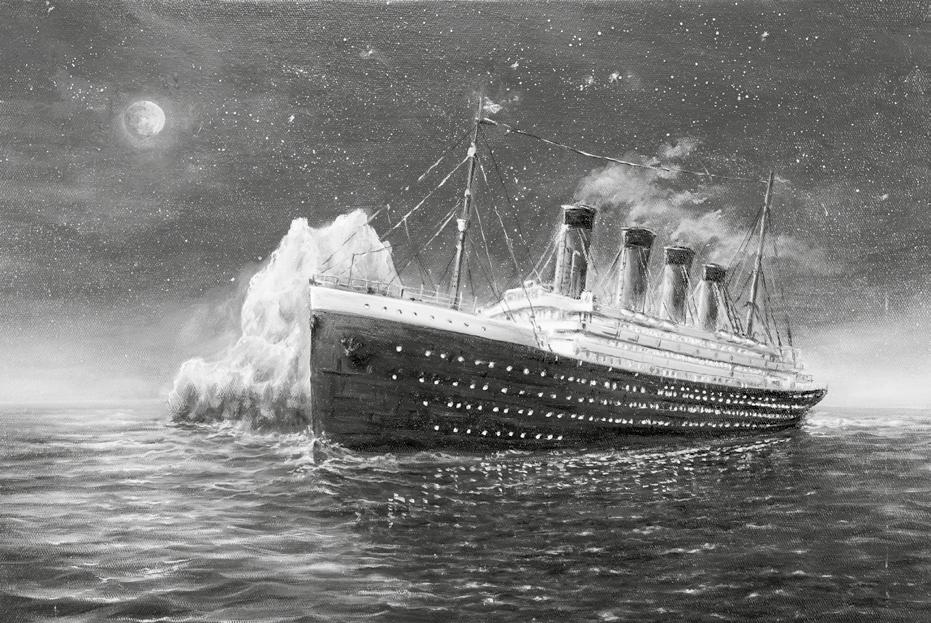

Wycombe’s attitude to equal learning is perhaps one of the reasons it has survived while many other girls’ boarding schools crumbled in the 1980s due to the rise of co-educational schools.
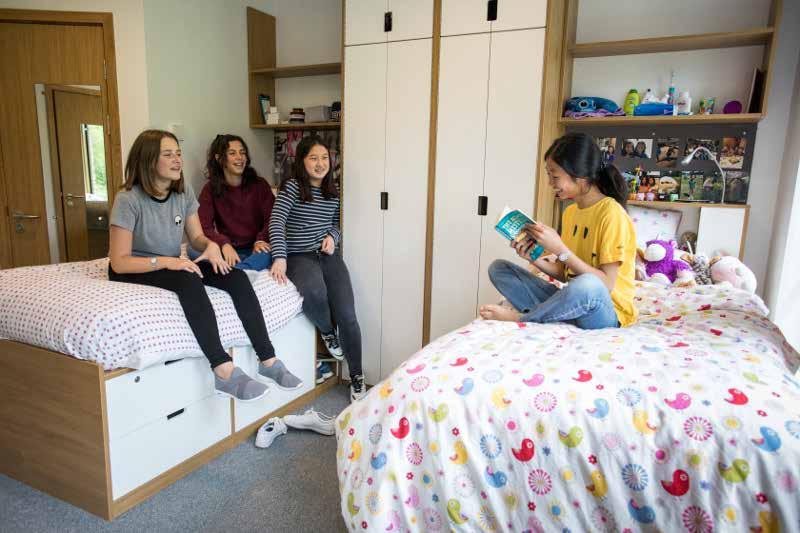
The summer before I came to Wycombe I was keen to learn what boarding was like. I had not been exposed to the Malory Towers novels, so took to watching St Trinian’s in the hope of gaining an understanding of what I was in for. I was terrified. So terrified that the film had to be turned off before it ended. Visions of girls brewing concoctions, with Russell Brand towering over them, haunted me. Of course, I had nothing to fear. This made me question how and why girls’ boarding schools have changed from the grotty, insalubrious institutions of the 1950s to the highly prestigious standards we enjoy today. In this article, I will look back upon the less shiny aspects of girls’ education from the late 1930s to the 1970s, why things have changed and what has led to the success of boarding today.
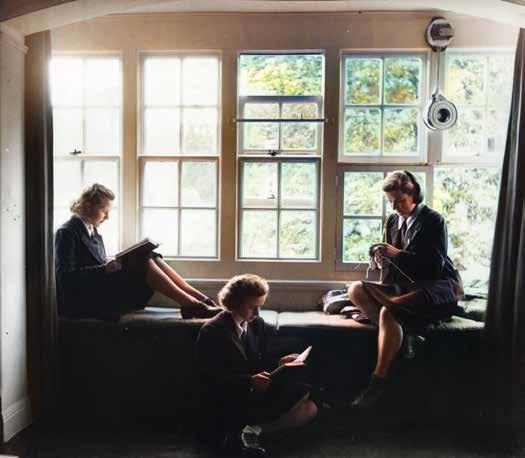
In order to understand how girls’ education has changed so drastically, we must consider why parents sent their daughters to boarding schools in the first place. Whereas now parents send their beloveds away for the best possible education, in the mid 20th century their motives were quite different. Most parents wanted their daughters to learn societal manners and have enough intelligence to hold appropriate dinnertime conversation. Although some schools like Wycombe and Cheltenham Ladies prepared their girls for a more ambitious future, most equipped them to attend a finishing school, have a possible career as a secretary before settling down to become wife and mother. Teaching was less focused on the so-called boys’ subjects like sciences and more on how to correctly leave a dinner table. Moreover, how parents chose their daughter’s school was also very different. While mothers and fathers now spend hours pouring over prospectuses and numerous afternoons at open days with reluctant tour guides, in the mid 1900s these efforts were reserved for the scrutiny of their sons’ schooling. Many parents who lived abroad wanted their daughters to have a ‘proper education’ – meaning associating themselves with girls of their own ‘class’ and hopefully marrying one of their brothers. This meant that sometimes little thought was placed
into their daughter’s academic education and snap decisions were made on the basis of the headmistress’s smile or a particularly interesting uniform. Girls as young as four were sent away to these institutions, very different from how they appeared on their leaflets and experienced a much tougher and in some cases, torturous upbringing.
The first major difference of boarding schools then and boarding schools now is the huge gap in the living standards. Although we may complain about the showers in the Outhouses and the plumbing in Daws Hill, our dorms seem like a luxury utopia compared to the shabby conditions of the 50s where ensuite bathrooms were a complete unknown. Girls were only allowed to have baths three or four times a week with lines drawn onto the tub showing where the four-inch water limit was. Food was generally abysmal with rationing continuing, the aim was to be filling rather than delicious. Despite ‘Meat Free Mondays’ being the ultimate controversy today, in the 1950s the food at Wycombe was much more severe including tales of the same oil being used to make the Friday fish batter as the Saturday doughnuts, meaning all the doughnuts tasted of fish. However, girls were forced to eat all of the food they were given to avoid succumbing to the worst possible fate of being called ‘a fussy little girl.’ Schools tended to be ruled either with an iron fist or with no rules at all. The former lived in constant fear they were brushing their
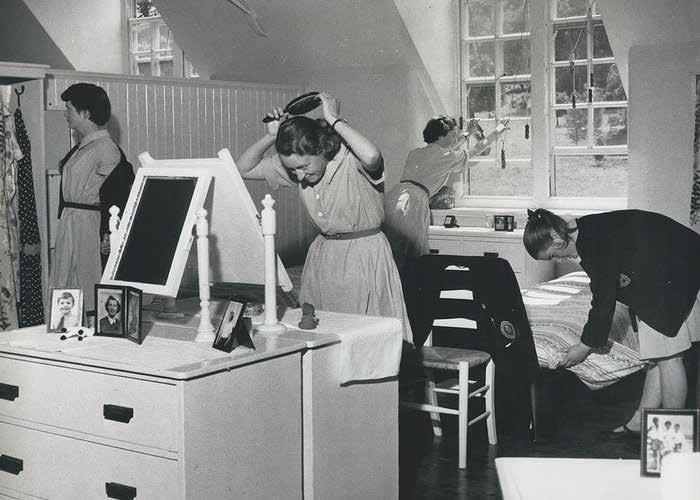
teeth in the wrong direction or wearing the wrong type of skirt. The latter lived in anarchy, spending days in highjinks, with school inspections completely unheard of.
However, there are some things which remain the same. The initial pangs of homesickness can never be avoided and the constant desire to fit in still lingers. The fear of becoming an outcast because you wore the wrong shirts or spoke the wrong way was even more exaggerated at these traditional schools. This was no better exemplified than in games. Either terribly perfect for some or perfectly terrible for others, many excelled in the invigorating games of lacrosse and many lived in dread of the slow hours spent in constant deluge trying desperately to catch a ball. Unlike today, modern dance or kickboxing alternatives were not available and either you failed or you flourished. Nevertheless, this ‘nasty, brutish and short’ environment allowed for the making of excellent friends who either excelled with you or joined you as a social pariah.
Now on to teaching. A school’s educational standards could be distinguished if one asked about the science facilities. When asked about a ‘lab’ in a traditional boarding school, it was more common to think of the dog breed rather that than the laboratory. Most schools tended to focus on arts and classics rather than science and maths, leading their students on to careers as secretaries with a few O levels and an A level, if they were lucky. Whether this was because of lack of opportunities or funding or general bias, it is unknown. But, for the most part, although girls came out with incredible confidence and awareness, they were severely disadvantaged and lacking encouragement. However, at Wycombe Abbey, this was not always the case. When Dame Elizabeth Butler-Sloss announced in 1946 that she wished to be
a barrister, the headmistress at the time made her give the vote of thanks at events to improve her public speaking. Wycombe Abbey girls were also known to be extremely diligent, with the school format being modelled on boys’ public schools and girls were often found revising Latin declensions by torchlight (some things do remain unchanged).
Wycombe’s attitude to equal learning is perhaps one of the reasons it has survived while many other girls’ boarding schools crumbled in the 1980s due to the rise of co-educational schools. As we reflect back on the experiences of girls’ boarding from the 1940s to the late 1970s, we cannot help but feel a little nostalgic for the days of smuggled in apples and gossiping about housemistresses. However, the equality and opportunity of today’s schools shows how far we have come. It is so natural for us to go on to university, but this accomplishment was much more of an achievement in the past as it meant not only working diligently but also defeating the societal expectations of following the general order of finishing school; secretary; wife.

When meeting Seniors in their seventies and eighties, it is amazing to see how they share the same strong and resilient character that I have found in my peers today. Even though we may not be subjected to the cold baths or stern housemistresses, nor suffer the prejudices or societal expectations of past times, there is one thing which perseveres: the formidable and indomitable spirit of the Wycombe girl lives on.
Edith UVI
First published in the Wycombe Abbey History Journal, June 2022
...the ever-popular Dog Show began with over 50 primed and eager pooches taking part in categories including waggiest tail and best trick.

Ayear of celebrations for Wycombe Abbey’s 125 th anniversary came to a spectacular finale with Dove Day on Saturday 25 June. The day began with a beautiful chapel service led by our School Chaplain Reverend Penny, and we were delighted to see so many parents join us for this service, indeed there was hardly an empty seat! As the doors of Chapel opened and pupils and parents spilled out, the fête began.
Smooth jazz played as everyone checked out the stalls, grabbed a bacon butty and gathered around to watch the first instalment of entertainment of the day. The arena was first graced with a wonderful gym display demonstrating incredible feats of athleticism and grace. The competition heated up for Tug-of-War with each House cheering on their team as they battled it out for pride and glory.
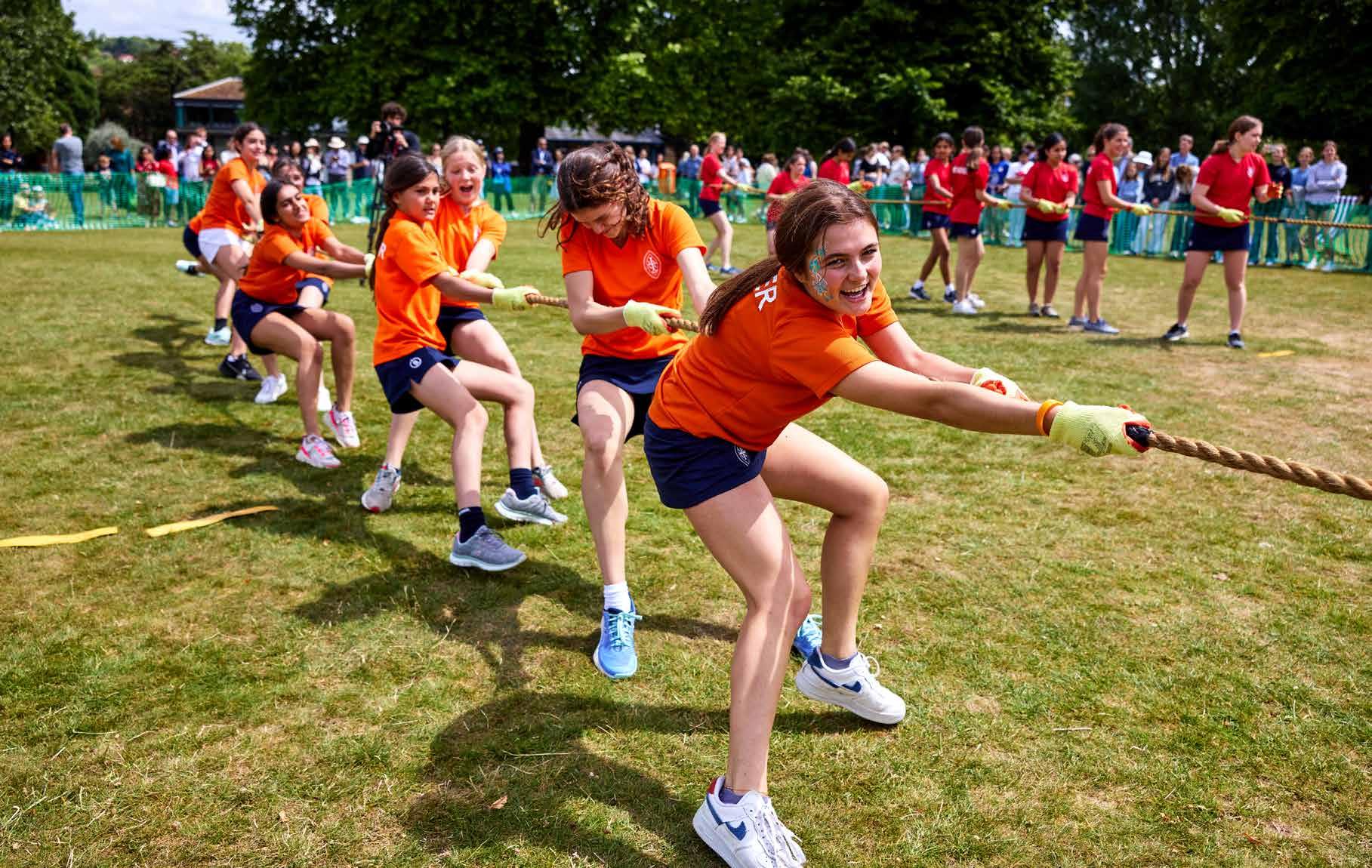
Before long, the ever-popular Dog Show began with over 50 primed and eager pooches taking part in categories including waggiest tail and best trick. As the action continued on Midget Pitch, elsewhere pupils and parents were taking the opportunity to experience ‘Open Doors’
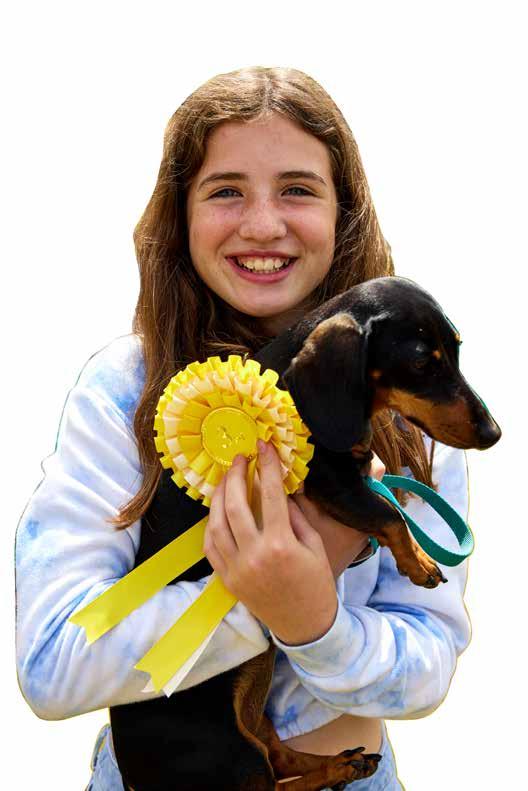
and to take a look around parts of the School they may not have seen, such as the newly installed Cookery room, Clarence House, and the soon to be reopened Big School.
Before long, everyone was on the move to the House Marquees. It was lovely to see parents, pupils and staff all sitting down together to enjoy their picnic in the beautiful Wycombe Abbey grounds. After a leisurely lunch, Chair of Council, Peter Warren, took to the stage to give a moving speech praising the hard work and sacrifices that had been made over the last few years dealing with the pandemic. It was notable that this was the first Dove
Day in three years, and the joy at being able to meet all together was palpable. Mrs Duncan also spoke evocatively about the importance of community that days like Dove Day enshrine. Finally, the Head Girl Team spoke about a few of their highlights from the 125 year, including the Colour Run and Founder’s Day. The Charity Raffle for House Hampers was then drawn with the lucky winners delightedly collecting their prizes. All the money raised went to our elected Whole School charities – Ripple Africa and Sexual Abuse Support Service. Before leaving the stage, Mrs Duncan and Mr Warren cut the spectacular Dove Day cake which was then shared with all the attendees at tea.
The afternoon was a relaxed affair with a Review Show that showcased highlights from the year’s productions. Acts included a 1920s Charleston dance and 1980s acapella first performed in 125 Live!, hit songs from the School Musical Sister Act, an eclectic mix of dances from the Spotlight shows, an exceptional violin piece from the music competition, and the debut
performance of our pupil led Gospel choir Phire. The day ended with a joyous and stirring set from Concert Band with the surprise and hilarious addition of two giant dinosaurs – where else but Wycombe?!
Whilst Dove Day has been a highlight of the School calendar for many years, this year was undoubtedly extra special and huge thanks must go to the team of staff who enabled the event to happen, to all of

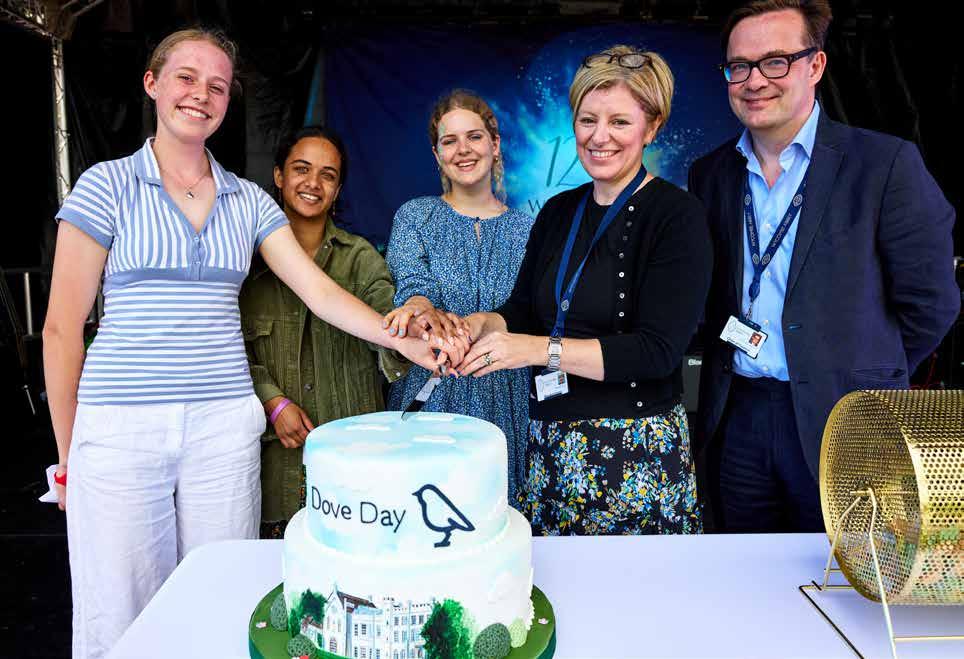
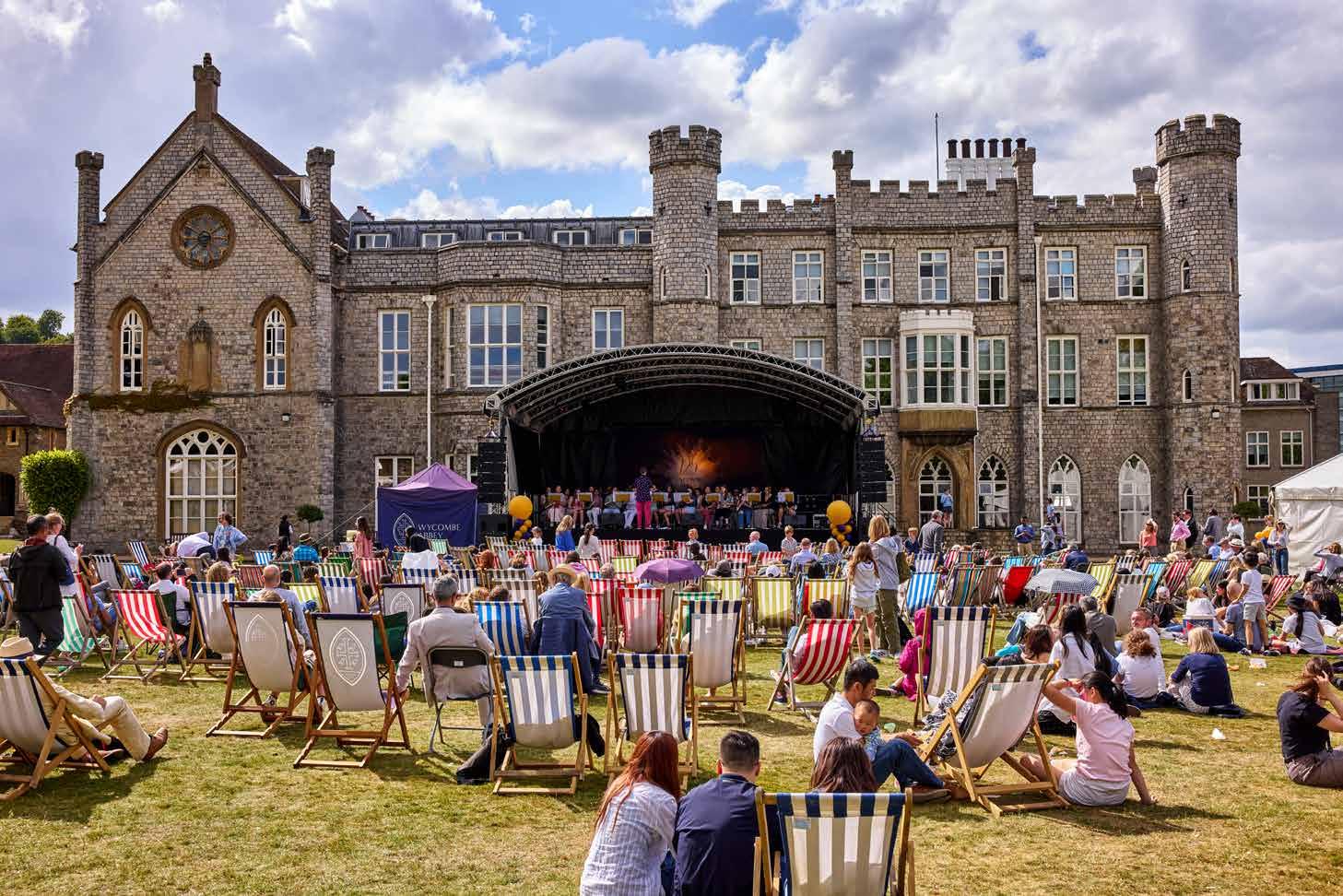
the pupils for taking part in the activities, and to all the parents and families who attended to support their daughters and the School.
Ms Emma Bowen Chair 125 Committee, Deputy Head of Sixth Form

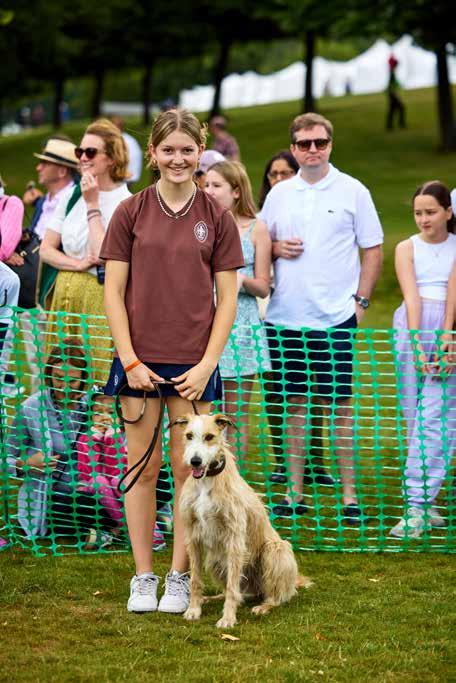


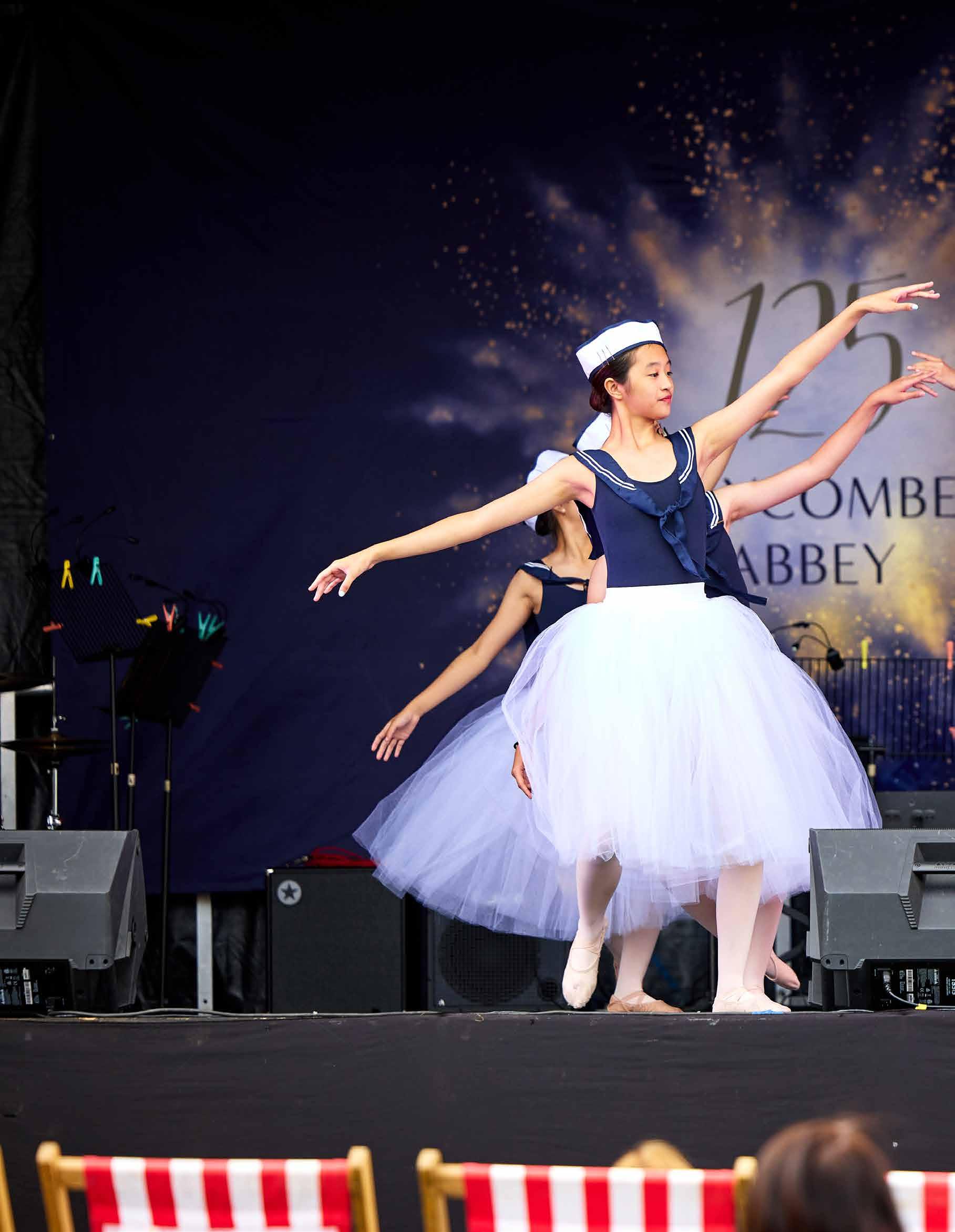


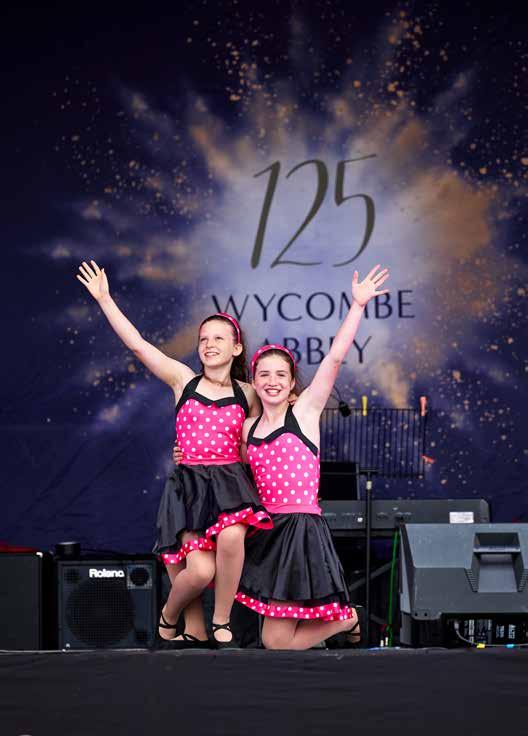
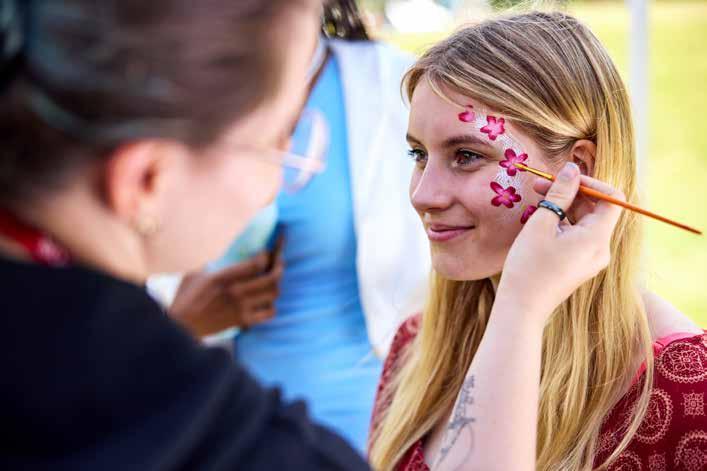
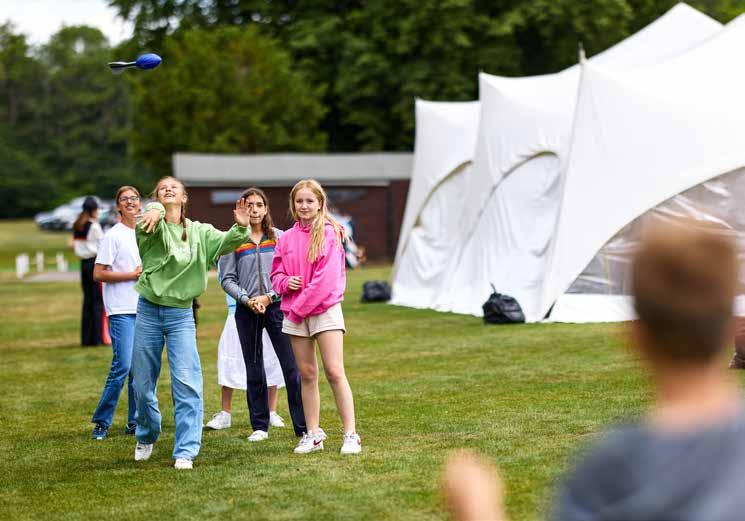
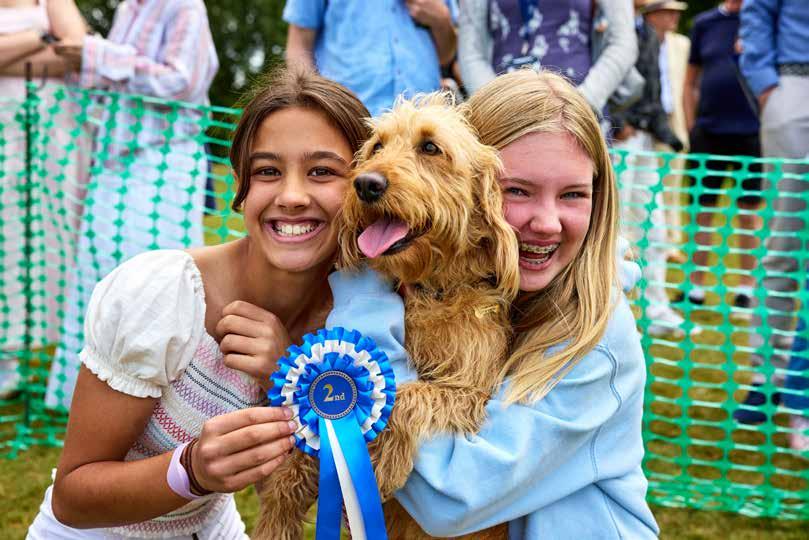


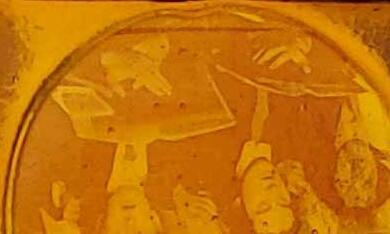

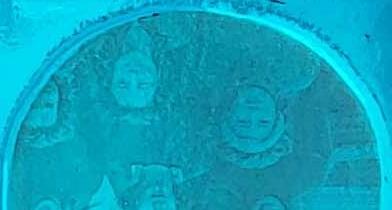

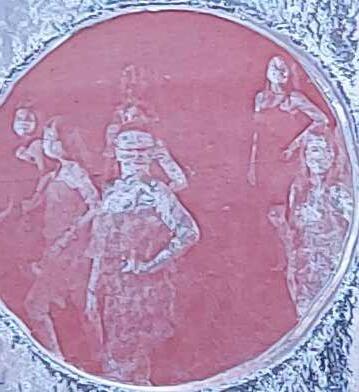
t was a privilege to create this piece of art for our 125 th anniversary. The project came about as a result of conversations with Fania Weatherby, our school archivist, and a trip to visit the Wycombe Abbey archives which tracks the history of the School with imagery going back to the beginning, 125 years ago. I had a great time looking through and learning about the way the School operated throughout its long history. Selecting imagery to use was not easy!
I worked with LIV to explore ways to use photos in collage before starting to plan the final window design. I was inspired by the beautiful William Morris and Edward Burne-Jones Windows in the V&A Museum. Considering how to create the structure to fit in with the gothic revival architecture of the Abbey, I decided to create a fairly classic composition based around the circles and a centre design. I used engraving to create the dove. Working with photographic imagery was new to me, and I spent time exploring and experimenting with the new technique before I was ready to use it. I tried to use all the colours of the houses as well as the blues to represent the School.
I loved working with the archive material – the older images were really fascinating. I combined them with more recent imagery to represent current times. There are now so many images to choose from, but curating the photos was not an easy task! Altogether, they tell the story of the 125 years of Wycombe Abbey.
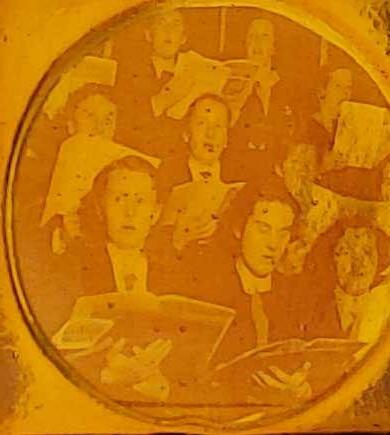
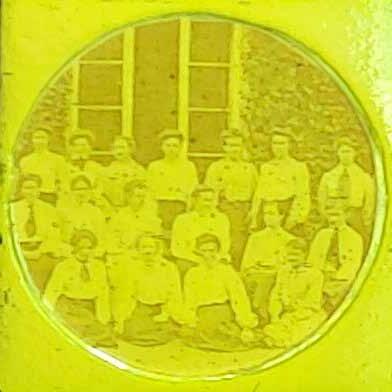
The completed stained-glass window is now on display for everyone to see in the Abbey corridor between Junior Library and the Staff Room.
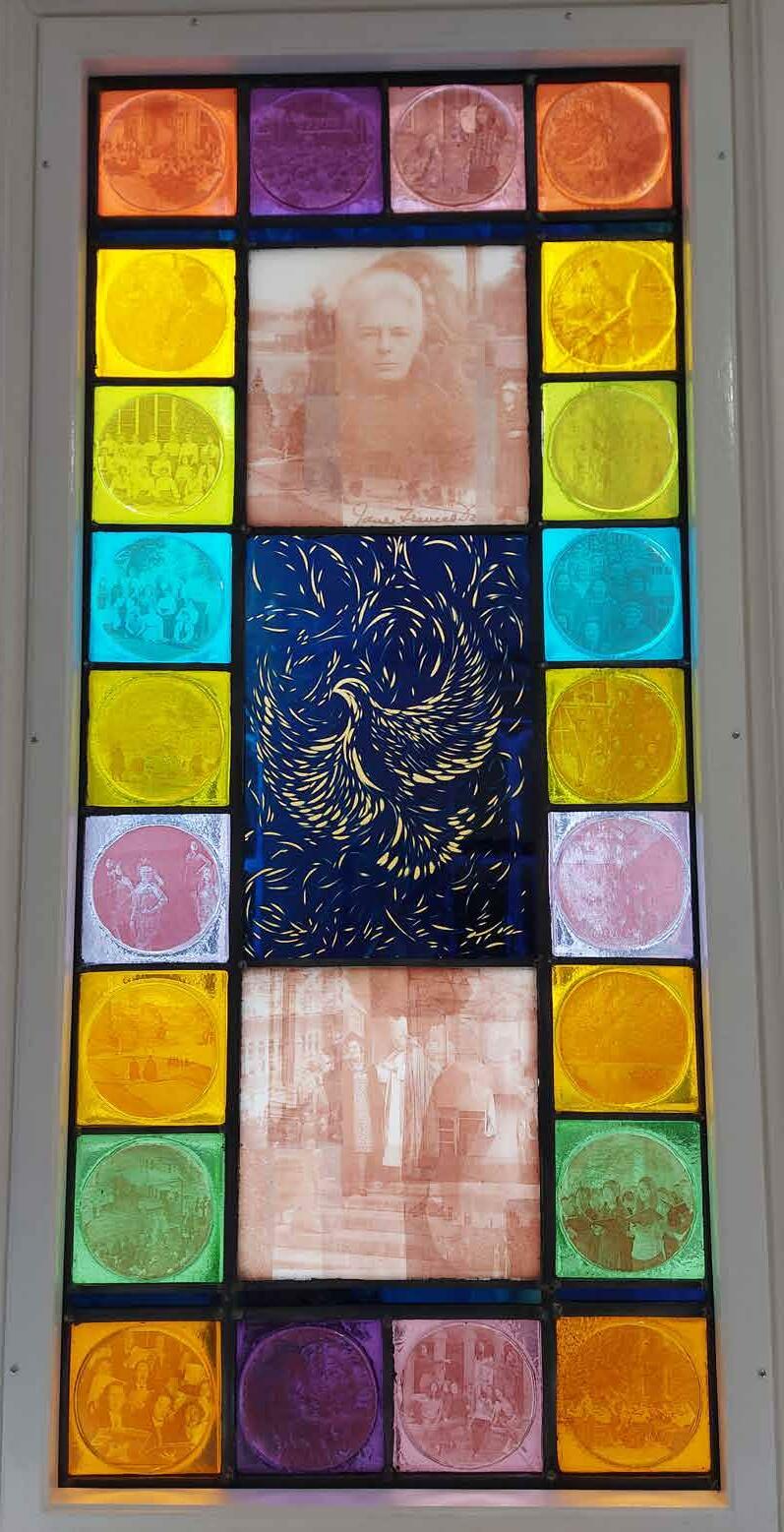 Close-ups of some of the glass images
Close-ups of some of the glass images
On a sunny day in June, we were delighted to welcome nearly 200 Seniors and Honorary Seniors to the 125 Seniors’ Day Grand Reunion.
After a delicious lunch accompanied by much laughter and conversation, we heard from Fizz Conway, Chair of the Seniors Consultative Committee, and the Headmistress, followed by a beautiful violin recital by Iris (LVI). This was followed by tours of the Houses, with many remarking on the changes to the site. Guests were also able to have a look at the restoration of Big School, before enjoying afternoon tea in the sunshine. We were also pleased to host a group of Seniors from the Class of 1982 for their 40 year reunion.

One of the guests remarked, “Having not been back for 23 years, it was certainly a trip back down memory lane, all with a warm nostalgic feeling! Great to see friends, past teachers and also to meet new faces, and served with a delicious lunch and tea.”

 Mrs Sally Brooks Development Manager
Mrs Sally Brooks Development Manager

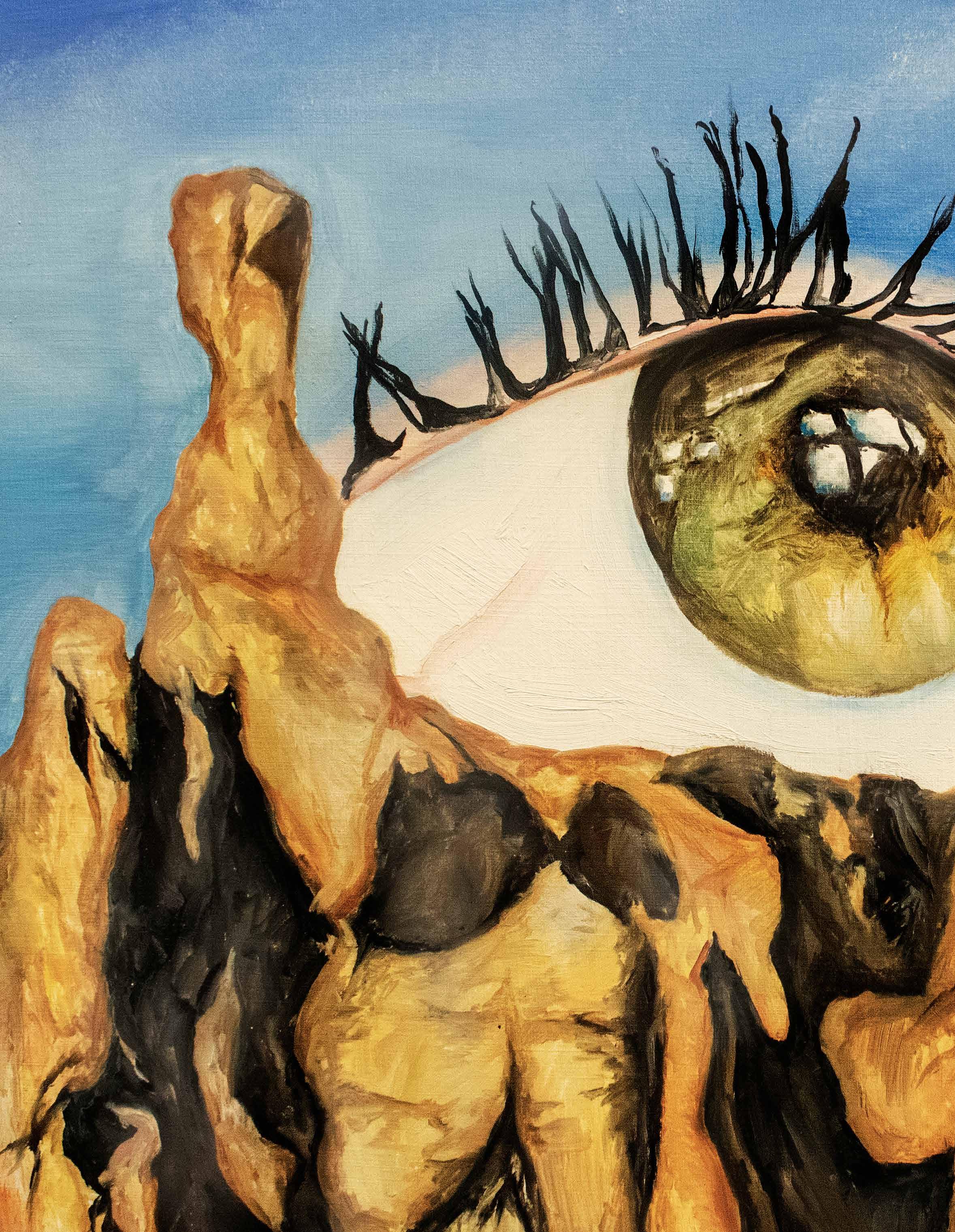


When I look back at the last ten months of sport, I am proud of all that the pupils have achieved, the support given by visiting teachers and the dedication of the PE staff. We have seen success come in many forms and here are just a few noteworthy mentions.
Three out of four Netball teams were crowned District Champions, all our Lacrosse teams reached the knockout stage of the National Schools Championships and our Swimmers placed 7 th at the National Bath and Otter Cup Gala. Junior and Intermediate Cross Country teams placed 5th at Regional Finals and the Fencing team placed 2nd overall at Public Schools. The Tennis team will be competing in the LTA National Finals and our Athletics team qualified for the regional round of the Track and Field Cup. Many pupils have also achieved individual success this year and should be congratulated. Francesca (UVI), Caterina (LV), Lily (UVI), Isabella (UV) and Tori (LVI) along with Miss Ruby Smith, represented their countries at the Lacrosse World Championships in America this summer. Pippa (UIII) and India (UIV) have been
selected to represent GBR in Sailing events, and Sarah (UVI) was crowned Public Schools Champion in Fencing. Jasmine (UIV) jumped an impressive 1.68m in High Jump and earned a place at the English Schools Finals. Annabelle (UIV) competed in 16 events at the British Swimming Nationals this summer and Grace (UV) competed in both the British National Swimming Championships and the English National Swimming Championships. Serena (UIV) competed in and won the England Golf Girls’ U14 Championships competing against 60 of the top U14 golfers from both UK and International clubs. Following this success Serena has qualified for the Junior European Open which is due to take place in Spain this November.
Whilst this list is long, it is only a small snippet of the excellence demonstrated by our pupils. Medals have been won which is fantastic, but what I would like our pupils to truly cherish are not the material trophies of success, rather the lessons that they have learnt, the memories they now have, and the mistakes they have made. While making mistakes is not always easy, being prepared to make them shows trust in your teammates, your teachers, and the path you are following. Mistakes are an important aspect of developing a skill, be that technical, tactical, physical or mental. I want to encourage all pupils to challenge themselves and take risks.
We are delighted with the number of pupils who regularly take part in cocurricular sport, be this extra lessons, squads, clubs or companies. All pupils have balanced their busy academic and
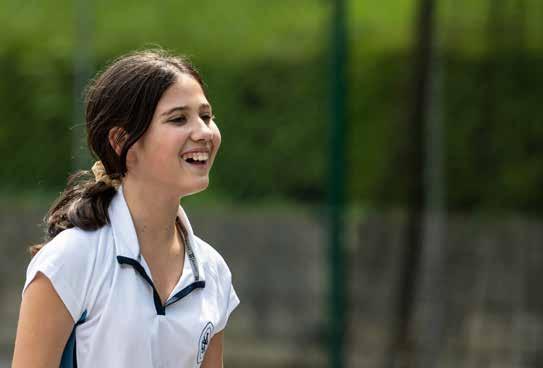

co-curricular schedules to attend these activities each week with much success. One of my personal highlights was seeing the dance captains embrace the change in the performance calendar with five dance performances throughout the year. Collaborating with the Drama and Music departments during both 125 Live! and the Dove Day Review Show was brilliant. We are looking forward to building on this further, being creative and innovative in future years.
House spirit and competition never fails to bring a smile to my face on a Monday afternoon in House Games, and this was highlighted even more with the recent Tug of War competition on Dove Day. The pupils displayed enthusiasm, energy and dynamism in their approach with plenty of smiles, laughs and a few falls. Pupils of all ages came together for this event to see who was crowned champions. Sports Leaders is another aspect of the PE programme that girls thoroughly enjoy. Throughout this course they serve as both leaders, role models and learners. Their development of new skills and confidence is an area we are proud to be part of. Through this qualification, pupils often mention and appreciate the challenges staff face, increasing the respect between teacher and pupil.
2021-2022 has been a fantastic year for sport at Wycombe Abbey. I would like to encourage everyone this summer to be active, try something new, and enjoy making more sporting memories with friends and family.
Mrs Fiona Gee Acting Director of Sport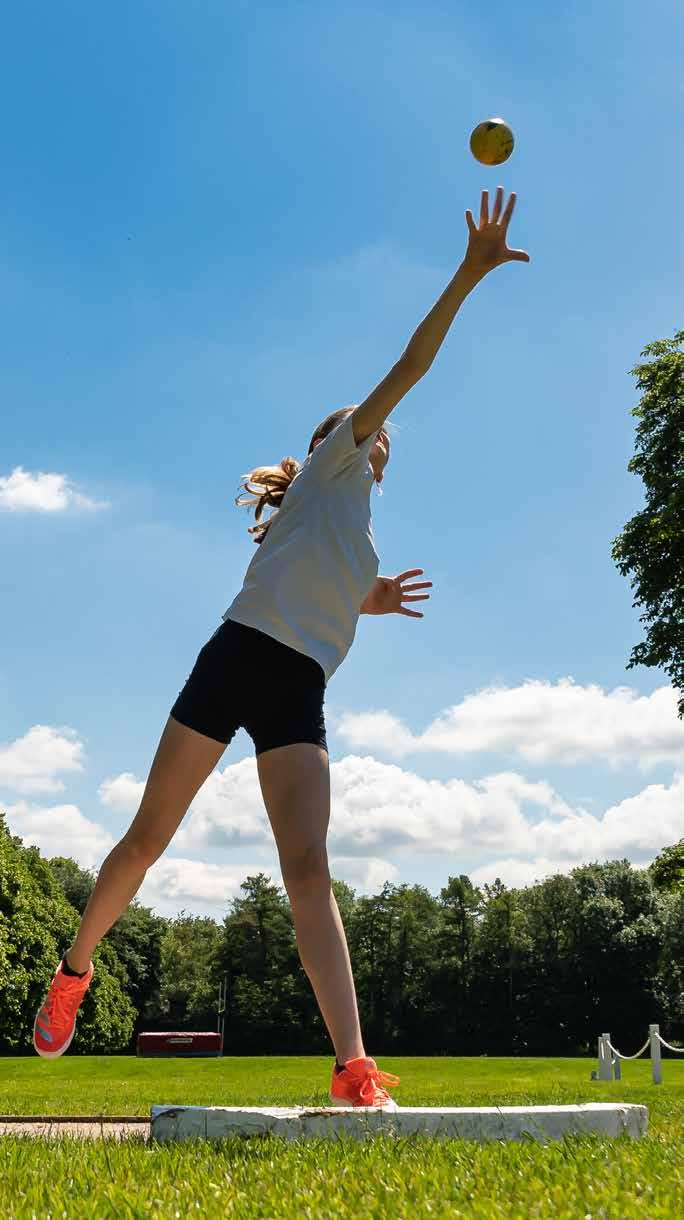






Over the course of this year, pupils taking part in the Performance Athlete Pathway have continued to train and compete in their chosen sports. They have attended external performance camps, and made considerable progress with their strength training and have developed a range of mental skills guided by their mentors. The programme supports 60 performance athletes and 39 aspiring athletes, both groups focusing on strength training in their weekly sessions. As part of the programme, our performance athletes have had the opportunity to hear from a variety of experts throughout the year including Lucy Harris from NETU fitness and Josie Lawrence from Performance in Mind.
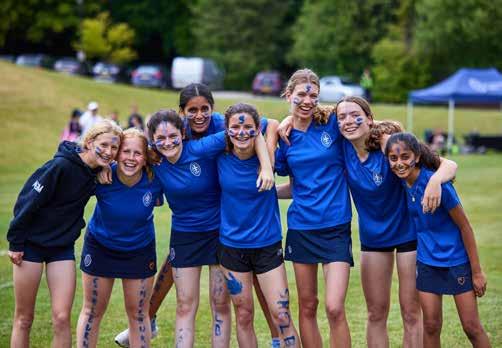
Sports Leaders courses have continued to be popular, with many pupils undertaking Level 2 and Level 3. These courses help pupils to develop their knowledge, confidence and teamwork skills to become effective leaders. All pupils have the chance to plan and lead sessions and get involved in organising larger events for schools within the district. Always proactive, the leaders have volunteered during lessons and fixtures and our Level 3 pupils have also volunteered with Horizon, a local sports club for children and young people with disabilities.
A longstanding feature of the PE programme is House Games. Pupils and staff enjoy the weekly competitions culminating with Sports Day in the Summer Term. Pupils from LIV – LVI competed weekly in both the long-standing traditional sports of Lacrosse, Netball and Tennis but also in less traditional activities such as Ultimate, QR Code Orienteering and Cheerleading. The Houses (and Housemistresses!) continue to be as competitive as ever, with everyone waiting in anticipation for the results during end of term Mark Reading. The final result saw Shelburne House take home the Sports Day trophy as overall winners with Campbell winning the Junior events, Shelburne the Intermediate events and Pitt as Senior winners. The evercoveted Relay Cup was won once again by Pitt.
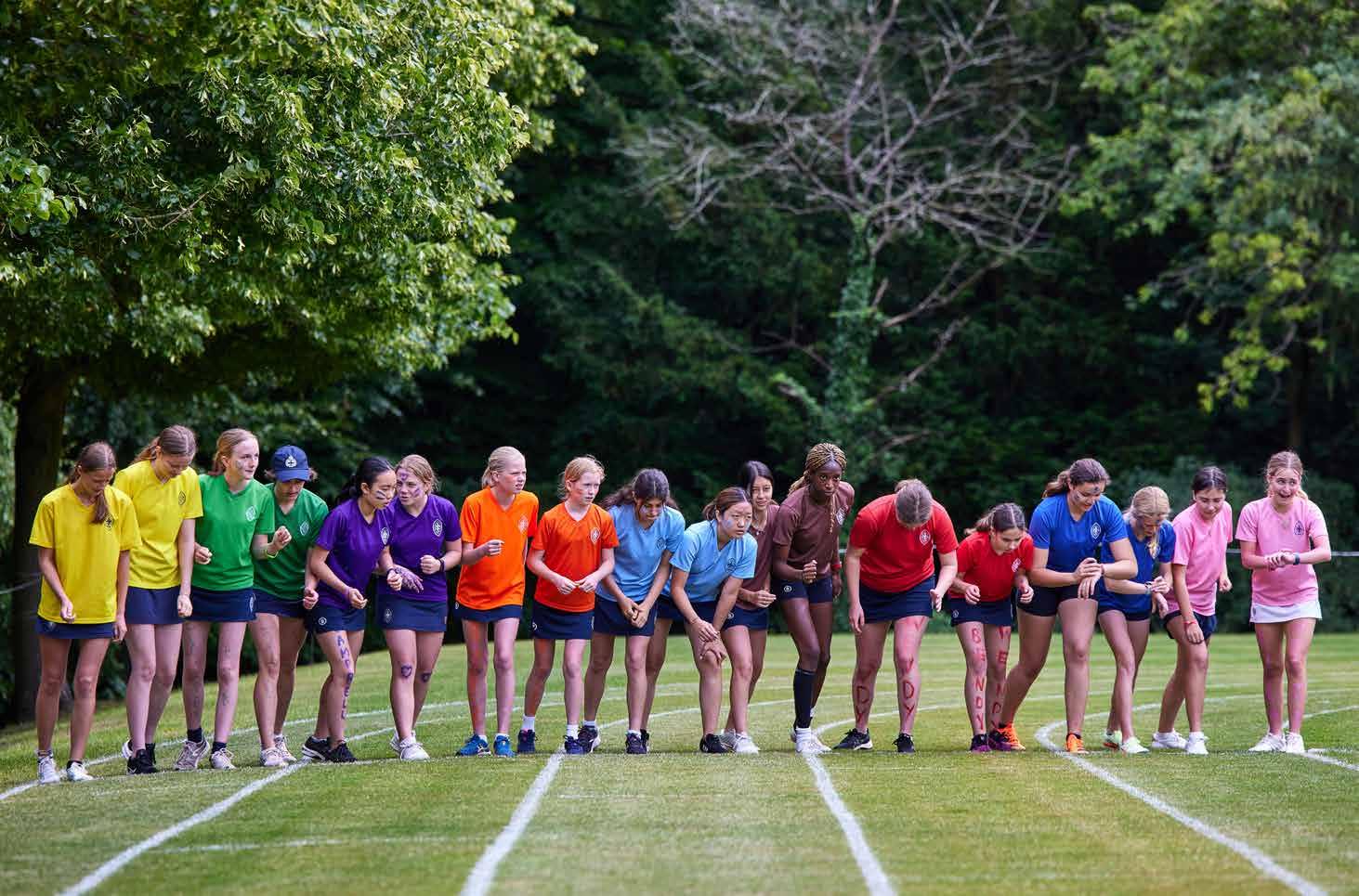
With matches each Saturday afternoon across all age groups, Lacrosse continues to be at the forefront of the PE department’s competitive programme. All our teams saw success during the annual County Tournament with the 1st, U14A, U14B, U13A and U13B teams all being crowned champions and the 2nd, U15A, U12A and U13B teams placing second. All players should be congratulated on successful seasons, developing their technical and tactical skills. There are many pupils from U13 to Seniors who are current members of the England Regional and National Academy Pathway. We congratulate five pupils who represented Wales and Scotland U21A and B teams. Four pupils were also selected to compete in the Senior Lacrosse World Championships - they were amongst the youngest athletes at the competition and we are incredibly proud of their success.
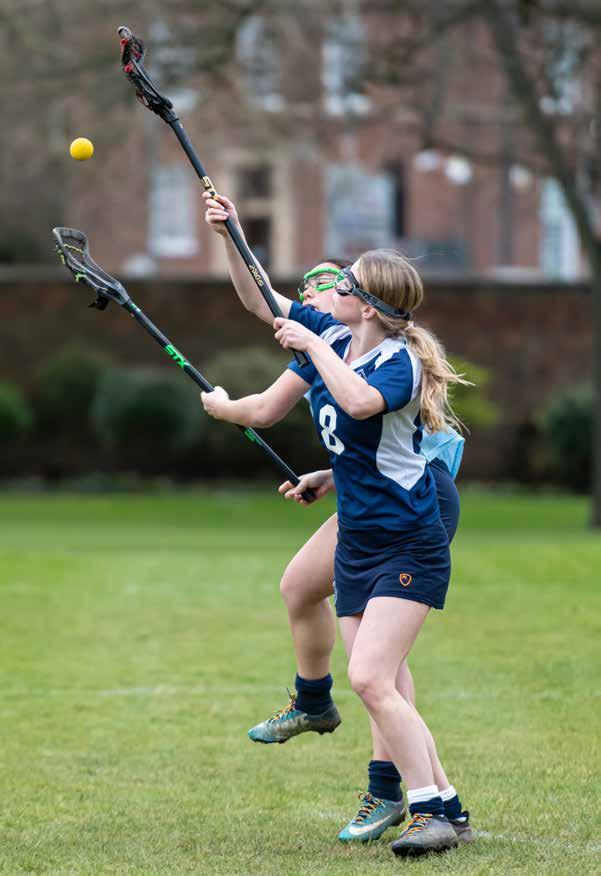
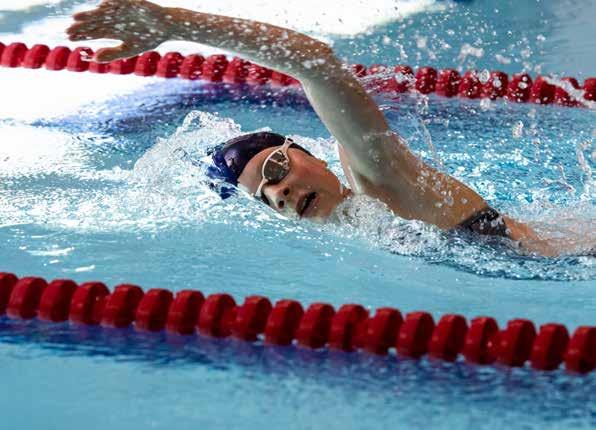
The swimming programme has seen great growth this term with the introduction of Extras, the appointment of new visiting teachers and developing a relationship with Wycombe District Swimming Club (WDSC). Providing free swimming lessons to those pupils who are unable safely to complete our deep-water assessment has proved beneficial, as we strive to ensure that all pupils are both capable and confident in the water. The Wycombe Abbey Swimming League has continued to be a success this year, with 15 schools now competing. We qualified for the final gala in three age categories. We also entered the HMC Bath and Otter Gala. The girls swam incredibly well to place seventh from 60 schools in the medley relay.
Netball continues to thrive at Wycombe Abbey. A real highlight has been the U14 Regional Round of the National Schools competition. Having qualified at the County Tournament, our team represented the School extremely well, just missing out on a place in the knockout stages by 0.1 of a goal. We would also like to congratulate the U16, U15 and U14 teams who all won their District Tournaments. We have increased the quantity of fixtures this year to allow greater opportunities for pupils, and we have enjoyed seeing the girls thrive.
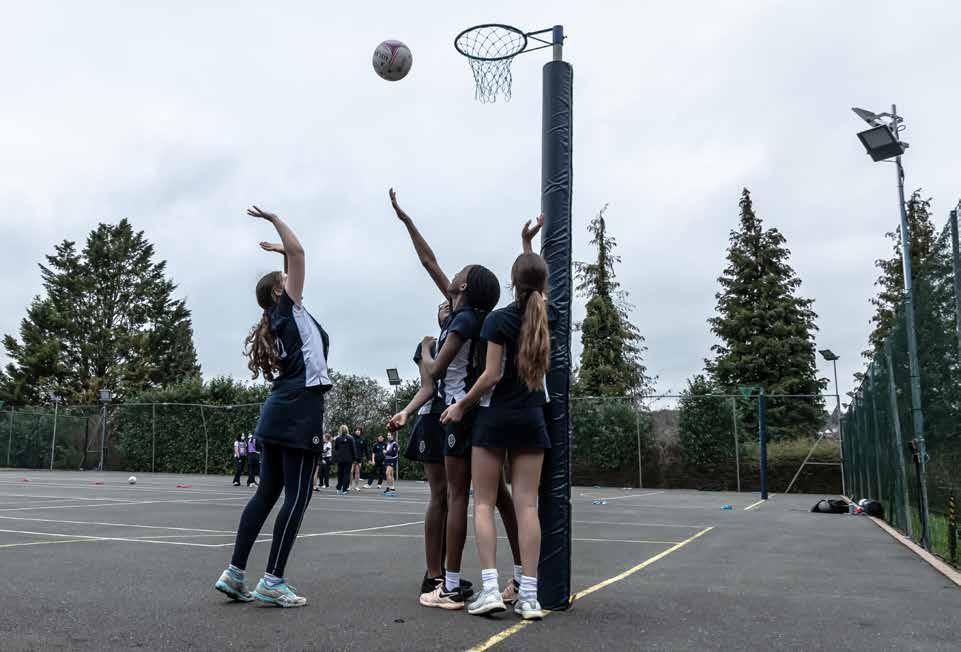
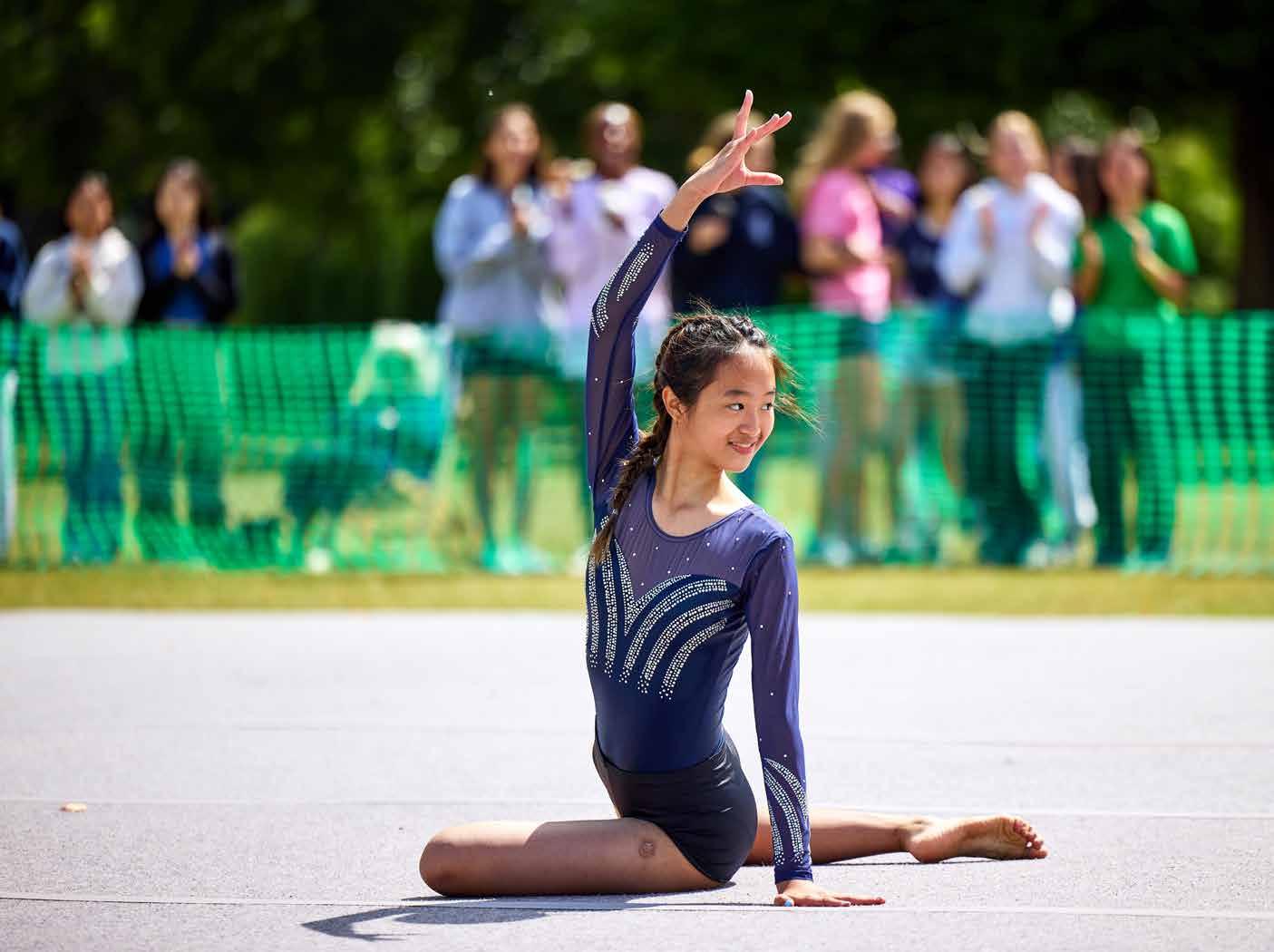
Our gymnasts have been working hard throughout the year to prepare for both competitions and displays. Competing in both the ISGA 2-piece and 5-piece was an opportunity for our pupils to display their training and hard work. All our gymnasts conducted themselves in a highly professional manner, demonstrating confidence and composure throughout both competitions. The year culminated in the annual gymnastics display held on Dove Day. Performing on Midget Pitch in front of cheering crowds was a fabulous way to finish the year off.
The squash programme has continued to grow throughout the season with more beginners attending clubs each week. Pupils fully utilise the courts on-site and can regularly be seen practising outside of club training sessions. The team spirit is high, with pupils from across all age groups interacting with each other. This increase in participation has led to us fielding more teams for weekly fixtures and competitions. This season we entered five teams from U14 to U18 into the National Schools competition, reaching the finals at every age-group. Particular mention should go the U16A and U18A teams who placed third in the country, an outstanding achievement.

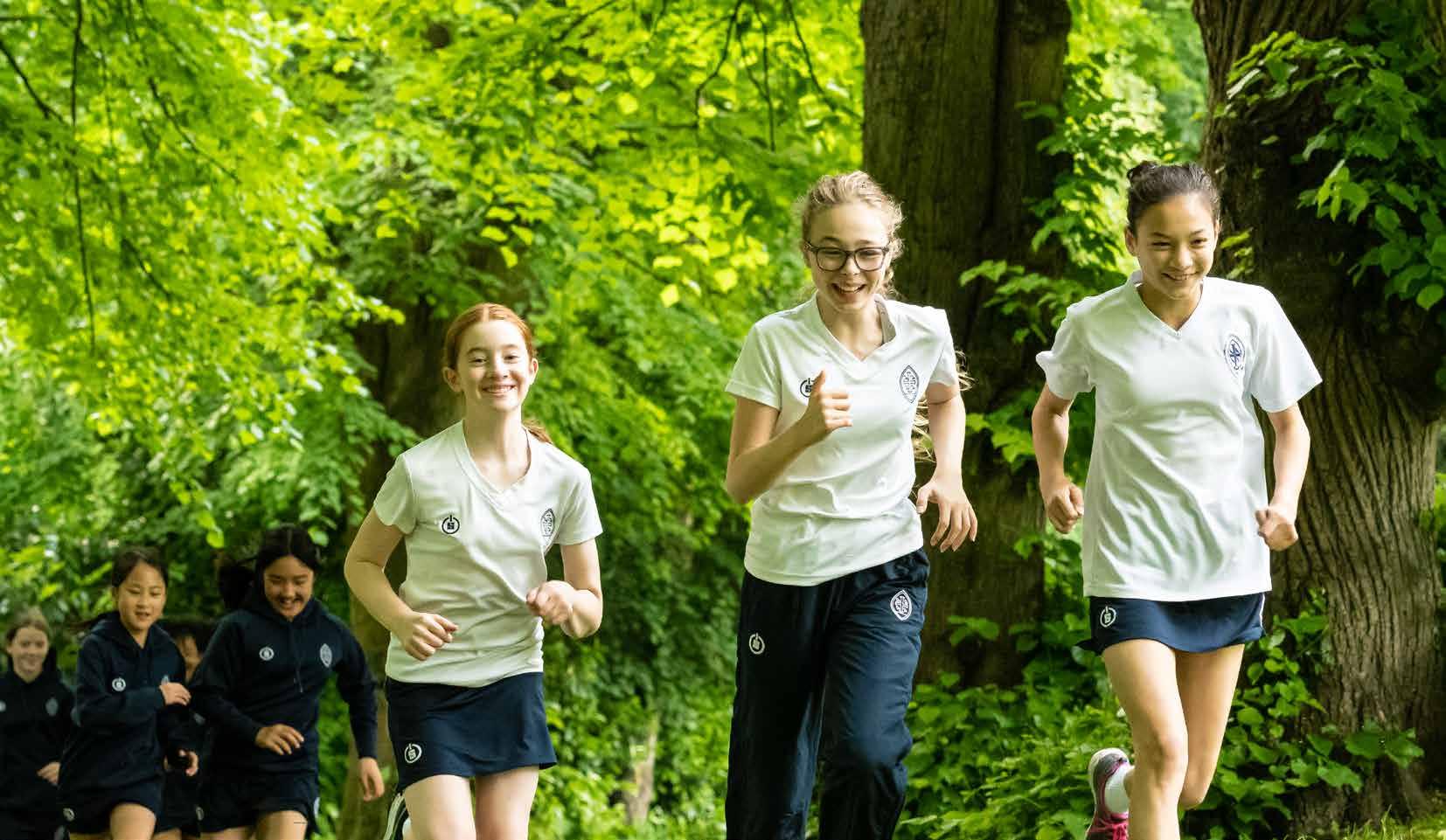
The winter and spring terms saw our Junior and Inter Cross Country Teams qualify for the Regional Finals of the National Cross Country Cup for the first time in recent history. With nearly 1000 competitors at this event competition was fierce and we are extremely proud of all our runners, with both teams placing 6th in the region. Winter athletics training has continued to be popular with our athletes and their hard work paid off during the summer term. Both the Junior and Intermediate teams placed first in the District round of the Track and Field Championships gaining qualification to the Regional finals. Our athletes consistently achieved new personal bests in friendly and regional competitions and many of these became new school records this year.
Competitive Tennis has been played throughout the year. Our Senior pupils competed in the Regional Senior Students Competition with great success and our U13 and U15 LTA County Teams were all undefeated throughout the year. The National Schools Aberdare Cup team won all their knockout area matches and gained a coveted place in the National Finals which took place during the summer Long Leave. Alongside knockout matches, our girls also enjoyed a number of weekday and weekend friendly fixtures. Our mixed double fixture with Eton continues to be a firm favourite among the pupils.
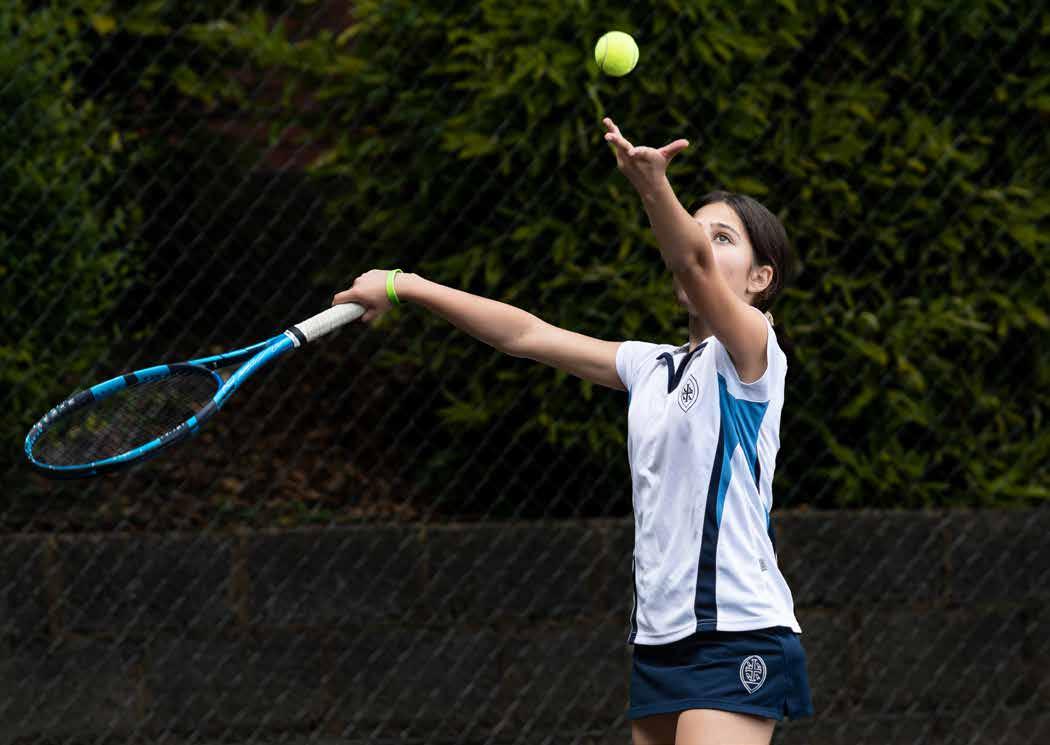

Cricket has had a strong start at Wycombe Abbey. Uptake in the Lower School has been good, with a large number of pupils attending squad training. The cricket nets have proven to be popular, and pupils can often be seen using them in their own time. Results up to this point have been promising and the experienced players have been fantastic at helping beginner players learn the rules and develop. We look forward to building on the fundamental skills learnt this year in future seasons and are excited for the development of this programme.
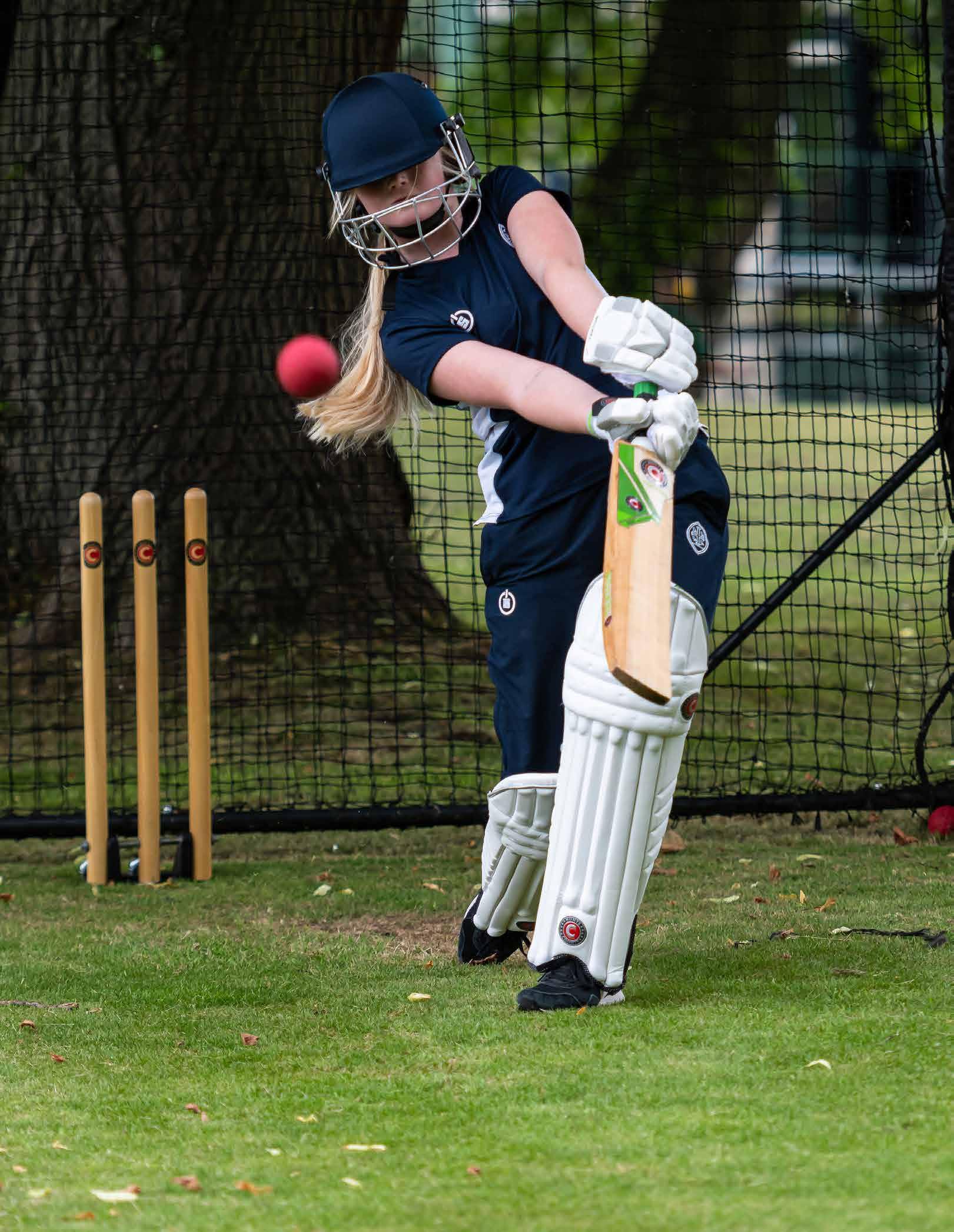

We have been thrilled to host multiple dance shows this year. The UIV House Dance competition got us off to an exciting start, with all girls in UIV helping to choreograph their House dance. Congratulations to Cloister who were announced as winners. The senior dancers then took to the stage for the Spotlights show in January. The show was largely choreographed, costumed and coordinated by our Dance Captains who all worked with precision and professionalism. 125 Live! was an excellent evening that showcased the strong collaboration between Drama, Music and Dance; we are looking forward to developing this further in future years. The junior dancers showcased their performances in the Summer Term with an evening of specially choreographed group pieces and performances of individual exam work. For many girls, this was their first time performing on the LAC stage and we look forward to providing more opportunities in the future.
Both on-site and off-site Sports Extras have resumed this year and continue to remain popular among the girls. Golf, Riding, Polo and Rowing have all seen an increase in the number of participants. We are excited to see how these sports progress and are looking forward to entering school competitions soon. Kickboxing and Karate pupils have continued to refine their skills. Many girls have completed grades this year, including two who have achieved their Black Belt in Kickboxing; an outstanding achievement. Badminton, Trampolining and Fencing lessons and clubs have enabled pupils to further their enjoyment of their sport. Special mention must go to the Fencing team after an outstanding performance at the Public Schools Fencing Championships. The team won the Moor Shield for placing second across all age groups and weapons.
To keep up to date with Sport at Wycombe Abbey, please follow us on Twitter and Instagram @WycombeSport
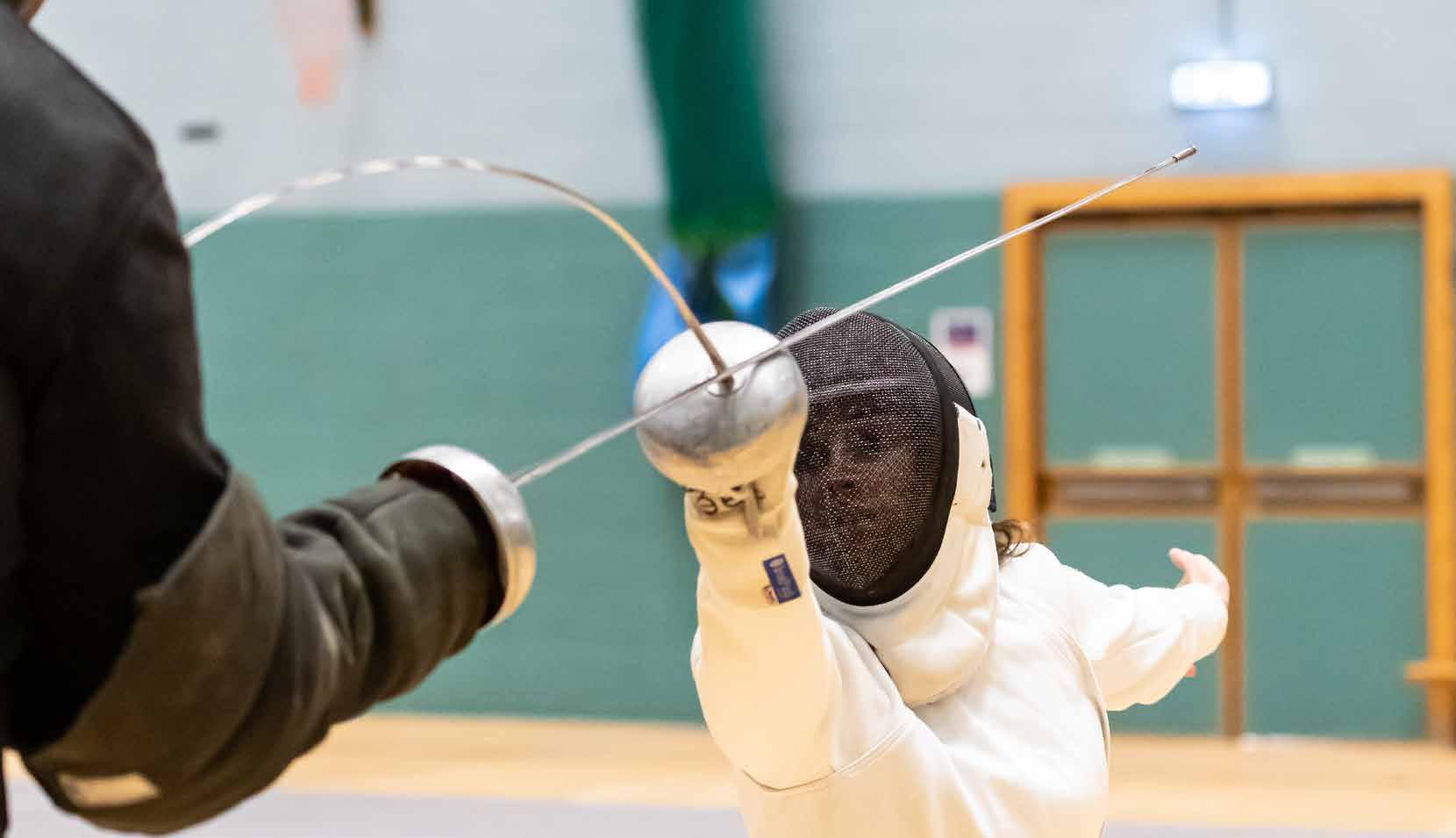
We have had a successful Lacrosse season this year across all age groups with all our teams reaching the last 16 at the National Schools Lacrosse Championships. The U13s progressed to the semi-finals and U14s, U15s, 1st and 2nd team narrowly lost out on a quarter-final place. We were also crowned County Champions at 1st, U14A, U14B, U13A and U13B and placed second in the 2nds, U15A, U15B, U12A and U12B tournaments.
We have many pupils from U13 to Seniors who are current members of the England Regional and National Academy Pathway. They attend regular training weekends throughout the year and progress along the pathway with the ultimate ambition to represent England. Carys (UVI), Ginny (LVI) and Megan (UV) have been a part of the Welsh Dragons squad this season. Congratulations to Ginny who was successful in being selected for the U21B Home Internationals team. Megan (UV) was named a reserve for the U21B team at the age of 16 and Carys represented the U21A team receiving her first Junior Cap. We would also like to congratulate Amelia (UVI), who was selected for the U21A Team, Poppy (UV) and Sophie (UV) who were also selected for the U21B Team for the Home Internationals Tournament.
Outside of the Home Nations there are several pupils who have been named within their National Squads to attend the Senior World Championships 2022. Italy Lacrosse have named a squad of 18 with two travelling reserves. Francesca (UVI) has been named in the final 18 and Isabella (LV), and Caterina (LV) are reserves. Sisters, Elizabeth (UVI) and Victoria (LVI), have been selected for the final 18 for Sweden. Although teammates at School,
Francesca will come up against the sisters in the group games of the Championships. To be selected to represent their country at a senior level when still at School is an outstanding achievement. They will be among some of the youngest players to take to the fields, and will face opponents, some twice their age, with many more years of international experience.
Miss Ruby Smith, Assistant Director of Sport and Head of Lacrosse, and Senior Tilly Foster (Class of 2016, Cloister, C302) were selected as part of the Senior England World Cup training squad and played in the Senior A team at the Home Internationals in April. Congratulations to Ruby on her selection to represent England in her third Senior World Championships which took place in the summer. We are incredibly lucky to have her teaching at Wycombe Abbey, a true inspiration for all the girls. Tilly was also named as a travelling reserve for Team England and was with the squad throughout the tournament.
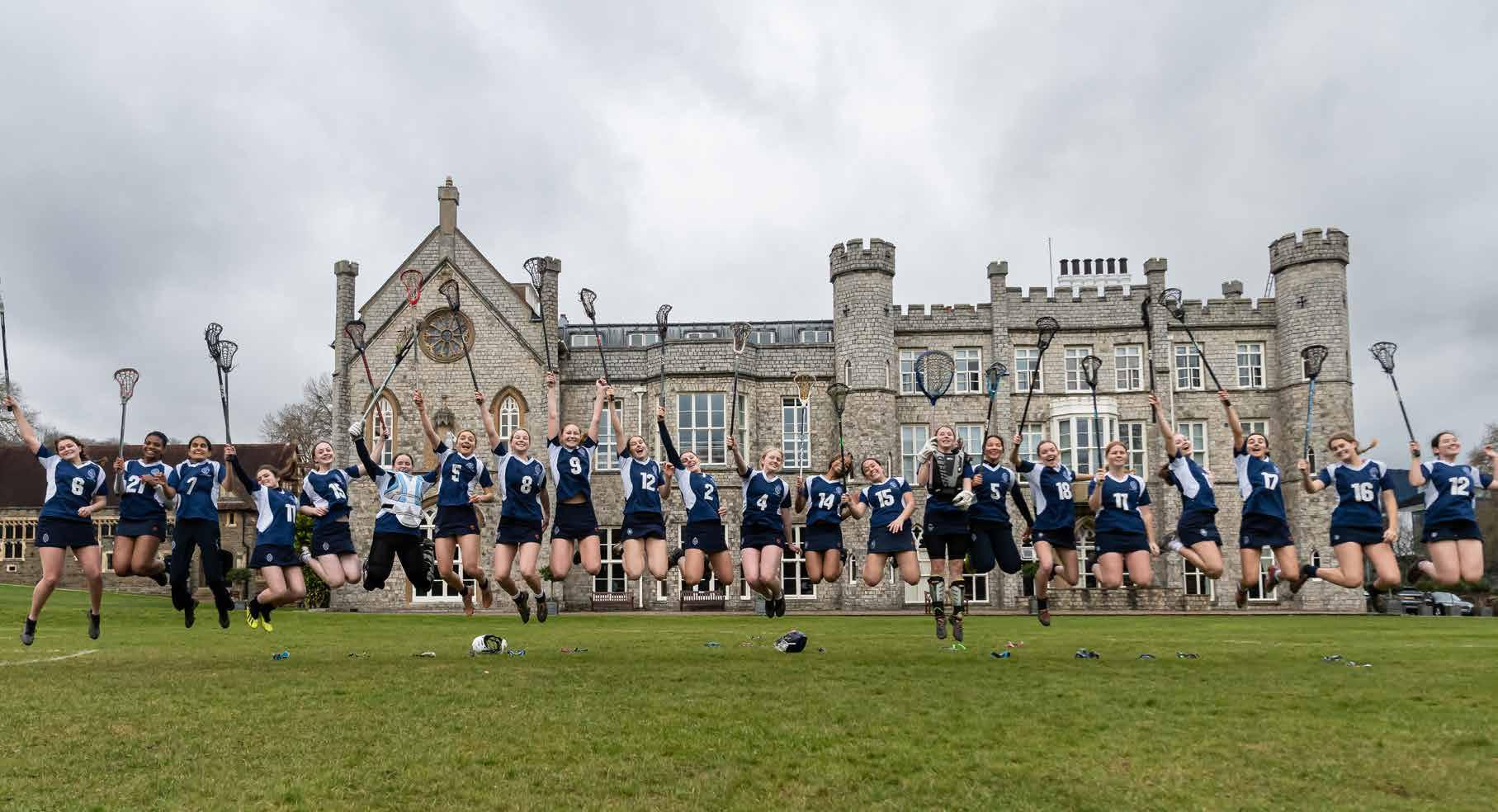 Mrs Fiona Gee Assistant Director of Sport
Mrs Fiona Gee Assistant Director of Sport

After a long-awaited sports trip due to the pandemic, we were very excited to take 34 pupils from LIV-LV to Vale de Lobo in Portugal for the Tennis Training Camp over the Easter break. This is the third time we have travelled and stayed in the 5* Ria Park hotel for the five-day trip and we were the only school at the venue that week, so the girls had some excellent coaching sessions in small groups from 5 Star Tennis Holidays.
It was great to see all of our players making excellent progress in preparation for their Summer Term fixtures and tournaments. Alongside lots of Tennis and match play, we took a trip to Vilamoura for some sightseeing and shopping, and a trip to the beach which was a short walk away from the tennis complex. The girls thoroughly enjoyed a delicious dessert of choice off the menu in the famous ‘Maria’s’ restaurant on the beach; a highlight of their week! We are very much looking forward to going back to Portugal next Easter for more Tennis with 5 Star Tennis Holidays!
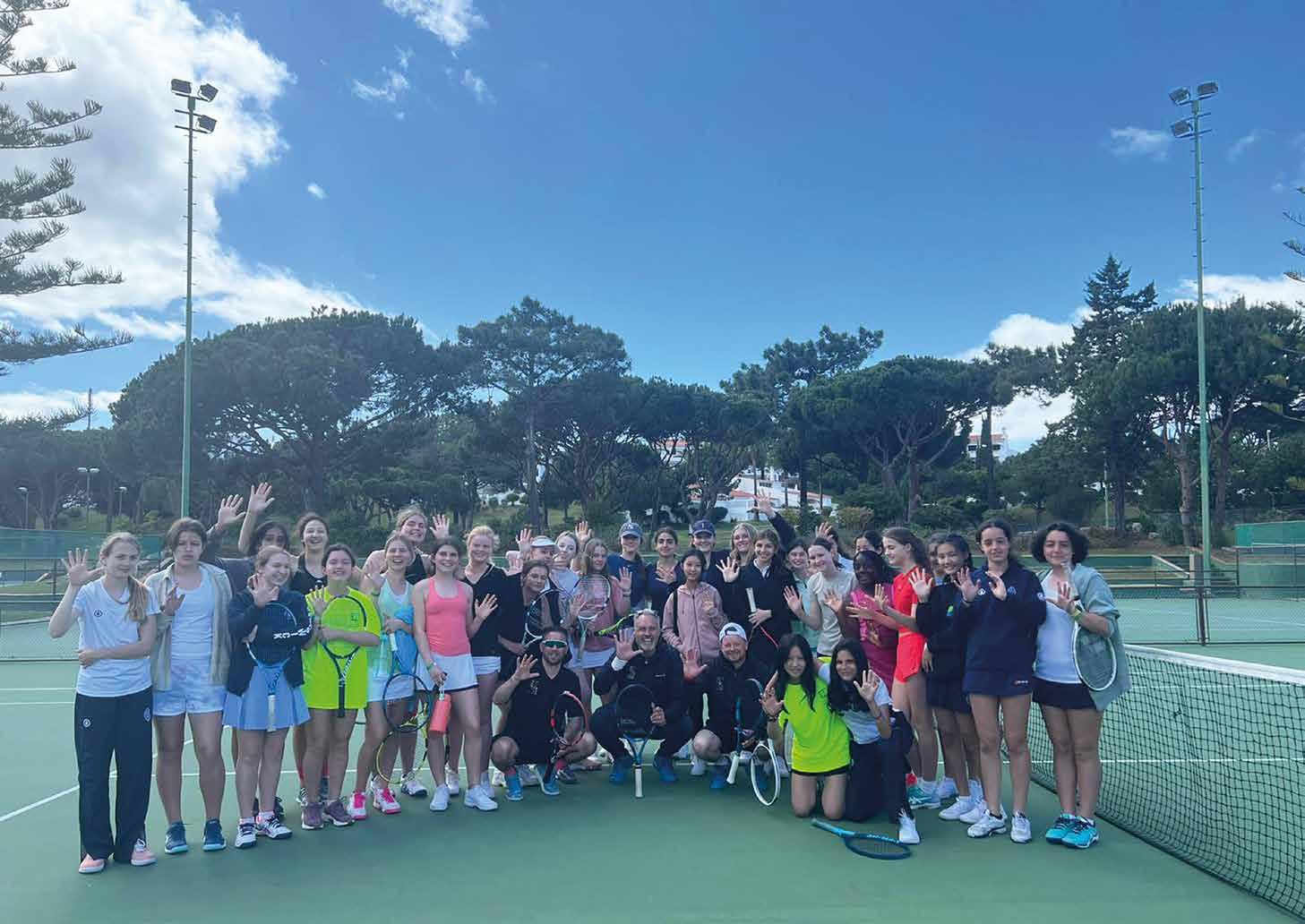
It was great to see our players making excellent progress in preparation for their Summer Term fixtures and tournaments.
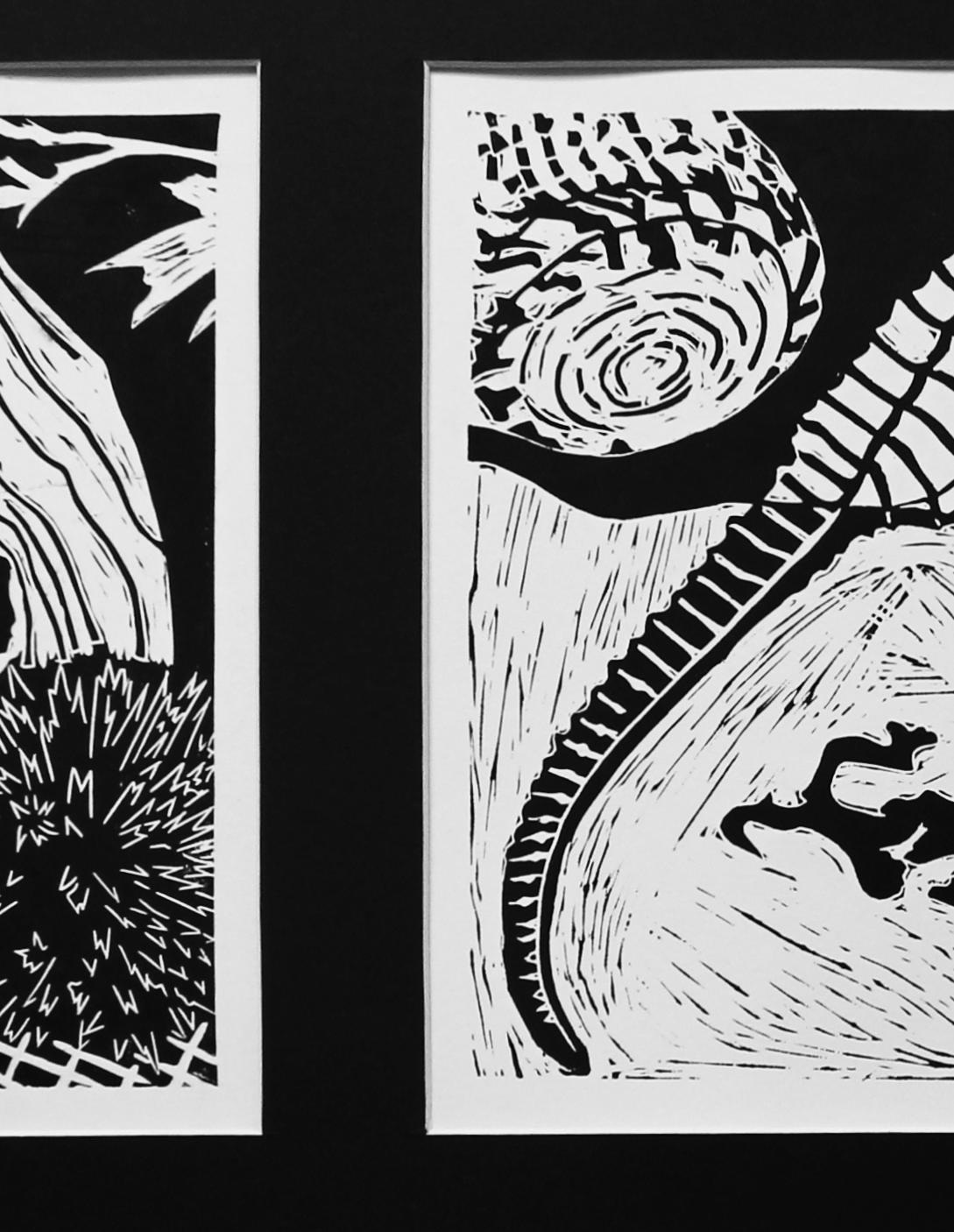

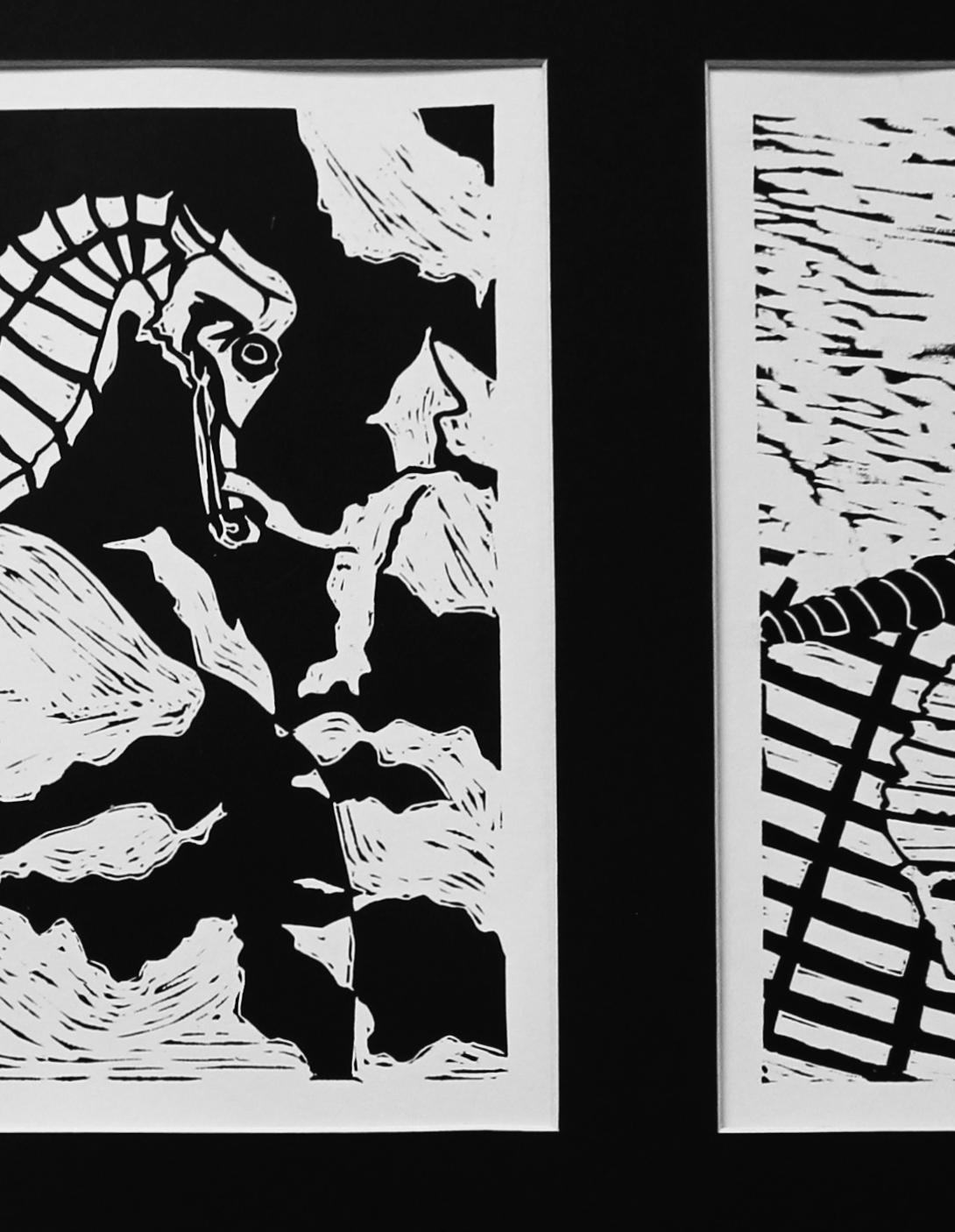
eptember was a chance to gradually re-start our co-curricular programme after a period limited to online, single year group and on-site activities.
S
Pupils have enjoyed the enhanced sense of freedom and adventure associated with school trips and off-site Extras, remaining relatively local in the Autumn Term and finishing off the academic year with the departure of the Lacrosse Tour to the USA, a big milestone in our Covid recovery process. Academic day trips are prominent in the calendar once again and residential highlights have been a tennis camp to Portugal at Easter, Duke of Edinburgh expeditions around the UK, a geography field trip to Somerset and the Drama Department took DNA , a LVI play, to the Edinburgh Fringe Festival in August.
The Societies’ Fair on the first weekend of term was a chance for pupils to see what Clubs and Societies were on offer and decide whether to get involved more deeply in something they already love or perhaps try something new from the 50 advertised. It is always great to hear from pupils during the year who are keen to establish new groups and this year we have welcomed an Investment Club, Neuroscience Society, Tennis Society, Golf Society and Junior RockSoc which demonstrates the variety of interests held by the pupils.
Following a survey in September, we reevaluated our Weekend Activity provision to ensure we organised things that pupils look forward to getting involved in during their spare time. There was a desire to have more high adrenalin activities whilst keeping the relaxed and slower-paced
options so everyone can do something that suits them. New on-site events such as the woodland camp out, mobile farm visit and inflatable assault courses were popular with all ages and created a great community atmosphere with lots of staff and their families joining in too. Cookery
Off-site trips for theatre and exhibition outings, Go Ape high ropes, the trampoline park and the outdoor waterpark have created great excitement!
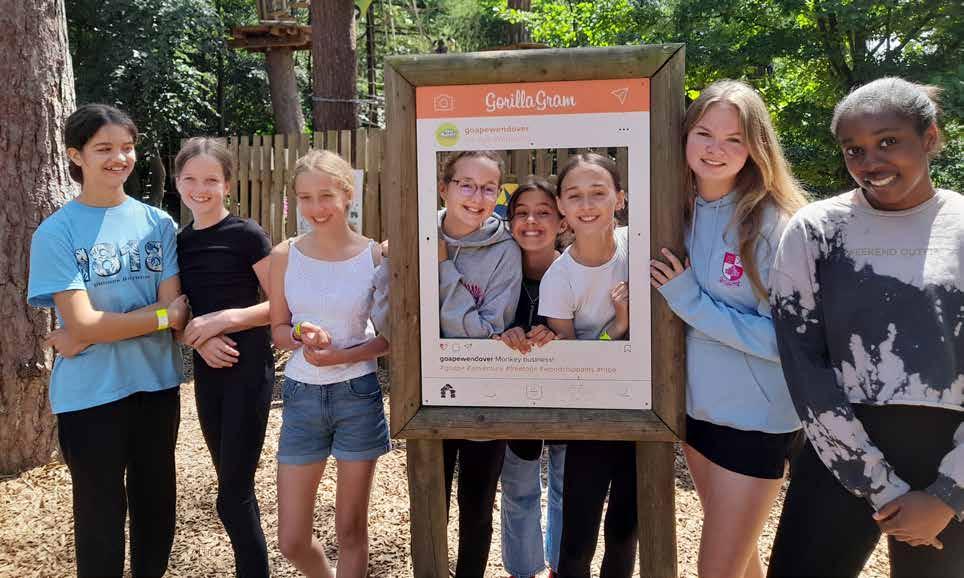
wine tasting, woodland laser tag and craft sessions have continued to be popular too.
We recognise that Socials with other schools are an important part of the Wycombe Abbey experience. As schools settled into routines once again, we have enjoyed Caledonian Society Sixth Form black tie dinner and dancing evenings with Eton College, RockSoc concerts with Harrow School and mocktail, pizza making and bowling events with RGS High Wycombe for the younger years. This programme will continue to develop in the future alongside more formal conferences and workshops with partner schools in the upper school.
is always over-subscribed and Running Club is a regular Sunday morning session for those keen to exercise as a group in our beautiful grounds. Off-site trips for theatre and exhibition outings, Go Ape high ropes, the trampoline park and the outdoor waterpark have created great excitement! The return of Thorpe Park,
Co-curricular encompasses everything outside the classroom so we hope that the activities on offer shape your Wycombe Abbey journey and provide lasting memories with friends, both in the boarding house and the wider school.
Miss Hannah Lowther Head of Co-curricular Activities and Trips
To keep up to date with our co-curricular programme, follow us on Instagram @WycombeAbbey and @WycombeBoarding for our weekend activities.This year has seen the return of Model United Nations (MUN) to Wycombe Abbey in (almost) full swing! It has been wonderful to have a full year of MUN in person once again. The year has been jam packed with events ranging from conferences in Bath, Haileybury and RGS Guildford as well as our very own Wycombe Abbey Enrichment Conference to end our MUN year in style.
The Conference was full of high-level debating alongside great socialising and dancing. We thoroughly look forward to the long-awaited WASAMUN conference returning next year. All of the off-site MUN conferences this year were fully enjoyed, and for many, were three-days. These conferences have truly provided everyone with enriching experiences to take forward in MUN and also in daily life. It is safe to say, many new memories as well as many new friends have been made.
Throughout the year, there has been an abundance of fruitful debate across all events as well as Wednesday weekly training sessions. We have all grown from strength to strength in MUN, developing our debating skills, writing resolutions, and for many of our MUN members, they have been learning these MUN skills for the first time. MUN never fails to entertain and to teach everyone things they didn’t know before; whether it’s developing skills you might not have a chance to work on in the classroom, or learning new information about global events you did not know as much as you might like to about, or simply meeting new people, there is always something new to immerse yourself in and learn. With a new MUN Secretariat Team in place, we cannot wait to see what this next year holds for Wycombe Abbey MUN, with many exciting opportunities and events coming.
Anna LVI, Deputy Secretary General
The conference opened welcoming everyone and giving brief speeches before debating went into full swing. We first began with policy statements and lobbying, in which it was clear that everyone was very well researched and truly passionate about MUN, which was so exciting to see. The first debate was the issue of animal testing, with some countries suggesting extreme methods and sanctions to be put in place. The first resolution proposed by China was sadly rejected as some delegates did not think it did enough to ban animal testing. Next, we moved onto the issue of climate refugees; there was more disagreement on this issue with some delegates refusing to house refugees causing for more lively debate. Yet, we still managed to pass an effective resolution proposed by the UAE, for which all delegates unanimously voted. The next day was equally as interesting with a debate on the issue of Genetically Modified Organisms (GMOs), which caused a divide in the room with some countries being strongly reliant on them for their economic growth, and others wanting to eliminate the use of them completely. This led to extreme reactions, with some delegates threatening to stop exporting crops to certain Member States who did not support the use of GMOs. Needless to say, this was a riveting session, and luckily, we reached an agreement on the resolution proposed by Russia which respected all viewpoints and asked for greater
research to go into them. Overall, the conference was incredibly enjoyable and a great chance to meet and get to know so many new people. I really benefitted from hearing all delegates speak and their unique perspectives on all issues.
Argia LVI, MUN Secretary GeneralI n March, the Lower Sixth (LVI) had the opportunity to take part in the annual Management Conference, hosted by Wycombe Abbey, in partnership with the Royal Grammar School, High Wycombe.
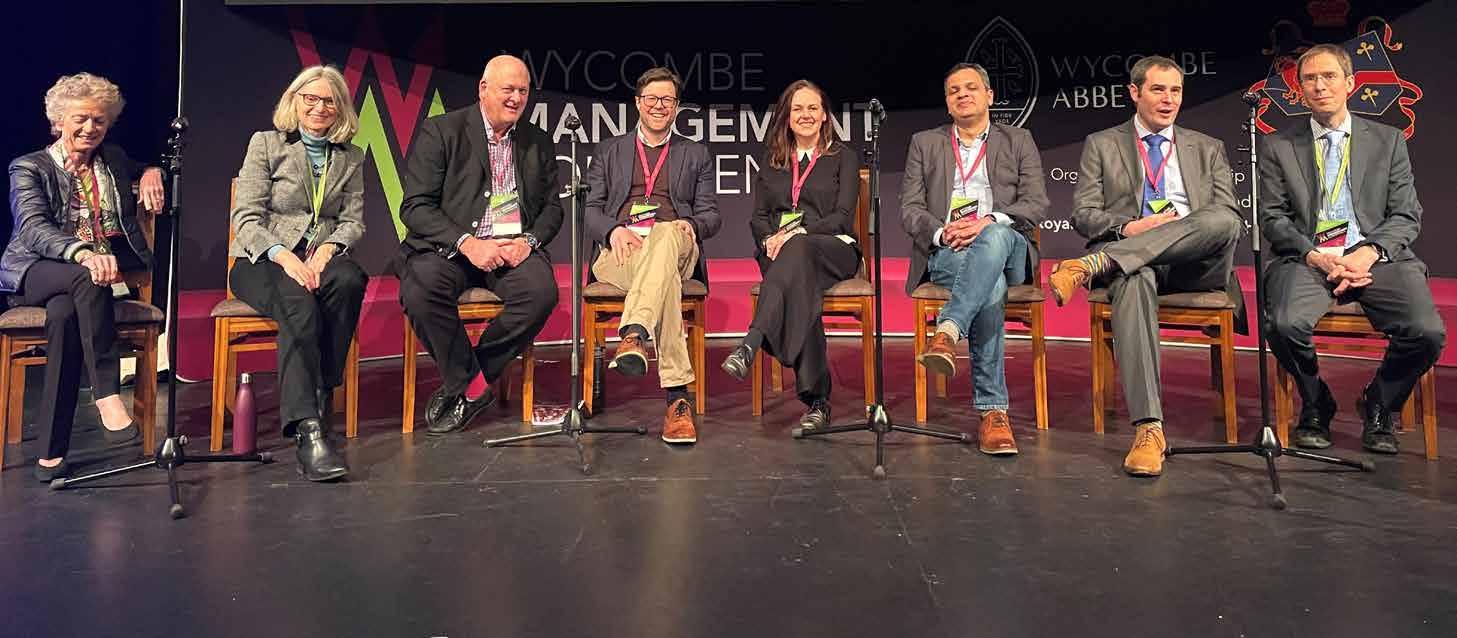
The Conference, which is a highlight of the LVI academic year, had been held remotely in 2021 due to the pandemic, so everyone was highly anticipating the in-person experience as things were slowly shifting back to normal. The Conference is an opportunity for delegates to get a feel of the world of entrepreneurship through a two-day simulation, in which they are put into mixed teams and ‘run’ their own business (for us, coffee shops) while tackling unforeseen challenges along the way. The aim was to generate the most profit for our coffee shops whilst maintaining a high level of customer service and appreciation for our workers. This sounded like a relatively straightforward aim to me at first, but little did I know that just like in a competitive market, unintended setbacks must always be expected!
We listened to a number of presentations from influential CEOs and entrepreneurs. We heard from Lord Karan Bilimoria on his inspiring career and the establishment of Cobra Beer; I particularly valued his advice on seizing every opportunity that comes our way. Peter Higgins followed this with practical advice on becoming an entrepreneur, sharing his experience and impressive career in the field to demonstrate the ups and downs of running a business. To end on a high note, Tamsin Todd spoke about the ‘catapults’ while setting up firms, and encouraged us to take risks, even if we may not initially succeed. The Mentors must also be thanked for their compelling answers in the panel discussion and advice during the simulation. They have, most critically, emphasised the importance of having a mentor in real life.
I was really lucky in that I had an enthusiastic and committed team to work with, which proved Lord Bilimoria’s words true: “if you want to get there fast, go alone, but if you want to get far, go together.” Our efficient team dynamic also meant that making decisions under pressure, including whether to raise our coffee prices or up the wages of our workers, was both thrilling and highly rewarding. Most importantly, I was able to develop the invaluable skill of structuring my thoughts and expressing ideas in a coherent manner, especially when racing against the clock.
As a delegate representing Wycombe Abbey, it was an honour for me to deliver the closing speech at the Management Conference. It was through reflection on my experiences that I realised how crucial it is that we have these opportunities, because these simulations resemble the mechanism of a competitive market in the real world. With so many of us having ambitions of setting up our own businesses, I understood the importance of collaboration in unfamiliar situations – a skill that makes us slightly more well-equipped to deal with these situations in the future!
The future is in our hands, and it is this generation’s responsibility to carry the legacy of those we have heard from going forwards. Even for those who are not aspiring CEOs, the Management Conference taught valuable life lessons that have better prepared us for our careers (which are now not so far away!), no matter which field they lie in. I thank all the members of staff from Wycombe Abbey and RGS High Wycombe for making this event possible through their invaluable efforts. Hopefully, when we are the CEOs of big multinationals, we will be able to think back to this moment and realise how far we have come.
KamillaThe future is in our hands, and it is this generation’s responsibility to carry the legacy of those we have heard from going forwards.
On a cold November day Lower Sixth made their way to the Archer Recital Hall for the Communications Conference where we were joined by Emma Nelson and Chris Maughan, two successful journalists from Mediafirst. What followed was an enriching and eventful day learning about the power of communications and public relations in the world of media and news.
We started the day by learning various tips and tricks for how to deal with a media or PR crisis, such as making sure to show compassion when in situations of catastrophe as well as engage with your audience. One of the many useful acronyms we learnt from Emma and Chris was CARE – Compassion, Action, Reassurance and Examples. The acronyms helped provide us with clear and easy to remember guidelines when found in a situation where you may need to explain a crisis or communicate with the media. We watched examples of TV interviews and analysed the efficacy of the methods, deepening our learning and understanding of the skills being taught.
After this informative talk we took those skills demonstrated to us and applied them in a crisis simulation. Fourteen teams took on the role of a company’s communications department for the invented ice cream company ‘Fabulous Cow’. The realistic

online simulation provided by Conducttr required us to handle a series of ‘disasters’ by communicating with the press, constructing and responding to social media posts and replying to internal company emails. Perhaps the most nerve-wracking but valuable element of the conference was taking part in TV interviews whilst being asked tough questions by the journalists and being filmed by professional camera operators. It was a great opportunity to put everything we’d learned into practice and to see if we could remain calm and composed in a high-pressure situation.
After spending the day learning and practising, we gathered for a final awards ceremony, during which our Headmistress, Mrs Duncan presented awards to the best teams and to the best interviewees. The day was eye-opening and invaluable, the professional training provided us with a full toolbox of skills to use, if and when, we come in contact with the media as well as enhancing our previous skills to work on the go and to be quick problem solvers. We would like to thank Mediafirst as well as Dr Goddard and Ms Bowen for putting on such an amazing day full of fun and learning.
KimberleyLVI
At the end of March, a group of Lower Sixth pupils had the amazing opportunity to visit McLaren to give them inspiration for the green powered car they are making for their Industrial Cadets Award. Read below some of their thoughts about the day.

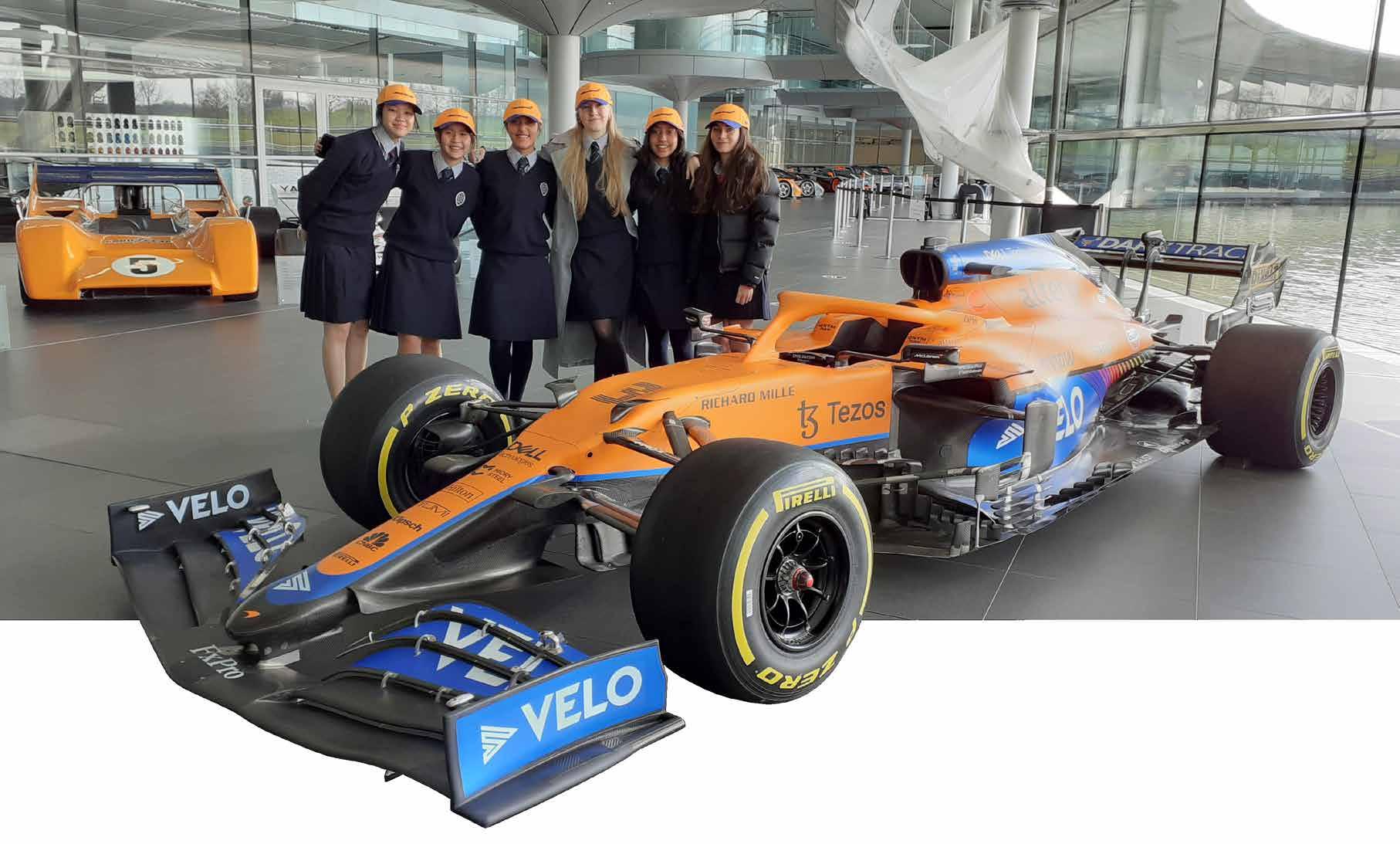
We particularly enjoyed seeing the factory as it was fascinating to see the different stages in the cars’ manufacture. In addition, we had the chance to talk to many staff members about their experiences. Many employees did not have an engineering degree and it was really interesting to hear about the different career routes one can take to work at McLaren. Overall, we had an amazing day and definitely got a lot of inspiration and advice whilst we were there.”
Hana
Seeing many of the old Formula One cars was incredible and we learnt a lot of interesting stories behind each one from McLaren’s first race car to the one Daniel Riccardo drove last year. The building itself was also incredible and many times (especially when we got to go through secret doors disguised as walls) it felt like a James Bond Movie.”
McLaren has illustrated the power of perseverance. Even when things don’t go too well, they re-evaluate. They are constantly changing and developing in order to face challenges and do not give up. Especially during difficult times such as the pandemic, McLaren was able to re-evaluate and turn its production line into a line that produced ventilators for Covid NHS patients. Engineers combined their knowledge and adapted to the situation. It was truly inspiring”
Zara
Tycoon is a unique national enterprise competition for pupils aged six to 18 years. Every participating team writes a business plan, is lent money, starts a business and trades. Teams then compete with other pupils through a kickstarter style platform, in a safe and controlled environment. The Peter Jones Foundation provides goodwill start-up capital, so only when the companies break even, do they repay their loan.
The Re-Soul team have given life to old shoes by painting bespoke designs onto the product; making both a sustainable creation as well as a fashion statement.
At the beginning of September, our team, was lucky enough to attend the final of the Tycoon Enterprise Competition at Hampton Court Palace.
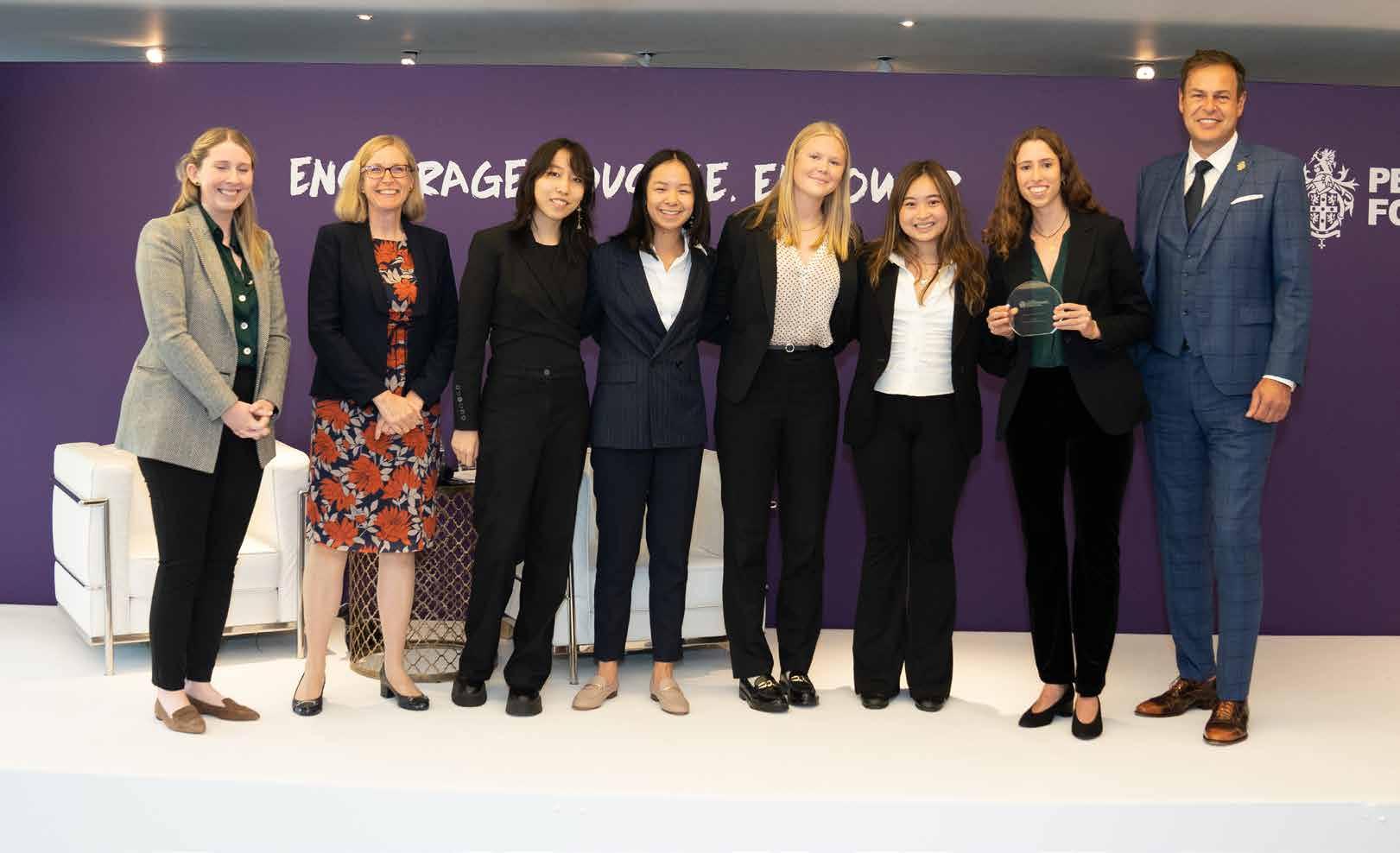
The event began with pitches in the Garden Room, detailing products and services as well as successes. Our pitch was delivered by Phoebe, our Managing Director, whilst the rest of the team held posters depicting our products.
We definitely felt nervous before presenting to Peter Jones and the other participants, but the eloquence of the other teams really encouraged us to be more confident. After our pitch, Peter Jones and a member of their partnering company Sage, asked us about our products and how we collaborated throughout the competition. We never imagined we would win our category when starting up our business in September 2020, so we were pleasantly surprised when the results were announced.
We definitely felt nervous before presenting to Peter Jones and the other participants, but the eloquence of the other teams really encouraged us to be more confident.
We are so grateful to the Peter Jones Foundation for providing this incredible experience. We would highly recommend this competition to all girls in Lower Sixth.
Elizabeth, Phoebe, Joey, Kathleen and Nicole Re-Soul, UVI

I
n October, the Wycombe Abbey Greenpower team set off for the Greenpower International Finals at Goodwood Motor Circuit to finish what has been a tumultuous season. We qualified for races in both age categories (over and under 16s) and our two homemade battery-powered cars, ‘Phoenix’ and ‘Sprocket Rocket’, were ready to go. The team has a range of experience, from first-time to experienced drivers, but we all share the same enthusiasm for motorsports and engineering.
On arrival, we were impressed by the competition and doubted our chances of achieving our first podium finish. Our practice laps were not without setbacks; a punctured tyre and an ominous rattling sound plagued ‘Phoenix’, but through teamwork we were able to get the cars to the starting grid. The first race was a gruelling endurance battle where many cars were forced to retire due to mechanical failure; however, both our cars finished strong as a product of reliable engineering and excellent driving.
The afternoon heralded four sprint races, where our junior drivers had great performances, dodging other cars and evading collisions. There was great spirit within the team, which was evident from our cheering in the stands, and we all watched the leader board avidly as the day went on. As the day grew to a close, we sensed that our chances of a win were increasing, driven by the knowledge that ‘Sprocket Rocket’ had set the fastest lap in the over 16s race. Finally, the awards were announced, and we were ecstatic to find that we had placed first in the over 16s category!
Our collaboration as a team on both the track and in the workshop, together with our passion, helped us achieve our first trophy that day.
Ines
Greenpower Education Trust inspires young people aged 9-25 to excel in Science, Technology, Engineering and Mathematics (STEM), through a unique challenge – to design, build, and race an electric car.
Some of our Sixth Form pupils also took up the opportunity to attend a networking event at TSB, where they gained an insight into finance and were able to network with employees.


T
he very first day of the Autumn Term brought the UV Careers Morning, now a permanent fixture in the school calendar. Girls completed their Morrisby Profile online and took part in a workshop exploring communication and listening skills, the power of personal networking (including how to present oneself and behave online) and how to handle being in meetings, at interviews and in group situations.
Feedback from the girls was extremely positive and it was an excellent way to support the development of essential soft skills. Each UV pupil had the opportunity to follow up their Morrisby Profile report later in the school year with a one-toone meeting with an independent careers adviser.
Given recent disruption due to the pandemic, our annual Careers Seminar took place in March as a virtual event this year. A long-standing Wycombe Abbey tradition, this was a great success featuring speakers from a wide range of industries, including an entrepreneur, A&E doctor, fashion designer, and science writer among others. In addition, Career Spotlight events take place throughout the year, responding to the interests of our pupils. We have enjoyed hearing speakers in a variety of careers with talks on working in the charity sector, being an actor, working in financial services and software engineering. We have also welcomed pupils from local schools to some of these events and aim to develop these links further.
Some of our Sixth Form pupils also took up the opportunity to attend a networking event at TSB, where they gained an insight into finance and were able to network with employees. Developing networking has very much been a focus this year; our Seniors Connect platform was launched to LVI pupils for the first time this year, enabling them to search for a mentor and to ask advice regarding both higher education and career pathways.
The Department has again supported girls to find work experience placements and thanks to the efforts of our new Careers Administrator who joined in September, we managed to secure 21 regular work experience placements in the local community for LVI pupils interested in Medicine as a future career. Work experience is gradually recovering from the negative impact of Covid and we are excited that our bespoke programme at Credit Suisse recommenced this Summer. Whilst we have made the most of online talks and virtual work experience opportunities, we are certainly enjoying the return to face-to-face communication.
Finally, our Careers Workshop took place in June during the LVI Future Ready Week. Pupils chose two workshops from the following options:
• Shifting Perceptions: What is the meaning of success?
• Workplace Culture: Diversity & vulnerability in the office.
• The Promotion of Female Power: how gender is changing in the workplace
• A New Way to Work: The rise of freelancing and flexible hours
• ‘But I Can’t Do That!’ How to discover and utilise your transferable skills
• A Change of Heart? Switching careers (often abroad) in your mid-twenties
This is an exciting new addition to the calendar which is sure to become a regular feature.
Mrs Alison Kiln Head of CareersIn May, most of the LV set off for their assessed Bronze Duke of Edinburgh expedition. Coaches headed to various starting points scattered around the Chilterns, with all groups heading for the campsite near Frieth. The sun stayed shining for most of the day and some of the groups enjoyed walking through several filming locations such as Stonor Park (used in the James Bond film The Living Daylights ) and Turville ( Killing Eve, The Vicar of Dibley and Chitty Chitty Bang Bang ). The groups were in good spirits when they arrived at the campsite to set up their tents and cook an assortment of carbs on their cooking stoves. After a chilly night camping, the groups headed north through West Wycombe towards Saunderton as their finish point. The pupils were delighted to reach the finish line (some shedding tears of relief!) – congratulations to all who completed their Bronze Award!
With Covid restrictions finally lifted, I, along with other girls in my year group, were lucky enough to travel to the Lake District to complete our Gold practice expedition. We took the coach on a five-hour journey until we reached the hostel we were staying at. Despite a disrupted night’s sleep due to the fire alarm which went off twice in the early hours, we woke up the next day raring to go and greeted by sunshine.
We were split into five groups of five to seven people, two groups heading off to one camp site and the other three to the other one. Before heading off we had planned our routes, factoring in various locations so we could make the most of our trip. One of the groups challenged themselves by climbing
Catbell Mountain, one of the steepest mountains in the area. This was a huge achievement for them. When my group started on day one, straight away we reached an extremely steep stretch and practically had to rock climb up the rock face, although this was difficult, we were rewarded by the extremely beautiful view. It overlooked the central lake, Derwent Water. In my opinion the views and landscape was the most enjoyable part of the trip, along with enjoying a break away from school and spending quality time with the girls in my group.
Throughout the walk, Miss Clarke had the pleasure of watching us carry out our group project which in our case was recreating movie scenes. These included scenes from The Sound of Music , The Hunger Games , David Attenborough documentaries, The Parent Trap and more… which we recreated to the best of our ability in the appropriate setting. Other groups created songs, presented on the different types of lichen, and observed the signage in the Lake District.
The biggest challenge was certainly the weather, the first night proving to be extremely cold and temperatures dropping below zero, as well as our cooking abilities. Due to a slightly broken trangia the dinner menu on night one consisted of crunchy pasta – delicious! As the days went on, we got increasingly more efficient and enjoyed hot chocolate in the evenings and all piling into one tent.
Overall, we all had a fantastic time and are excited for our qualifying expedition next Easter which will be in the Yorkshire Dales.
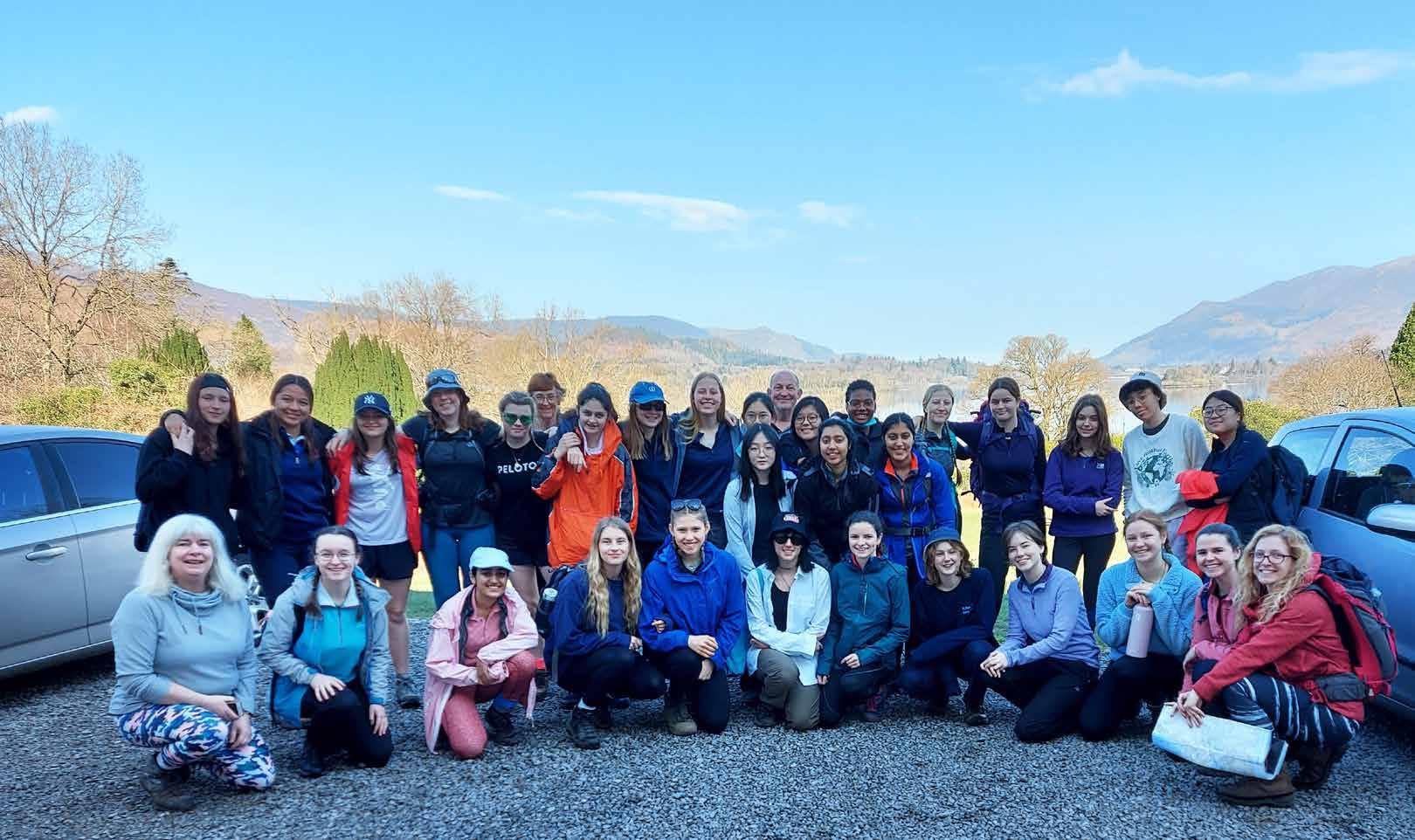 Zara LVI, Duke of Edinburgh Award Scheme Officer
Zara LVI, Duke of Edinburgh Award Scheme Officer
At the end of the Summer Term, a mixed squad of 26 UIV-LV pupils headed to Maryland, USA to take part in the muchanticipated Lacrosse Tour. Running alongside the Women’s Lacrosse World Championships, the team played in the World Championships Festival against many other school teams. This was an exciting opportunity for the squad to experience competing against US high school and club teams, as well as watch the best players in the world representing their countries in the World Championships - including our very own Miss Smith for Team England.
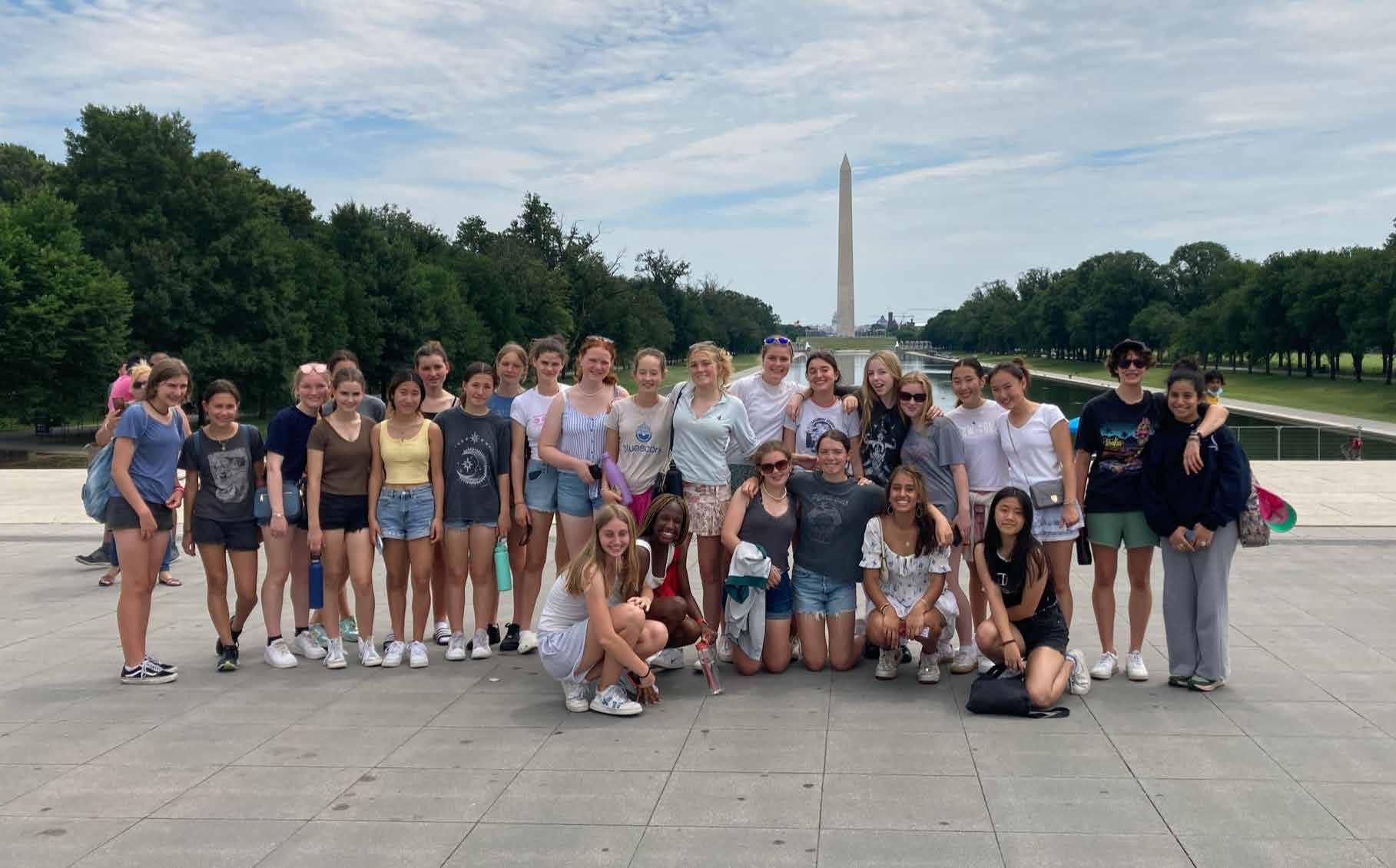
On the first day the group took time to acclimatise and take in some of the sights of Washington DC including the White House, Lincoln Memorial and the Capitol building. We travelled up to Towson where we would be based for the tournament, playing five tough matches across the first three days. High temperatures and intense humidity added to the challenge, but the team worked hard to support one another and play to each other’s strengths. After each morning of play, we watched the World Championship matches at Towson University. Seeing games played in stadiums was a unique experience and demonstrated the scale of the sport in the USA, interesting for all our girls to see. We managed to support several England games, as well as Sweden (Tori and Lily) and Italy (Francesca, Isabella and Caterina) matches to cheer on our Wycombe Abbey pupils.
We moved on to Baltimore next where we were scheduled to play some local teams and ‘tailgate’, which is where the hosts serve a match tea after the game and socialise. These were challenging games where the mixed squads continued to improve, both individually and within their units. Tailgating gave the pupils the chance to chat, relax and compare lacrosse stories with the opposition, which is always a highlight of any sports tour.
The knockout stages of the World Championships took place in the evenings, and these offered some excellent spectating and nail-biting games. The cheers for Miss Smith echoed around the stadium from the Wycombe Abbey contingent and we were proud to be in the stands to see England beat Australia in the bronze medal match to finish third in the world. The final was dramatic with torrential rainstorms but again it was a privilege to be present for the USA beating Canada to win gold on their home soil.
The group also had the chance to visit one of the top universities on the East Coast, Johns Hopkins, touring the campus and chatting to students about their experiences in the US college system. The trip ended with a sightseeing trip around Baltimore harbour and a visit to the Natural History Museum in Washington. This was our first transatlantic trip for some time, so it was wonderful to see pupils having the change to experience a different culture, make new friends and improve their sporting confidence throughout. Many memories were made!
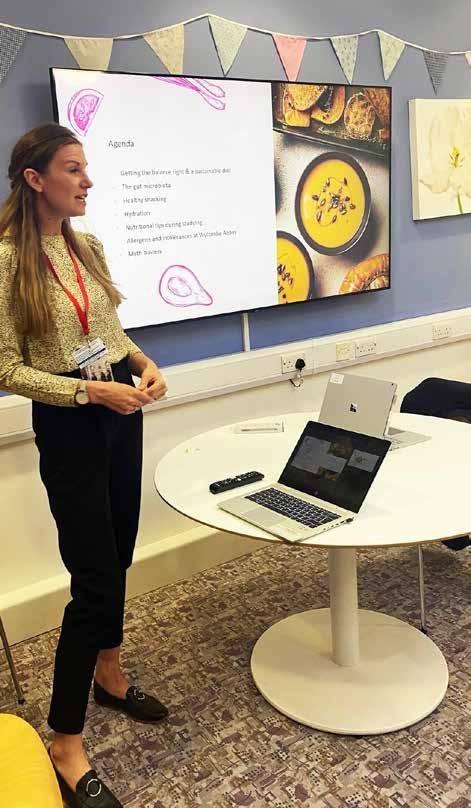
A nother year has raced by. As we say goodbye to another cohort of Clarence pupils and turn our minds towards the summer holidays and the new academic year, it is a real pleasure to be able to reflect upon 2021/2022 and the exciting work that has taken place across the School’s Wellbeing and Flourishing initiatives. We have greatly enjoyed celebrating our three main Flourishing@Wycombe themes for the year focussing upon Community, Nutrition and Optimism.
Community was a particularly appropriate Flourishing@Wycombe theme for the first term as we welcomed back many of our much-loved communal activities, such as Chapel and Whole School Singing. The joy of being together again as a community has been the hallmark of this year and something that I am sure will remain a constant.
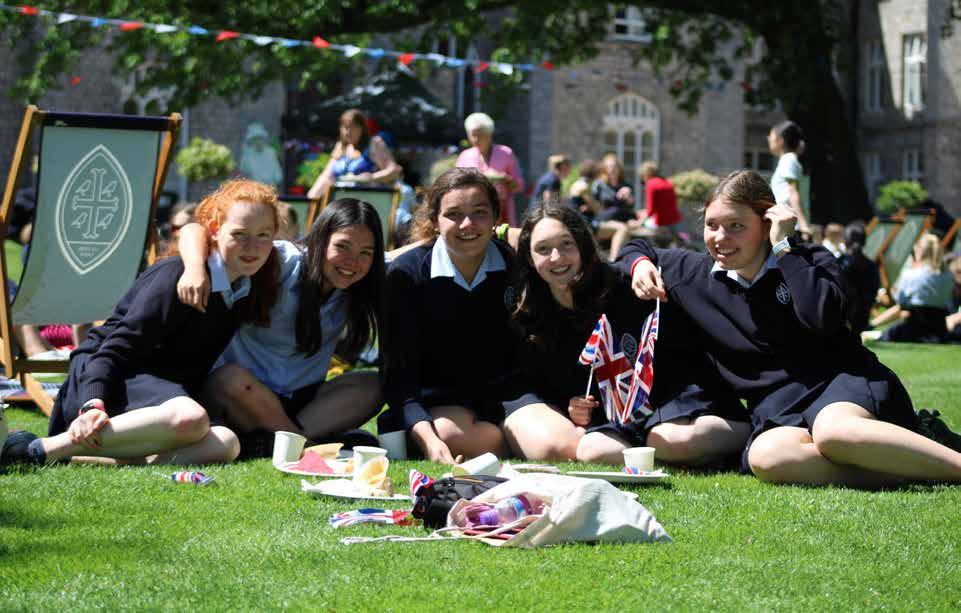
The focus upon the importance of nutrition as part of our wellbeing is something that is championed by our active food committee. Pupils from all Houses and year groups worked closely with our catering partners Holroyd Howe to ensure that varied, exciting and balanced meals and snacks are provided as part of everyday life at School. The focus upon nutrition also allowed us to explore the links between what we eat and wellbeing. UIII began 2022 with an interesting talk from Holroyd Howe’s nutritionist who spoke to the girls about how they could make healthy food choices to support their life in School. Pupils readily digested (pun intended!) the information about the link between nutrition and wellbeing and it was a pleasure to see all the amazing poems and posters that girls in Lower School produced on the topic and, in particular, the nutrition rap performed by one of our talented UIII pupils!
As we celebrated optimism in the Summer Term, a key highlight for me was the opportunity to record an episode for the Flourishing@Wycombe Podcast with the new Head Girl Team in which we discussed their thoughts on the importance of optimism and how it will shape their leadership. Their insight into this theme and other aspects of life at Wycombe Abbey and what they have gained from their time here was wonderful to hear and truly inspiring!
The Wellbeing Department continues to go from strength to strength under Miss Blunt’s leadership. Pupils have covered far more than the traditional PSHE and RSE topics and have explored many aspects of positive psychology and the science of wellbeing this year both inside the classroom and through assemblies, tutor times and year group talks. Miss Blunt added a highly successful Clarence carousel to the Wellbeing programme to revisit the important PSHE and RSE topics that were taught earlier in the girls’ School career as well as focussing on how they can prepare for life beyond Wycombe Abbey. It has been great to see how well received this has been; after all, ensuring that our pupils are ready for life after School and are able to flourish at university and beyond is one of the main aims of our Wellbeing programme.
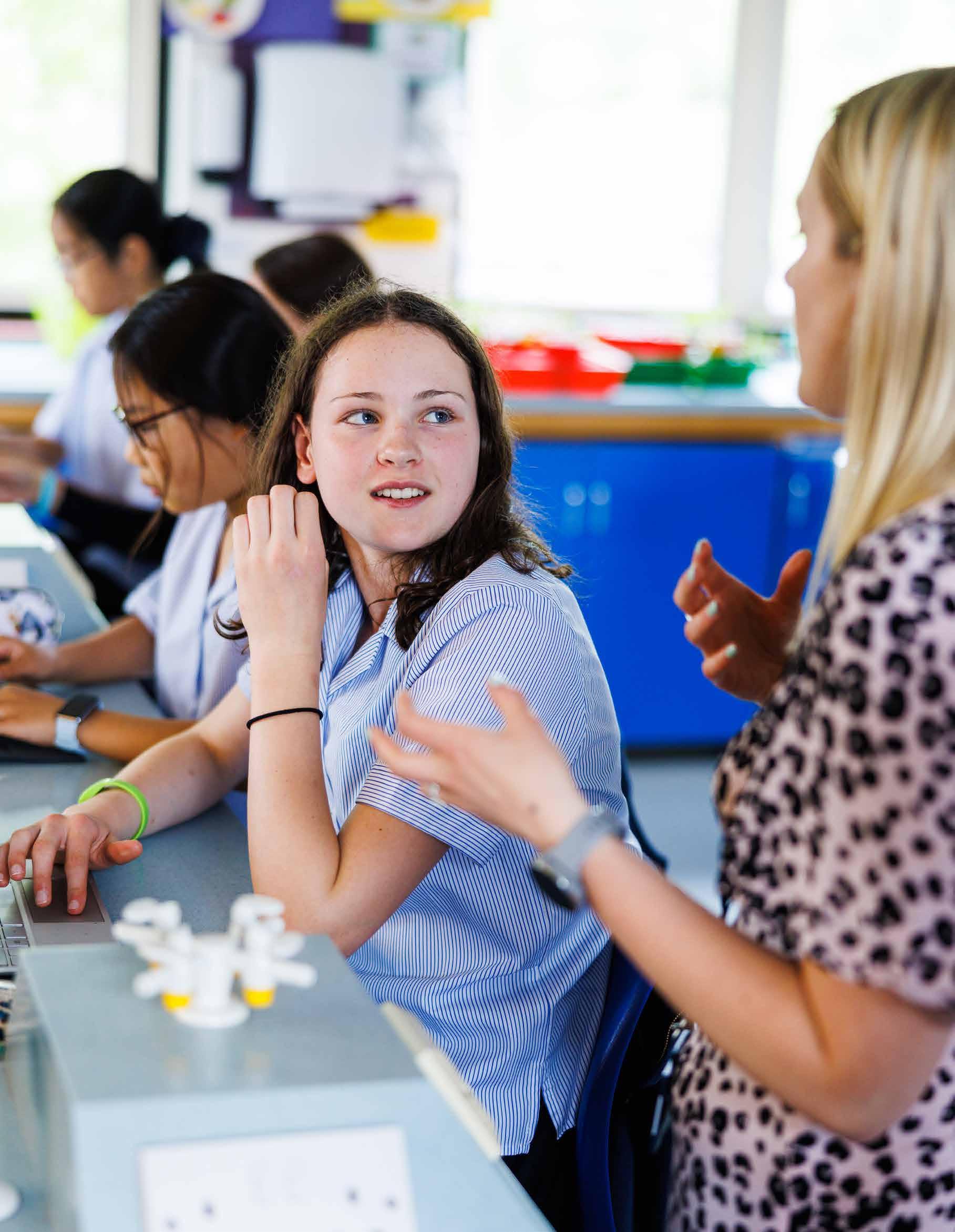
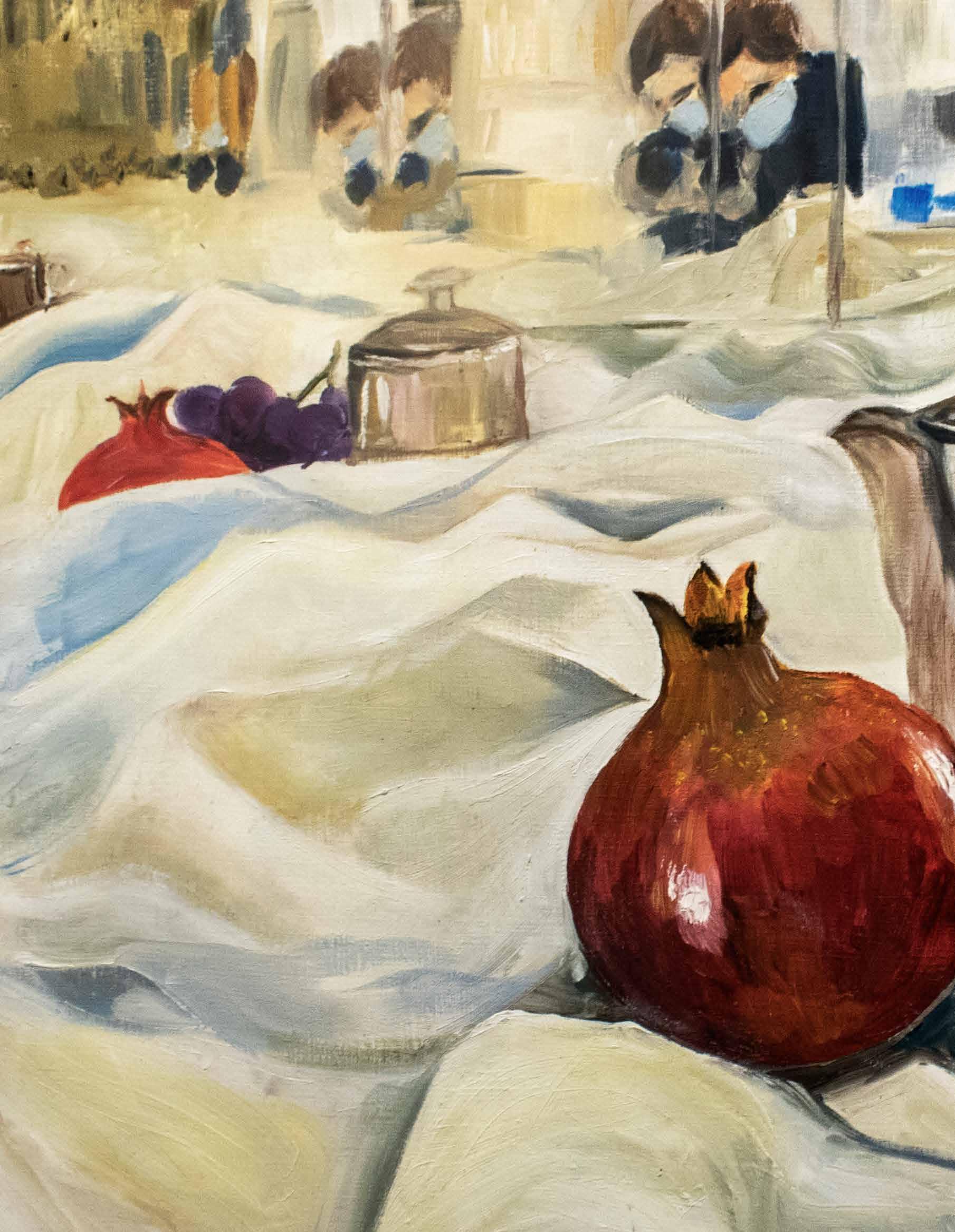
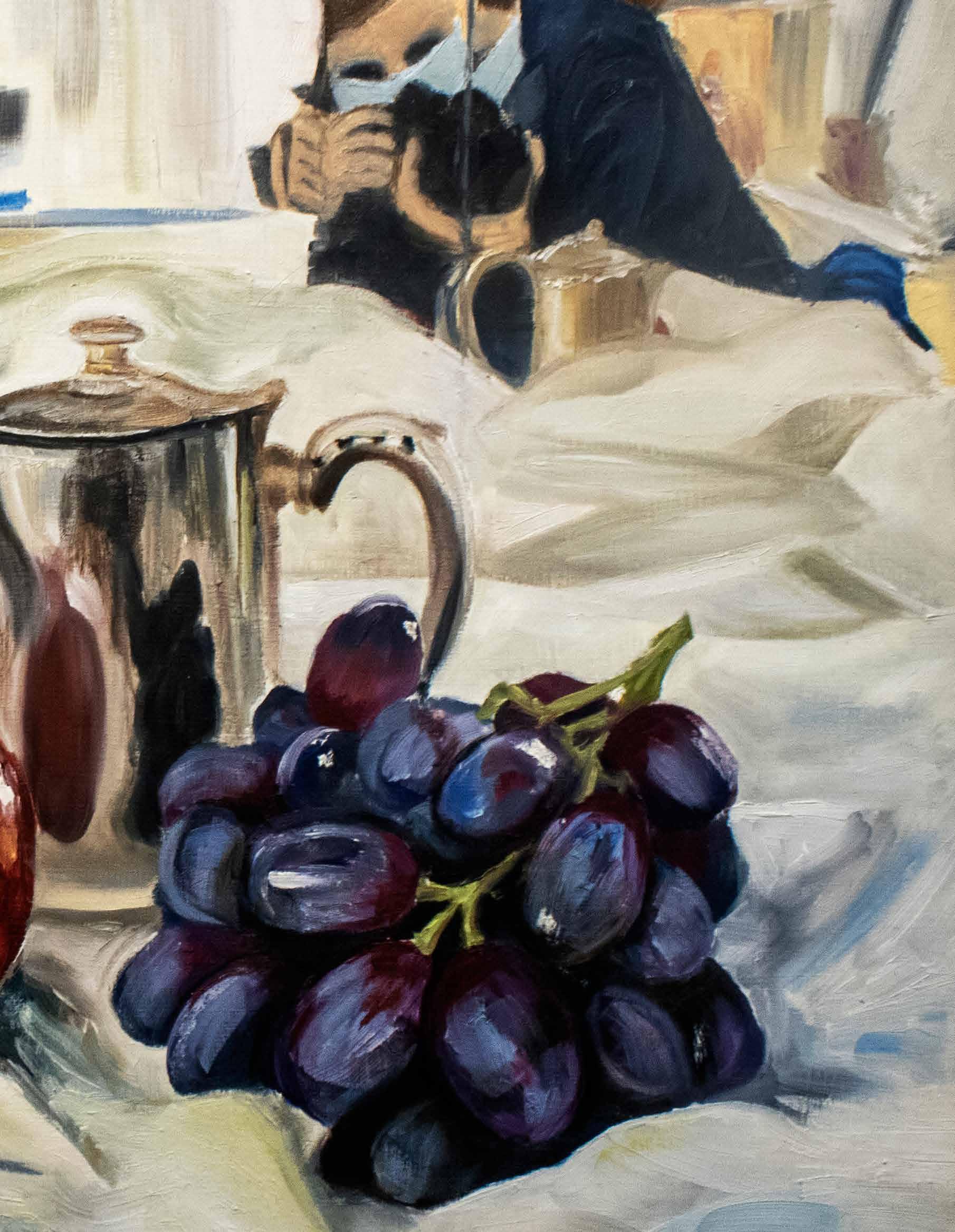

This year we have had much to celebrate and be grateful for. We have had an entire year of Chapel services with no disruptions! We started the year with many of us quite hesitant about gathering together, and our singing in Chapel a little timid. We also had two year groups who, due to the pandemic, were unfamiliar with our usual Chapel routines. However, in true ‘Wycombe style’ this did not last long, and the community spirit of the pupils and staff carried us back to enjoying our favourite hymns again. This was made even better by the installation of a new organ in the Chapel enriching our services.
In celebration of the School’s 125th anniversary, we held a Founder’s Day Service in Chapel at the beginning of the academic year. The Bishop of Buckingham, Rt Rev Dr Alan Wilson, led the service and gave a wonderful message to us all (see page 50-51 for his Sermon). He spoke about the history of the School and Dame Frances’ mission to create a system of education for girls that enabled those in her care to discover their true potential and vocation. This also gave us an opportunity to resurrect our school song In Fide Vade
Throughout the year we have been blessed with many different Chapel speakers. These have included a Wycombe Abbey Senior, an Archdeacon, a Rabbi, a university Chaplain and a Vicar who by night is a comedian. We also had the return of Geraldine Latty, a Wycombe Abbey favourite, who led an evening of gospel singing accompanied by our own gospel choir called Phire. We were also very fortunate to have Group Captain Katherine Wilson from RAF High Wycombe attend our Armistice Service.
The Last Post and Reveille were played by Lucinda (LVI) after which Group Captain Wilson commented “I have never heard that played so well!”; high praise indeed!
Following this she met a group of Sixth Form pupils who asked her a range of excellent questions about her life in the RAF.
Our morning Chapel services resumed their usual pattern and we have enjoyed the rich variety of House services. Each Senior House, led by their House Sacristan, has tackled a variety of themes such as peace, diversity and interfaith week in the Autumn Term. For the first half of the Spring Term our themes focussed on our ‘Academic Qualities’. During the second half of the term, we looked at ‘Inspirational Women’. Finally, during the Summer Term, in honour of our 125th year, we used the original mission and aims of Dame Frances to shape our Chapel services. Each House embraced
their theme and did an excellent job of underpinning it with a faith story as well as relating it to our community life.
This year we also prepared 20 of our Anglican pupils to be confirmed. Mrs Hyde (Assistant Chaplain), and I spent Monday evenings meeting with the candidates through the Autumn and Spring Terms as we followed the Youth Alpha course together. This included some good discussions over topics such as ‘Life: Is this it?’ and ‘Prayer: Why and how do I pray?’. The Bishop of Buckingham led the Confirmation Service in Chapel with families and supporters able to attend this important day.
Our final Chapel celebration of the year was held on Dove Day as the whole school gathered along with guests attending the day. We sang our favourite hymn, Jerusalem , along with In Fide Vade , bringing the year to a fitting and uplifting end.
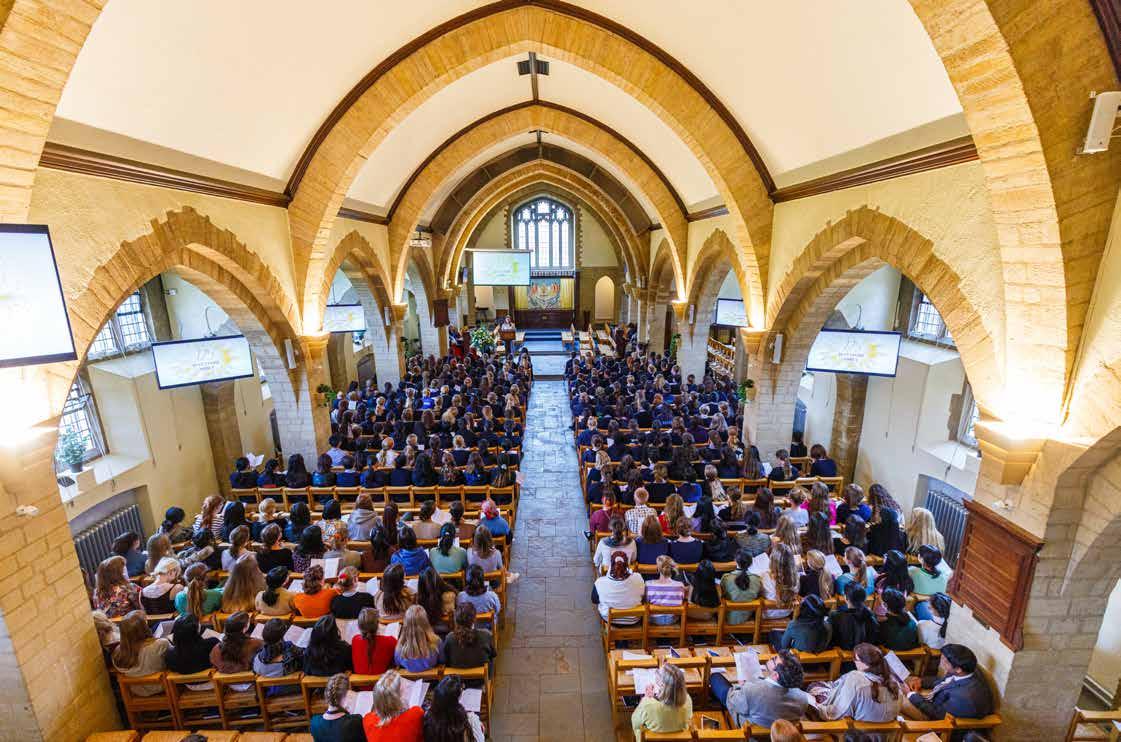
Throughout the year we have been blessed with many different Chapel speakers.

I would like to thank Mrs Hyde, Assistant Chaplain, for all her hard work this year in making sure the Chapel services run smoothly, and the House Sacristans who have produced and led their House services. I would also like to thank our School Almoners who show incredible commitment and dedication throughout the year. Finally, our Chapel services would not take place without the loyal musicians who support our worship. Our thanks go to the Music Department, the instrumentalists who have played so well, and especially to our choirs who have so beautifully sung throughout the year.
Rev Penny Nash ChaplainAirlie
Jasmine (UIV)
Tomilola (UIV)
Sasha (UIV)
Barry Cosima (LV)
Butler
Catherine (UIV)
Campbell Jasmine (LVI)
Anna (UIV)
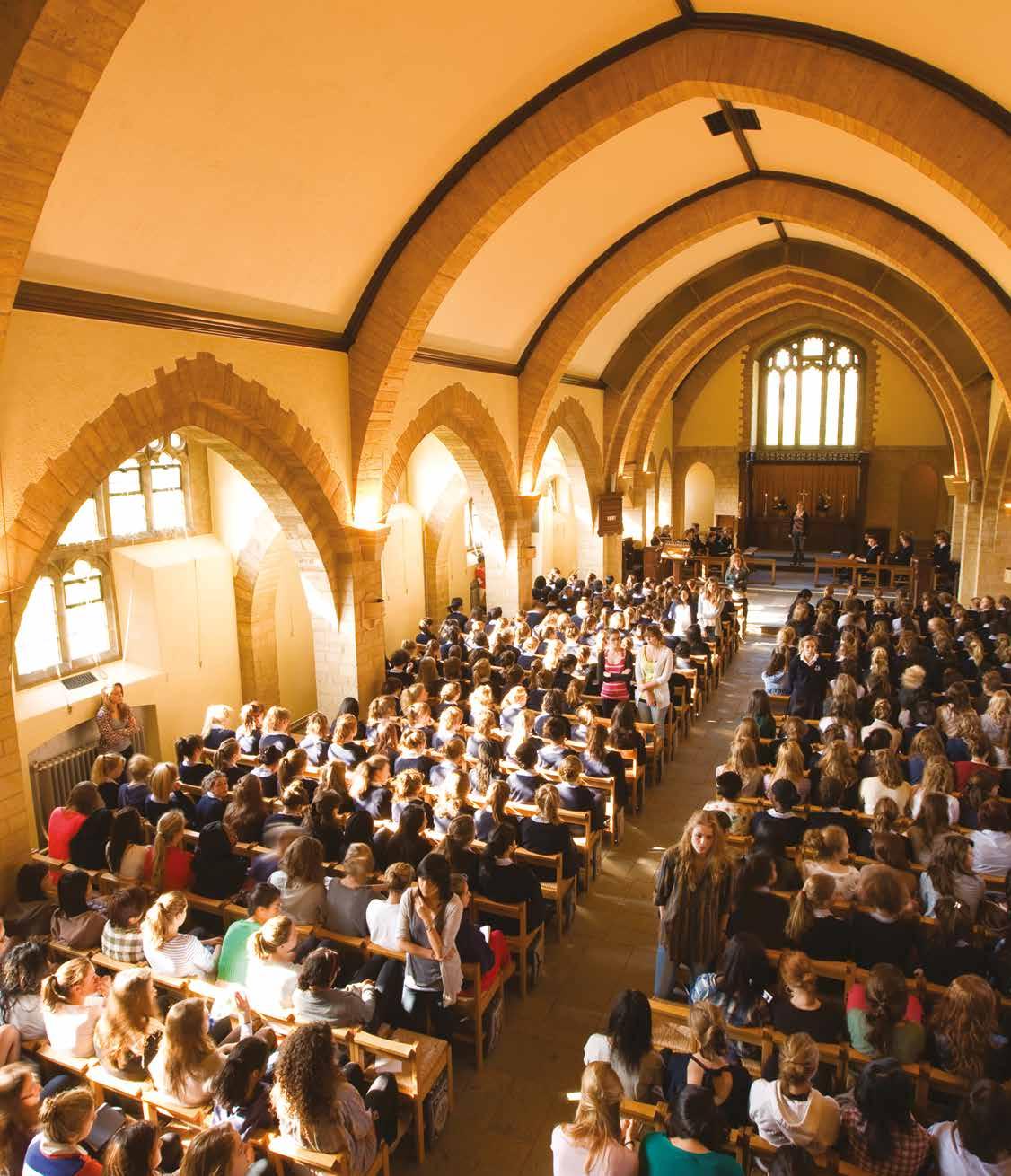
The following girls were confirmed by The Bishop of Buckingham.
Pitt
Georgie (LV)
Rubens
Ambika (LV)
Madeline (LV)
Sydney (LV)
Paris (UIV)
Venetia (LV)
Ashleigh (LV)
Felicity (LV)
Henrietta (UIV)
Wendover
Arolape (UV)
Arinade (LV)
Nancy (LV)
Most of our fundraising has gone to support our elected charities: Ripple Africa in Malawi and the Rape and Sexual Abuse Support Service (RSASS)
Throughout Wycombe Abbey’s 125 years, service and giving back have been of central importance. This year, we reflected in Chapel on our journey with the Melanesian Mission; we are one of its longest supporters, having been introduced to their work by Dame Frances Dove when our School was founded. We have generally focused on education on the islands and have enjoyed hosting visitors and sending out teachers and Seniors. Currently, our fundraising is helping to re-equip the school in Vanuatu after it suffered from severe volcanic ash and cyclone damage. This charity, together with Central Aid, which Dame Frances Dove helped to found, will now be known as our Dove Charities and will continue to be supported by three of our mufti days each year.
It has been a joy to fundraise in person again. We launched this year’s charity events with the Bonfire Night stalls, which raised a record £4,125. Houses also held smaller bake sales and House raffles during the year. Most of our fundraising has gone to support our Elected Charities for 2022/2023, Ripple Africa in Malawi and the Rape and Sexual Abuse Support Service (RSASS) in High Wycombe. We developed our links with Ripple Africa with an exciting day in March where we learnt about their close work with the local people and their sustainable projects. RSASS is developing new areas, such as art therapy, which would not be possible without donations. This year’s fundraising for both of these charities culminated in an extravagant House Hamper Raffle.

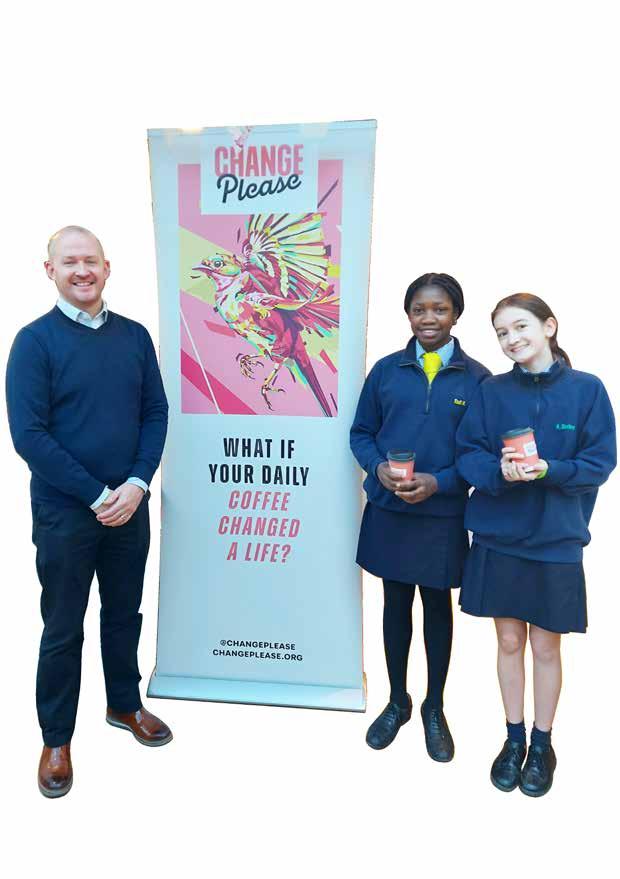
In addition to our elected charities, we also supported several other initiatives. For example, aware of current events, the girls were keen to fundraise for the Red Cross in order to alleviate suffering in Ukraine. The Head Girl Team raised money for girls’ education with the
Malala Fund. Cloister House had a bake sale in aid of a charity which Amaya set up with her tennis coach to send tennis equipment to Africa. We also started a new whole School initiative which directs profits from our coffee drinking to the social enterprise, Change Please, which trains people who are experiencing homelessness as baristas and helps them to find work.
In addition to fundraising, the girls and staff of Wycombe Abbey give back in many other ways. One example is the Horizon project, where girls work with disabled children and young people to help them to swim. This has proved so popular that our involvement has been extended this year to support other sports off-site.
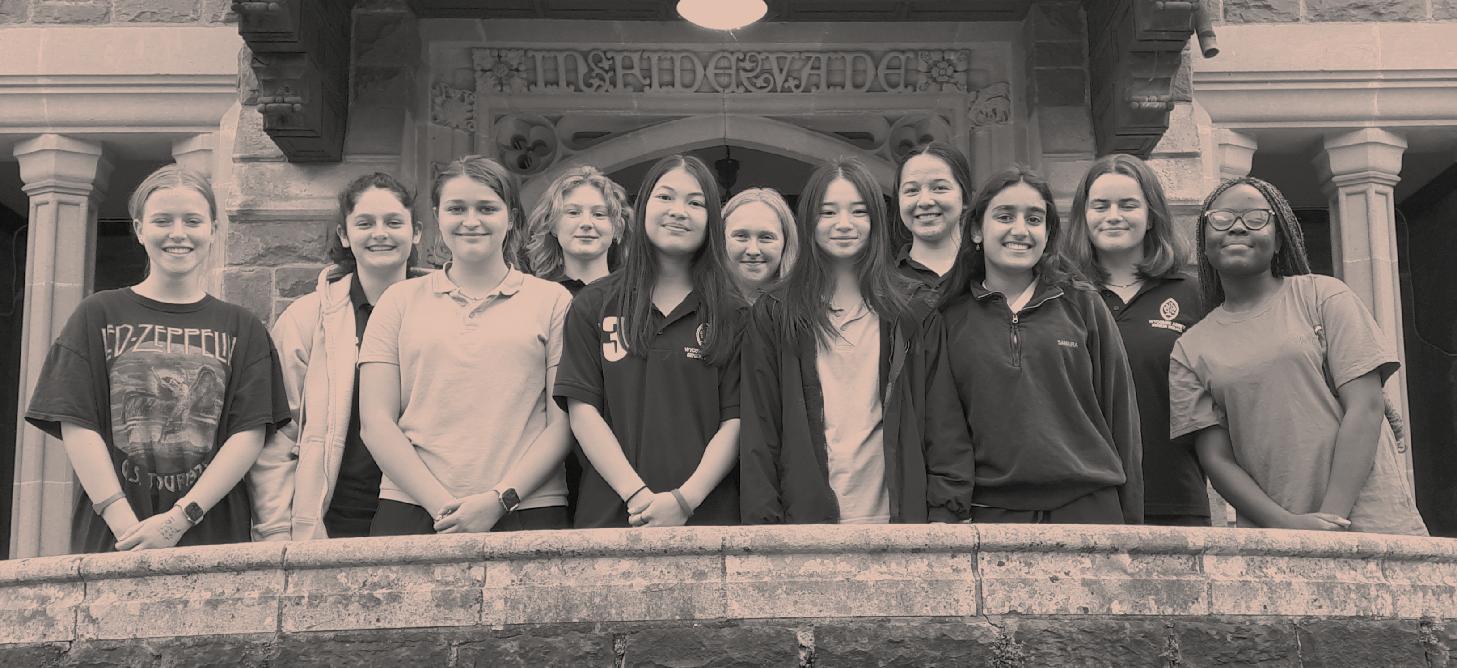
I would like to thank all those involved, whose hard work has made our charity activities so successful. Special thanks go to Yam and Anna, the Charity Prefects for the year, and to all the Charity Reps.
Mrs Julia Hyde Assistant ChaplainPartnerships have been an area of significant strategic priority and growth at Wycombe Abbey for the 2021/2022 year. Locally, we have seen the implementation of our Primary Schools Placement Programme, a long-planned project, involving ten primary schools in the High Wycombe area.
The fundamental proposition of the programme is simple: each pupil in the Sixth Form undertakes a weekly placement for approximately 10 weeks at a local primary school, assisting those schools in whatever ways are needed. The upshot is that in the 2021/2022 academic year alone, Sixth Form pupils at Wycombe Abbey have contributed over 2,000 hours of service, most of which have been in the classroom working face-to-face with pupils, mainly at schools with an above-average
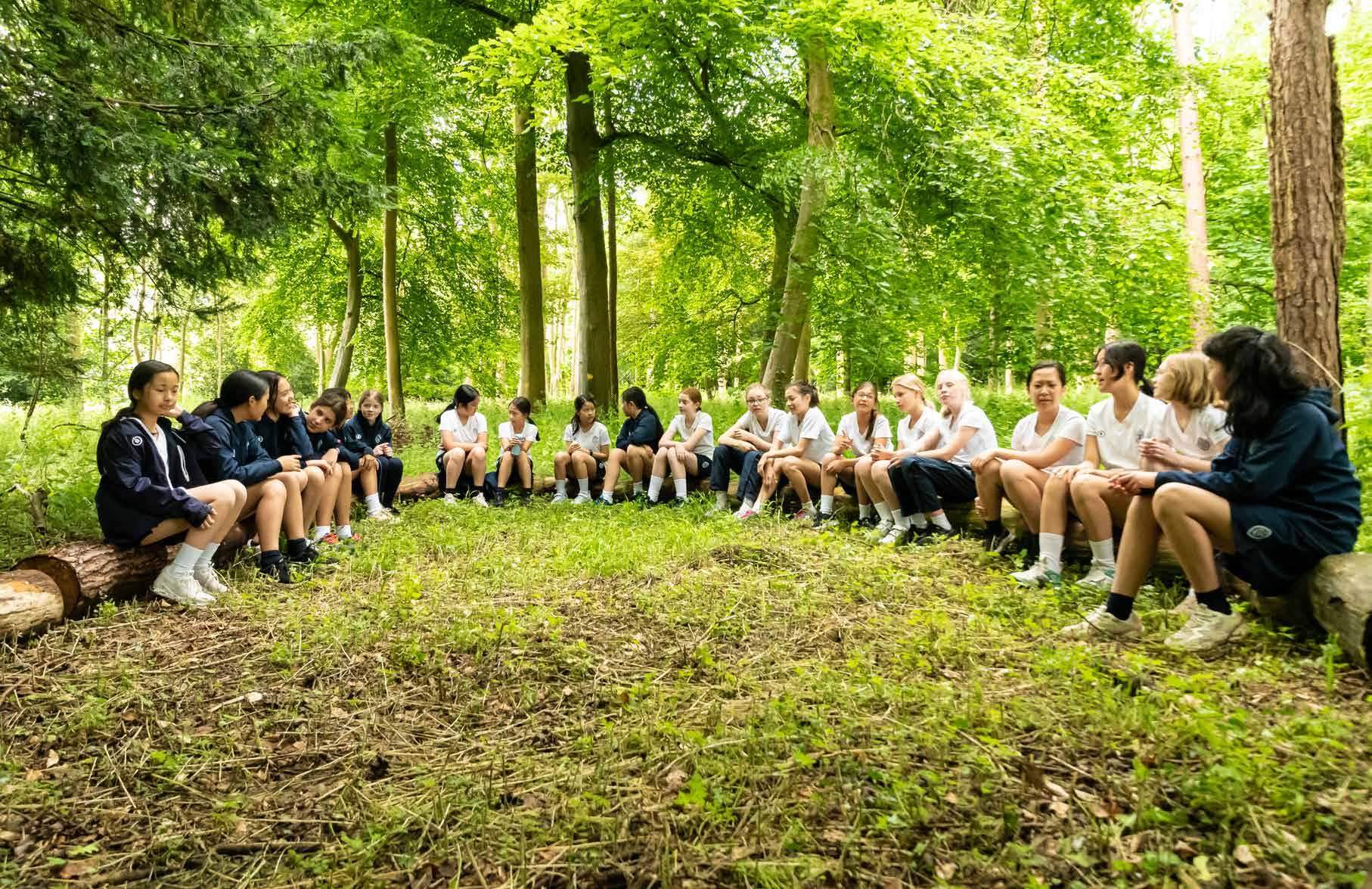
proportion of children from disadvantaged backgrounds. Besides learning valuable skills and gaining important experience, Wycombe Abbey pupils can be immensely proud of this contribution. We can also be proud of them, such was the lavish testimony from senior leaders in our partner primary schools. Our work with primary schools this year culminated in a Performing Arts Day for Castlefield School, who brought their entire Year 5 cohort (approx 65 pupils) for a day of immersive, interactive workshops that were devised and delivered by our Lower Sixth pupils.
Our work with secondary schools in London continued apace and we have rapidly become embedded in various respects with those institutions. Our work principally coalesces around higher
education, mainly in helping to prepare their most able pupils for applications to highly selective programmes in STEM and Medicine. This work has been led by Mrs Edwards, Mr Vaccaro, and Mr Whiteley, who have given up significant quantities of time, energy, and expertise in visiting these schools and helping to support their work remotely. Perhaps of particular note is the Creative and Critical Thinking scheme of work that, having been delivered by Mr Vaccaro in person, has now been incorporated into the in-house curriculum at Westminster Academy. Plans are now afoot to strategically develop this work in various ways and we are very excited about the impact it may have.
Dr Neal Carrier Director of Sixth Form and Head of Partnerships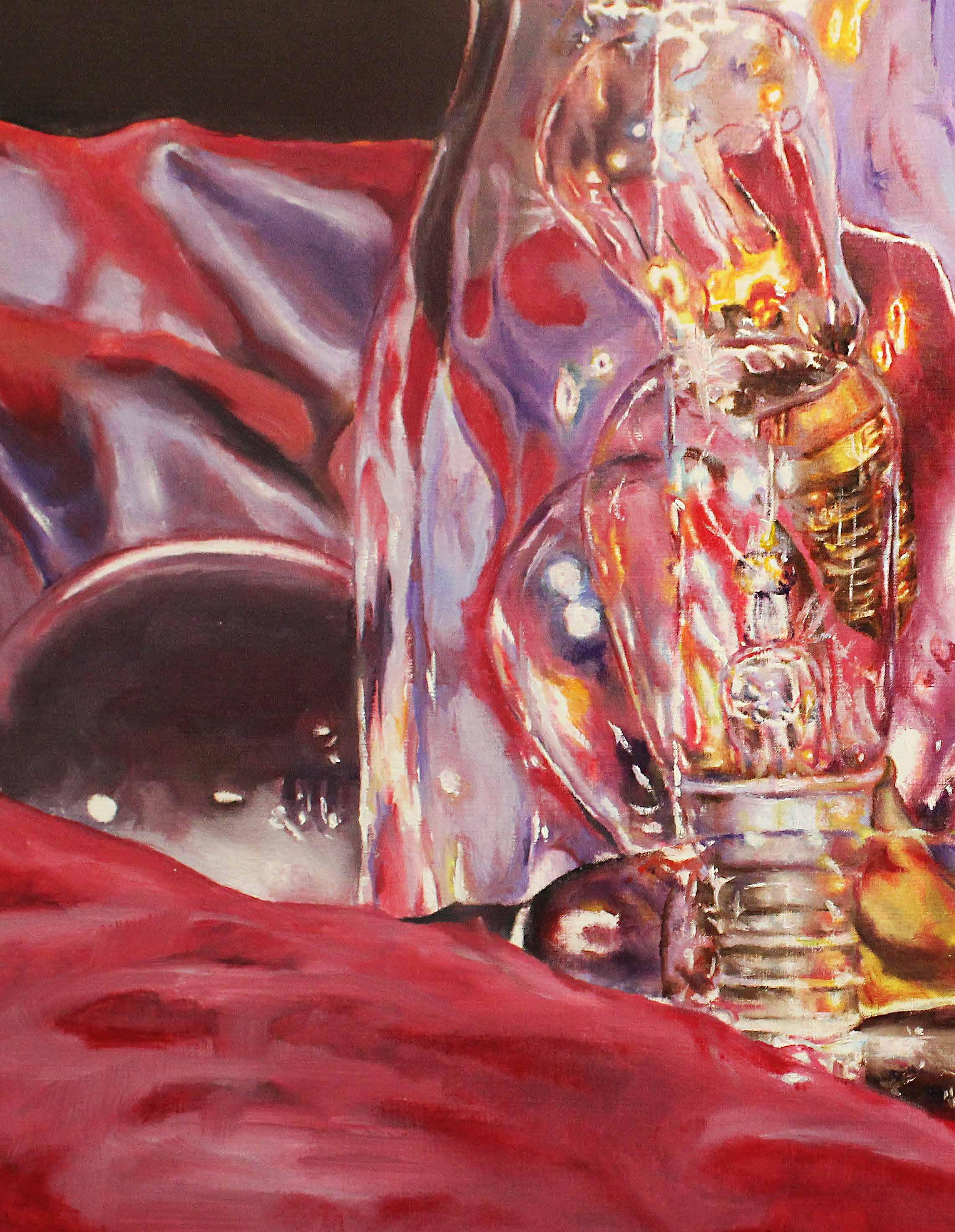

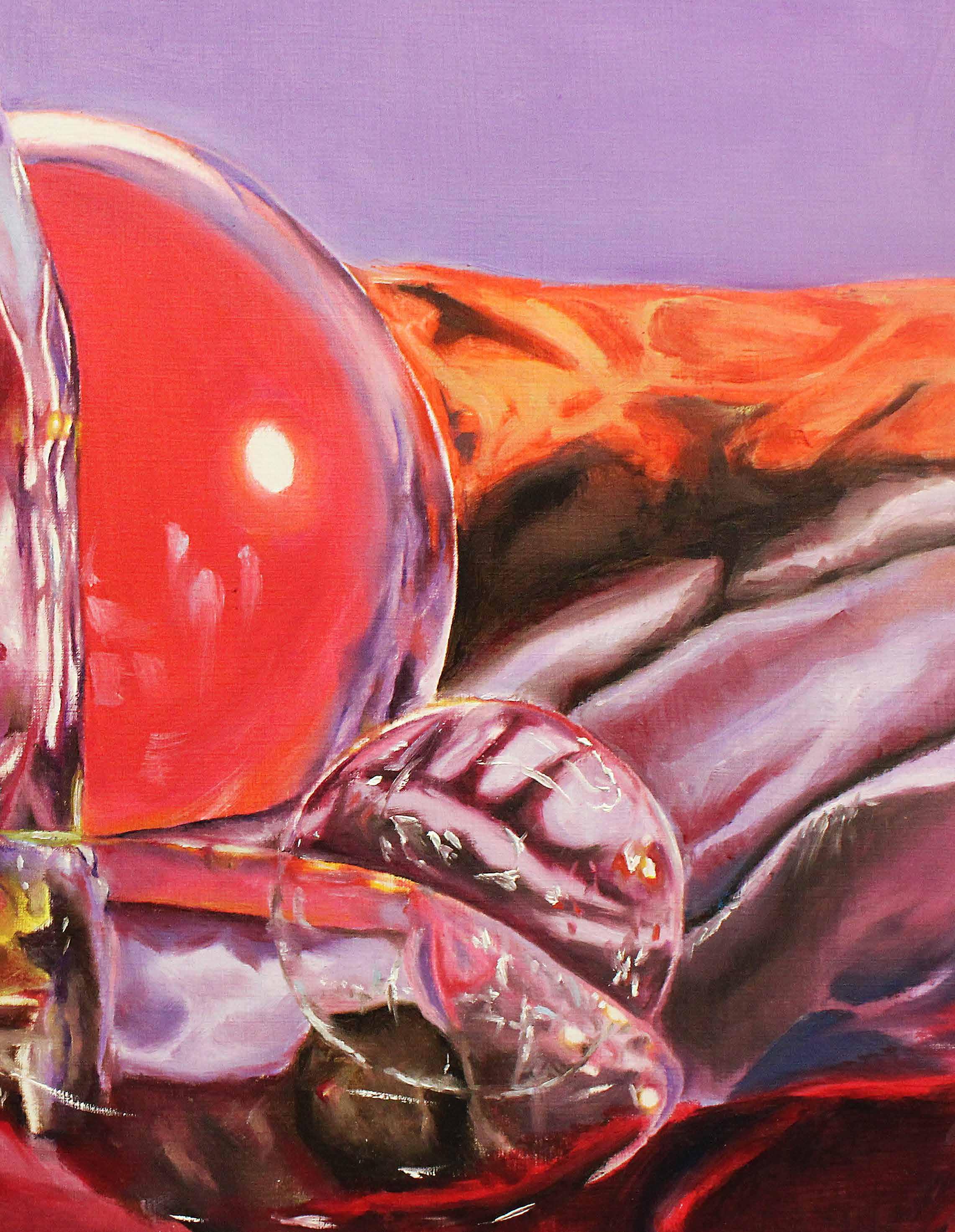
W ycombe Abbey’s Parenting the Teenager programme is an opportunity for parents to hear from School staff and external speakers about key issues that face both teenagers and their parents in the 21st century. We are all aware of the challenges that face young people today and the importance of raising our own awareness of key issues as we look to raise our children. From diet to digital devices, from teaching to teenage friendships the more that we can do to understand the experience of young people the better we are able to help guide them on their journeys.
One of the overriding legacies of the last few years is undoubtedly the use of technology; moving some of our Parenting the Teenager talks on-line began as a necessity but has increasingly been a way to ensure that more parents are able to attend and to give us greater flexibility in providing these seminars. This year we were delighted to be able to combine on-site talks with remote lectures and look forward to doing so again next year.
The 2021/2022 series of talks began with Mr Vaccaro who took us on an interesting journey through Wycombe Abbey’s approach to teaching and learning and how we aim to ensure that pupils are future ready by teaching the skills they need for years to come and by challenging them to become critical thinkers and not solely experts in how to pass examinations. Later in the Autumn Term we were delighted to hear from Natasha Devon as she gave us her insights into the impact of media, social media and societal pressures on body image and provided us with ways to think about how we can encourage young people to focus upon healthy bodies rather than the media portrayal of what we should look like.
We were delighted to be able to host what was our first interactive Parenting the Teenager session in the Spring Term as we invited parents to a Parenting the Teenager lunch where they were able to meet the School’s catering team and sample the food that is served to the girls of Wycombe Abbey on a daily basis. It was a great opportunity for parents to meet, to talk with the chefs and catering managers and each other about nutrition, wellbeing and the role that food plays in the lives of their daughters. Following lunch we were treated to an insightful two part presentation by Holroyd Howe’s Nutritionist, Ellie Olds, and our PE Department’s very own Mrs Gee. Parents discovered both about how we can make help young people make healthy food choices and how we can ‘fuel to perform’ both on the sports field and in the classroom. Performance was a key theme in the second talk of the Spring Term. Dr Aric Sigman gave a timely talk to parents about how to help young people prepare for examinations without inducing worry and stress. As always, he shared a wealth of useful information, insights into the latest research and practical tips about what we can do to support our girls.
During the Summer Term we focussed upon two very important aspects of young people’s lives with a thought provoking and informative talk by Miss Blunt and Mrs Fawkes exploring how Wycombe Abbey educates pupils about Relationships and Sex Education, Wellbeing and Safeguarding. These topics are key facets of young people’s education and their personal development and it was a very useful opportunity for parents to hear more about how we, as a school, engage with young people about these
issues. Our final external speaker of the year proved to be one of the most popular speakers we have had in recent years; Emma Gleadhill’s advice on how to help young people navigate teenage friendships not only gave our audience an in-depth understanding of why teenagers behave the way they do but also provided all of us who watched the talk with a number of useful tools to use as parents and I for one will be employing a few of them with my own children!
Mr James Jones Deputy Head (Pupils)Please keep an eye on your email for information about upcoming Parenting the Teenager talks.
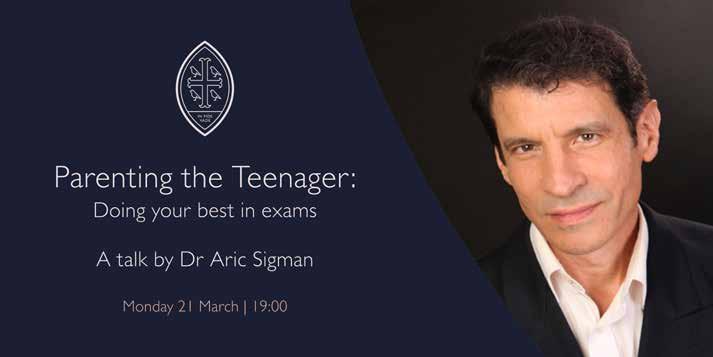


I

t was wonderful to host our traditional Bonfire Night and fireworks display on Wednesday 3 November; we were delighted to welcome over 1500 pupils, families and staff from the Wycombe Abbey community to this event. In the lead up to the day, LIV pupils from each Senior House created bonfire guys around the theme of their House colour. The final pieces were quite substantial in size and the Headmistress, Mrs Duncan, judged the winners based on their interpretation of the House colour theme and quality of presentation. The winner was Sonic the Hedgehog by Shelburne, followed by Barry House’s Smurf and Wendover’s Red Phone Box.
The House Charity stalls were set up in the Davies Sports Centre by each of the Senior Houses. There was an excited buzz in the Sports Hall as pupils and families took part in raffles, lucky dip competitions, bought jewellery, clothing and art. The Houses put a great deal of effort into advertising their stalls, making eye-catching designs and drumming up business from the passers-by. Overall,
£4022 was raised, the largest total ever for a Bonfire Night, and this will be split equally between our Whole School Charities, Ripple Africa and Rape Crisis.
Everyone then headed outside to watch the bonfire and fireworks display. This professional display was choreographed to music which everyone really enjoyed despite the chilly November weather.
The grand finale to Mr Brightside, a Wycombe Abbey favourite, was spectacular and everyone cheered as the display reached its climax.
Mr James Mercer-Kelly Senior Deputy Head (Professional Development and Systems)
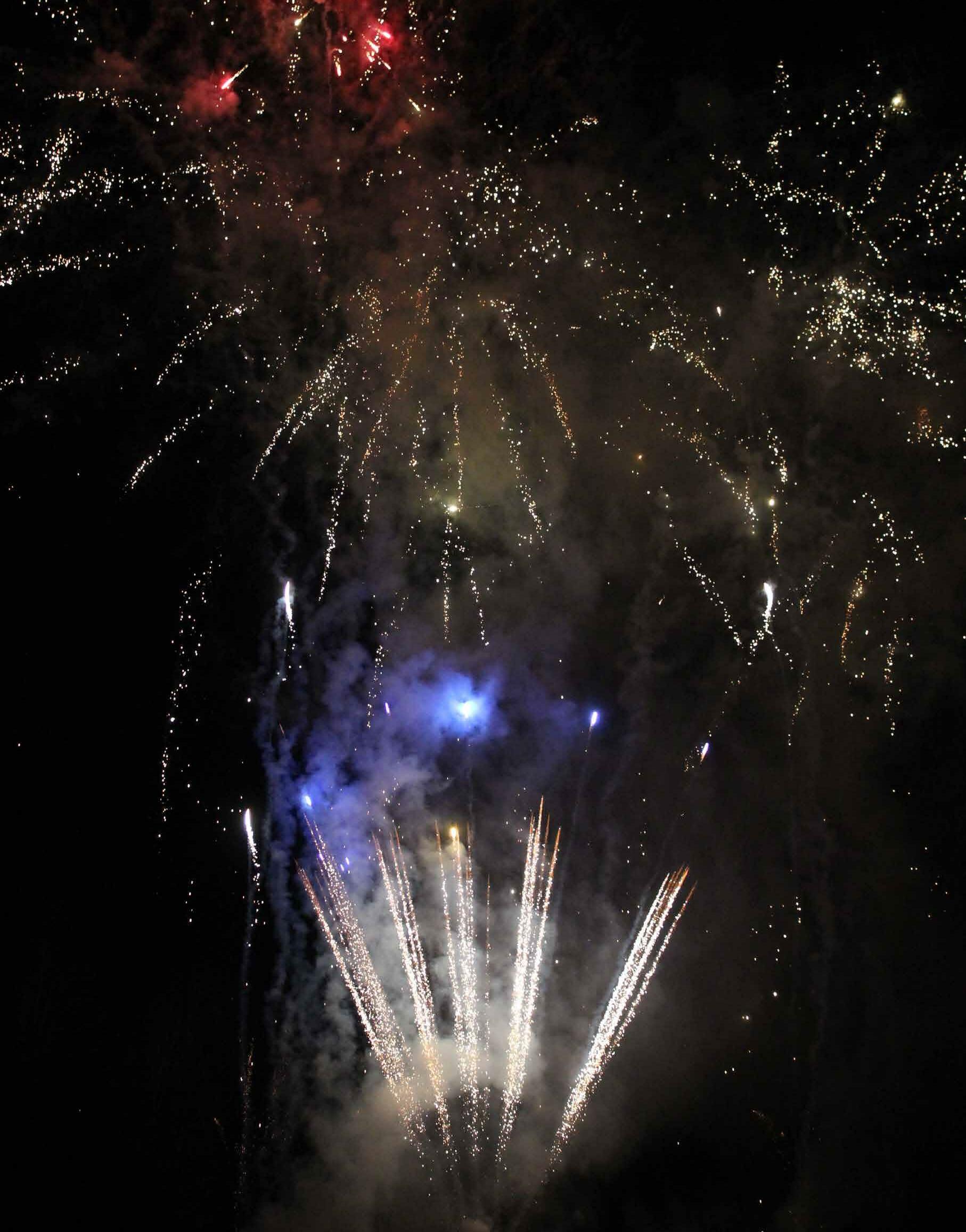
World Book Day began in 1995 as a worldwide celebration of books and reading. The mission was to promote reading for pleasure, offering every child the opportunity to have a book of their own. The day is marked in over 100 countries and this year was the 25 th anniversary.
This year we chose the theme of Alice in Wonderland and curated a week-long display of related books, illustrations, and objects. As well as featuring some A level artwork by Bea (UVI). We also sought out the skills of one of our art technicians, Ms Evans, who loaned us tea-party props, framed Bea’s artwork and the stunning Alice: Curiouser and Curiouser exhibition poster that was donated by the V&A Museum. Collaborating with the Art Department made the display especially magical.
During the lead up to World Book Day we ran a book fair which allowed pupils access to over 200 titles and the opportunity to use their £1 World Book Day book voucher. Scholastic Book Fairs reward the host school with a 60% commission of sales in the form of book tokens, making it the perfect opportunity to raise money. Over the four days we managed to surpass an amazing £2000 in sales. The House Librarians decided to donate the tokens to one of our partner schools to help support their library collections. Thank you to everyone who made a purchase.
In the spirit of kindness, a team of pupil House and School Librarians, as well as some Resident Tutors, volunteered to support running the fair. Inspired by Random Acts of Kindness Week, I asked Ms Harbour to nominate four pupils who had been especially kind, and they each received an extra £5 voucher to spend at the fair (Lucy and Ashley in UIII, Isla and Rahi in LIV).
UIII were treated to a visit by author Joseph Elliott where they heard about his trilogy, the publishing process and his career including his achievements as being a CBeebies actor and a screenwriter! The queue to get a book signed was so longJoseph and I were late for supper!
Our Assistant Librarian, Ms Weatherby, organised an evening looking at humour and creativity in the Wycombe Abbey archives. Items on display included the many magazines produced by pupils across the years, handmade programmes for House plays, pupil artwork from the past, and photographs of creative endeavours such as music and drama. The event began with a
Over the four days we managed to collect an amazing £2000 in sales.
short talk from Irina and Argia (LVI) about the importance of pupil magazines and their experience of editing The Pub
On World Book Day itself pupils and staff dressed up as one of the many characters from Alice in Wonderland (or as any literary character of their choosing). There was a great turn out of characters and costumes were fantastic The winner of the pupil costume competition was Clemmie (UIII) for her Mad Hatter outfit, I was particularly impressed by the handmade elements such as her paper mâché dormouse in a teacup.
The House Librarians were tasked with asking their fellow boarders for a wish list of new books for their House libraries, and a box of new books was sent up to each House the week after World Book Day to keep that enthusiasm for reading flowing.
Overall, the combination of events brought joy and excitement to both staff and students alike. And that really is what World Book Day is all about!
 Ms Fay Myers School Librarian
Ms Fay Myers School Librarian
To celebrate 125 years since the foundation of Wycombe Abbey, we are pleased to announce the publication of Humans of Wycombe Abbey: Volume 2 – a celebration of our wonderful School community; pupils, staff, Seniors and friends who make up the diverse range of experiences and memories throughout the generations at Wycombe Abbey.
The project is a follow up to a previous volume published in 2016 by a team led by Gigi Sage (Class of 2018, Campbell, C314) and Riva Kapoor (Class of 2018, Campbell, C314) to celebrate the 120th anniversary of the School and took its inspiration from Brandon Stanton’s blog Humans of New York.
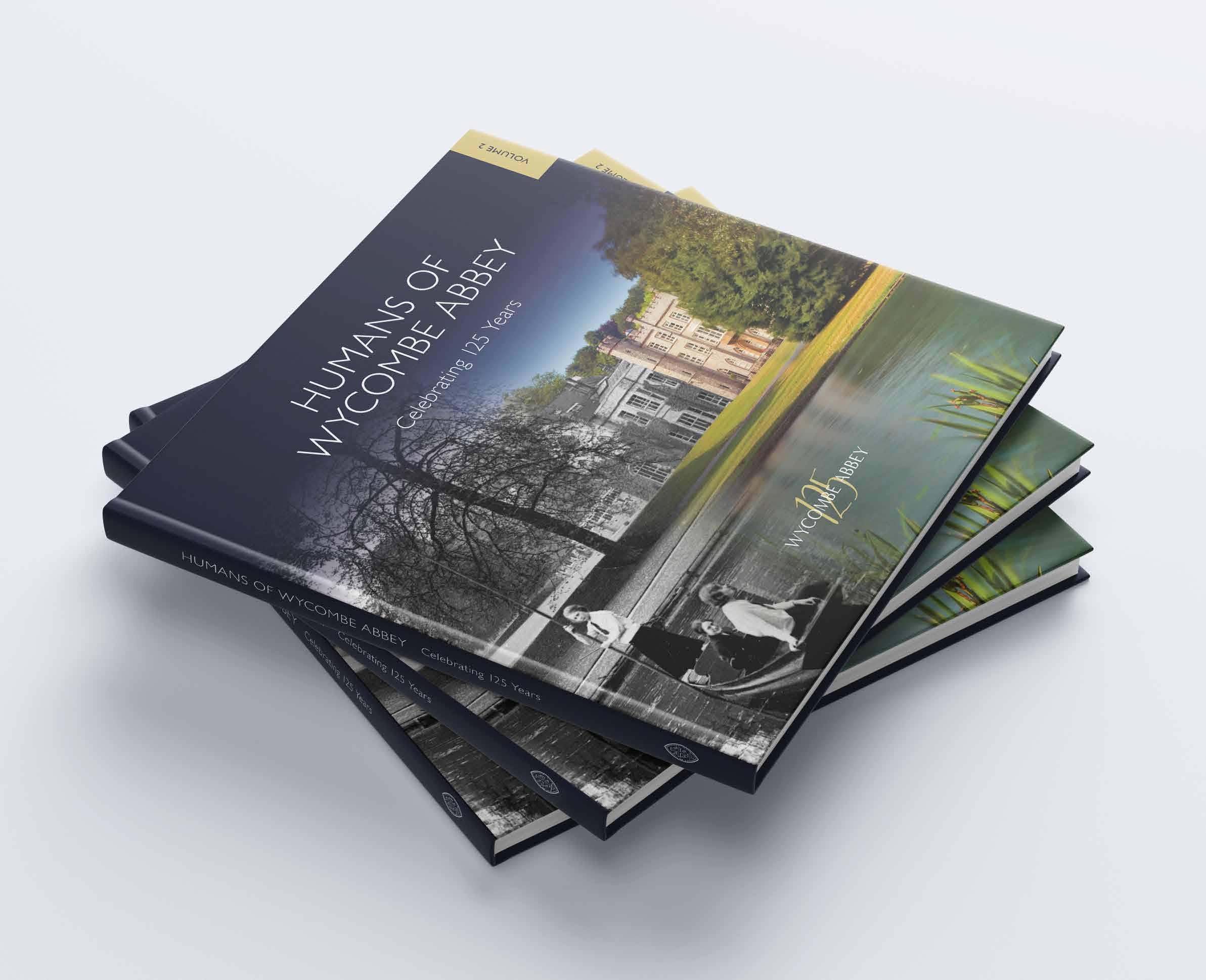
This second volume was also brought together by a group of Sixth Form pupils and all interviews were conducted by the girls over the course of last year.
Isabel Sobowale (Class of 2021, Cloister, C342) said, “We wanted to create this book as a time capsule of sorts, one that pays homage to Wycombe Abbey as the School celebrates its 125 th anniversary, and speaks to the community of individuals who have breathed life into the halls. What makes Wycombe so special is the way in which such a diverse cohort of people can draw together to create a vibrant mosaic – we wanted to share just a snippet of our dynamic community with you”
Buy your copy of Humans of Wycombe Abbey at: https://www.humansofwycombeabbey.co.uk/
This year Junior House welcomed a new group of UIII pupils to Wycombe Abbey; a vibrant group that have enjoyed getting to know each other and learning about all that Junior House and Wycombe Abbey have to offer. We started off the year with the Headmistress’ picnic with the theme of Alice in Wonderland and finished the year with the Junior House Outing, a boat trip on the Thames, complete with Disco.
So much has happened between those two events, it is difficult to summarise. All the girls in Junior House have made the most of the amazing opportunities that Wycombe Abbey has to offer. They have taken part in a multitude of weekend activities from Laser Tag and The Board Game Café to the many
trips off-site that have been able to return thanks to the relaxing of Covid restrictions. There have been far too many to list but have including ice skating, Cadbury World, Chessington World of Adventure and The Science Museum. This year has been extra special being the School’s anniversary year and the highlights for many of the girls have been 125 Events including the Colour Run in September and 125 Live! at the end of April. We have an amazing array of talent in Junior House from music and sport to drama and creative writing. While the Spring Term involved a lot of rehearsals, we were able to see the conclusion of these in the Summer Term with the Lower School Arts Soirée, The UIII play Arabian Nights and Junior Spotlights. It has been fantastic to see how enthusiastic the House have been in supporting each other and encouraging others to take part.
In House over the year, we have watched a wide array of Saturday night movies, taken part in quizzes organised by the RTs, honed our Uno and Dobble skills and enjoyed many impromptu dance shows and even some House Karaoke.
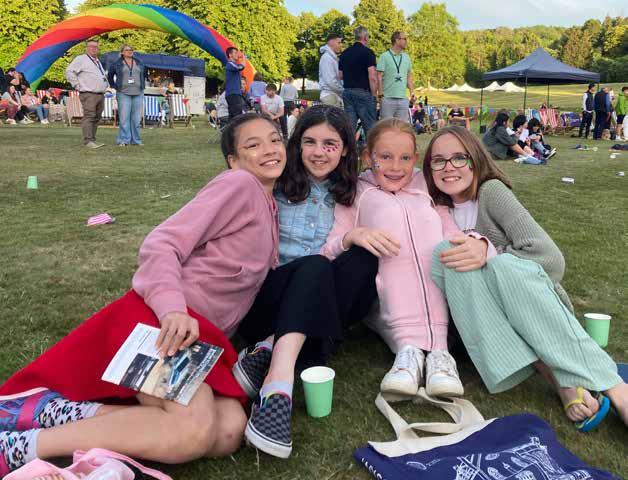
This year’s Junior House girls are energetic, resourceful and have a keen sense of fun. I wish the girls of Junior House 2021/2022, continued success as they move to Senior Houses.
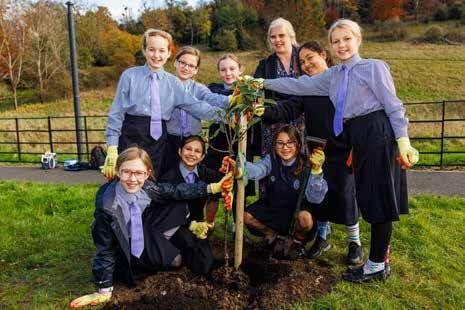
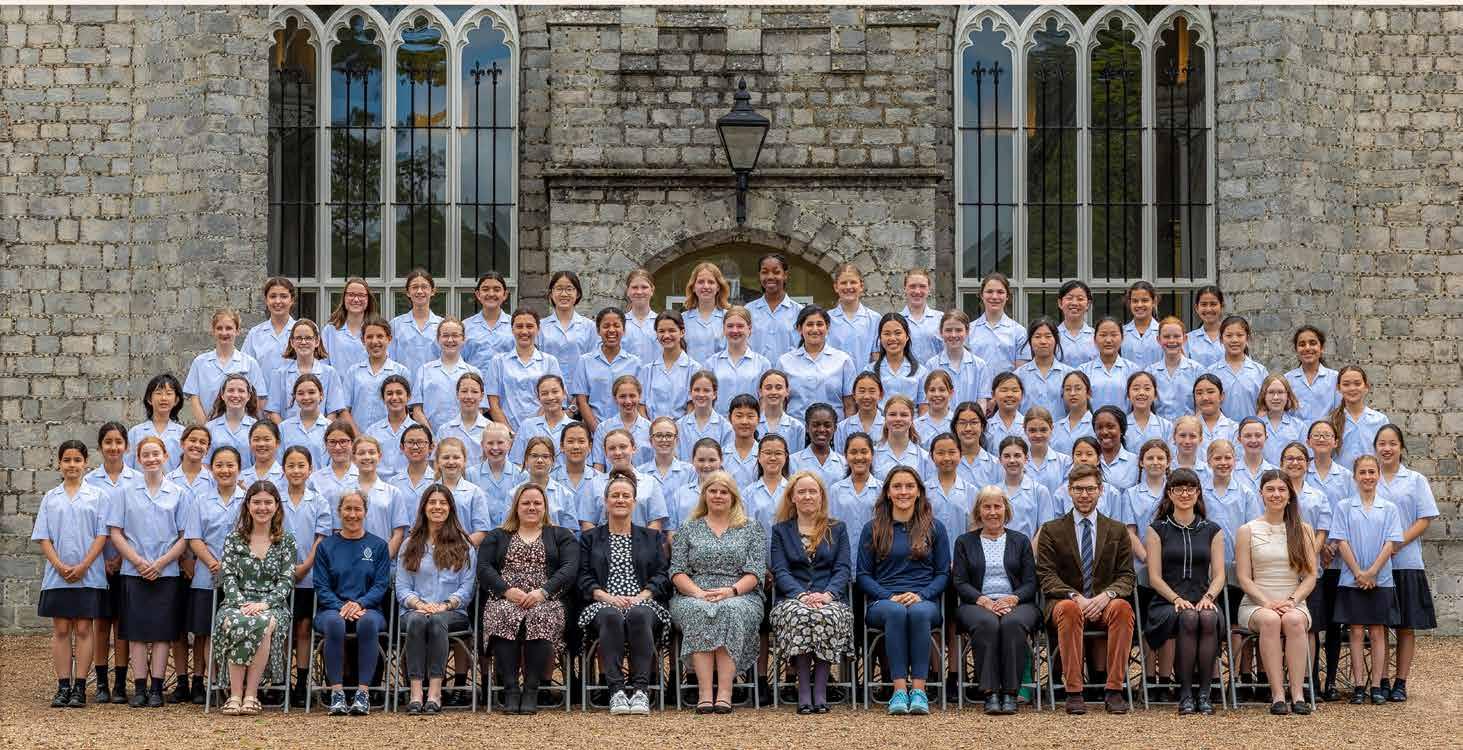
It was with great pleasure that I took on the role of the Head of Airlie House this year. The sense of community has thrived and continues to be at the heart of the House and is the aspect that I will miss most as I move to Clarence House next year.
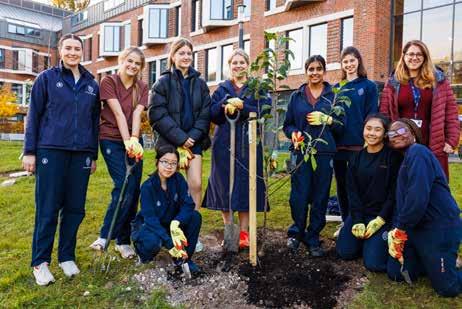
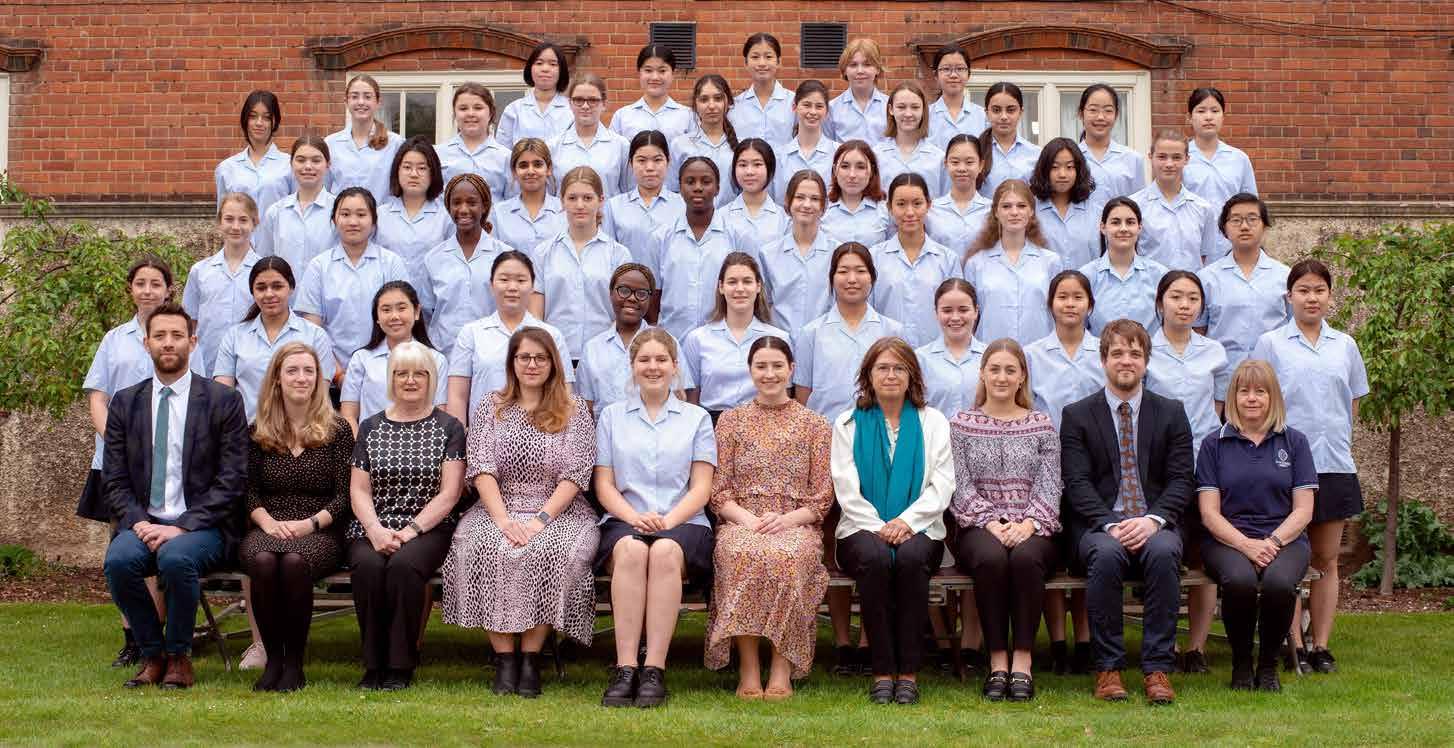
This year has been a very successful year for Airlie with the revival of inter-year dorms and enjoyable House activities. During the Autumn Term, the Upper Fourth took third place in the House Dance Competition with their 80s dance choreography. In the Spring Term, we achieved third place in House Shout with our cover of a Pitch Perfect classic and our Quiz Team placed first in the first round of the House Quiz Competition and third overall.
In May, we were delighted to be able to hold a House Dinner after a few years of disruption. The evening served as a perfect
opportunity to celebrate our community and create more memories as a Boarding House. At Dove Day Airlie showed its sporting prowess with our Tug of War Team narrowly losing in the final. A particular highlight for me was ‘Toastie Wednesdays’. I always looked forward to being able to meet as a whole House for good food and company in the middle of our busy weeks.
One of my aims as a Head of House was to further nurture the supportive atmosphere; however, by being surrounded by such delightful peers and House staff, this was simple. I would like to thank all of
Airlie for being such a wonderful second family for the past five years. I will miss Airlie dearly and I feel so grateful for all of the unforgettable memories.
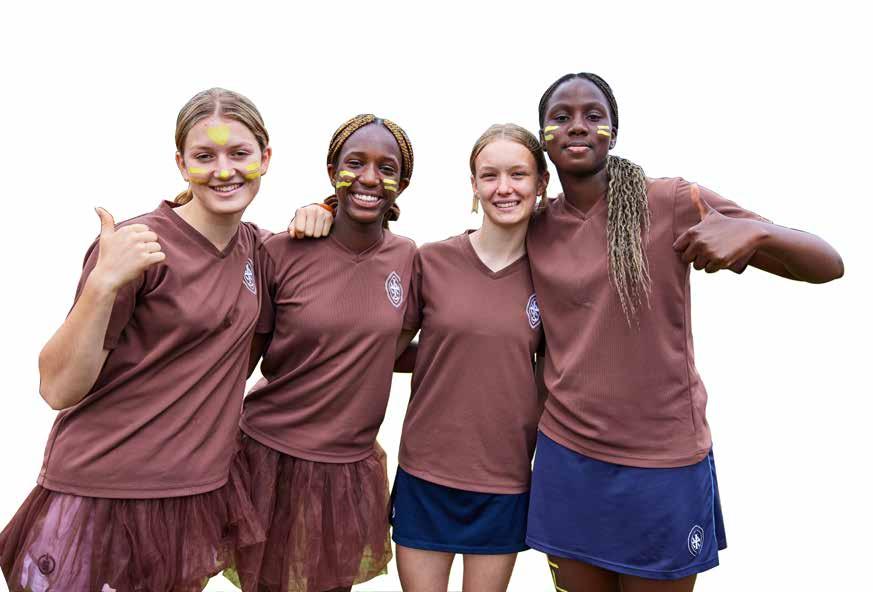
As
I look to a future in Clarence next year, I reflect also on my time in Barry House. The friendships and memories I have made (such as eating pizza at midnight while preparing Fairies or baking as a House) will stay with me forever and I have loved every minute of my five years here.
This year started well with the House Chapel service where we sang I See the Light from Tangled in the Autumn Term. Thanks to the hard work of Claudia and Angela, the performance was notably better than the bad singing that Barry had been known for. The term also saw some sister House rivalry! There were Barry/Butler karaoke and Just Dance competitions that raised spirits and brought the Houses together. The term ended with the Christmas House Party, which is always a highlight of the Christmas season. The gift exchanges and the party games made for a memorable evening and an entertaining end to the term.
In the Spring Term, Barry hosted a Lunar New Year celebration. Parents of Barry girls generously provided and cooked dumplings for the House, including the Clarence girls who paid a visit too. Practising and performing Angel Eyes in House Shout, complete with costumes, was a highlight, especially as we came second in the competition. Funals, too, is always a chance for the House to bond. Seeing the girls
cover themselves in Barry-blue face paint and support the teams with immense House pride was delightful. House Outing took us for bowling and dinner which made for an enjoyable evening and a lovely end to the term.

The Summer Term is often the busiest with revision and exams but unwinding is easier when there are plenty of activities to enjoy. Barry met Butler in a fun Rounders match, which riled up the House pride and competitive spirits. In our House Chapel service, the LVI girls gave an emotional performance of Paradise which was our first House anthem when we joined Barry in LIV.
A highlight of my time in Barry has been the weekly book clubs, organised by Miss Holland, our loving matron. While it is a shame that she leaves us this year, we wish her well at her next school. We also bid farewell to Miss Gaioni, our Assistant Housemistress and Miss Lowe, our Resident Tutor - best wishes to them as they move on to their next adventure. We wish Mrs
Couzens the best as she goes on maternity leave after the birth of her son, Luca.
I have enjoyed the competitive but friendly atmosphere across the School, particularly within sport. This has helped me to develop humility, resilience, and a great sense of ambition to improve myself and these attributes which I am sure will help me as I try to navigate life in Clarence and beyond.
I have loved being Head of House and am grateful to Ms Hurribunce, the House staff and LVI Mons for their unending support and hard work that has made this year so amazing.

 Victoria LVI, Head of House
Victoria LVI, Head of House
In our first full year of School after the ups and downs of Covid and remote learning, Butler House has been a busy place. From winning House Netball to being crowned House Music champions, Butler is definitely back and better than ever!
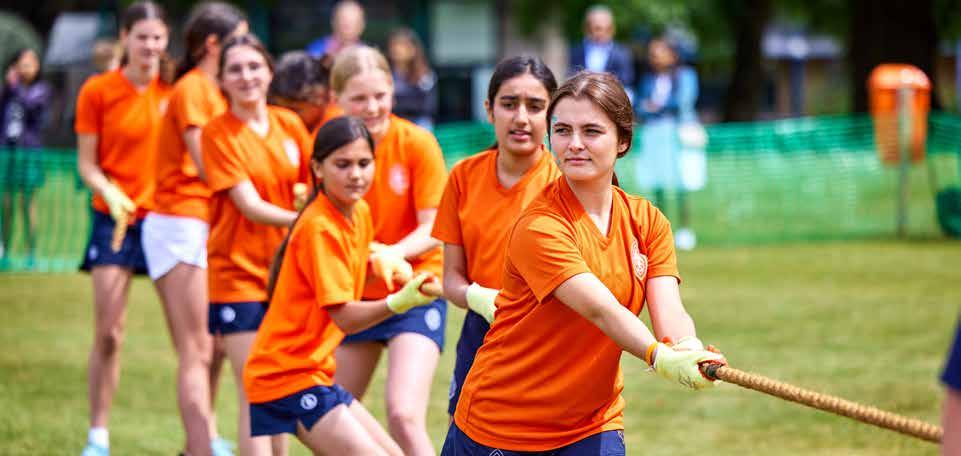
Our year started off with a bang. During the Autumn Term, the House used it’s overwhelming sense of spirit and determination to be awarded the Best Charity Stall Award at the Bonfire Night celebrations, taking into consideration the activity, decoration and teamwork involved. On top of this, we raised a whopping £620, the second highest amount of the night! Events where we come up with an idea and see it through to the end really intensify the tightknit community that has been created in Butler. The friendships made between us are ones which we will treasure foreverthat’s what makes Butler so special.
For me personally, I love being in Butler in the Spring Term. The flowers outside the front door, and the blossom trees you see lining the pathway back to House after a long day really do make the term very special. One of my spring highlights would definitely have to be our House Outing. As a House we embarked on a trip to Maidenhead, where we competed in glow in the dark go karting. It was taken very seriously by everyone, including our Tutors and House staff which made the night unforgettable and a core memory that will stick with me when I look back on my time in Butler.
As a member of the Lower Sixth, this term has been the last in Butler before the move to Clarence. On behalf of the whole of Mons, I can say that being part of such a wonderful and welcoming House has made Wycombe Abbey the most enjoyable of places. We are beyond thankful for the support we have been given by Miss Lowther, Miss Gardner, and Miss Holland who never fail to put a smile on our faces.
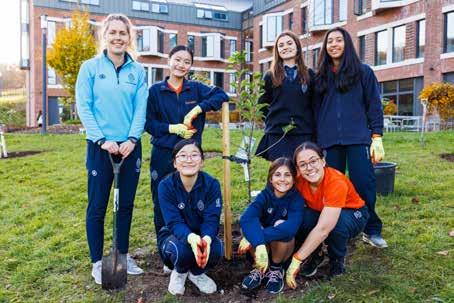

To all the new pupils entering our big Butler family, we wish you the best five years, and to those who we are leaving behind, we will miss you!
Sophie LVI, Head of HouseAfter a turbulent few years, it was incredibly exciting to be able to finally have a fully uninterrupted year. We felt that the theme of inclusivity throughout the year would be a valuable one, given that the importance of community has never been more crucial than today. In the first term, this meant creating a board by the kitchen, in which we each wrote a random act of inclusivity which we had done.
Bringing back Monday night activities also helped revamp house spirit and the community feel which was diminished slightly over online school. For the LIVs, the Guy competition for Bonfire Night was a great way to get to know each other, and similarly, our UIVs flourished in their dance competition (and we were very unlucky not to have placed in either competition). Bonfire Night was also the perfect opportunity for our charity reps, Jasmine and Sofia (LVI), to raise significant funds for our whole school charities by selling jewellery and hand-knitted hats.
For the LVIs, Christmas time was a period we all loved. It was hugely enjoyable for us to be able to decorate the House during ‘Fairies’, and we were really pleased that all our fellow Campbellites loved it. Choosing a Harry Potter theme meant our designs were very recognisable, and the drawing room was certainly transformed into the Great Hall.
A particular highlight of the year for us all was the House Shout competition, in which we sang Where is the Love? by the Black Eyed Peas. Both our rap and exceptional harmonies were thoroughly enjoyed by the crowd, with Campbell definitely receiving the most applause. We took this House spirit with us to the House quiz competition at the beginning of the Summer Term, in which we are very proud to have come second. Congratulations must go to HannahPatricia (LVI), quiz captain, for an amazing performance in the semi-final against Airlie.
Whilst I am very excited to be going fullcircle with my year group and entering Clarence, I am sad to be leaving Campbell behind. The friendships we have all built throughout our time in Campbell will definitely stay with us long after we have left Wycombe. On behalf of all LVIs, we are infinitely grateful for all the support from our amazing House staff, who have

truly made Campbell a second home for us over the last five years. We will really miss all of you, but are certain Campbell is in safe hands and will only continue to flourish. I hope all those to come after us love the house as much as we do.
 Pia LVI, Head of House
Pia LVI, Head of House
 With
With
Over the last year, Cloister has seen the coming and going of pupils and staff, but the one thing that has never changed, which I have seen over my own last five years of being in Cloister, is the strong community we have. Whether it be opening presents while sitting in our House families on our very own makeshift ‘Christmas morning’ or having a ‘Dining Room’ party, there is no doubt that a boarding house like Cloister is the place where you form some of the strongest bonds and which you associate with your fondest memories.
In the past year, we, as a House, have faced both triumphs and challenges, all helping to mould us into the diligent and determined pupils we are today. Winning the UIV House dance competition was certainly one of the main events of the year, alongside a great performance in House lacrosse funals, with our 2nds team coming first.
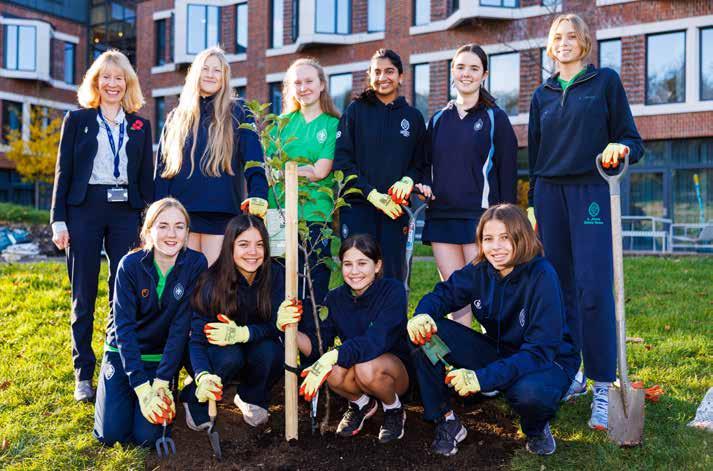
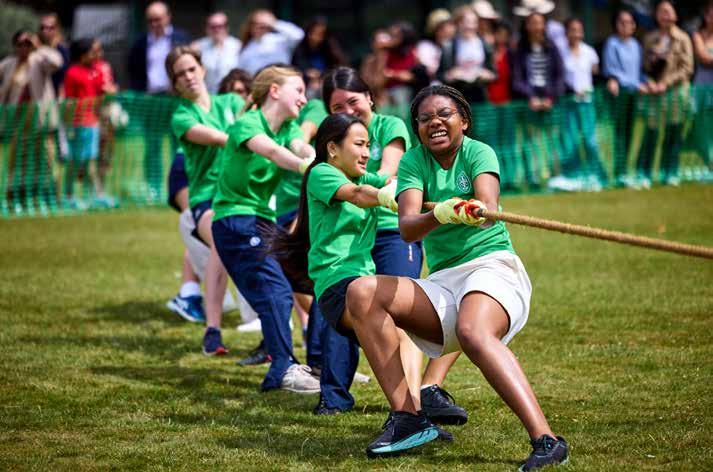
Traditions have continued throughout the year, making an exciting comeback from Covid; dorm feasts every term provided pupils with the chance to connect as a dorm while house outings and Christmas mornings allowed the whole House an opportunity to grow closer and strengthen our community even further. On a year-group level, not only did UIV dance solidify friendships,
but both Dining Room and Fairies allowed UVs and LVIs to connect and enjoy themselves in a fun and relaxed environment. On behalf of the rest of LVI, I can whole-heartedly conclude that though we are indeed leaving the House that has been our home away from home for five years, we couldn’t have asked for anything more in a boarding school experience. Throughout our time in Cloister, our pastoral staff have all been wonderful and we appreciate all that they did for us and are glad that the future Cloister girls have such lovely staff and pupils to guide them and help them along their journey.
Aumkaar LVI, Head of House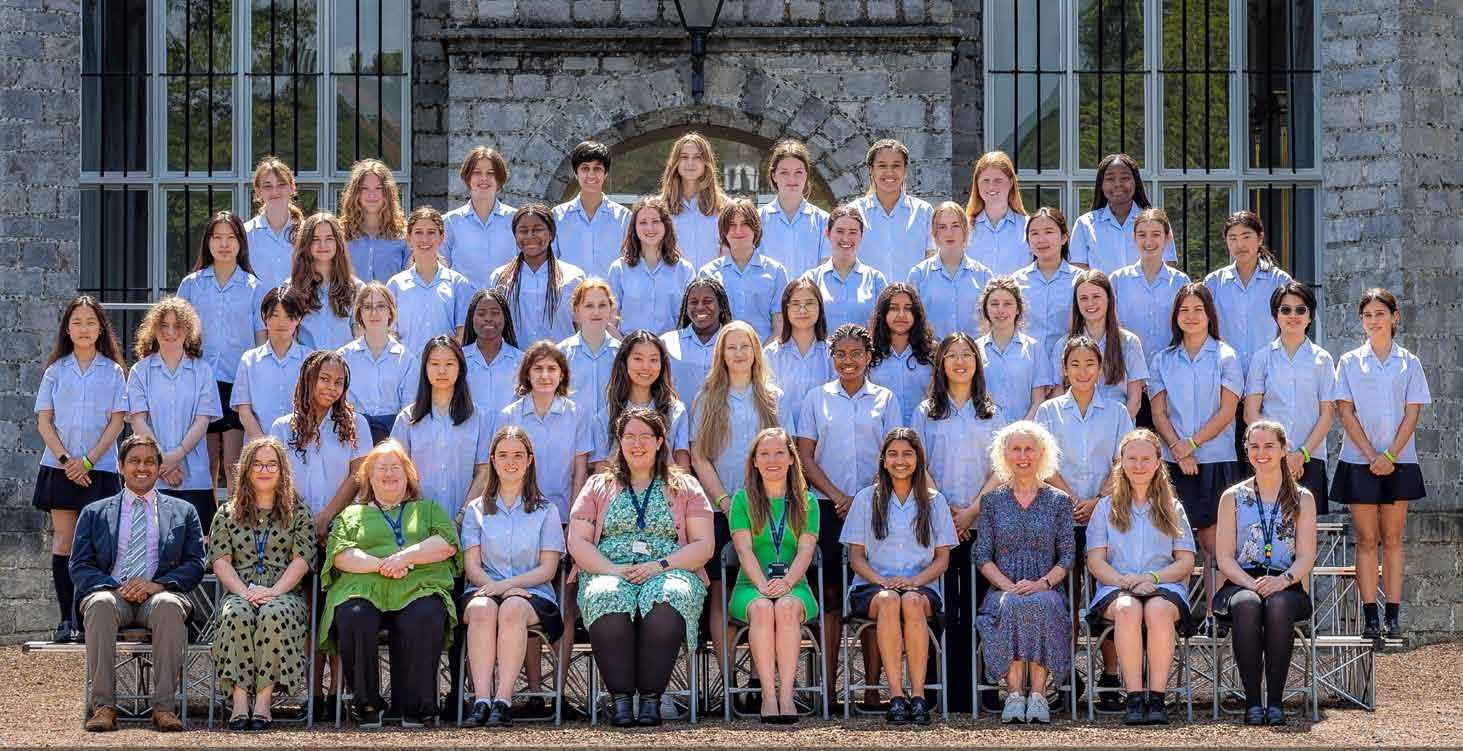
The last year in Pitt has been one to remember by all, returning to School in September with almost everything back to normal post-Covid was an exciting time for everyone. Despite still doing weekly Covid tests, we all adapted to the new normal and was grateful to be back together in House.
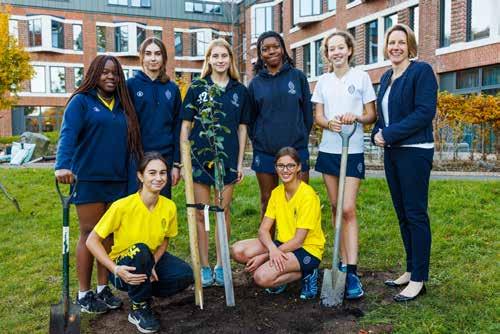
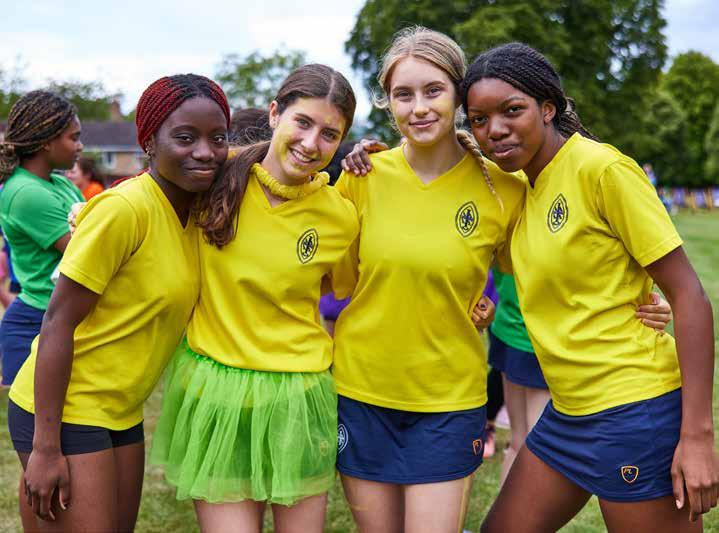

Due to the events in the past year, my year group decided that one part of House that could be improved was House spirit and the sense of community. Throughout the year, the house staff and LVI would put on activities during the week to get everyone to come together; whether it was baking with Miss Michail, ice cream nights with Miss Warden, or tea and biscuits with Mrs George, we always had some time together. In December, Rose (our fantastic sacristan) wrote our House Chapel Service, and Iris and Claudia helped us learn our House anthem. Without these three it would not have been such a successful service. Sport as a House this term was very successful. We came together every week for House games to win points for Pitt. The House spirit shone during all Funals throughout the year with Grace and Izzy putting in a great deal of effort for everything to run so smoothly. The most memorable event of the year, for me, was the Pitt vs Rubens rounders match that the LVI organised during the Summer Term. Both Houses coming together, (staff and pupils), to play a (supposedly) friendly match with music was so much fun. Another highlight was winning the tug-of-war on Dove Day!
The past five years in Pitt for me is something I will never forget. Being part of this House from LIV until LVI has been such an amazing experience. I have friends for life and will be forever
grateful. The House staff have been so encouraging in all aspects of my life and I will miss them all dearly. I wouldn’t change a thing about the House, and I hope Pitt stays as positive and kind as always!
Olivia LVI, Head of House WithThe incredible people and House staff in Rubens have honestly made these past four years the best years of my life. This year has been the first ‘normal’ year since 2020 and I am so lucky to have been able to have had one more year in Rubens with everything back to how it used to be.
The highlights this year have been winning House lacrosse, our House Shout performance of Don’t Stop Me Now, welcoming the new UIIIs with a water fight which quickly escalated into pouring jugs of water over each other and of course Fairies. Next year, I will miss all of Rubens and its traditions a lot, in particular the small things like trying to guess who said the motivational Monday quote at the start of every House Order (to this day I have never guessed correctly), no one knowing what their dorm name is when the winner of tidy dorms is announced and, of course, dorm entertainment. This year we introduced ‘Colin in the Kitchen’ at the beginning of the year to help everyone in the House get to know the LVI a bit better and vice versa, which helped to bridge the gap between the LVI and the younger years after limited interaction due to Covid. We also had our first courageous conversations session
with the Fourth Form, which was a really open and enjoyable discussion where we managed to cover topics such as loneliness, microaggressions and appreciation of other cultures.
There is never an empty evening in Rubens, with House Order and fresh treats baked by Mrs Pearce on Mondays, toastie Tuesdays, pasta bake on Wednesdays, hot chocolate or mocktails on Thursday and fruity Friday. All of this is what makes Rubens such a close-knit community and what spurs on our House spirit.
All of the LVI have so many amazing memories of Rubens, with the most prevalent being the more disastrous – the jam jar incident, melting bowls, exploding microwaves and of course Miss Hoyle’s defeat in last year’s whole House Human Cluedo.
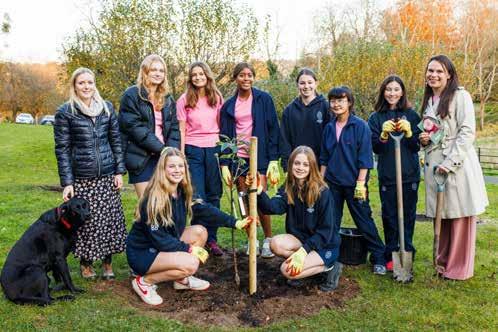
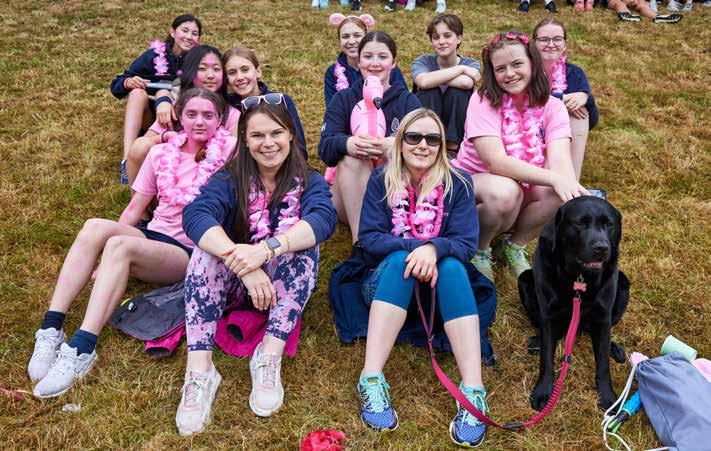
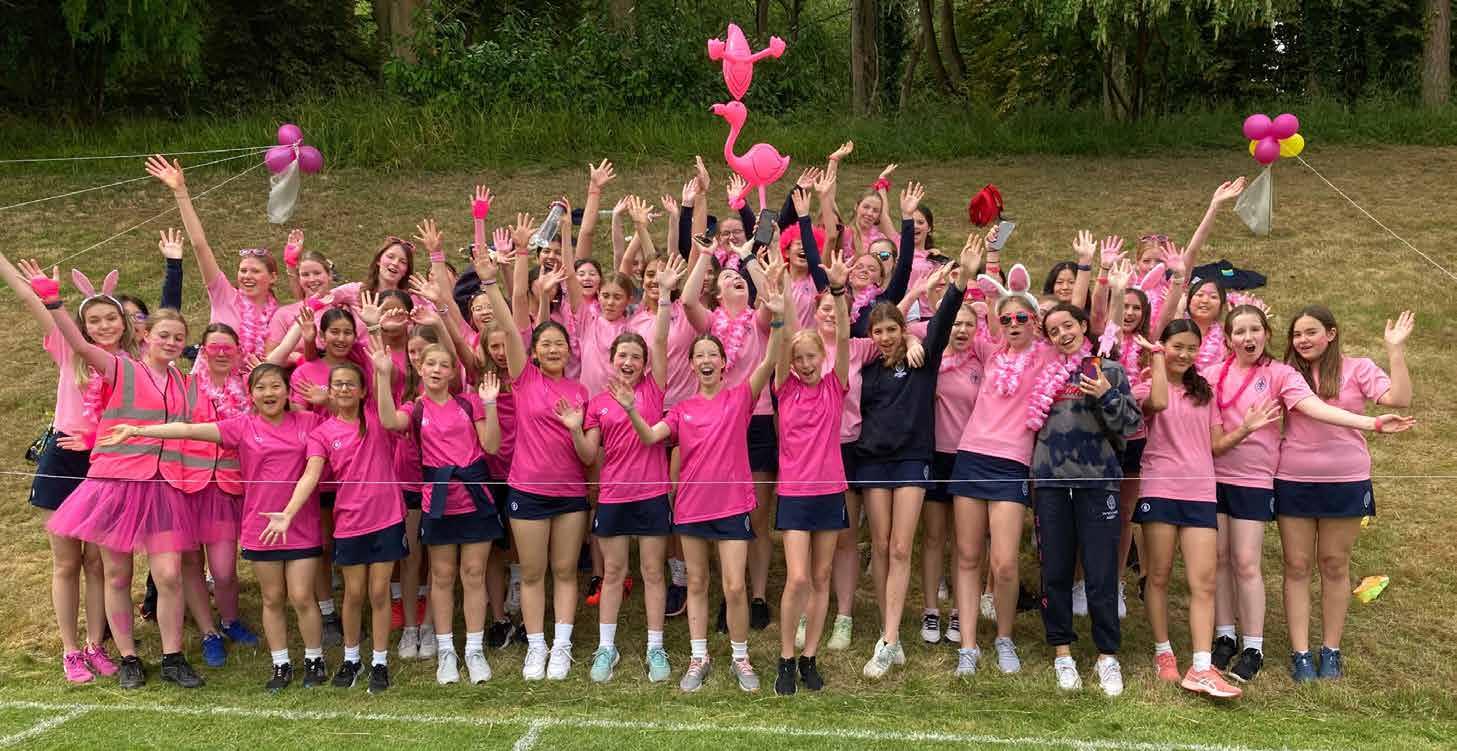
I have absolutely loved this year, being Head of House working with Miss Hoyle and Miss Rowley, and I wish the next Head of Rubens the best of luck for next year.
Kizzy LVI, Head of House
From vertical dorms, House activities and House games, it has been a wonderful year of victories won and memories made in Shelburne. One of my main aims as Head of House was to strive to form lasting and meaningful inter-year friendships and it has been wonderful to see this really come into play again after such a long time of Covid restrictions. Shelburne’s community is one that I have always cherished as it is clear how supported and comfortable each member of our community feels by the huge warmth that can always be felt around the corridors. This is something that has become even more concrete over the past year and which each individual has played a part in creating.
Starting the year with Mons hot chocolates, quizzes and other activities was a great way to settle back into the House after the summer as well as to help new girls integrate into the wider Shelburne community. The Autumn Term also saw success in an incredible performance from the UIVs who took to the stage with fantastic choreography and came 2nd in their House Dance competition. The term ended with a lot of Christmas fun including Christmas lunch and party which were both hugely entertaining and a great way to celebrate and end a long and busy term together. The House came together throughout Spring Term to prepare for House Shout where we sang a now iconic Pitch Perfect rendition which was a great collaborative task and resulted in huge
quantities of House spirit! We also hosted a memorable House Dinner, inviting parents back to our home for the first time in three years, for which pupils designed postcards which were then sold to raise money for the Melanesian Mission. We had a busy end of term with victories in both Lacrosse and Netball funals as well as an exciting outing to Rush trampoline park.
Although Summer Term was packed full of exams for all year groups, it was a time when Shelburne’s support was particularly evident and it was great to see people making the most of Daws Hill in the sun, playing tennis and sitting outside, a particular highlight being Daws Hill rounders. The year ended in a culmination of all of our community spirit at Sports
Day, where we celebrated achievements across both track and field events.

It is safe to say that there is no other house I would have rather spent the past five years in with its traditions and familial atmosphere. I know I leave it in safe hands with staff and students who all want the best for each other and the House, which is something I know I will miss enormously.
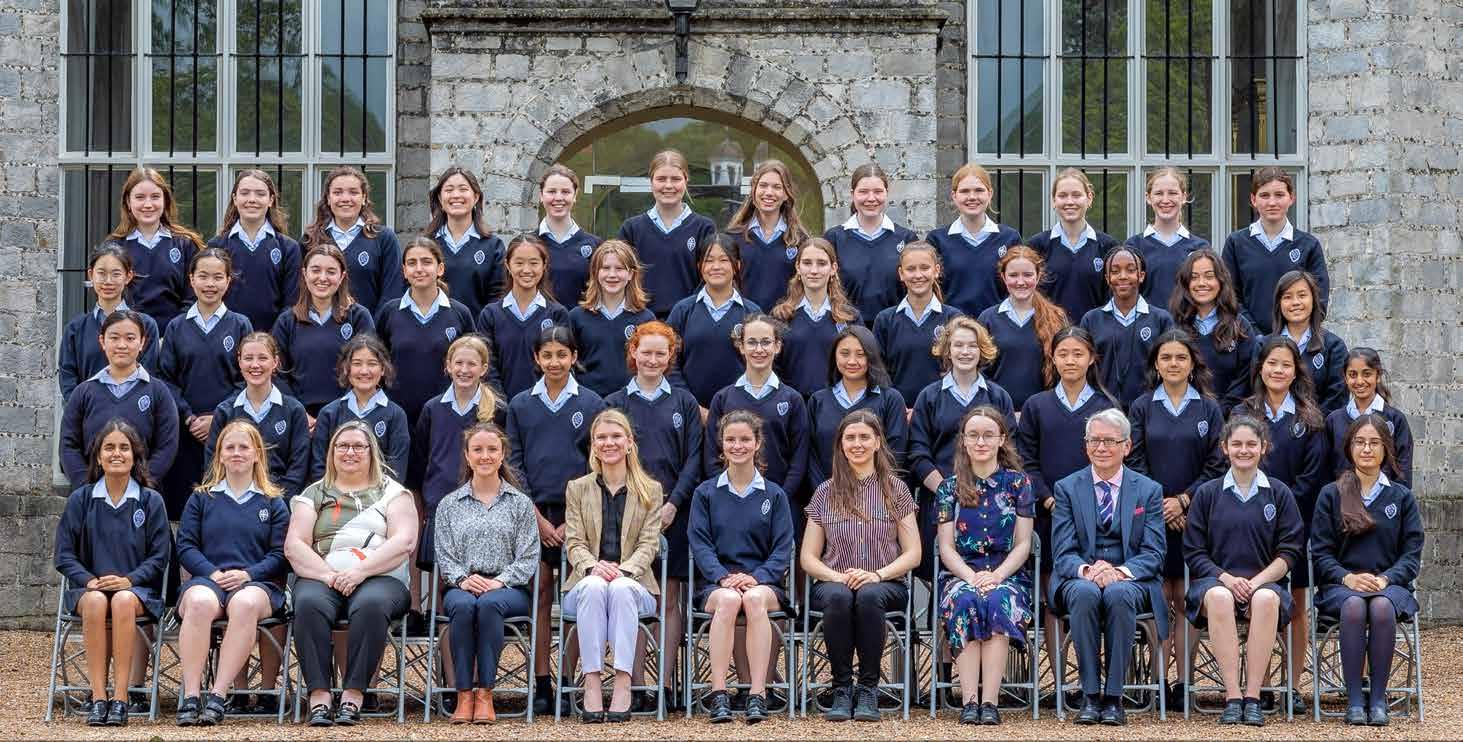
’m Ella, Head of House for Wendover 2021/2022 and I’m sad to say that after five fabulous years of being in Wendover, this is my last one. I’m not really sure how to describe Wendover, other than a huge, wonderful family.
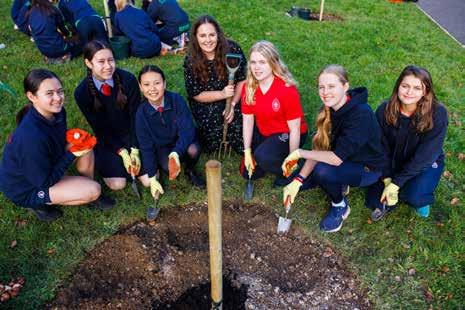
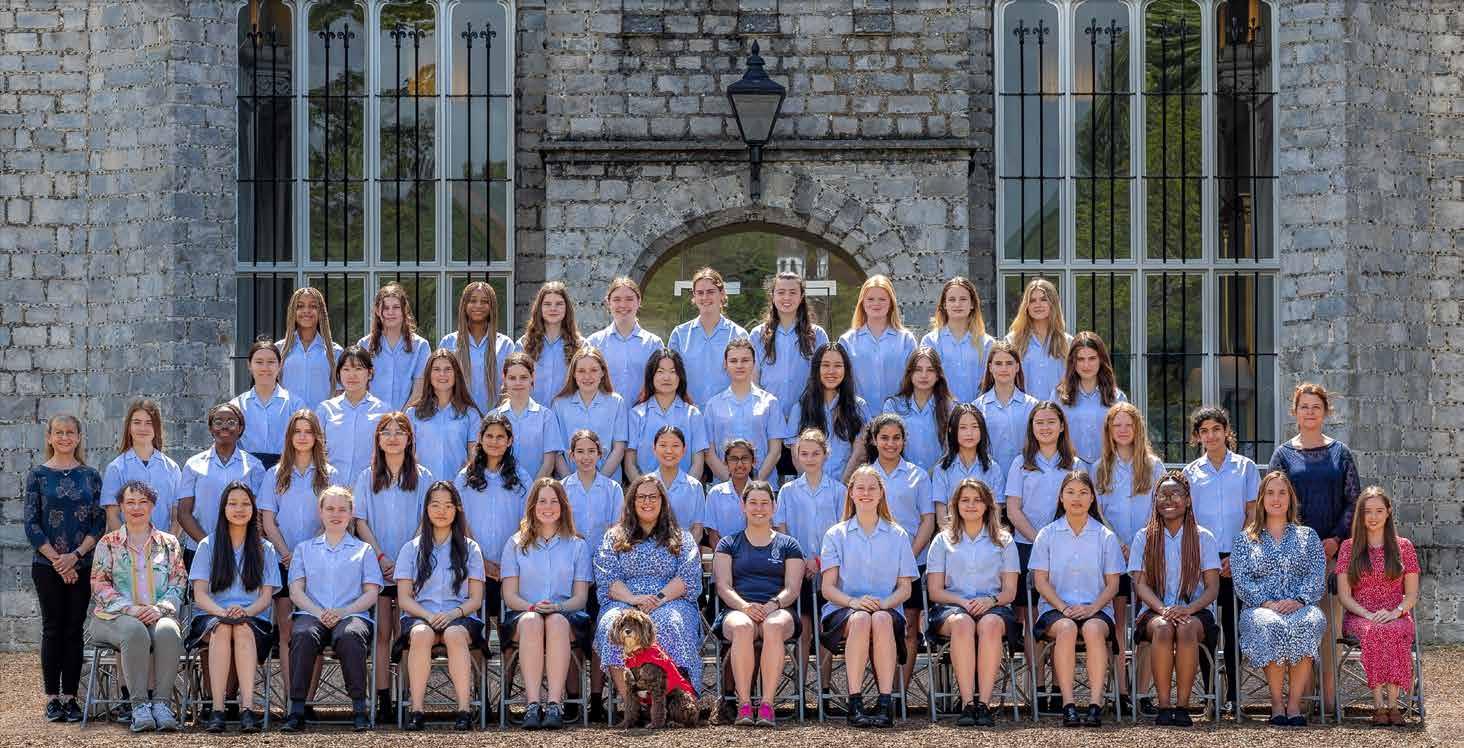
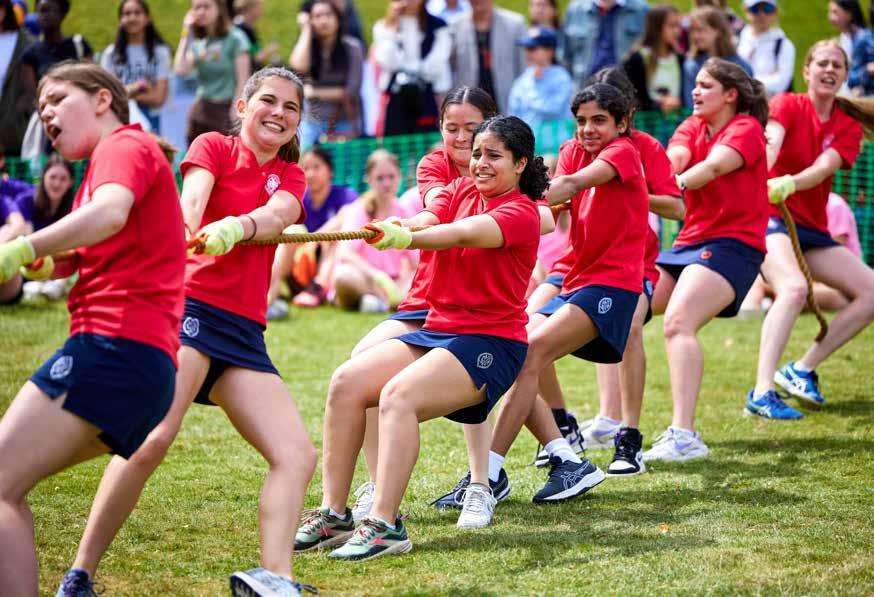
When I moved into Wendover in LIV, it was initially a scary experience living with girls of all ages, but I quickly became a part of the House and I’ve never looked back. I’ve made so many memories with people who aren’t necessarily in my year, which I know will last for a long time, even after I’ve left Wycombe Abbey. Dining room, Fairies, Bonfire Night, House Dance – when I look back on my time, these are some of my biggest highlights. However, whilst the big House spirit events are always so much fun and really make you feel a sense of belonging, it’s also the small actions of kindness and fun that make Wendover really special. For me it’s also the midnight feasts, late night Just Dance competitions, evening brushing teeth meetings, Friday night House bingos – getting to spend time with my best friends and making new friends.
It’s also not just the girls who make up our tight-knit community and I love the Wendover staff as if they really are part of my family. They have always been there for me – whether that has been celebrating my successes or supporting me when I have felt down. They are the true heart of Wendover and bring such energy and empathy to our small house. I will miss them immensely.
Wendover will always be a special place to me, and I hope that every girl gets the opportunity to love Wendover as much as I have.
Ella LVI, Head of HouseIt’s also not just the girls who make up our tight-knit community and I love the Wendover staff as if they really are part of my family.
This past year in Clarence saw the return of ‘normal’ living amongst the girls and it was wonderful to see them being able to enjoy all the privileges the UVI year brings. The year began with an induction enabling the pupils to learn about their new routines and independence in Clarence as well as getting to know the new staff who would be supporting them throughout their final year at Wycombe Abbey. The pupils learnt fast and almost immediately they were getting themselves organised into cooking and cleaning rotas. With the arrival of the first Ocado delivery, it was only a matter of minutes before the amazing smells emerged from the kitchen windows.
During the year we also celebrated the 18th birthdays as they arose with our usual bubbles and meals across the houses. The kitchens this year seem to constantly have balloons and banners in them as the girls have wanted to celebrate and show support for one another. We have also enjoyed a range of Clarence ‘nights in’ from pizza nights to a fabulous Eurovision Song Contest party, hot chocolate and cookies on a Thursday, and plenty of table football matches. This year we also saw the return of House outings. At the end of the Autumn Term, we enjoyed a meal at Bluegrass, and we also enjoyed a fantastic evening of bowling at the end of the Spring Term. Our final celebration of the year was the Clarence Leavers’ event. This consisted of a ceremony in Chapel where many parents joined their daughters to hear the goodbye messages from a range of staff. Following the ceremony, we toasted the girls with Champagne before heading into the marquee for a gourmet meal and dancing throughout the evening to a live band. It has been an absolute privilege to have been the Clarence Housemistress for 2021/2022 and I wish all the girls every blessing for their futures.
Rev Penny Deputy Head of Sixth Form (Clarence Housemistress)From a higher education perspective, Clarence are going on to study a huge range of subjects from Art History to Veterinary Medicine, from Aerospace Engineering to Theology, all at a wide range of world class institutions. The United States is once again a popular destination and will account for approximately 15% of our leavers this year. Pending outcomes on Results Day, the University of Cambridge and University College London are tied for our most popular destinations, both perennially so at Wycombe Abbey.
We, of course, wish all of our leavers the very best in their next steps and we look forward to seeing all the wonderful things that they will achieve.
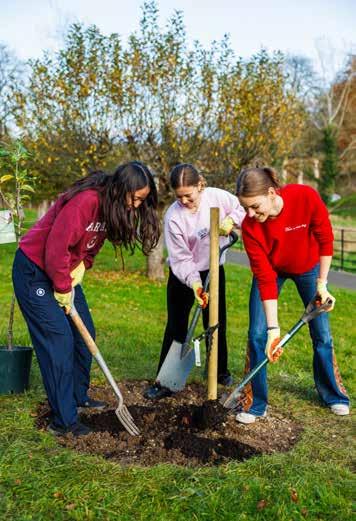
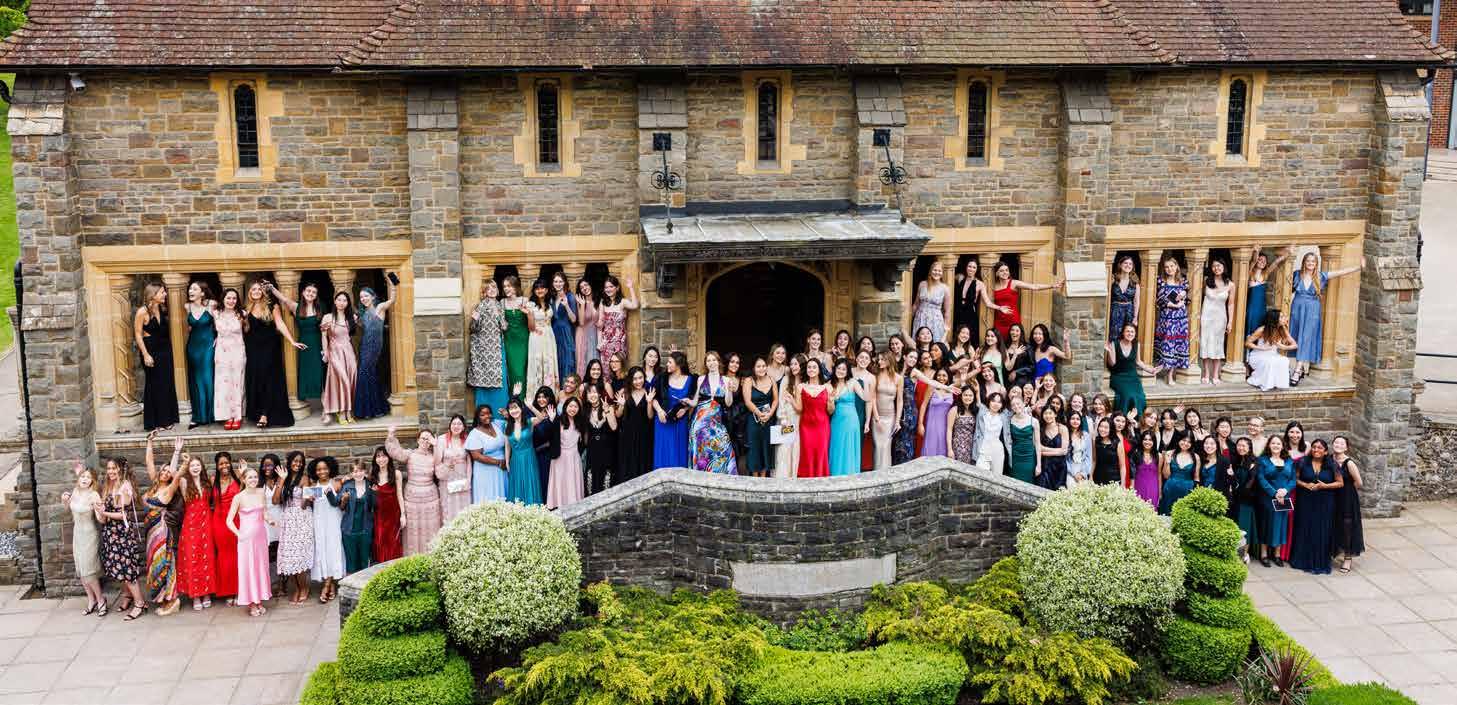 Dr Neal Carrier Director of Sixth Form
Dr Neal Carrier Director of Sixth Form

We are thrilled to bring you news of the events that defined the year for the Development and the Seniors Office.
We are delighted that we are approaching the end of an important project funded by a generous gift from Wycombe Abbey Senior, Mrs Patricia Thompson. Following many months of building work, the restoration and refurbishment of Big School is drawing to a close and the new space, capable of hosting all pupils together, will be officially opened in the autumn. Big School is a key space in the heart of the School and reminds us of the connection to our past through the ongoing use of spaces today.
In additional news, the School launched a new space, the Chinese Resource Centre, and the Chinese Society this year. Thanks to a generous gift from former parents, the School can give pupils the extraordinary opportunity to be immersed in an interactive environment whilst exploring the Chinese language and culture.
We are grateful for the generosity of members of our School community and their commitment to bringing world class opportunities to our pupils.
Lastly, we look forward to launching the Annual Fund later this year and continue to expand philanthropic opportunities at the School. We are thankful, as always, for your continued support of Wycombe Abbey as we look towards the next 125 years. For more information about Development at Wycombe Abbey please contact development@wycombeabbey.com.
In the Seniors Office, this year was particularly special as Wycombe Abbey celebrated its 125th anniversary, involving a whole host of special events and activities. One of those events was our Seniors Making a Difference panel that included Clarissa Ward, Chief International Correspondent, CNN and Charlotte Willis, Award-Winner, TechWomen100 and board member of MedicAlert UK. Another highlight was Seniors’ Day, a sold-out event with over 200 guests spanning five decades
Alumnae of all ages enjoyed coming back to School for Seniors’ Day 2022.
and included the 40th Reunion for the Class of 1982. We were delighted that so many alumnae an former staff returned to share memories and fuse new friendships. Attendees also benefitted from House tours and a behind-the-scenes look at the progress on the Big School restoration.

The Seniors Office supports the 4000+ strong alumnae community. We are delighted that so many Seniors are involved in school-life through careers advice and talks, to business mentoring. Over 400 Seniors are now signed up to the Seniors Mentoring Programme, which matches former leavers with relevant skills and experience with Sixth Form pupils to provide mentoring and advice.
If you’d like more information about the Seniors Office, please contact seniors@wycombeabbey.com
Ms Clare Flynn-Scarcelli Director of Development and External RelationsThe restoration of Big School is thanks to a generous gift from a Wycombe Senior.
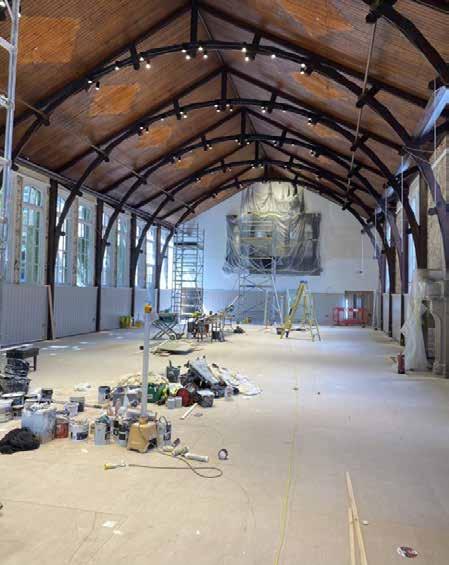
The School does not have a large endowment and consequently, our ambitious plans for academic, recreational and pastoral advancement can only be achieved with the financial support of our community of Seniors, parents and friends. The continued support of our valued donors will ensure that future generations of Wycombe Abbey girls also experience a world class and ever-improving School.
Donations help support the School in three key areas:
It is our belief that every girl should be empowered to make the most of her abilities. We wish to ensure that entry to the School is available to girls who would benefit from an education at Wycombe Abbey, no matter what her family’s financial circumstances.
The Bursary Fund enables us to offer talented young women the opportunity to thrive at the School. We would like to increase bursarial support significantly, so that it is available for 12.5% of our pupil roll (around 80 girls each year). Ensuring that our Bursary pupils thrive at the School remains a priority and we will apply careful consideration to the selection of bursary pupils based on ability, potential and financial need, alongside a robust pastoral care programme to support them during their time with us.
Having world class facilities throughout the School site creates an environment for our girls to pursue academic excellence and for our staff to provide outstanding teaching, enabling each of our pupils to flourish and fulfil their potential. We have developed a phased, long-term Estates Masterplan that will see us build state-of-
the-art teaching, learning and living spaces, in line with the best schools in the world.
Today, Wycombe Abbey is recognised as the leading girls’ boarding school in the UK. High quality, fit-for-purpose facilities that benefit our current and future pupils are an important element in enabling us to remain in this position.

Unrestricted donations can make a significant and immediate impact on the School. They allow the School to direct funds towards the areas of greatest priority, and support a broad range of projects.
If you would like to find out more about how to support Wycombe Abbey, please visit our website or contact Clare Flynn-Scarcelli by emailing development@wycombeabbey.com
• If 100 individuals donated £10 per month for one year, then it would provide laptops for ten Bursary pupils.
• If 100 individuals donated £30 per month plus Gift Aid for five years, it would provide a full transformational seven year bursary.
• A single gift of £125 could fund karate lessons for a term for a talented girl on our Bursary programme.
It’s hard to believe a year has passed since leaving Wycombe! I enjoyed a relaxing summer with family and friends, spending two weeks in the Brecon Beacons. I had been planning to take a gap year but, when my volunteering plans fell through due to Covid, I decided to go straight to university. The past nine months studying Natural Sciences at Cambridge have been all I could have wished for!
The start of the year saw me join my college choir. Since then, I have sung in more than 50 Evensongs and have got to know several people I would have had no connection with otherwise. Unfortunately, we don’t belt out Jerusalem in quite the Wycombe style, although hearing the hymn is enough to bring back many happy memories.
I am grateful to School for always encouraging me to try new things. Not long after joining I picked up Eton Fives, a sport I’d not heard of before university. The game is a little like squash without a racket, hitting the ball with your (gloved) hands instead. In March, I was
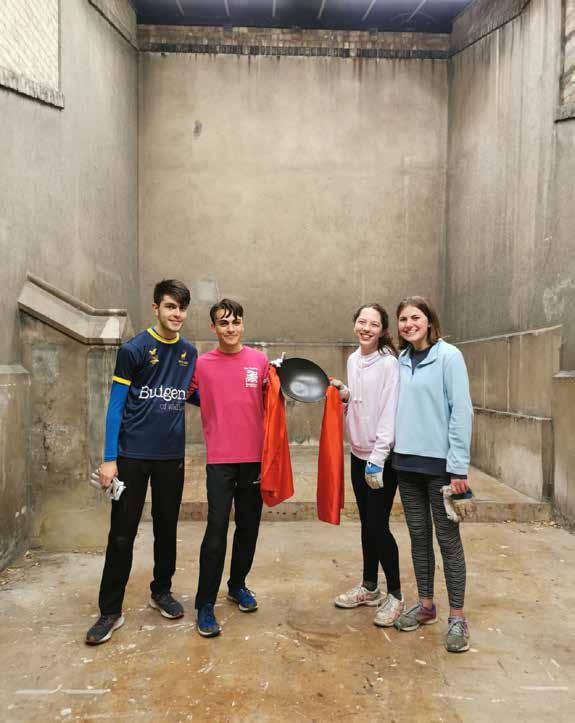
fortunate to compete in the varsity match against the University of Oxford.
So much has changed in a short time: strangers have become good friends, I’ve left behind the more rigid structure of a school timetable, and I’ve lived in a new city. It’s thanks to Wycombe that I have been in a good position to cope with these and many other challenges, and to make the most of the opportunities that come my way.
Sarah DaurisSenior and Head of School 2020-2021

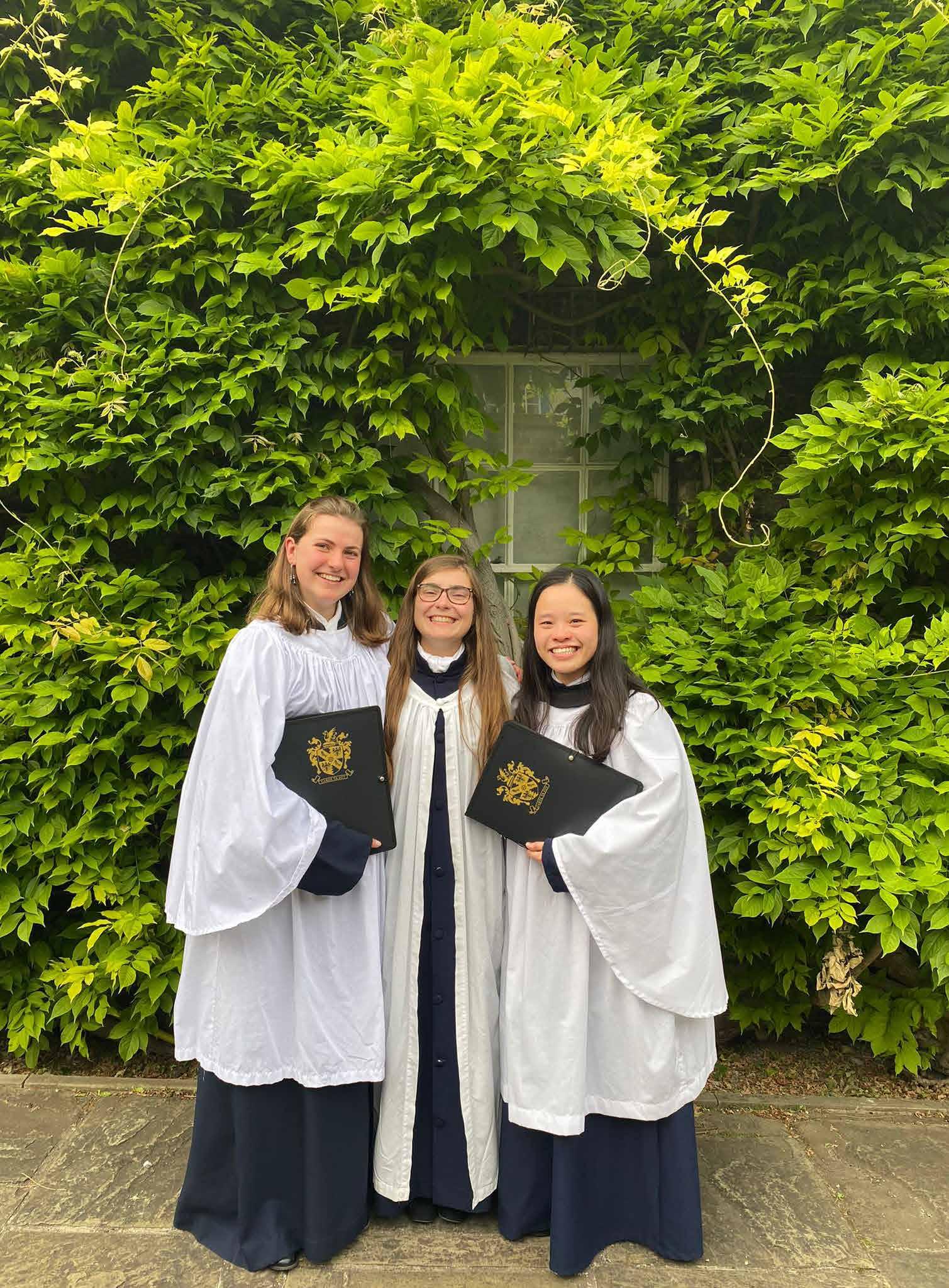
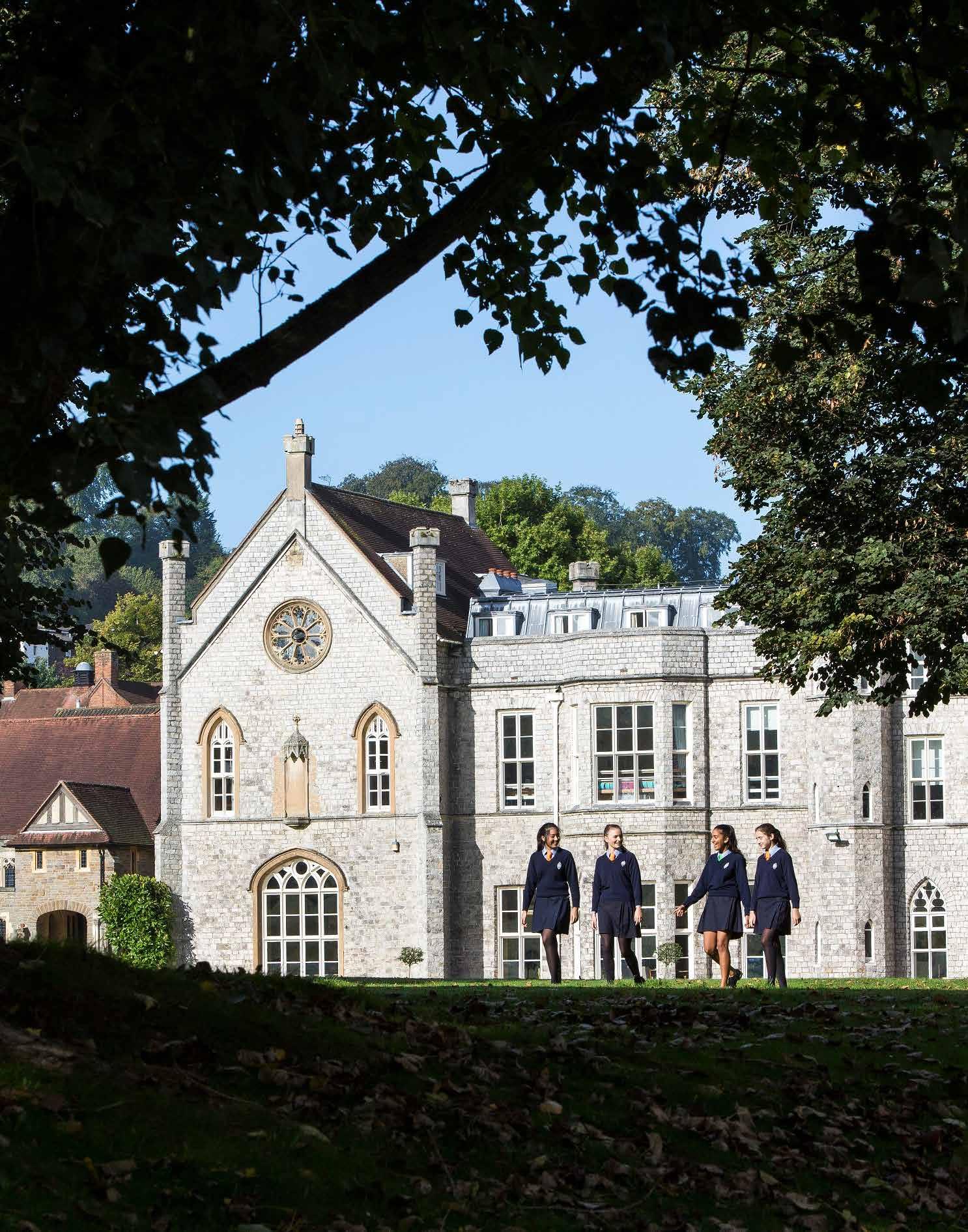
ames Mercer-Kelly joined Wycombe Abbey as Senior Deputy Head in 2017 from Headington School in Oxford. His warm and welcoming presence made an immediate impression on pupils, parents and staff alike.

James quickly got to grips with the how the School runs and was adept at managing the many and varied aspects of day-to-day life at Wycombe from Chapel and School Meetings to parent communications, both in-person and online. His extensive background knowledge of the School meant that many recruitment candidates and guests enjoyed his tours of the site along with a fascinating history lesson.
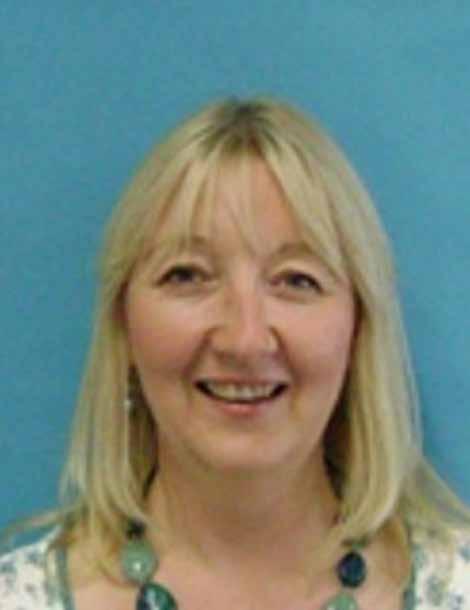
With her colourful outfits and matching sparkly jewellery, Sharon was our ray of sunshine in the Physics department for 19 years and we will miss her very much. Always guaranteed to raise spirits and make us laugh, she had time for everyone and showed boundless kindness to both pupils and staff.
Sharon has excellent physics knowledge and a real gift for explaining concepts in a methodical way for everyone to follow. Sharon accompanied many trips, from visits to theme parks to experience the physics of the rides to trips to the particle accelerator at CERN, Geneva.
Sharon fulfilled the role of Airlie Housemistress for 8 years, supporting and caring for the pupils with her customary warmth and good humour. Never one to shy away from a challenge, Sharon was a key member of many extra-curricular activities. Her participation in the science department’s interpretation of “It’s Raining Men” for the staff “Stars in their Eyes” event was certainly a memorable one.
We wish her and Matt health and happiness in retirement.
Mrs Sue Buxton Director of Science and STEM
James is a gifted teacher and while Chemistry is his main subject, he is happy in any classroom teaching pupils. He was always a willing participant in the School’s events and activities and his participation (and victory) in the Staff Strictly competition will certainly go down in Wycombe Abbey history!
James made a significant contribution during his time here and we wish him all the very best as he takes the next step in his career as Head of Kingsley School in Leamington Spa.
Rhiannon arrived at Wycombe Abbey as an experienced Art teacher and wished to extend her experience by becoming an Assistant Housemistress in Junior House.
Rhiannon proved herself to be very versatile and took on roles of responsibility organising socials, delivering Carrington sessions to Sixth Form groups, teaching photography and taught all age groups DT and Art. She encouraged her pupils to have the independence to explore ideas
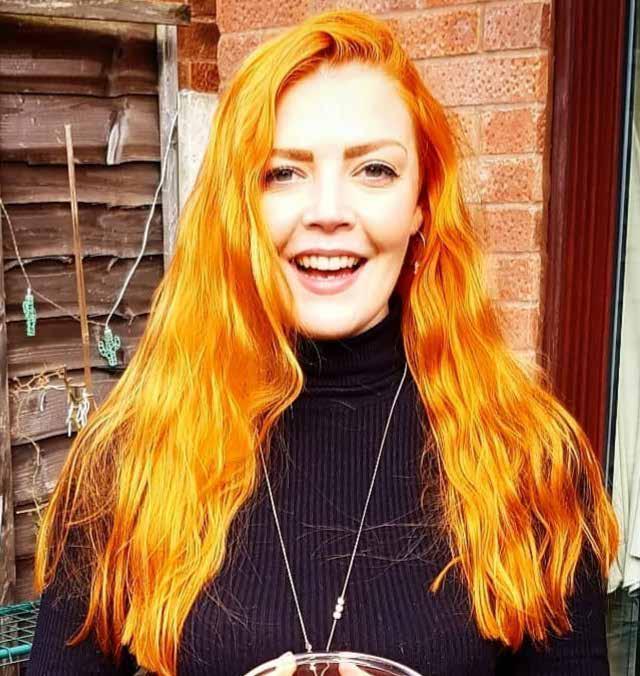
to extend their examination portfolios. In DT she brought in her passion for drawing and designing to develop product planning, particularly in UIV with the result that more pupils are opting to study the subject for GCSE. Rhiannon left Wycombe Abbey to return to a full-time teaching post at Benenden. Her contribution to the wellbeing of the pupils in Junior House will be missed greatly.
Miss Kay Williams Head of Artliterally seen it all, done it all and knows just how to approach any situation. Pupils love and respect her in equal measure. They are confident that they will always be taught thoroughly in her classes, extended where appropriate but also give support when they are finding something difficult or when they need a bit of a confidence boost. She invented differentiation before it was even a recognised term, and her skill at managing a classroom is legendary.
leadership, this department has gone from fledgling beginnings to one of the most crucial cogs in the academic life of the School. Karen provides endless practical tips to help pupils to improve their learning and is also an invaluable source of advice for teachers in supporting pupils with specific educational needs and disabilities.
Karen joined Wycombe Abbey in 1985 as a part-time teacher of RS. She quickly became full-time and has been the backbone of the RS department for 37 years, an impressive record by any measure.
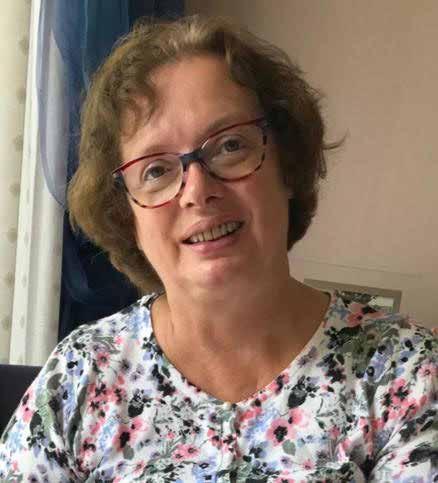
Karen has always embraced new ideas in her teaching and has never been one to sit still. Many a new member of the department has turned to her for advice on how to tackle a tricky topic or for an exciting, creative resource when teaching a new subject for the first time. Karen has
Alongside her outstanding teaching, Karen has used her talents across many other areas of school life. She was Head of Fifth Form for many years and has long been associated with Shelburne House, relishing her role as a tutor there and joining in with a great number of House events and outings. Karen has also been responsible for looking after and training teachers new to the profession, totalling around 50 in number.
Her most significant achievement recently has been as Head of Learning Enhancement since 2008. Under her
Karen has seen enormous change at Wycombe Abbey in the last 37 years. She adapts quickly to each new challenge, such as online teaching where she had her lessons ready and uploaded almost immediately after the lockdown was announced. She has been a truly dedicated and trusted colleague and we will miss her greatly. We wish her every happiness as she leaves to enjoy her retirement, surrounded by her family which includes an expanding line of grandchildren whom she sees daily.
Miss Emily Boswell Deputy Head (Academic)Magda joined Wycombe Abbey in September 2017 as a part time teacher of Biology. She quickly established herself as a dedicated and innovative member of the department.
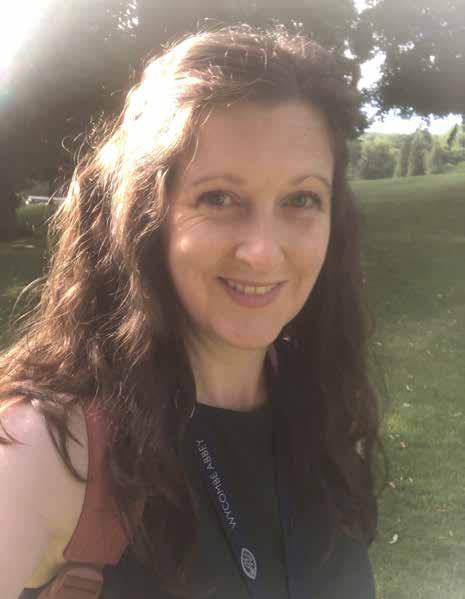
A keen practical ecologist, she put her extensive fieldwork experience to good use when she helped coordinate the biology activities for UIII and LIV STEAM days; girls loved learning exactly what was in the Wycombe Abbey lake (hint; a lot of freshwater shrimp!). Within the Biology Department, she has become a respected font of knowledge and her attention to detail is second to none.
She has been a dedicated member of Junior House and her tutor groups love to feel supported by her in all their endeavours – her departure from House will be keenly felt. Magda now moves on to manage the Biology department at Sherborne Girls’ School in Dorset where she will be closer to her family. We wish Magda, Olly, Robin and Cora all the best in their new adventures and look forward to coordinating some fieldwork with her department in the near future.
Mrs Lizzi Wallace Head of BiologyMatthew joined as Head of Spanish in 2021, and very quickly adapted to the ways of Wycombe Abbey. From the start, he impressed all with his calmness and perseverance, particularly in the face of technology issues when hybridteaching was still taking place. A wellestablished member of the ‘Breakfast Club’, Matthew worked extremely hard, and in spite of a long commute still managed to fit in long runs – his energy is legendary. In the classroom, his exuberance and dynamism inspired and energised pupils, and he was a supportive tutor to his LIV tutees.
In addition to running the Spanish News Club and Spanish Society, Matthew reinstated the Linguistics Club. He has been a collaborative and supportive member of the department, organising trips to the BFI, theatre outings, and encouraging girls to participate in competitions both internal and external.
Matthew has made a significant impact in the Spanish Department, and we shall miss him. He is leaving us to become Assistant Head (Academic) at Repton Al Barsha, Dubai, and we wish him every success in this role.
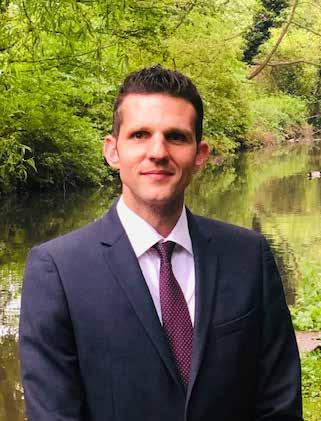 Ms Lucy Nott Head of Modern Languages
Ms Lucy Nott Head of Modern Languages
Assistant Housemistress of Wendover House, Teacher of English, Coach of the Gymnastics Squad, Weekend Activities Co-Ordinator, Steph Toogood joined Wycombe Abbey four years ago and settled in to School life quickly.

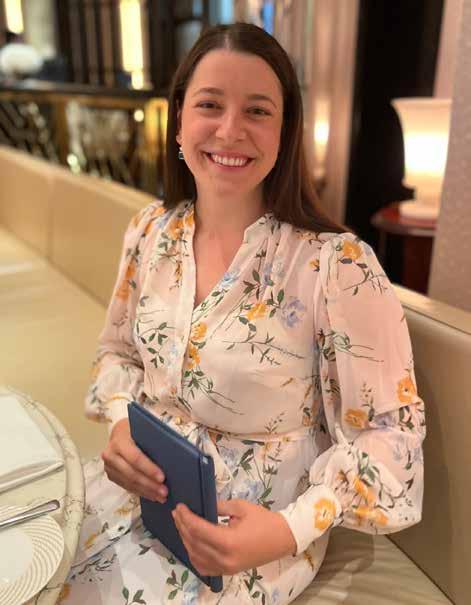
Steph is a much loved member of the English Department where she instilled a love of reading into some of our youngest pupils. She made an equally positive impact in the PE department, choreographing the Clarence Academy girls, judging the UIV dance show and supporting inter-house Cheerleading competitions. Steph filled the girls with confidence in their ability and creativity whilst performing in front of their peers and parents. It takes a special individual to be able to do this. Steph also led the Weekend activities programme
ably during the past two years. A firm favourite has been her introduction of the petting zoo which we hope will become a regular feature.
In Wendover House she is respected and well-liked by girls, pupils and the staff and it is with a huge sense of sadness that they bid her a farewell from their house community.
Becoming a Housemistress is the natural next step for Steph, who leaves us to join Downe House to run one of their Sixth Form houses. We wish Steph, Charles and Freddie the dog nothing but the very best of luck for their move; we will miss her hugely.
Miss Sophie Blunt Wendover HousemistressM iss Gardner joined Wycombe Abbey in September 2020 as Assistant Housemistress, Butler and Teacher of Geography. She arrived at a challenging time, with September being the start of the first full term of Covid restrictions being in place.
In the Boarding House, her initial memories will be of assigning one-way systems, setting up sanitising stations and allocating bathroom spaces to dorms for isolation control which is hard to believe now. Despite these initial challenges, she coped admirably and quickly settled into life at Wycombe Abbey, building a rapport with pupils and parents. She has been a particular support to her LV Form tutees, seeing them through their induction into the Boarding House and helping them choose their GCSE subjects.
In the classroom, she has inspired her pupils through her genuine love of Geography. The Department are grateful for her creativity and attention to detail when producing engaging and interesting resources for the UIII curriculum and upgrading our A level provision. She has led exam classes and will leave a lasting impression on her pupils, many of whom have chosen to study the subject at degree level.
Elizabeth has been reliable, professional and dependable, and has a bright future ahead at Cheam School. Her support to pupils and parents will be welcomed in a prep school environment and we wish her well for the next chapter. Thank you for all you have done for Wycombe Abbey over the past two years.
Elena started at Wycombe Abbey in September 2020 as Assistant Housemistress in Barry and Teacher of Spanish. She joined during the heart of the pandemic; being a new teacher in a boarding school is difficult at the best of times but when you are working in and teaching in a bubble it is rather more challenging.
Elena was resilient and determined to make her mark in the classroom and in Barry House. She brought a calmness and professionalism coupled with enthusiasm, positivity and fresh ideas to both the Modern Language Department and to
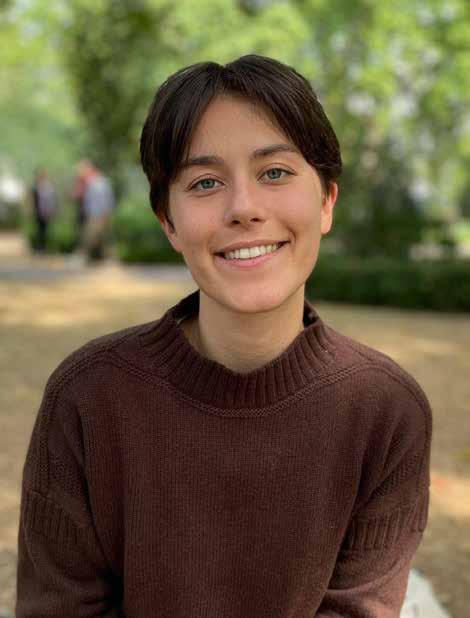
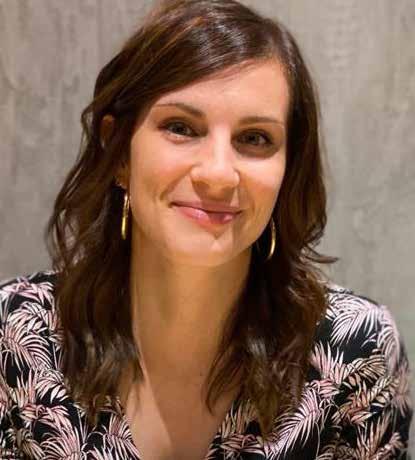
Barry House. Kind-hearted, well meaning, and endlessly diligent, Elena quickly carved out a nice place for herself as the Assistant Housemistress in Barry House. Elena’s empathy, compassion and energy left a lasting impression on her tutees and the girls within the Barry community. A huge thank you to Elena for all that she has done in the classroom and in House. We wish her the very best as she embarks on the stage of her life with her fiancé, Hugh and dog, Casper in Milan.
ania joined Wycombe Abbey having already met our art historians on the School’s trip to Florence and Rome where she was one of the wonderful tour guides provided by Art History Abroad. It was clear that her passion, depth of knowledge, and most importantly her ability to convey both of these to young people made her an excellent fit for teaching History of Art at Wycombe Abbey.
In her three years here she has contributed so much to the subject and to the department. Her lessons were always full of intellectual discussion and an atmosphere of revelation, excitement, and, most strikingly, joy. She always made time to provide additional advice to pupils on anything from essay technique to travelling tips to higher education and she was instrumental in inspiring many pupils’ decision to pursue the subject at university. She was integral to so many of the department’s activities beyond the classroom, in particular the publication of the History of Art Magazine and the activities of both the Senior and Junior History of Art Societies.
Beyond the History of Art department, Fania was involved in many facets of school life. As Assistant Librarian she made her focus the School Archives where she did tremendous work to organise the collection and to make this more accessible to pupils, staff, and Seniors. One of her most successful initiatives was initiating archive events where pupils could come and handle objects from the collection and learn more about Wycombe Abbey’s history and some of the fascinating people that have been connected to the School. Some of Fania’s research work was showcased in a series of social media posts about the School’s alumnae as part of our 125 th anniversary celebrations.
We wish Fania every success with her future endeavours in the world of art history.
Ms Emma Bowen
Head of Art History and Deputy Head of Sixth Form (Enrichment)
Ms Avani Hurribunce Barry Housemistress
FElena Gaioni, Teacher of Modern Languages and Barry Assistant Housemistress Fania Weatherby, Teacher of History of Art and Library Assistant
This year we bid a fond farewell to three much-loved resident matrons. Firstly, Miss Allison Bevis, Resident Matron in Wendover House. Miss Bevis started working at Wycombe Abbey in 2004 and her kind support for the girls in her care and her commitment to ensuring that the Boarding House ran in calm and efficient manner will be missed. We wish her all the best in her retirement.
Having joined Wycombe Abbey in September 2016, Miss Holland has been a Resident Matron in Junior House as well as in Barry and Butler Houses. Always ready to greet pupils with a kind word and a friendly smile she has brought warmth and care to each of the Houses she has worked in. She leaves Wycombe Abbey to join the Royal School Wolverhampton as
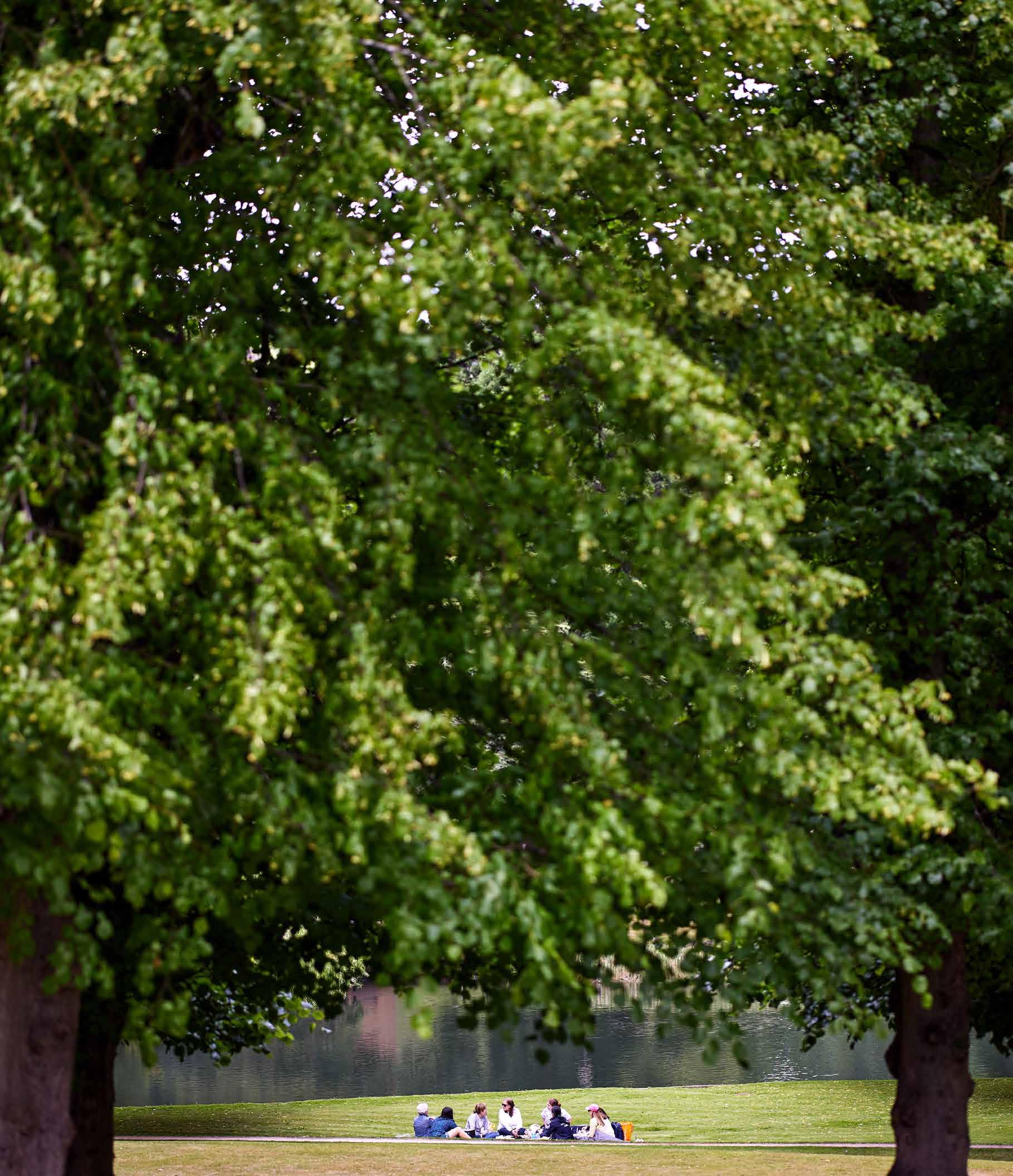
a Houseparent. We wish her all the very best in her new role.
Miss Warden joined Pitt House in September 2017 and, therefore, has the distinction of being the first of Pitt House’s Resident Matrons. We are grateful, not only, for Miss Warden’s support for the girls of Pitt House but also her work
in helping pupils who were required to quarantine at School during the COVID-19 global pandemic. We wish her every success in her new role as a Senior Matron at St Mary’s School, Cambridge.
Mr James Jones Deputy Head (Pupils)
We also say farewell to a number of support staff who have made a significant contribution to School life:
Cat Sutherland-Hawes (Director of Admissions) Roz Doctor (Director of Finance)
Laura Chandler (Health Centre Manager) Eileen Pinkney (PA to the Bursar) - 28 years’ service
Jo Wetenhall (HR Manager) - 16 years’ service Tracy Howe (Academic Administration Manager) - 15 years’ service
Support staff are an important part of the Wycombe Abbey community and we wish all our leavers the very best as they move on to pastures new.
Farewell to two of our long-serving visiting teachers: Ken Ward (Visiting Teacher of Science) - 11 years’ service
Clare Hirst (Teacher of Learning Enhancement) - 16 years’ service
